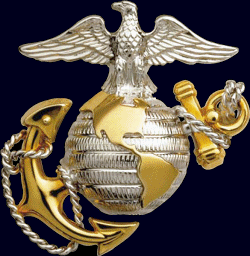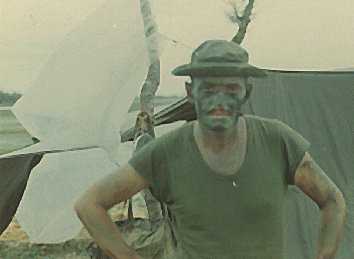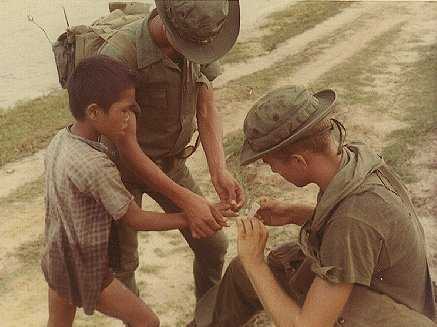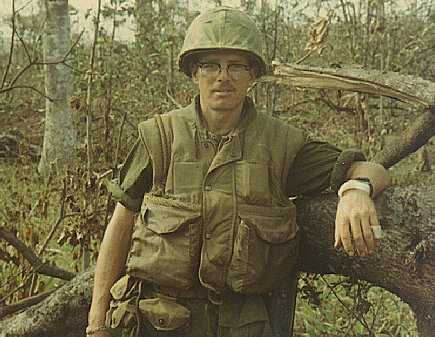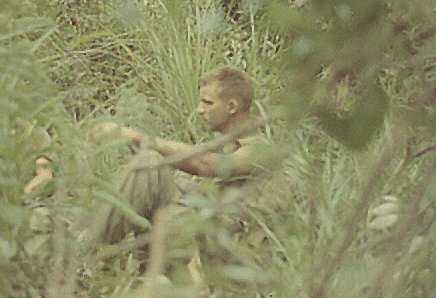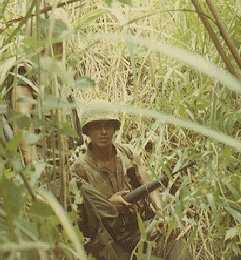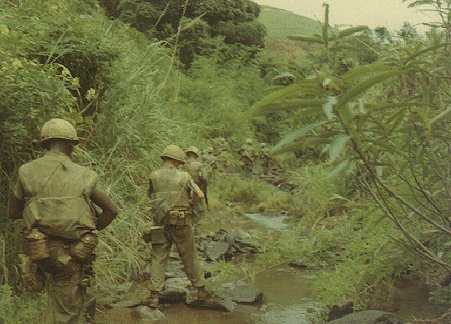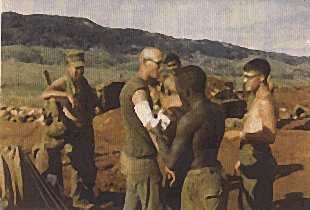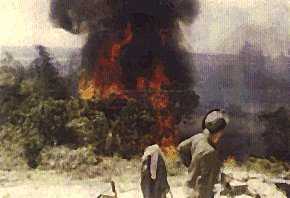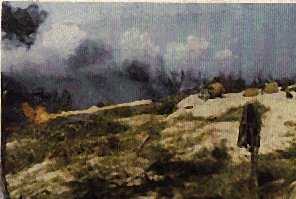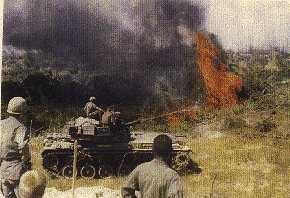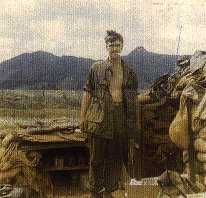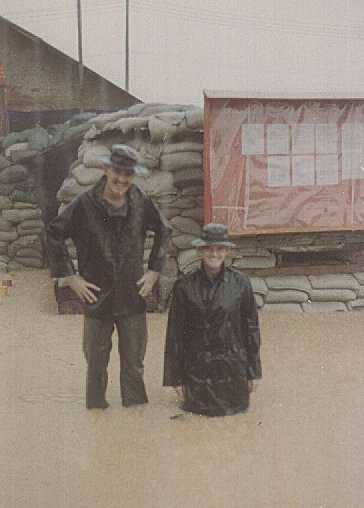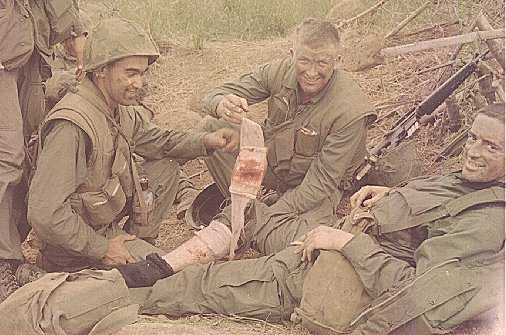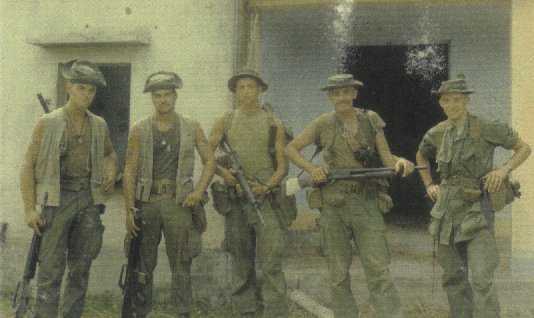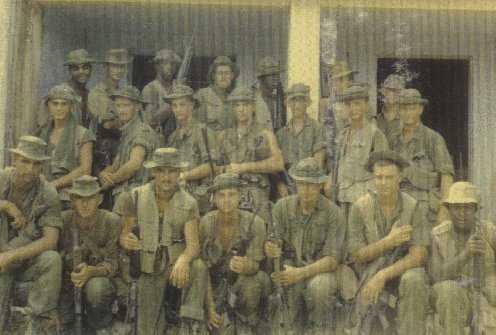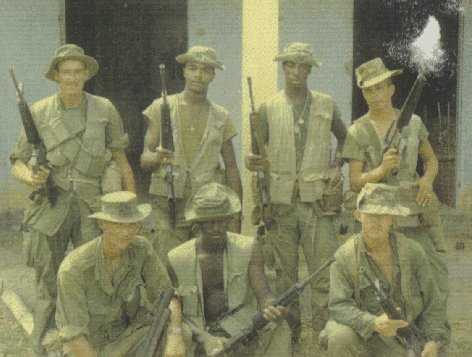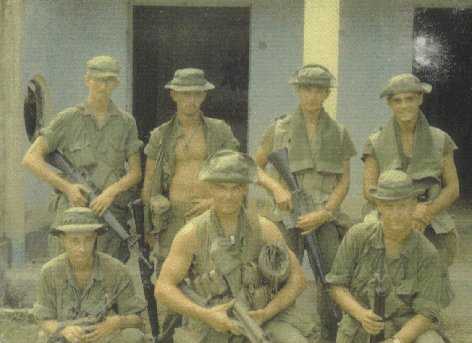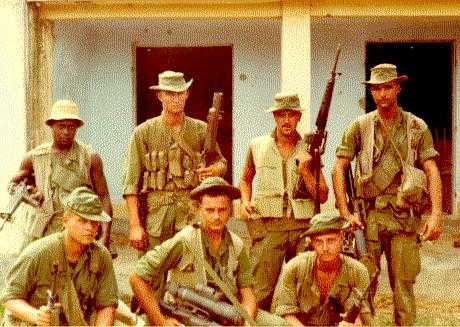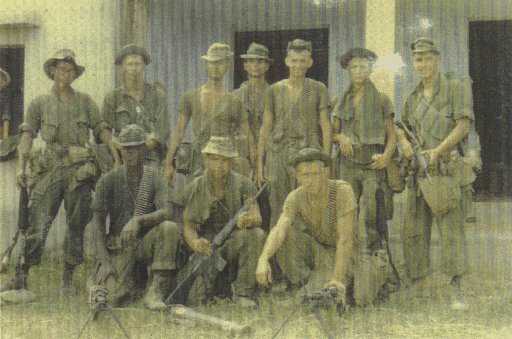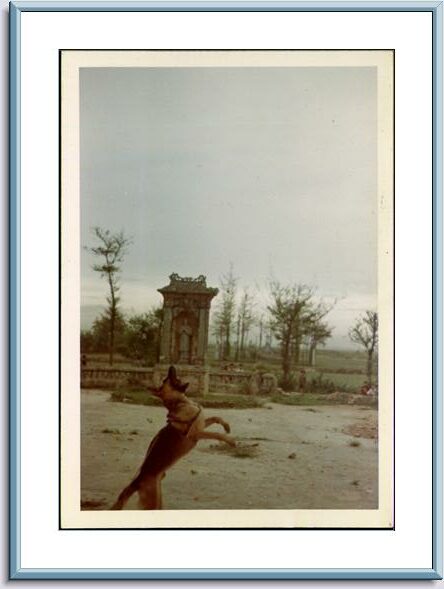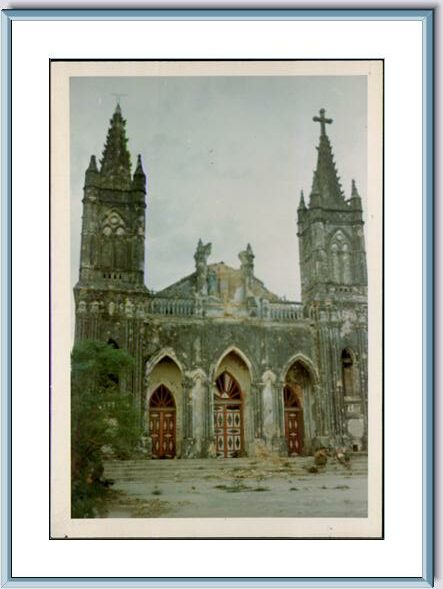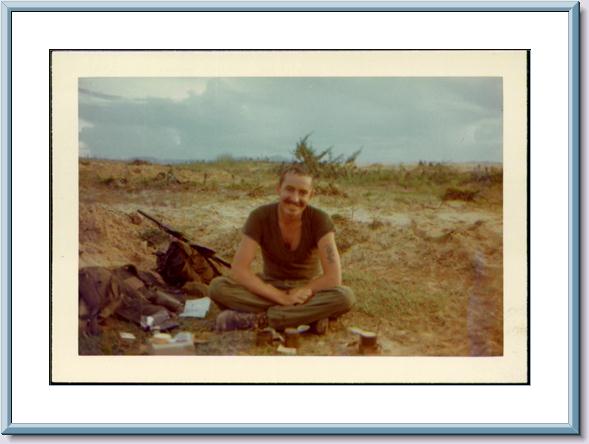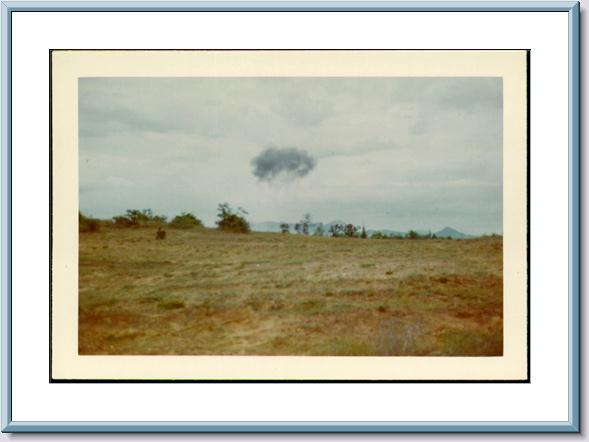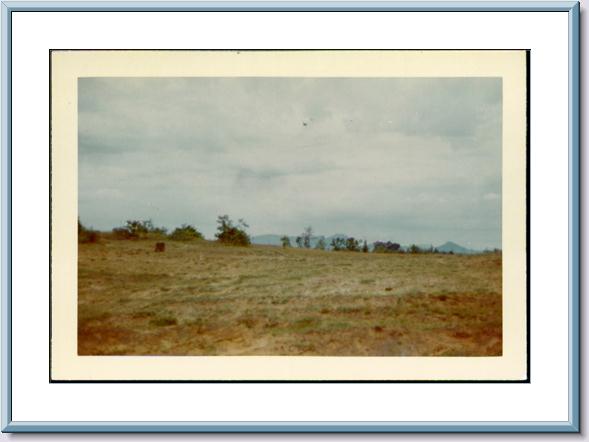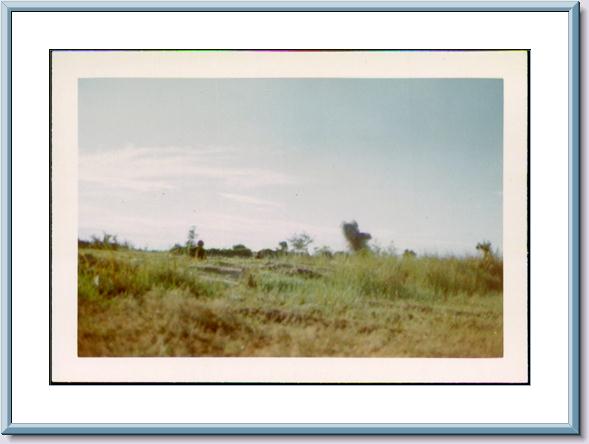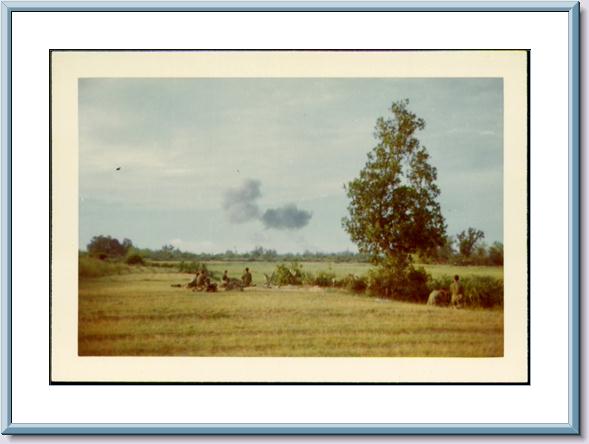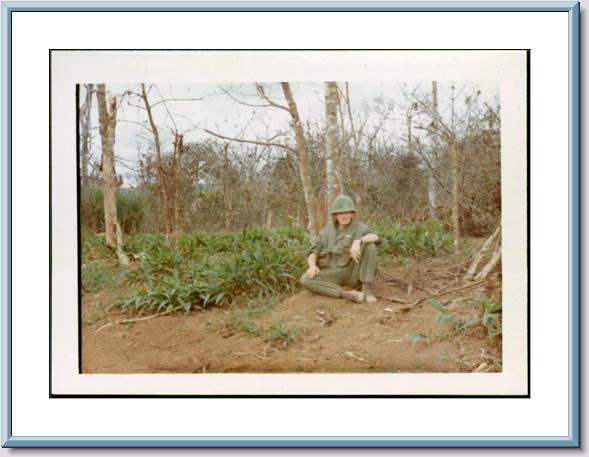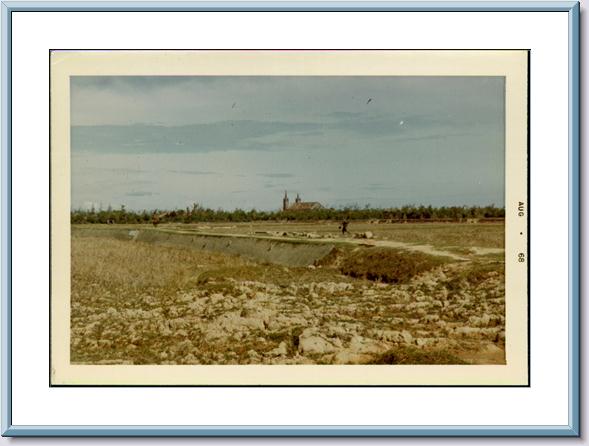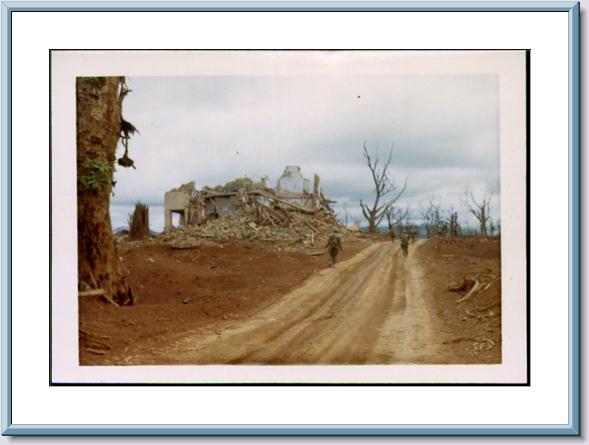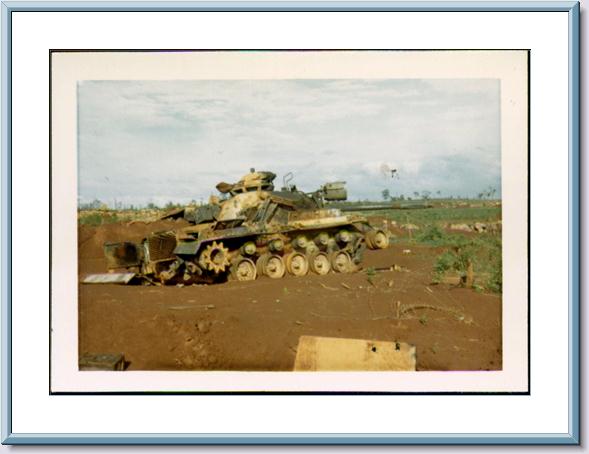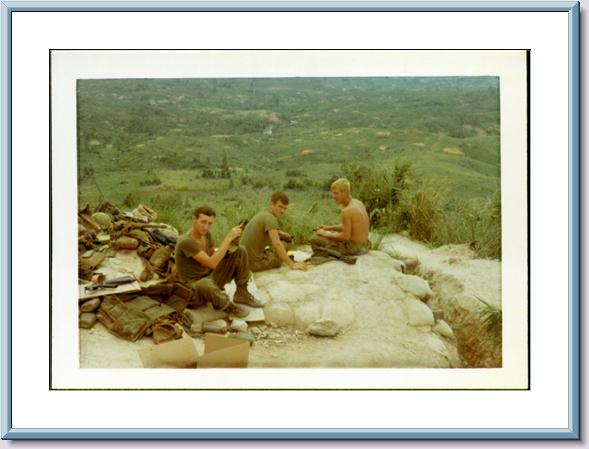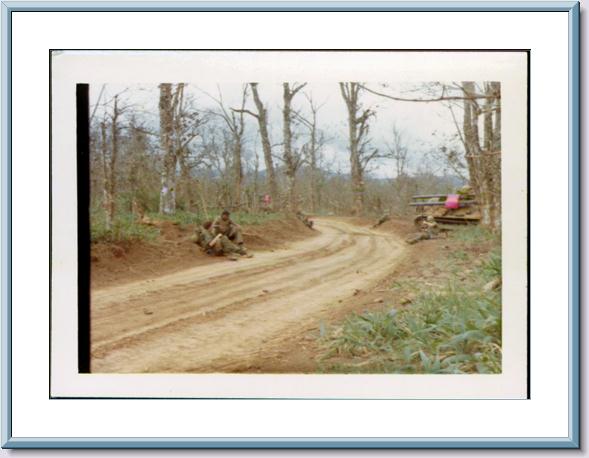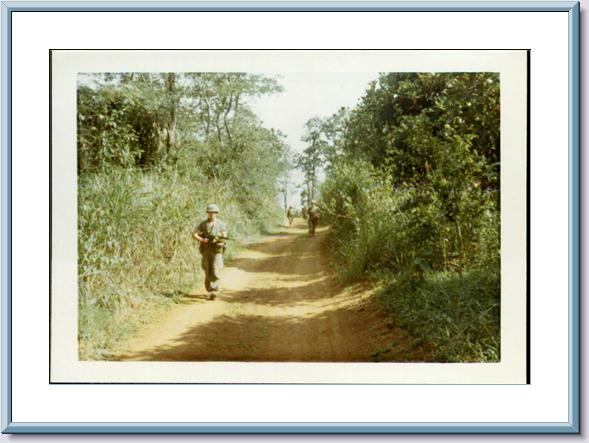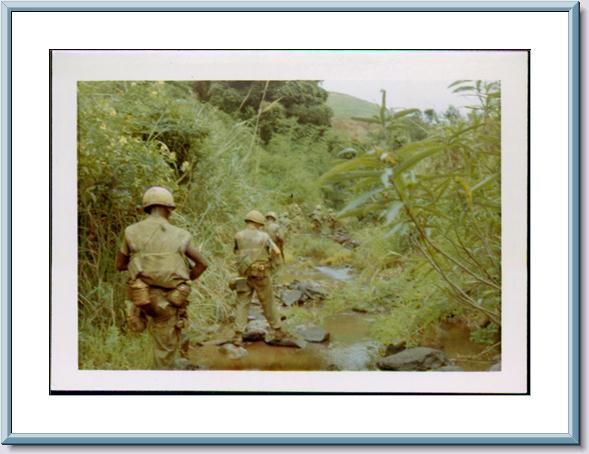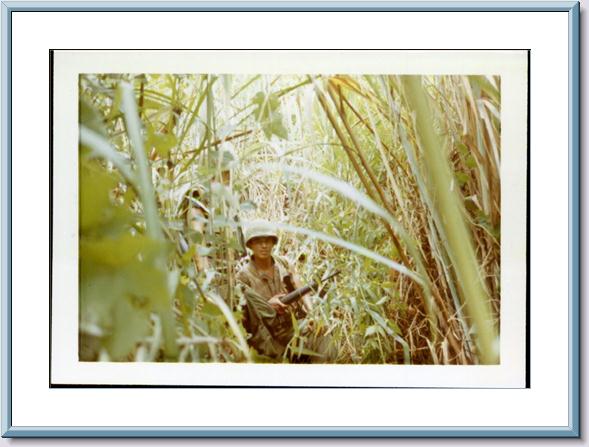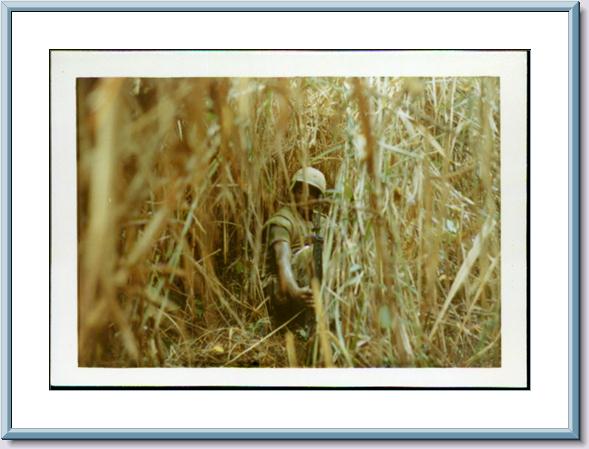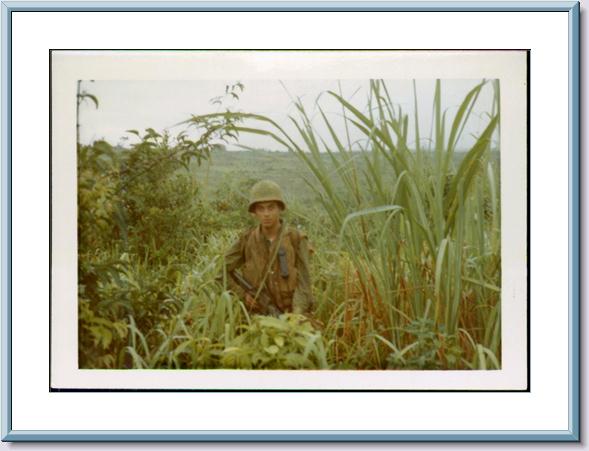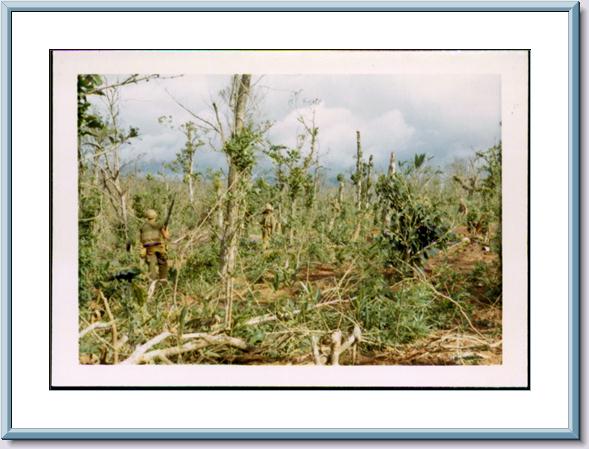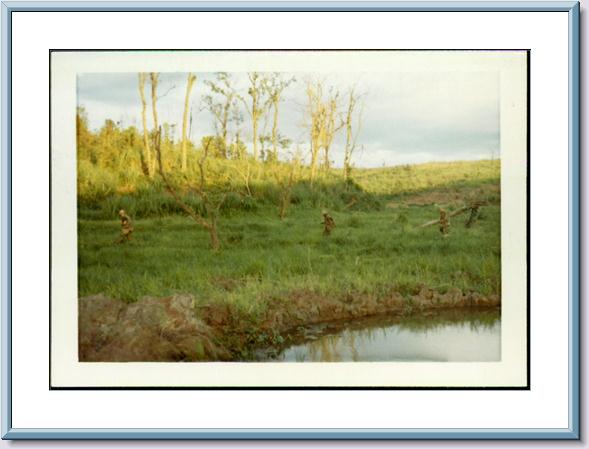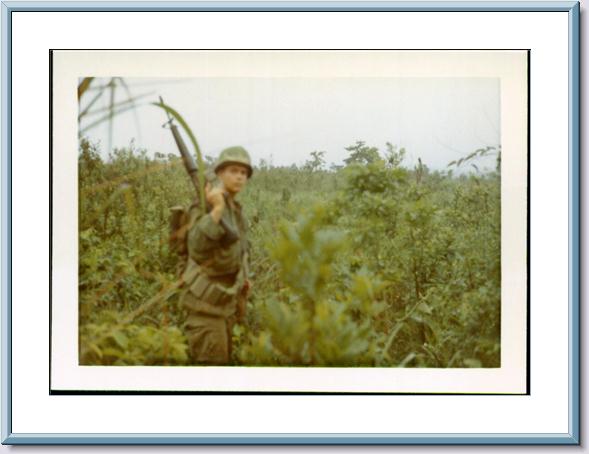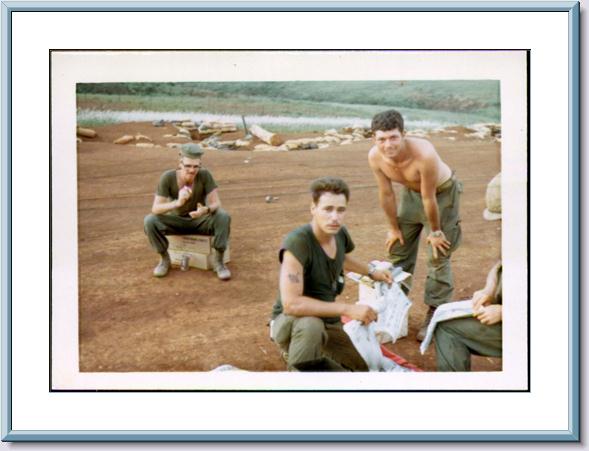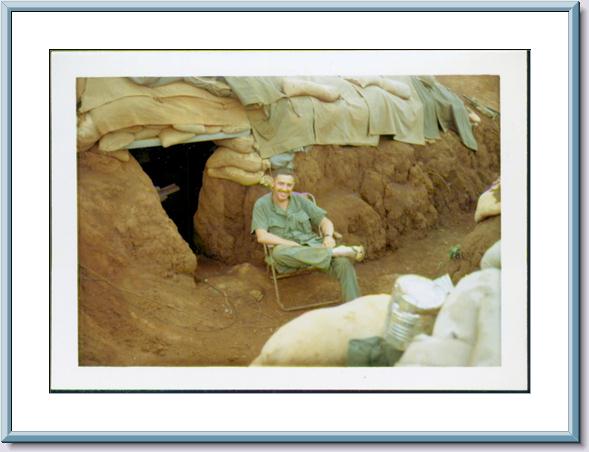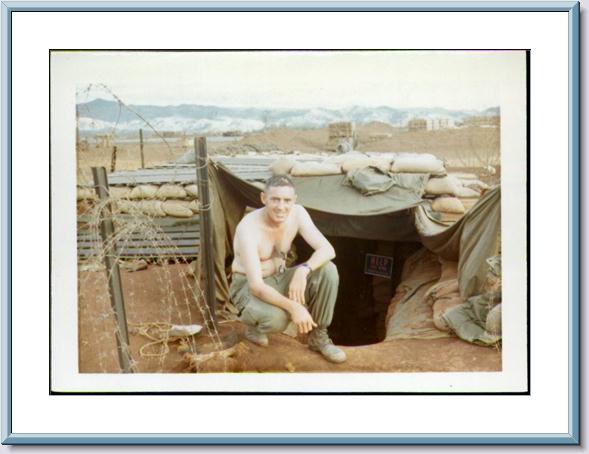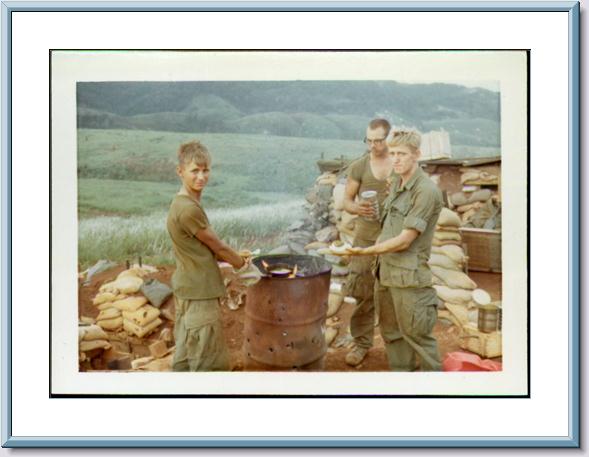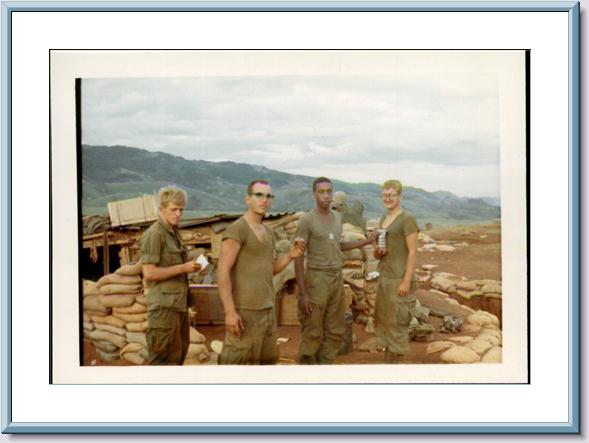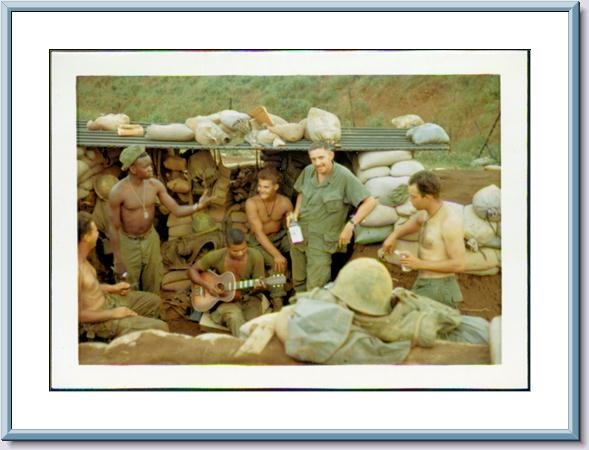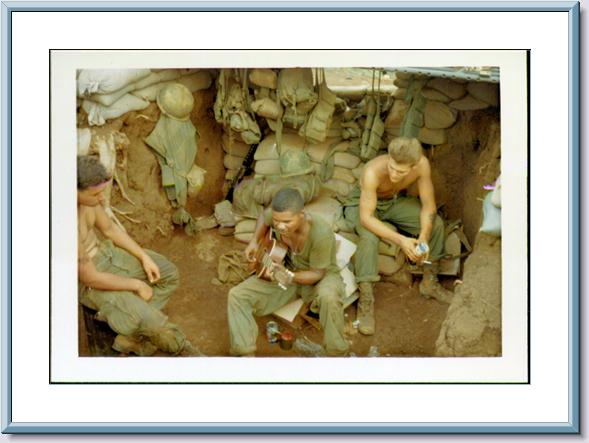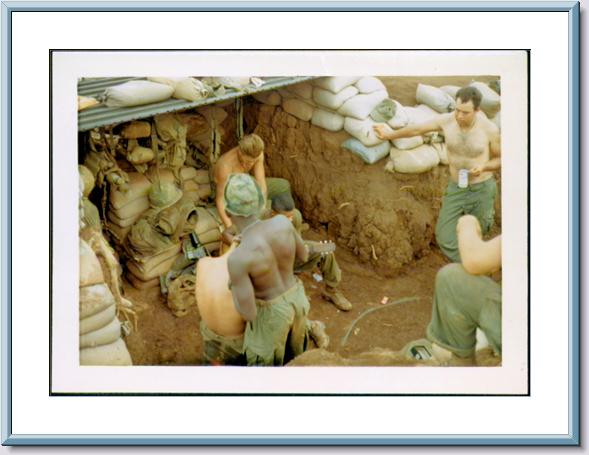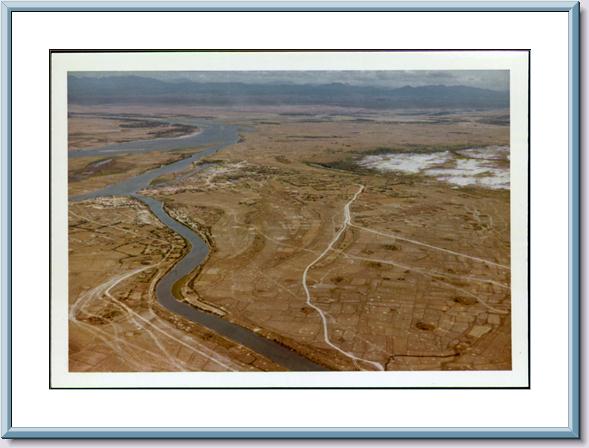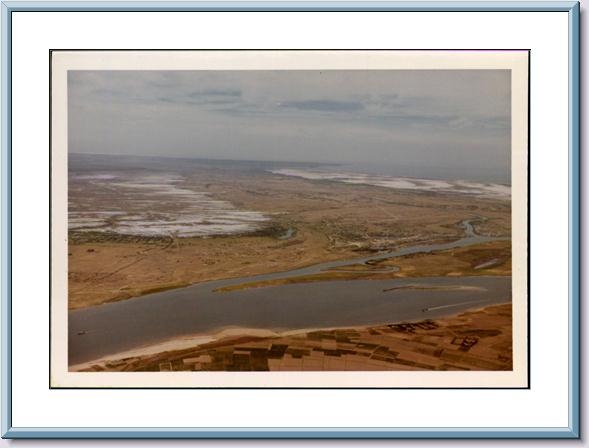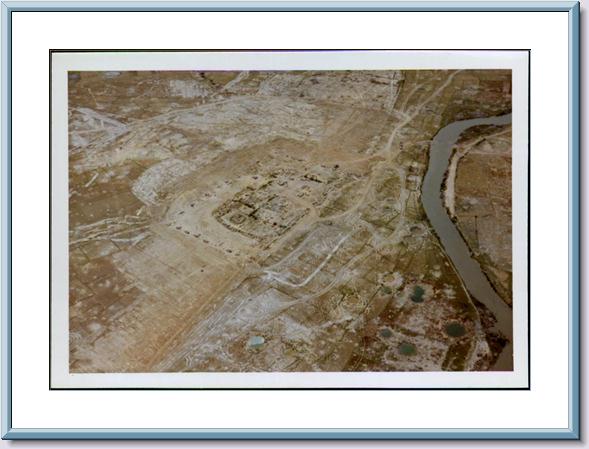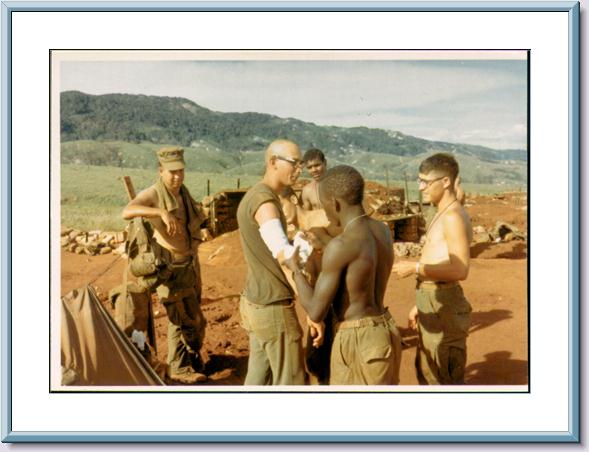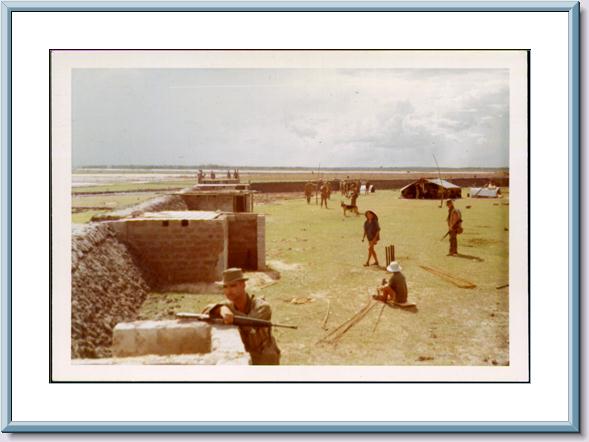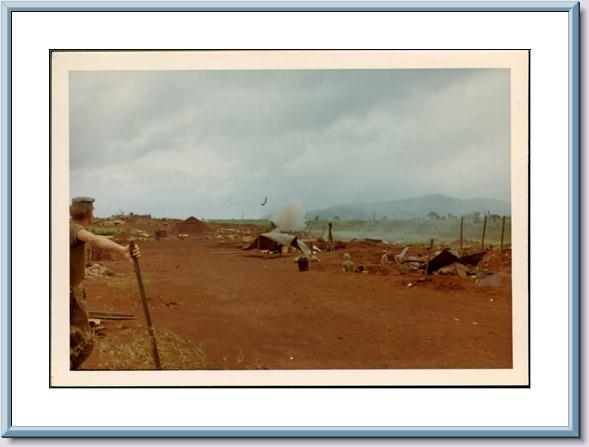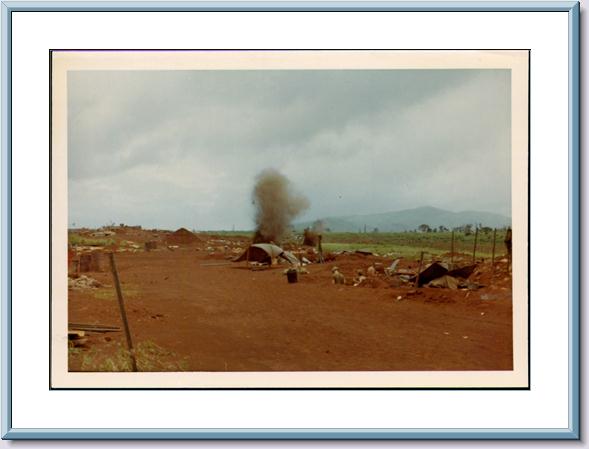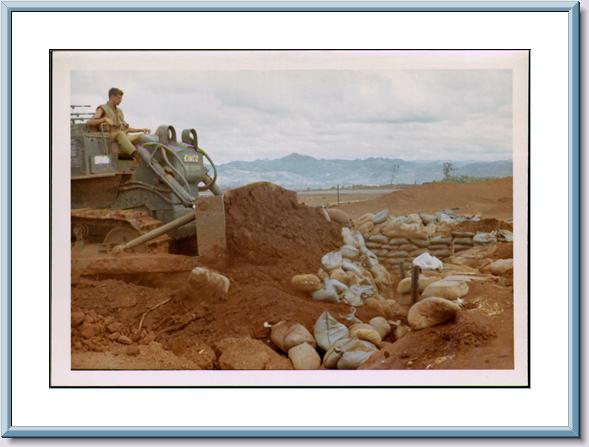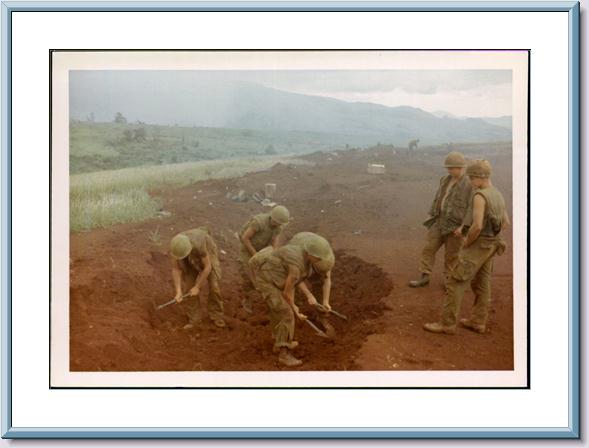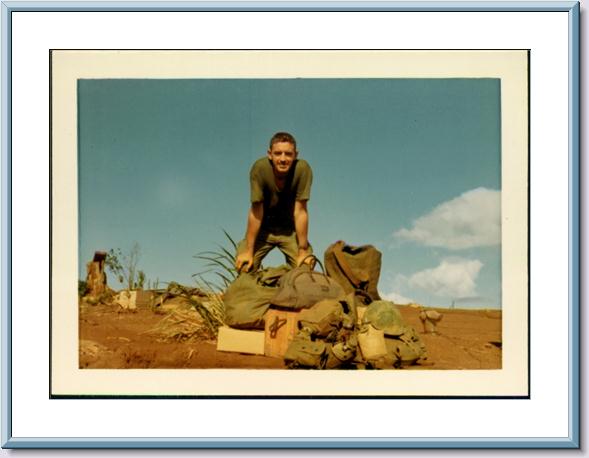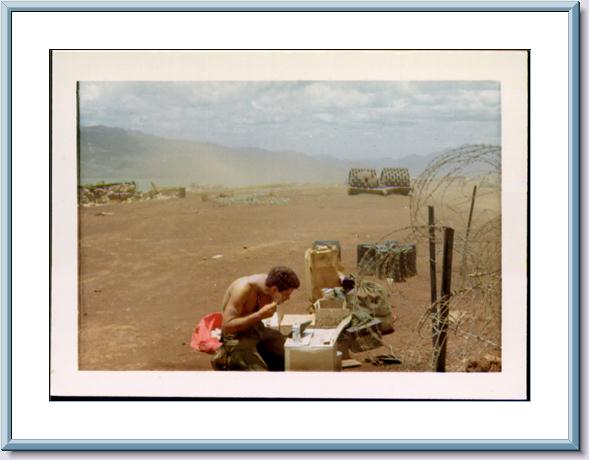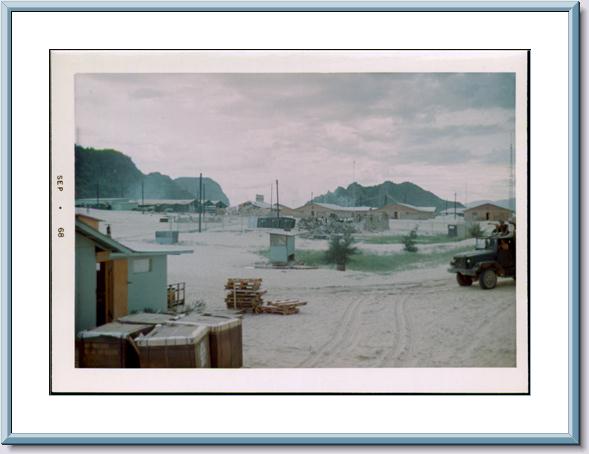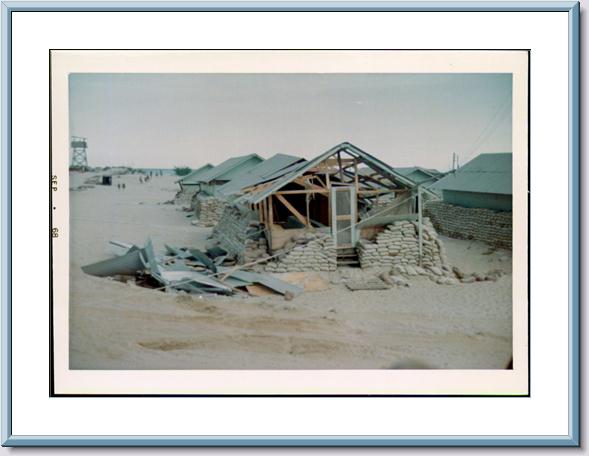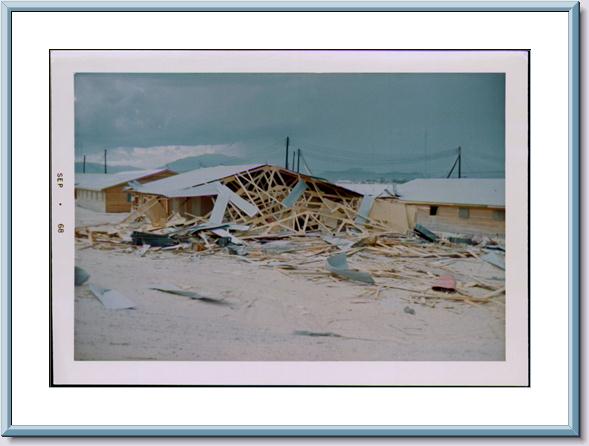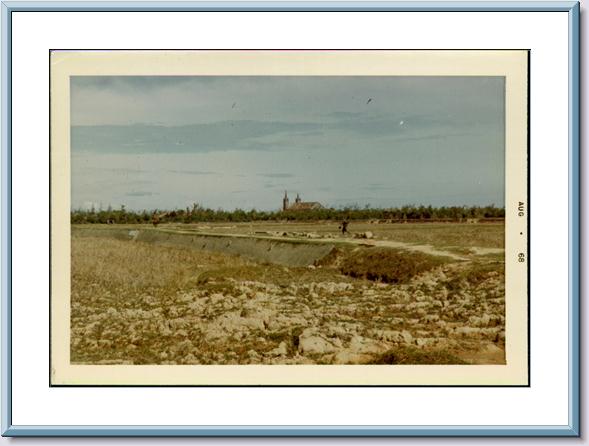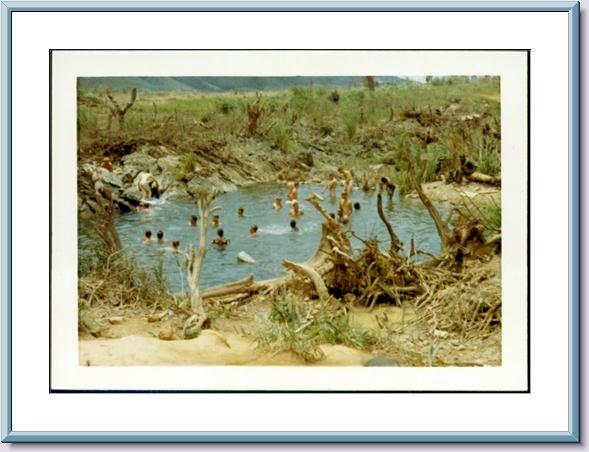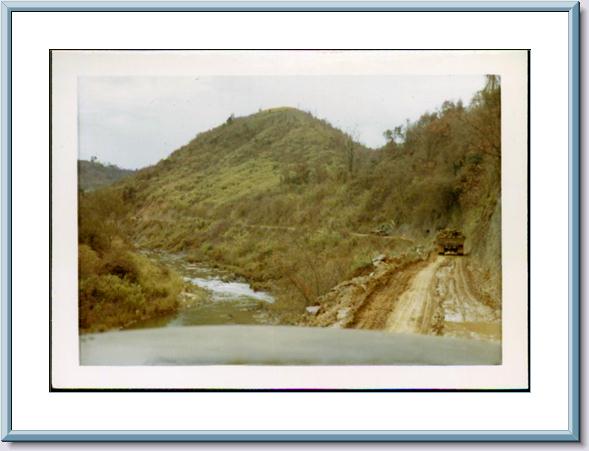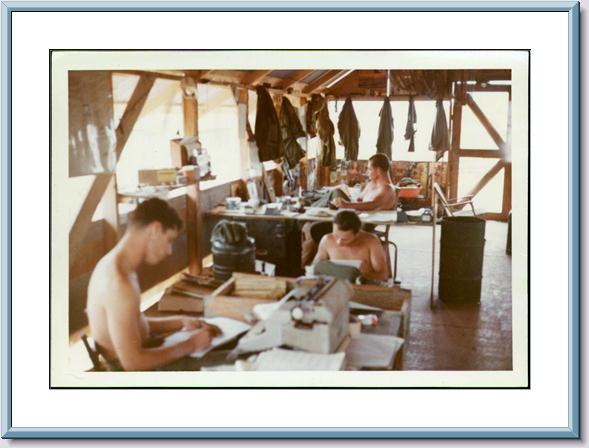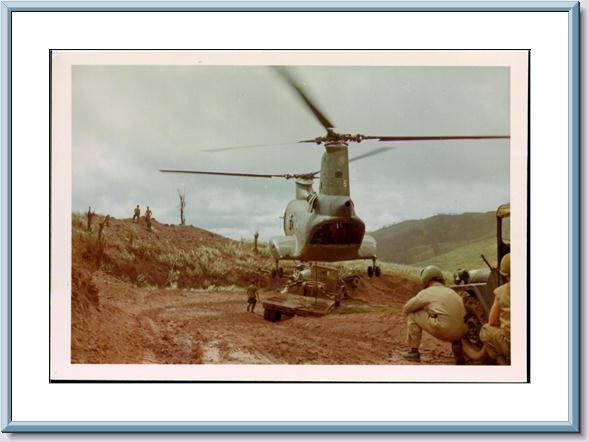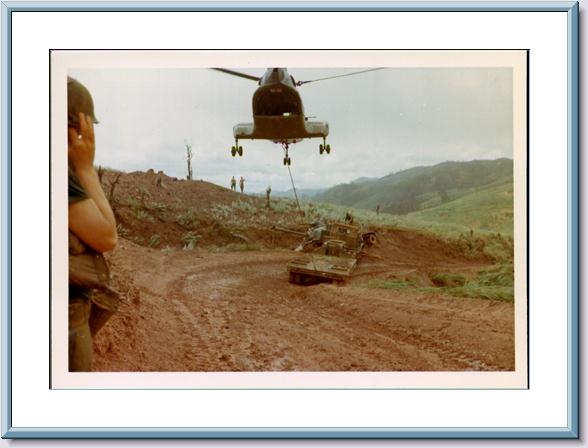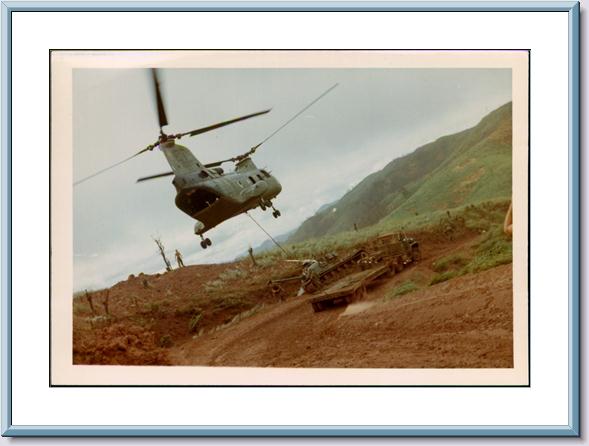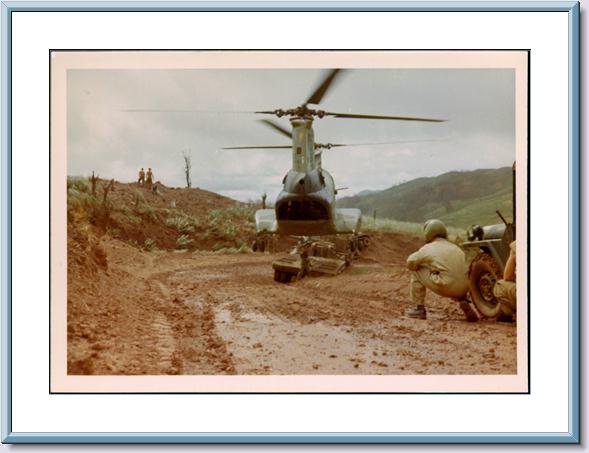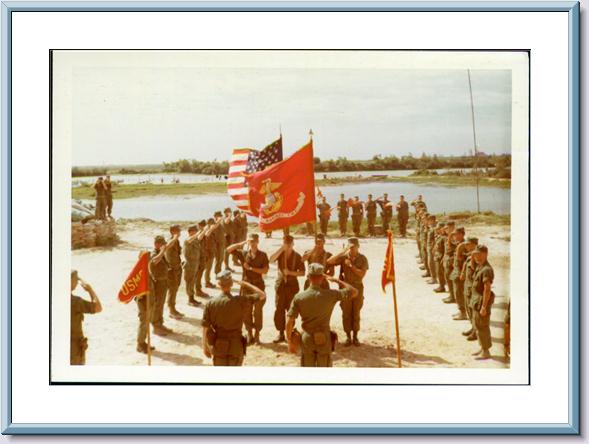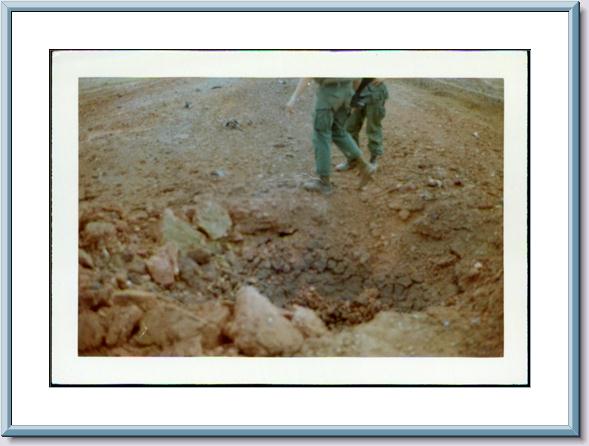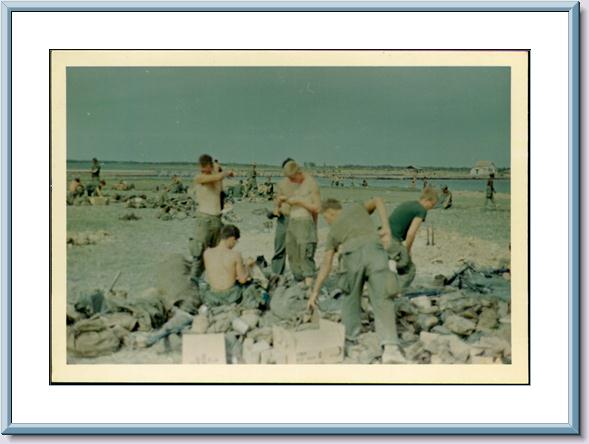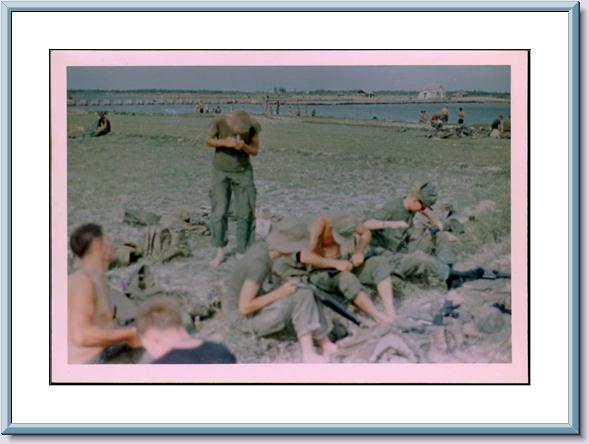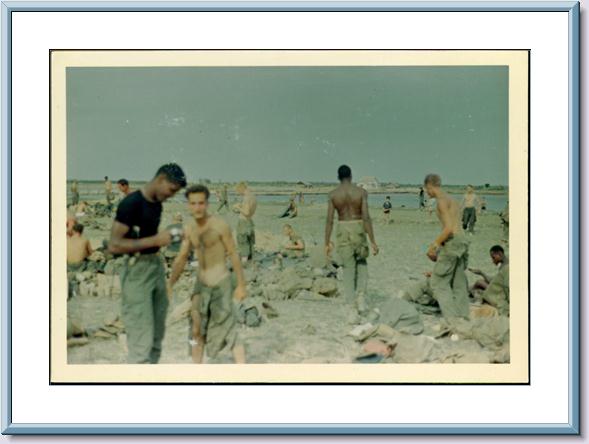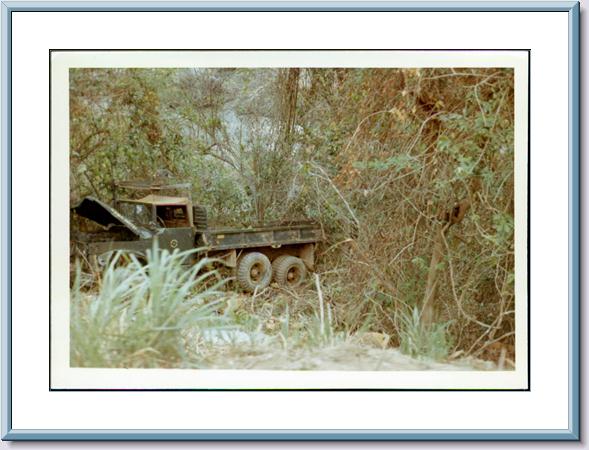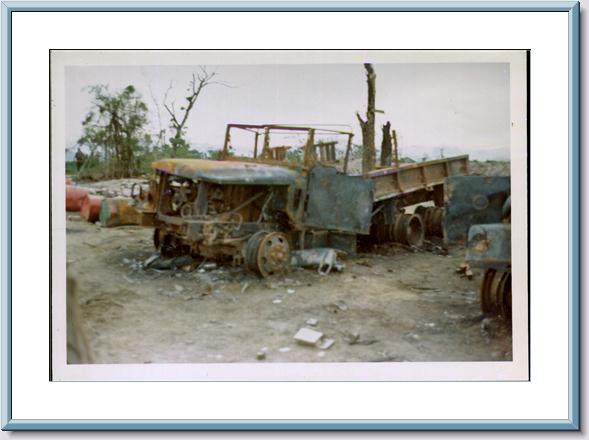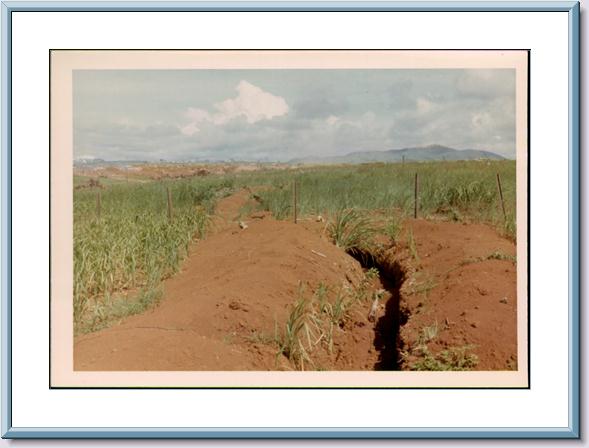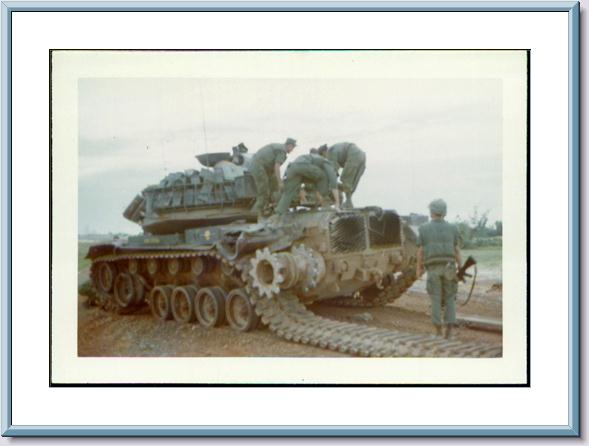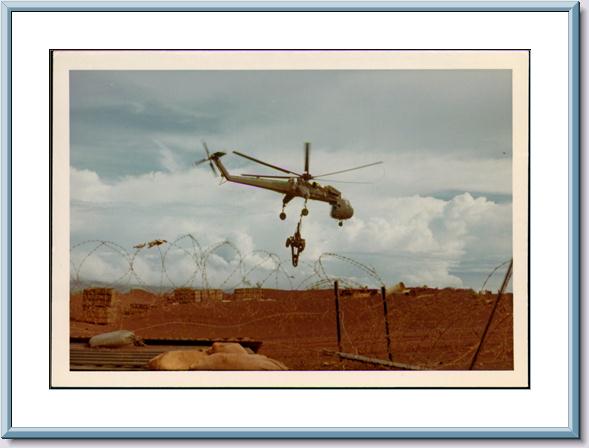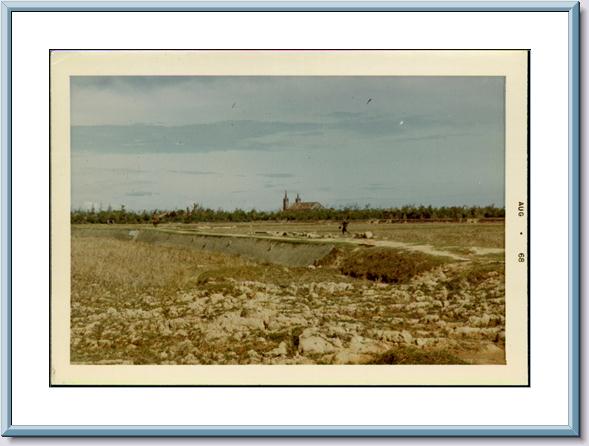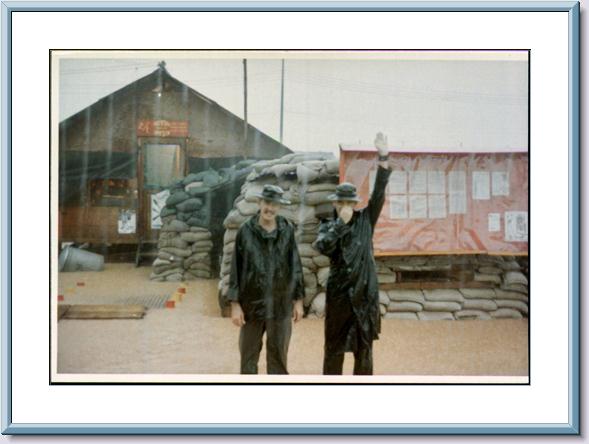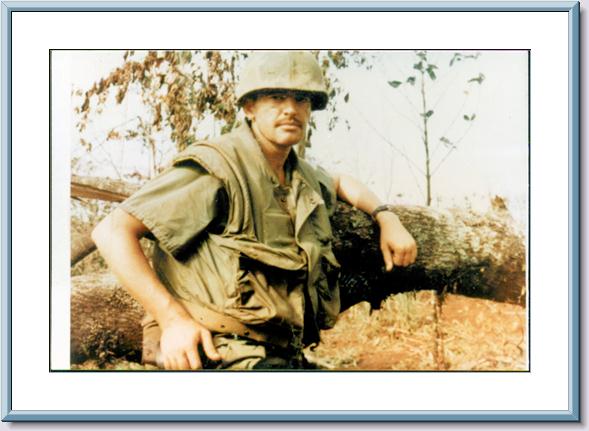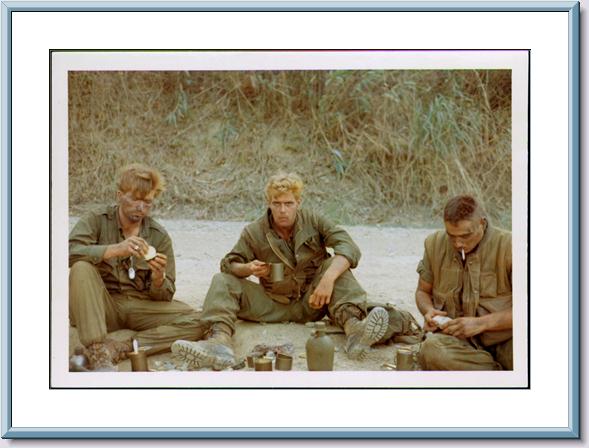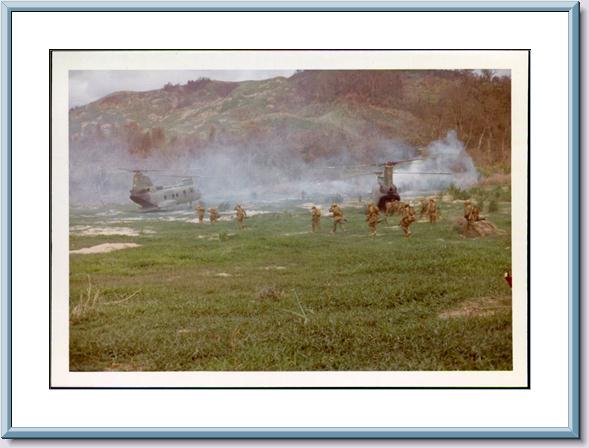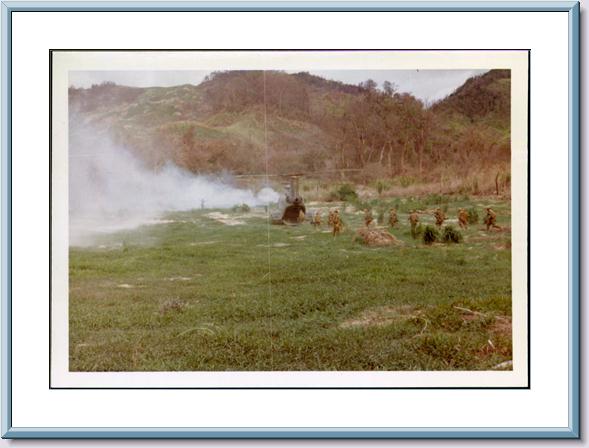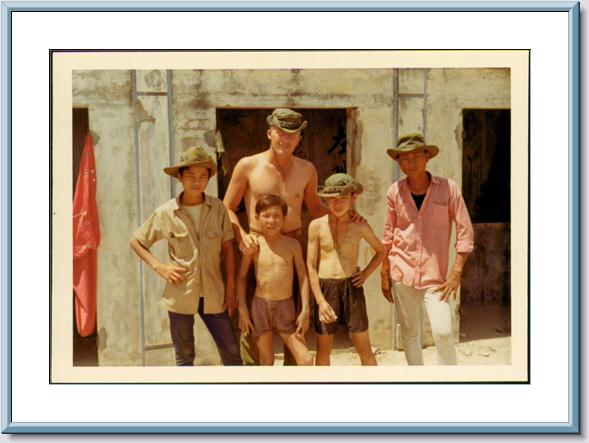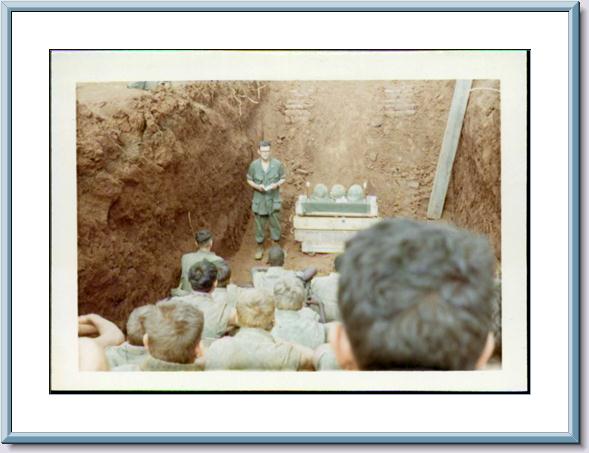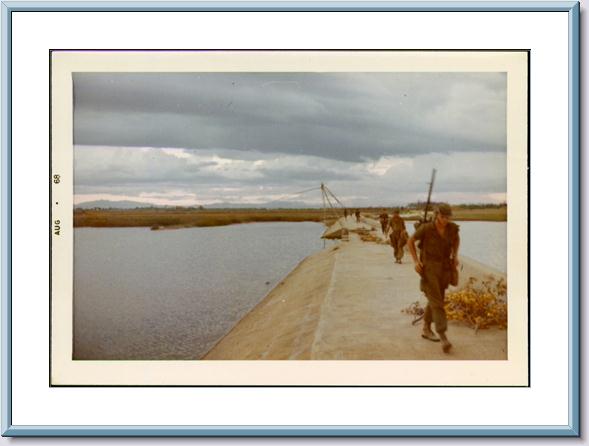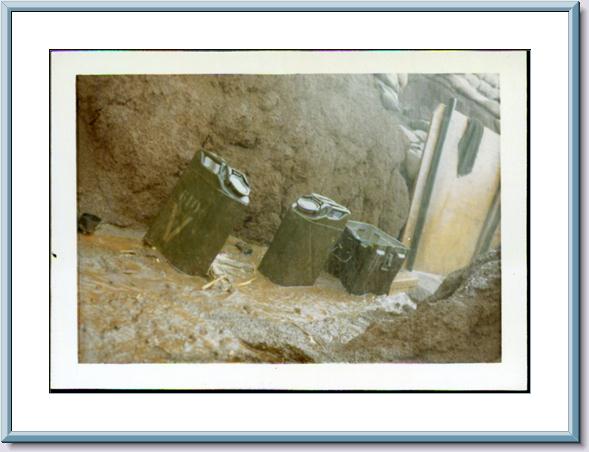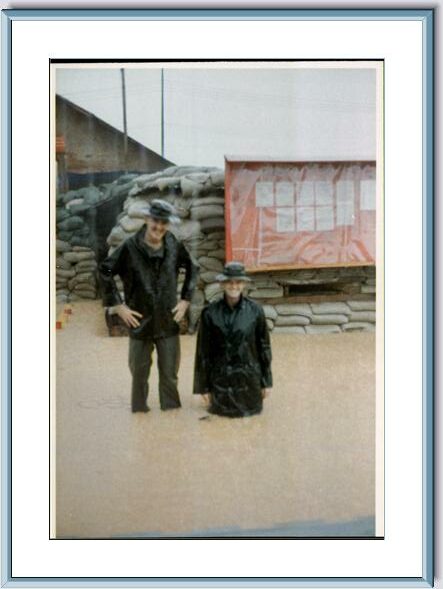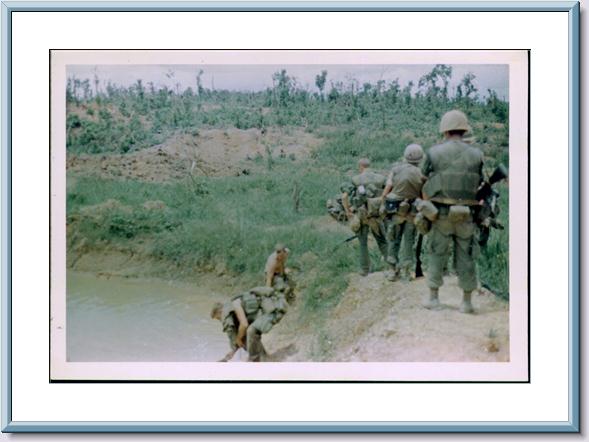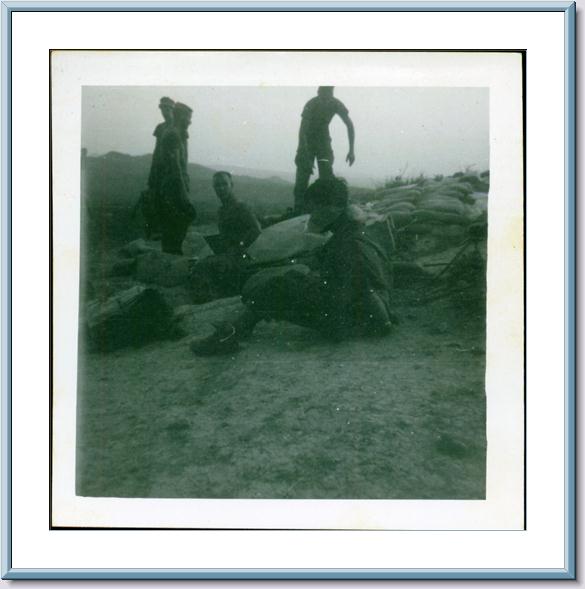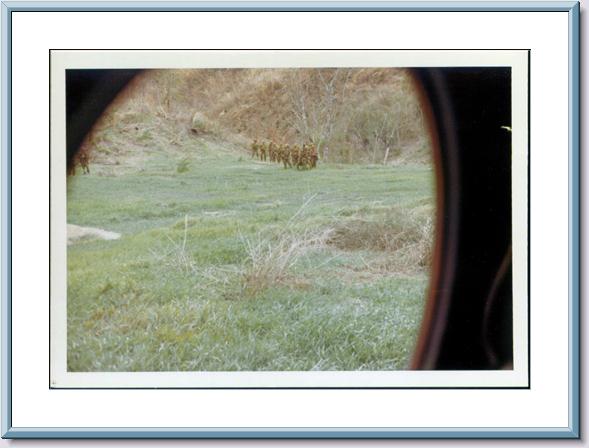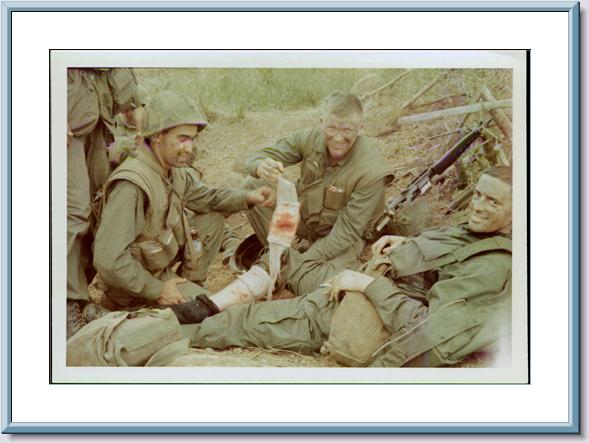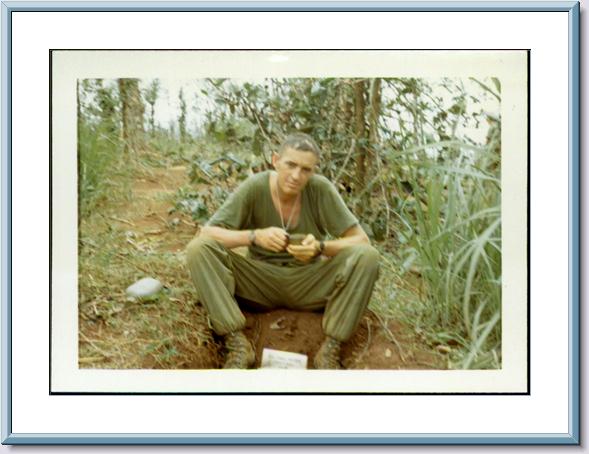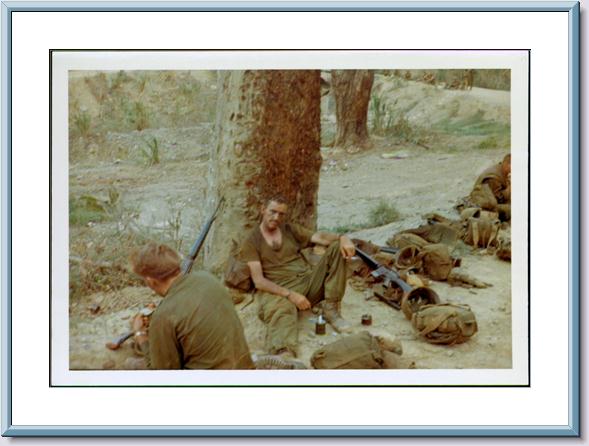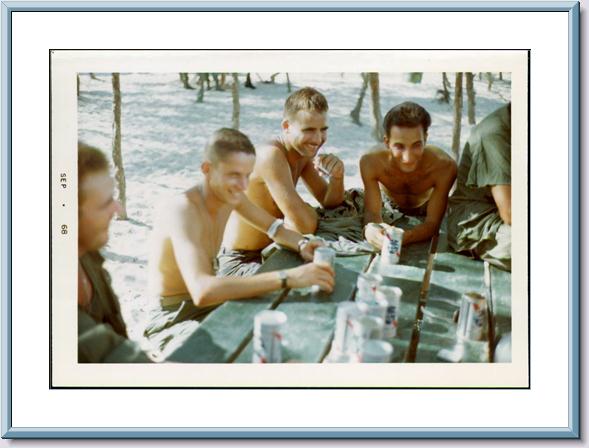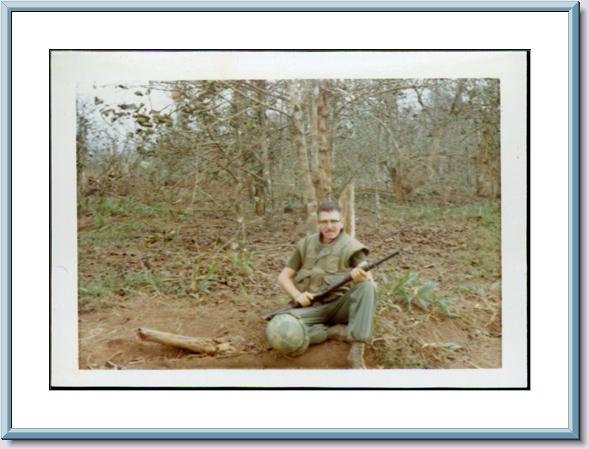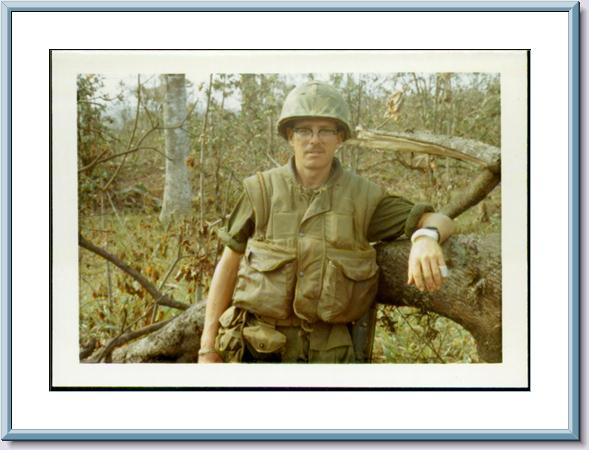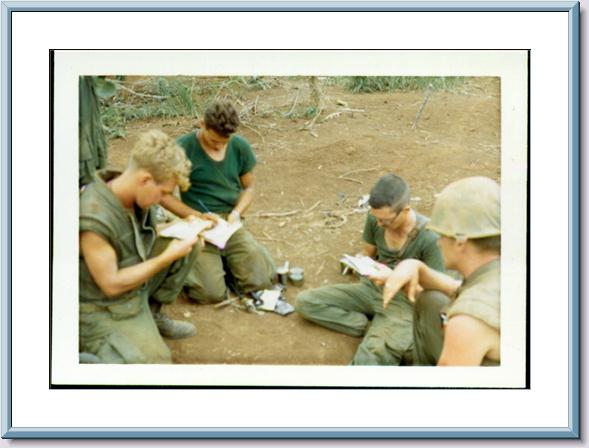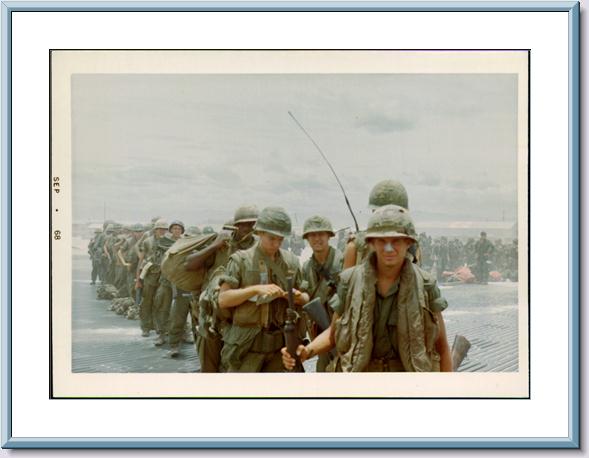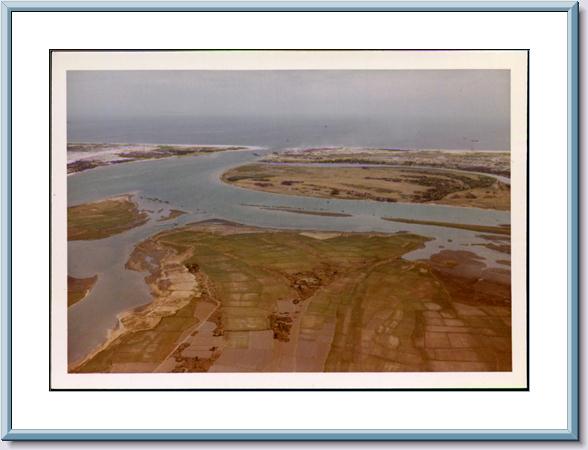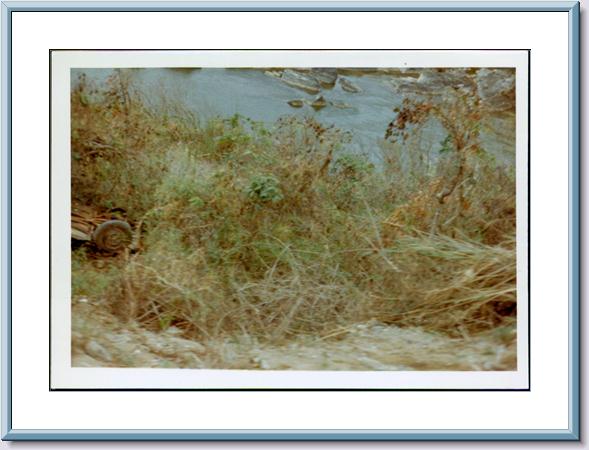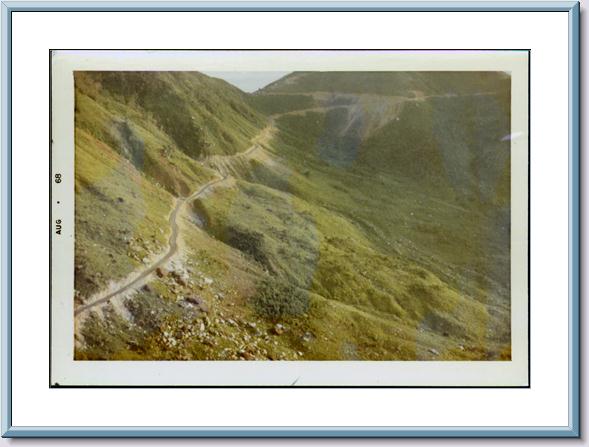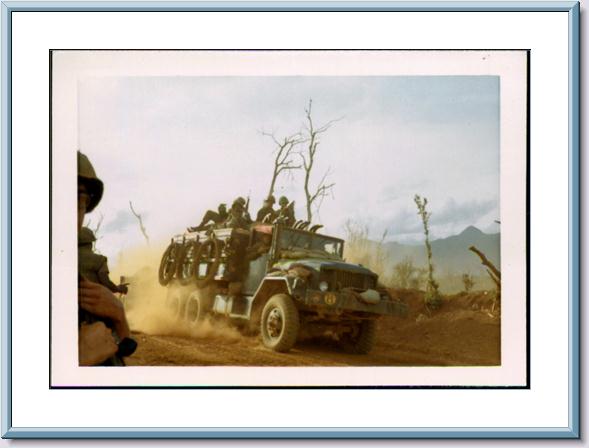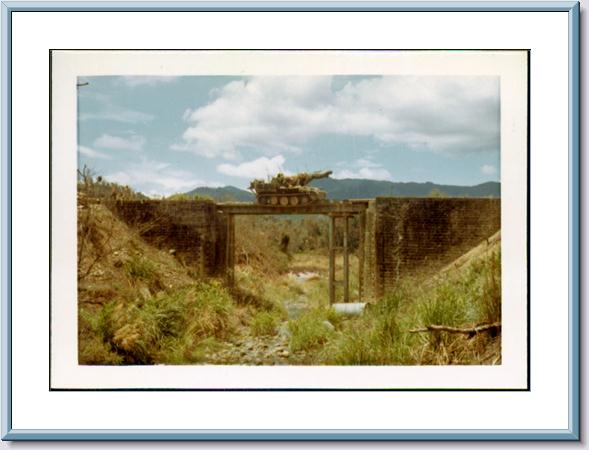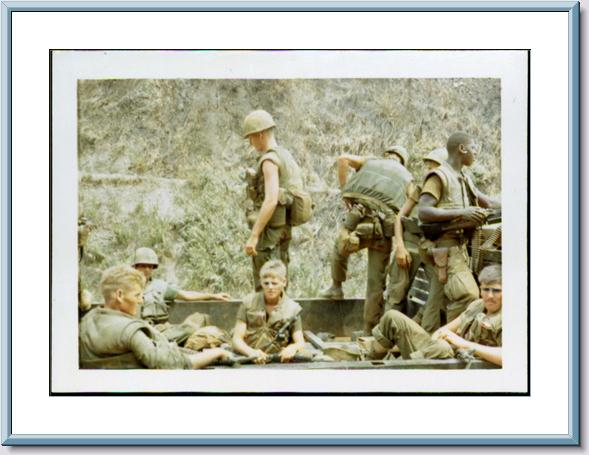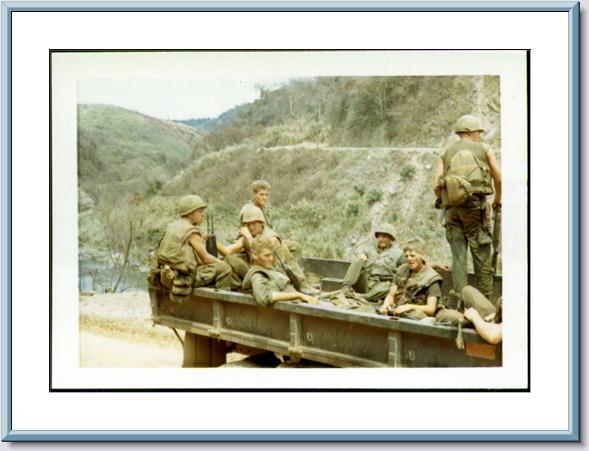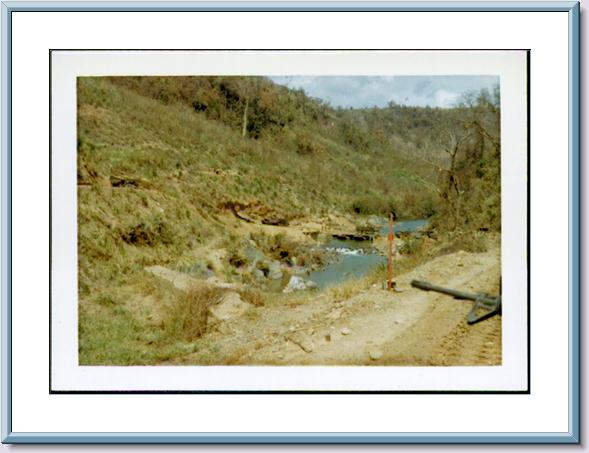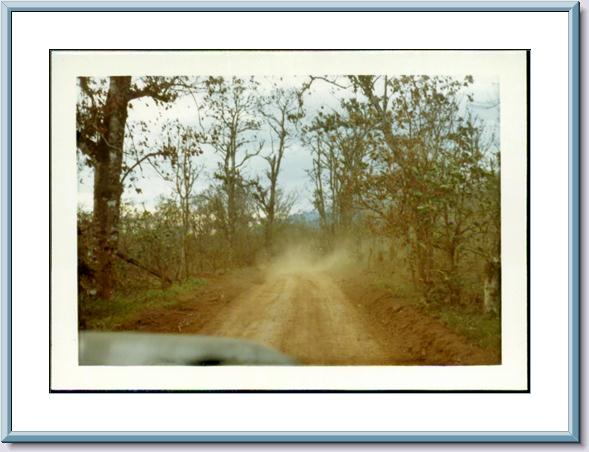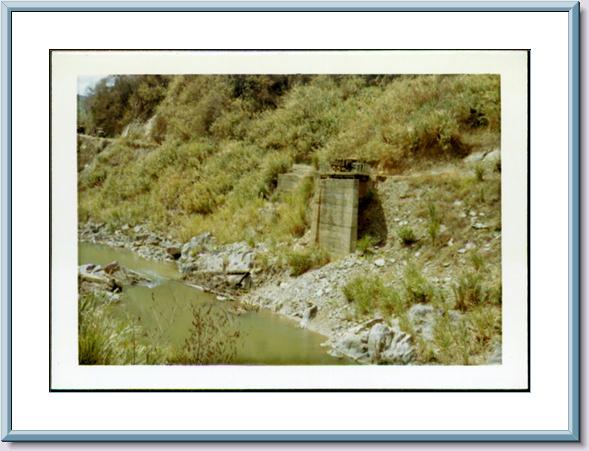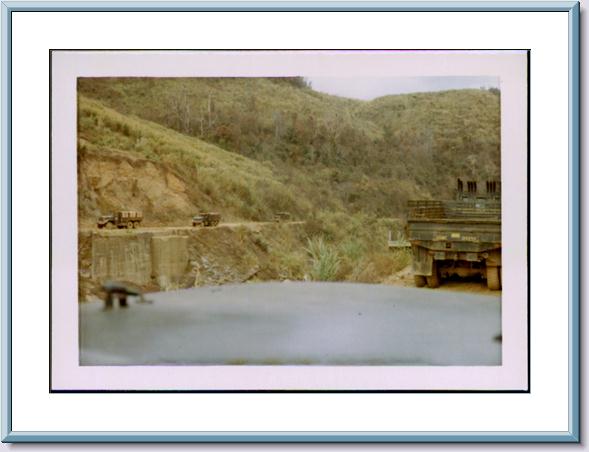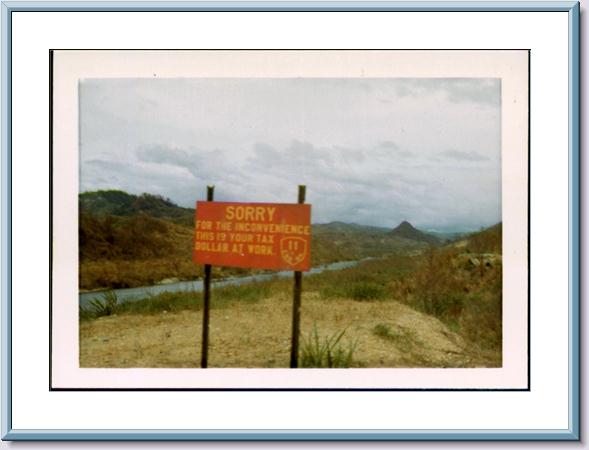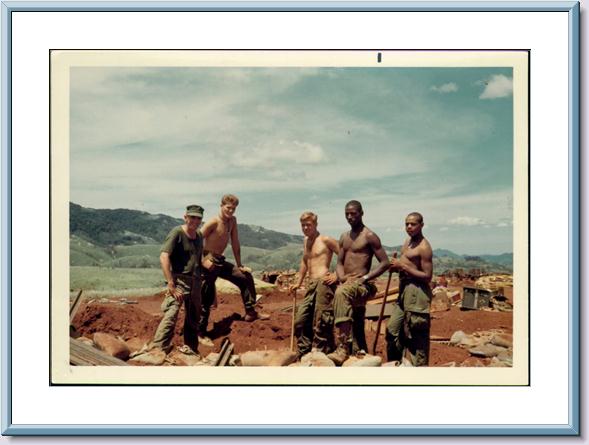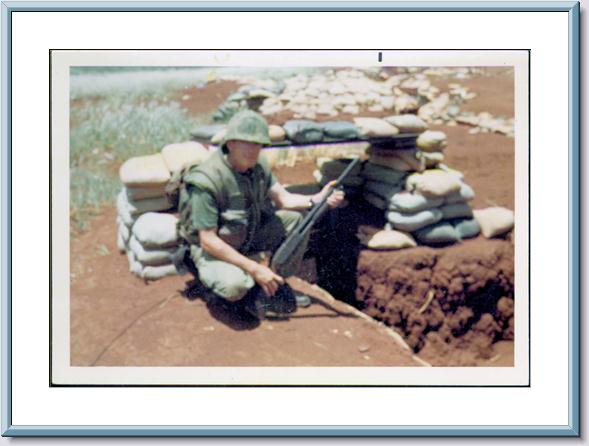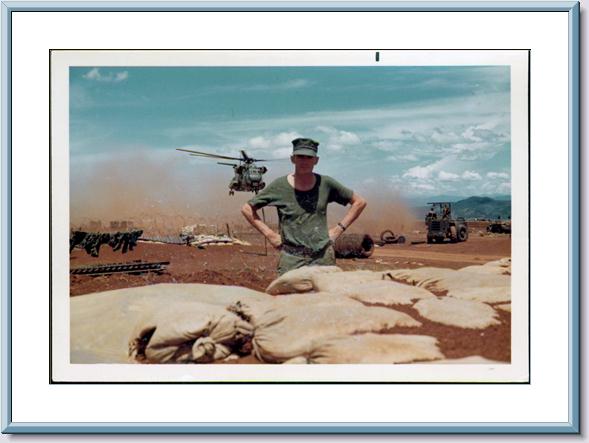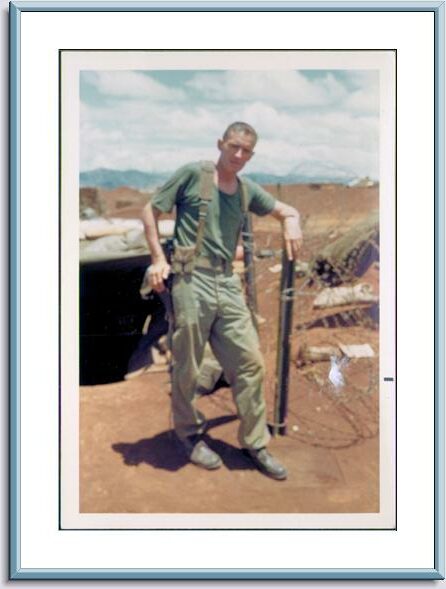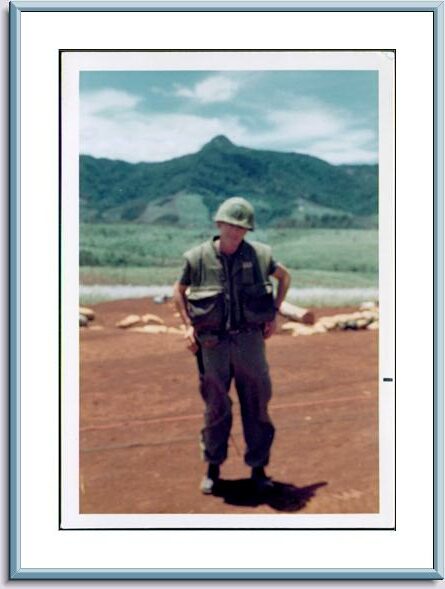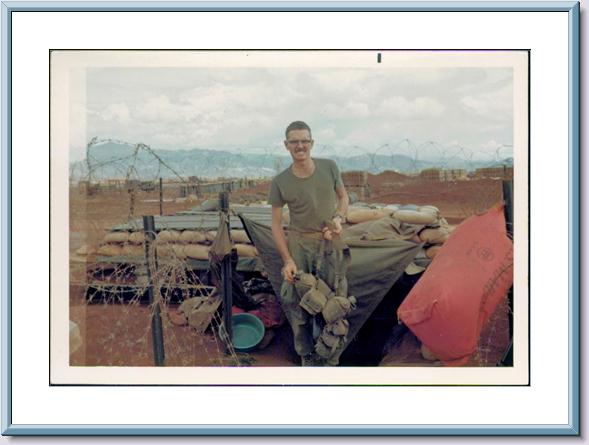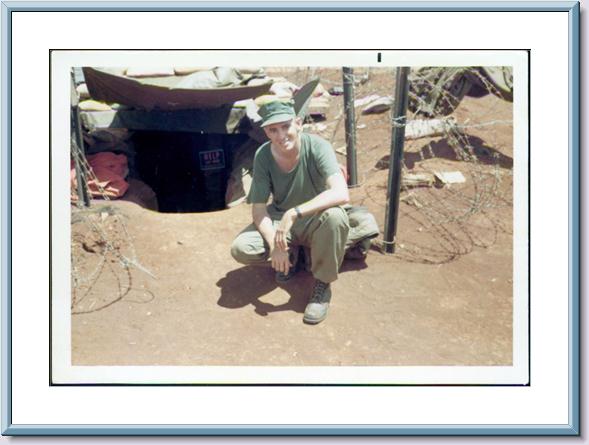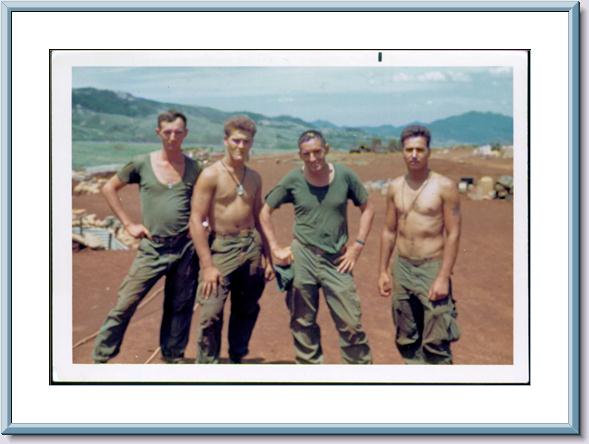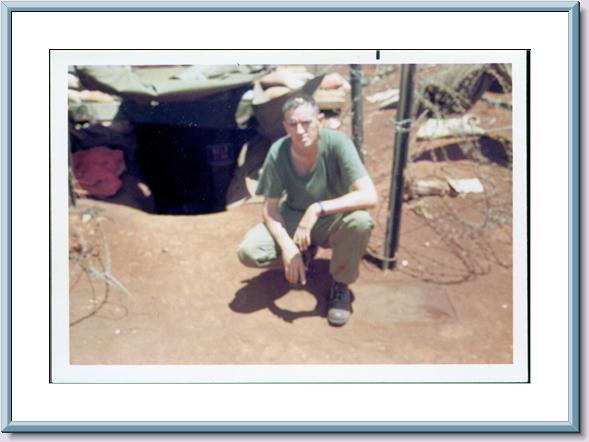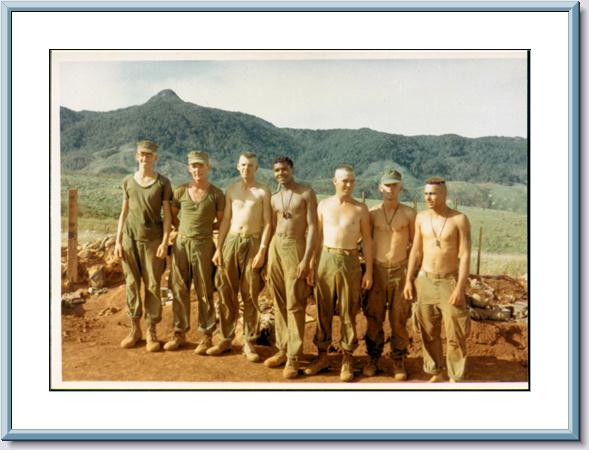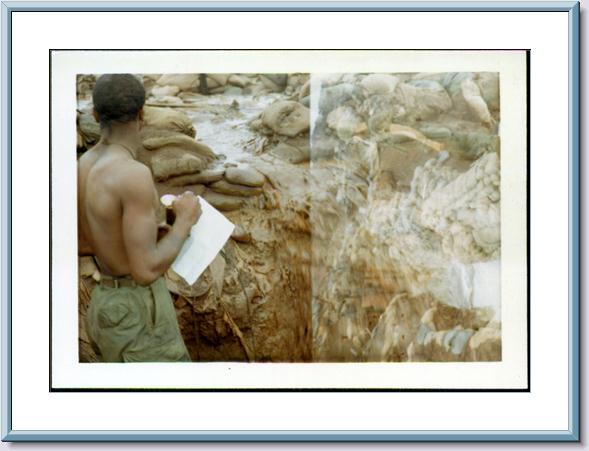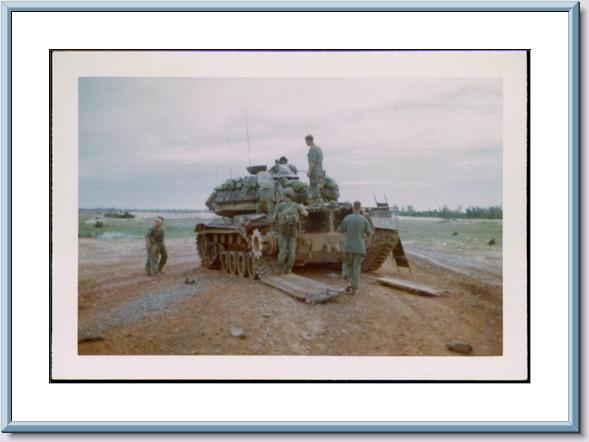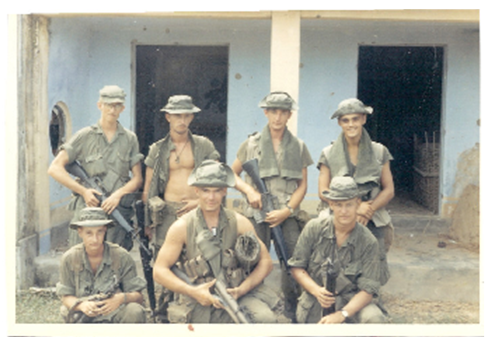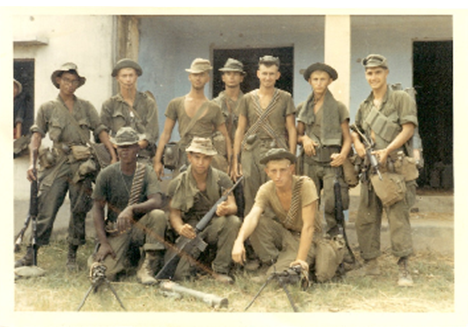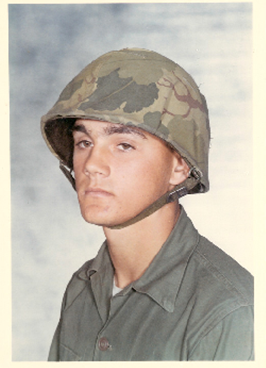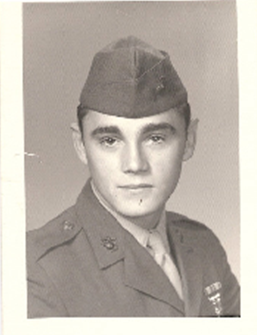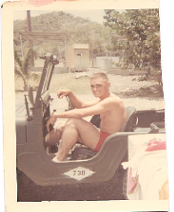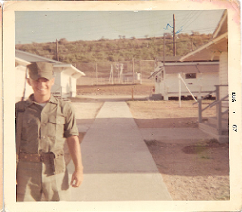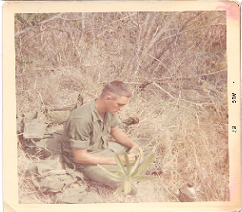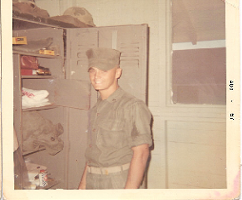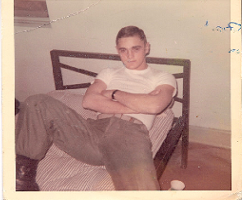OUR STORIES
An autobiography in this case, is a detailed description or account of an event or events which occured during our tours in Vietnam. As we tell our stories, we strive for accuracy but sometimes so much can happen in such a short period of time, we get facts mixed up.
As we have all learned from Jay, when we write or speak about the war we were in, we see it in our mind as the sliver in front of our nose. So slightly different versions of the same story are completely normal and expected. As you read them, simply enjoy the real life experiences of others.
There's a saying in the military that the difference between a fairy tale and a war story is that a fairy tale starts out, “Once upon a time ...” while a war story begins with, “You're not going to believe this, but ...”
What you're about to read fall into the latter category, they are true and many of us experienced them.
Carl King writes beautifully and the articles he has presented so far have been mesmerizing. Let's hope we can get more from him.
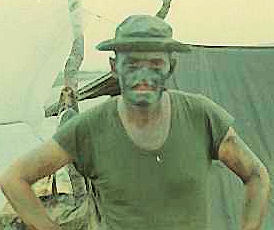

I departed the States from beautiful California in late Jan of 1968. I spent my last evening there with Jim Rogers who had been a Drill Instructor with me at MCRD San Diego. We had a few drinks at the Marine Memorial Club in San Francisco and he took me to the airport.
The flight to Okinawa was uneventful. The stay in Okinawa was short. Just enough time to store sea bags , get my shots up to date and sign any important papers. I was supposed to fly to Viet Nam on a commercial jet but the air Field in Da Nang was getting hit with rockets so they decided to fly us in on C130’s. Definitely not the same ride. Loud, uncomfortable and long!
We landed without incident and got to see a number of destroyed planes and other things alongside the runway that had been hit by rocket and mortar attacks. So, maybe being in Viet Nam is not such a good idea.
Once on the ground and out of the aircraft, the next stop was the administrative section where I was assigned to my unit. I was lucky enough to get 1st Marines. From there, I got assigned to barracks to wait for transportation to my unit.
My first night there proved to be exciting. The base got hit with rockets and machine gun fire. I had no weapons and had no clue as to what was going on. The only thing I could do was watch the pretty tracers and hope that I got through our first night without getting hit.
Fortunately, it was not long before I got a flight to Phu Bai where the 2nd BN 1st Marines had its headquarters. Upon arrival, I was taken to the Regimental Sergeant Major for assignment to a unit. Initially he was going to send me to Charley Company, but when I found out who the company gunny was, I begged him to send me anyplace but there. (The Gunny and I had been Drill Instructors together and I knew that I did not want to serve under him.) The Sergeant Major heard my story and sent me to Hotel Company. Sometimes, things work out.
At the Hotel Company office, I was assigned to the 1st Platoon and sent to supply where I was supposed to be issued my 782 gear (pack, poncho, weapon and the other things one needs to function in the field) I say supposed to be issued because most of what I needed was not there and some of what they had was bloody and torn. I was issued a pistol but no magazines or ammunition. When I asked for the missing gear, I was told I would get it when I got to Con Tien where my company was located. I was not a happy camper.
While I waited for transportation to Con Tien, The NVA opened the Tet offensive. Hue City got hit very hard.( the base at Phu Bai is very close to Hue City) I talked to a number of Staff NCO’s who were hauling supplies up to the Marines fighting in the city. (Charley Company was one of the units heavily involved in the house to house fighting.) It was a true slug fest.
My transportation to Con Tien was a truck convoy. I still did not have ammunition or magazines for my trusty 45 cal pistol. Going through Indian country with nothing to fight with was not my first choice.
I arrived at Con Tien with no problem and joined my platoon. Lt. C. V Taylor was the platoon commander and was a sharp, experienced officer. I was happy to draw him as my boss.
The Lt. and I shared a bunker so we had some time for him to brief me on the troops and let me know what he expected of his platoon sergeant.
My first night there, I inspected the line and asked questions of the troops about their defensive position. I found that most of them did not know what the Final Protective Line was. (It is a line where each Marine is supposed to fire his weapon when a specific signal is given. The FPL signal is given only when the enemy is about to overrun the defensive positions. It is very important that every Marine know the signal and the line he is fire down. It creates a wall of fire that the enemy has to get through in order to reach the defensive positions.
When I got back to the bunker and told the Lt what I found, we agreed that we would hold school the next morning. About two hours later, the Lt. asked me if I was awake and I said I was. He said he was scared to death that something would happen before we got the problem fixed. I assured him that we would get the problem handled the next morning.
The next few days, I held some classes, had the men test fire their weapons so I could see how well they handled them, and in general got to know my subordinate leaders. I sensed that both the Lt. and I were comfortable.
On my 12th day in country, we headed out for my first operation outside the defensive positions. To read about that experience, go to my story called “First Fire Fight” below this page.

Twelve days in country and counting. I’ve been assigned to the 1st. Platoon, Hotel Company, 2nd Battalion, 1st. Marines and sent to join them at Con Thien. I really haven’t had a chance to get to know the troops yet, but my first impressions are positive. First Lieutenant C.V. Taylor the Platoon Commander, is a good man who cares about the troops, and the squad and team leaders are also good Marines who want to do a good job. The living conditions are awful, and everyone is bored, due to no activity, other then standing lines, keeping watch, and cleaning their rifles. The supply situation is the worst I have ever seen. Everything they issued me is used, torn and in some cases, blood stained. They issued me a pistol and no magazines for the ammunition (I never tried it but I guess you could fire the 45 Cal. Pistol one shot at a time. I don’t think I would like doing so in a fire fight!) They told me I would get the magazines and anything else I was missing (which was a lot) once I got up to Con Thien. Not true. There is even less available here. I did find two magazines for my pistol, and an M16 rifle (with magazines). At least now I have something to shoot with.
Did I mention that the ride through “Indian Country” with an empty pistol was exciting? We got word that we are going out the next day to act as a blocking force for a larger operation. Everyone (well, really, it’s only the new men) are fairly excited about the possibility of making contact with some real live NVA. The night is spent briefing the squads, putting on our camouflage paint, cleaning weapons, and in general getting ready to move out at dawn.
We leave the compound and start our company-sized operation with no significant incidents. As we patrol through the countryside, headed toward our blocking positions, we note round holes in the ground that go down at an angle, very smooth on the sides. They don’t seem to have any bottom to them. Being good Marines, if we find something we aren’t sure about, we throw grenades into it, put our fingers in our ears and wait for the explosion.
We later found out that those deep, round, smooth holes that went into the ground at an angle had unexploded 500-pound bombs at their bottoms. Who says the Lord doesn’t take care of dumb Marines? I still have a vision of us standing there with our fingers in our ears waiting for the grenade to go off when a 500-pounder goes off instead. Not a pretty sight!
At any rate, we survived our search efforts on our movement toward the blocking position and got there without incident. We immediately set up our perimeter and began watching for NVA activity. Soon enough there was some. We spotted what appeared to be an NVA squad moving through a clearing about 600 meters from our position. Given that they were out of rifle range, which should have been our first clue, we decided to take a platoon-sized unit out to investigate. First Platoon was chosen.
As we moved out, I pointed out to Lt. Taylor that we should deploy to a wedge formation and take great care, as I felt that our spotting them had been too easy and that we might be being sucked into a trap. He agreed and we moved the troops into the wedge. The Lt. was up front near the point and I was in the back bringing up the rear. Not too long after we moved through the area where we had spotted the NVA, the point units ran into some NVA and a firefight started. The wedge was moved to a platoon on line and I moved forward to join the LT. He was standing beside a large tree, which was being bombarded with small arms fire.
Charlie obviously knew where the CP was located. Generally speaking, all hell was breaking loose. Lots and lots of gunfire all up and down the line. We ordered a cease-fire so that we could find out what was going on, and except for the right-hand flank, it got quiet. On that flank the shooting continued, so I went to see what was up.
When I got to the squad, I found that they were still engaged and a couple of men were hit. There was quite a bit of shooting going on, and it was hard to determine just what was what. I saw one man down and moved toward him when an NVA jumped up and started running away from me. I fired about 15 rounds at him without any noticeable change in his behavior. I later decided that either I had missed him (something about being so excited that I forgot to aim) or that he was one tough man. Anyway, I got to the Marine and he was hit but OK. Mike Donavan was his name, a fine Marine who came back to the unit to fight some more.
I noticed that the grenadier was pinned down and needed some fire support to get out of the spot he was in. Having already proven myself to be a fine shot, I decided to move forward and help him and started looking for cover to run to. I spotted a very small tree. I thought, “That’s too small to protect you,” but ran to it anyway. And, for a while the grenadier would shoot a round, duck, and Charlie would shoot the ground around him. While they were shooting at him, I would shoot at them. Great game that they soon tired of, so they shot me (in the right calf). I knew that darn tree was too small. Given that I was in an exposed position, I would not let anyone come get me, so I put a bandage on my leg and had the troops lay down a base of fire so I could get my butt out of there.
At about this time, the LT. got word to break contact and to pull back to the company perimeter. He called in mortar fire on the NVA that weren’t in our lines in order to distract them long enough for us to break contact and get some distance between us and them. Now, I got to tell you, that’s it is much easier said than done to break contact. It is a lot like having a Tiger by the tail and then letting go. I thought about trying to tell Charlie that it had all been a mistake, we were going home now, thanks for the fun time. But, they weren’t really in the mood to listen, so we shot our way out.
Good thing we left when we did. They were in the process of surrounding us, so we were reminded of what old Chesty Puller said at the Chosin Reservoir in Korea, “They are on our right, they are on our left, they are to our front and they are to our rear. They can’t get away now.”
The grenadier and I brought up the rear, shooting at anything that moved and keeping Charlie off our butts. We got back to the company lines without any major incidents, and I got treated by our friendly platoon Corpsman. Funny how adrenaline works. While I was in the fray, my wound was not an issue. I ran and fell and ran and fell, keeping the rear clear for over 600 meters, yet once I was “safe,” I could not walk, and had to be carried to the medivac chopper. Thirteen days in the country and already hit. Was that a bad sign or what?
The medivac was fast and efficient. Great guys those medivac folks! They took me to Dong Ha for my initial treatment. What a joyful process. The place was full of Marines who had been hit elsewhere in the country-many were in much worse shape than I was.
Interesting process the forward medical treatment units have. Everyone is put on stretchers and then the stretchers are put on sawhorses. Doctors come by and decide “too serious, probably won’t make it, put him aside”, or “not too serious, put him aside.” I was “not too serious, put him aside”, and aside I went for hours on my stretcher-feeling very sorry for myself. You know, wounded warrior and no one cares. At one point I got to feeling so sorry for myself that I actually started going into shock-pale, cool and sweaty. Realizing it (I used to teach first aid), I talked myself out of it and got a Corpsman’s attention so I could be treated. They took me to an X-ray room where a Corpsman told them to “put the project on the table”. I informed him I was not a project but a Marine and wanted to be treated like one. I think I was getting a little short with people.
They X-rayed me and took me to the wound debrising room. (Probably not called that but that’s what was done there; they cut all the meat away from the entrance and exit holes that might have been impacted by the shock waves of the projectile striking the body.) They put me on the floor to wait my turn for the cutting game.
Great place to wait. You get to see the whole process being done on other people before they do it to you. Anyway, after they cut and bandaged my leg, they put me in a wheelchair, pushed me out in the hallway and left me. By this time, I’m tired (up since 0430 and it’s 1900 at night), I’m hungry, (haven’t eaten since breakfast, and oh, for some more tasty C-rations), and I’m mad at the world in general and Vietnam in particular so I decided to manage myself and quit waiting for someone else to take care of me. What a concept! I found the mess hall, got myself fed, found a rack and almost got in it when they decided that they needed to move anyone they could to make room for more wounded coming in.
So, onto C-130’s we went and off to an Air Force Hospital in DaNang. We arrived at some ungodly hour 0200-0300, who knows or cares - at a very neat, clean and orderly ward, except now we’re mixed with Army troops being treated by Air Force medics.
Soon after first light, they bring us breakfast and serve everyone but a solider in the rack beside me who had been gut shot and was not supposed to take anything by mouth. He kept begging for some of my food and my drink. I would not give it to him, so he started harassing a Corpsman who was swabbing the deck for something to drink. At first, the Corpsman said no, but gave in and got the guy some water. Within a few minutes, the soldier was throwing up and going into convulsions. They tried to save him but could not. Just like in the movies: mouth-to-mouth, electric shock, shots, prayer, etc. Only none of it worked! He died! A waste. God, what a waste!
We were taken out of Da Nang that day and flown to Cam Ranh Bay, another Air Force hospital, but way to the rear. (If there was such a thing in Vietnam.) Here the treatment was consistent and professional. Shots every day, three times a day, wounds cleaned out twice a day. Nothing like having your wound cleaned out. Something you really look forward to. You know, rip the tape off the skin and pour something into the wound that burns like hell.
There was one soldier in particular that we all enjoyed watching his wound cleaned out. Seems that he got shot through and through in the ass. What this means is that the bullet went in his ass and out his ass, leaving a neat little tunnel, I think it was the debrising that made it neat, so he got the pleasure of having the demon liquid poured into the tunnel and cotton swabs run through it twice a day. Great fun for us, not much fun for him. If it weren’t for the cleaning part, I think a guy could get into doing a tour in the hospital. Clean sheets, hot food, showers, female nurses, and the Red Cross to play bingo with.
After a couple of weeks at Cam Ranh Bay, a bunch of us were transferred to Japan. Not so much because our wounds were bad as because the hospitals in country were filling up so fast that they had to keep moving those they could further and further to the rear, and Japan was really in the rear area as far as Vietnam was concerned.
I went to another Air Force hospital in Tachikawa Japan. Talk about clean and neat! Really good food, lots of pretty nurses and Red Cross workers for bingo. I do have one complaint though. Every morning at 0600, we had to get out of our beds and remake them so that we could get right back in them. Go figure!
After several weeks in Japan, I was declared fit for duty and sent back to Okinawa; and on my way back to good old 2/1 in Vietnam, only now they were on their way to Khe Sanh where I would join them.
Something I would like to say about my first tour in the combat treatment assembly line: I never met a Corpsman or nurse that deep down inside didn’t really care about the troops he or she was taking care of. Even the one that gave the kid a drink. Maybe he cared too much to be a hard ass when he needed to be.
I watched Corpsmen and nurses cry when men died, and I watched Corpsmen get killed trying to get to wounded Marines. I saw them in utter frustration at having to deal with all the WIA, but deal with them they did. I will never meet a Corpsman that I don’t say thanks to for the work he did. They were professional and saved our butts when they could. Thank God for them!
The troops, both Marines and soldiers, I met in the hospitals were simply great. Proud to be serving their country, even the “draftees”, and ready to get back into the fray. I was and am truly proud to be an American and to have had the opportunity to meet and serve with such fine men!
First of a series of excellent stories and excitement by Carl E. King, describing his true action historic situations that played a role in his life during 1968.
This story originally appeared in We Remember. A book of stories written by the men who served in the 2nd Bn 1st Marines, 1st Marine Division during Vietnam. It was compiled and edited by David and Marian Novak who took the stories anyway they could get them (hand written, typed, taped or by telephone) and put them in a logical order. This is a book well worth having.
Leatherneck Cottage Press, Leatherneck Cottage, Rockbridge Baths, VA 24473

May 16, 1968 was a very normal day at Khe Sanh; we experienced our usual episodes of rocket attacks, our c-ration meals, our lack of the ability to shower and the blowing red dirt that covered everything.
Living with the random rocket attacks at Khe Sanh taught us to always listen for the sound of outgoing rockets from Co Roc. (NVA rocket positions located just across the border in Laos) Because, from the time we heard the sound of the outgoing rockets at Co Rock until the time the rockets started to land in our area, we had about 5 seconds. Not a lot of time but enough if you were close to a bunker or a trench. If not, you just hid behind anything you could find and got as low to the ground as you could and prayed until it was over.
Our days were spent cleaning weapons, listening for incoming and waiting for the next mission. I was told once that war is made up of long periods of boredom punctuated by brief periods of intense excitement. A truer statement was never made.
We were about to experience one of those brief periods.
Word came down that we would be going on a company sized patrol the next day out past hill 471 which was south and a bit west of Khe Sanh. As a result, we spent the day getting briefed, cleaning weapons and looking forward to being outside the wire at Khe Sanh.
Bright and early on May the 17th, we formed up and headed out. Our mission was to patrol west of Khe Sanh to see if we could make contact with any NVA troops.
As we moved away from Khe Sanh, we uncovered a series of old bunkers that the NVA had used during the siege of Khe Sanh. Each of these had to be checked for weapons, bodies, and or live NVA. This meant, someone had to go inside each bunker to take a look see. Not a favorite job!
I went into one so that the troops would know that I would do it. It was definitely not my favorite thing to do. You drop into a very dark place. You can’t see anything for a few moments until your eyes adjust to the darkness. During that time, you are hoping like hell that there are no snakes, spiders or live NVA in the hole with you. Once you can see, you get to probe around the inside of the bunker looking for anything interesting and hoping that the damn thing is not booby trapped. Once it is clear, you get to come out and act like it was no big deal.
Our search turned up some weapons and some bodies that we had to dig up and search for intelligence information.
Once we cleared the bunkers, we continued our patrol. Not too long after that, 2nd Platoon reported that one of their squads had spotted what they believed to be Marines moving out in front of our positions. It took a few minutes to find that there were no Marines in front of us so it had to be NVA.
Once we knew that we had NVA in the area, we went to a company on line formation with my platoon (1st Platoon) on the right. We found some blue communication wire which we followed for a brief period until we spotted what we thought were the same NVA that 2nd platoon had reported. Shortly after that the company started taking fire.
The firing started on our left and as we moved forward. We were getting some fire but were not in the direct line of fire. It seemed that the 3rd platoon who was to our left had made major contact and was in need of support. Our job became simple. All we had to do was put the platoon on line and move to the left rolling up the enemy as we went.
Not so easy it turned out. Not long after we started our movement, we found ourselves on the edge of a very occupied bunker complex. We were now taking a lot of fire.
One of our Marines (a M-79 man from another platoon was shot through his weapon and into his elbow) went down and our Corpsman, Reid Isler, moved forward to treat him. Isler was immediately killed and another Corpsman, Chester Fontenot, started forward to treat him and was also killed. Both Corpsmen were new to our company We moved the platoon forward but found ourselves in the middle of a complex full of NVA. We were returning fire but were at a disadvantage because we were in the open and they were behind cover. It was a very bad situation.
One bunker had us pinned down; we needed to take it out to survive. I ordered L/Cpl Michael Donovan(1st Squad Leader) to take a team and knock the bunker out. He moved his team in place and started to move forward. His lead man, Pfc Richard J Allen went straight toward the bunker firing down into their position until he was shot and killed. Pfc Charles E. Mc Mullin rose up on one knee to fire into the bunker and was shot and killed. At this time we were receiving intense fire from a number of directions. Lance Corporal Jim Hayden (Platoon Radio Operator) advised that pilots overhead were telling us that the NVA were trying to get in position to cut us off and advising us in what direction to concentrate our fire.
We got radio communication from the Company CP to break contact and to pull back. I have to tell you, it is a lot harder to break contact than it is to make contact. In any case, we were able to use fire and maneuver to get our asses out of the complex and into some covered positions.
I did a quick head count and found that other than the men we knew were dead; we still had one man in the complex. I figured he was either hit or had not heard the command to pull back. I had to go see if I could find him and get him back to our position. I ran back to the complex and was lucky to find him in the first hole I went to. He was extremely happy to see me. He knew he was alone and was afraid to move. I got him close to me, and we did a very quick run back to the platoon.
From this point, we were ordered to pull back with the company to a point 500 meters form the bunker complex because they were going to bring in close air support that would be dropping 500 pound bombs on the complex.
Once we got to a safe area and were waiting for the air strikes, I thought I better check the troops to make sure they were ok. I figured they would be down and upset and would need some motivation for the trip back to the complex after the air strikes. What I found surprised me. They were laughing, joking and reading comic books. Really doing everything but thinking about what we had just experienced.
After the air strikes, we moved back in to the complex. The NVA who had survived our assault and the air strikes had left the area. They had left their dead. We had to check out the bunkers and check the bodies to make sure they were dead. Once we knew the area was secure, we took a break to eat some c-rations. I was eating my chicken noodles and looking at a dead NVA whose brains had been blown out thinking,” That’s why they call it gray matter.”
Medevac choppers were brought in to take out some of our dead and wounded. We thought that they would come back to take out the rest of our dead and wounded but someone decided that it would be best if we carried them out. It took us some time to clean the place up (search for intelligence) and gather our dead so it was getting late-as in, getting dark by the time we started back toward Hill 471.
We formed up in a company in column formation and headed back to Hill 471 where we would spend the night. The walk back was not easy. We didn’t have stretchers so each body was being carried by 4 Marines. (Each holding an arm or a leg). There was a lot of pulling and jerking as the Marines moved over rough terrain. This caused the skin on the body’s arms to tear so we had to stop a lot to change carriers and to cover the damaged areas on the bodies. One of the wounded was in pain and was making a lot of noise which made us all nervous because it let the NVA know exactly where we were.
Despite all that, We did manage to get back to Hill 471 without further incident.
After action reports indicated that we had probably depleted the NVA ranks by about a platoon. The air observers spotted 19 bodies and we know there were dead in the bunkers. This action had to have a negative effect on them because they were planning to ambush the morning road sweep coming out of Khe Sanh on the 19 of May. (See my story Bloody Day in May).


19 May 1968
Hotel was operating a company-sized patrol outside of Khe Sanh and had set up on Hill 471, which overlooked the MSR between Route 9 and Khe Sanh base.
We had spent the day checking out bunkers and tunnels in and around Khe Sanh village, without any enemy contact. We did discover one very important aspect of searching a bunker. If you throw a grenade in it, the dust never settles, at least not in time to allow for any kind of orderly search process, so we opted to search each bunker without the aid of the trusty grenade toss. Needless to say, there are not a lot of things that are more exciting than climbing down into a black hole and having to sit there until your eyes adjust to the darkness, if they ever do. Yes, indeed, nothing like searching a dark bunker to give one a true appreciation for electric lightening and young Marine privates.
The night was spent on Hill 471 without incident, and the morning started out quiet enough—until the road-clearing detail left Khe Sanh combat base, sweeping the MSR to route 9. It seems that during the night an NVA company had moved into the area between 471 and the MSR, had dug fighting holes, trenches, etc., and set up a very nice ambush for the unsuspecting platoon doing a business-as-usual road sweep. Except this time, it would not be business as usual.
My facts here may be off, but this is what I remember from my personal observation and from stories related to me about that day.
The firefight started with a sapper team knocking out the lead tank with an RPG. The second tank pulled up beside the first tank and got hit also. At this point, things were moving pretty fast. The infantry platoon moved into formation and took off after the sappers, only to run into a well dug-in NVA company. Needless to say, all hell broke loose!
We were not engaged in the fray, but, given that we were between the engaged units and the DMZ, we were in an excellent position to act as a blocking force should the NVA try to reinforce or to retreat. So, we settled in and listened to the action on the radios.
More units were committed, artillery and air were called in, and in general, the NVA had the crap pounded out of them. Most of them fought well and died in their positions. However, a few tried to break out of the fray, which is where we got to play.
We spotted a small group of NVA moving away from the action and got our forward observer to call in some artillery fire on them, which is where our FO got his name: Two-for-Them-One-for-US. He did a great job of calling in the spotting rounds to zero in on the target and calling for his fire-for-effect. We, the command group, were standing there, watching for the rounds to land, when two rounds landed on the NVA and one round landed about 50 yards (seemed like one yard) behind us; at first we thought the NVA were shelling us, then we figured out that it was only us shelling us, so we got it stopped. But, not before we all said a few things to old Two-for-Them-One-for Us.
Not too long after this incident, I decided I should check the troops, so I started checking the line. As I moved from one position to the next, I spotted four NVA coming toward me. (And I just happened to be outside our lines) They had not spotted me but had passed the position I was headed toward. At first, I thought they were our guys (oh, maybe for two seconds I thought that), then I realized they weren’t and did a quick inventory of my options: take on four NVA at close range (25 yards) with my trusty .45-cal, pistol, fall and play dead, surrender, turn and run like hell, or scream for my mother.
I was reaching for my .45 when the shooting started. I thought they had fired on me, but my guys had spotted them—and not knowing I was out there, took them on. Thinking I had four NVA firing at me and my trusty pistol still in its holster, I did a 180-degree turn and ran for the nearest hole, which turned out to be a medium-sized bomb crater, 20 feet across by ten feet deep. Reaching it on the fly, I did an ass-over-tea-kettle dive for the bottom, got my pistol out and started watching for them to come after me. One poked his head over the edge, and I did a quick shot at him, then it got very quiet—you know how it feels, one minute all hell is breaking loose, then nothing. The nothing is a lot harder to take.
At any rate, I decided that I was truly screwed—outside my own line, in a large hole in the ground with NVA being the only ones who knew I was there. It didn’t take long for me to decide that they were going to throw a grenade in the hole with me. I knew I had got to get the hell out of here; but how? If I come out, my own troops may shoot me, thinking I’m an NVA attacking the lines. If I stay here I’m done for; if I go out there, I’m done for too. Choose! Better to be shot doing something than sitting on my butt. So, I started yelling, “ I’m coming in don’t shoot!”
I got out of the crater and set some sort of world record running the short distance to our lines, and did a great imitation of a tuck-and-roll landing once inside the lines. God, how great friendly troops look, even when they are laughing at you.
Once I could breathe again, we put together a search team and started looking for the NVA. Finding only one, what appeared to be a 12-year old boy in full uniform, no weapon (he had been an ammunition carrier), we turned him over to counter-intelligence (some thought we should have killed him) and went back to our blocking positions.
While I was playing hide-and-seek with my NVA buddies, the troops engaged on the MSR had pretty well kicked butt—killing most of the NVA and chasing off the rest. The ones that were killed were left in their holes, much to the dismay of everyone who drew road sweep duty after that. Nothing like stepping through a bush and seeing an NVA lying there with his legs crossed, his pith helmet over his eyes and a newspaper lying on his chest. Was our sense of humor sick?
Shortly after this, I started carrying a shotgun! ALWAYS! Like most lessons I have learned in life, I learned this one the hard way: pistols don’t do well against groups of men armed with automatic weapons.
Written By: Carl E. King
This story originally appeared in We Remember. A book of stories written by the men who served in the 2nd Bn 1st Marines, 1st Marine Division during Vietnam. It was compiled and edited by David and Marian Novak who took the stories anyway they could get them (hand written, typed, taped or by telephone) and put them in a logical order. This is a book well worth having. Leatherneck Cottage Press, Leatherneck Cottage, Rockbridge Baths, VA 24473

When I first heard that we were going to conduct a daylight raid on Hill 881, I was more than a little apprehensive. Hill 881 had been in the news before; Marines had already fought and died for this particular piece of real estate.
Our part of the plan was simple enough. Helicopter right to the hill, off-load and take up defensive positions, set up for the night and conduct patrol operations in the area around the hill and then helicopter back to Khe Sanh.
Simple plans don’t always stay simple, especially in Vietnam.
Charlie either knew we were coming or was lucky enough to have a couple of mortar crews within range of the hill, because when we got to the LZ, it was hot. Charlie was dropping mortar rounds into the LZ at a furious pace.
Jumping out of a helicopter that’s hovering 10 to 15 feet above the ground into a hot LZ is fairly exciting. Unless you have experienced it, you can’t truly appreciate how confusing and scary it can be. Lots and lots of noise, and confusion. Helicopter-generated noise, wind and dust, mortar rounds exploding, everyone yelling, and people falling over each other coming out of the helicopter. It’s so loud you can’t think or communicate; all you can do is what you’ve been trained to do. You go on automatic: No need to think, just do the drill; run away from the chopper; keep your head down (so it won’t get cut off by the chopper blades); form a 180 degree perimeter when you hit the ground; catch your breath and wait for what’s next.
The training paid off. We got everyone off of the choppers and in position fairly quickly, only now we had to get the hell out of the LZ. Charlie was still pumping rounds in on top of us, and the thing to do was to move out of the LZ to the southern reverse slope of the hill where we would join up with other Hotel units already on the ground. Easier said than done. It meant standing up and moving through exploding mortar rounds.
We got the troops up and started them toward the southern side of the hill. Rounds were exploding all around us, but so far everyone was okay. The a round hit a tree over our heads and exploded in the air, sending a shower of metal to the ground which hit people directly in front and behind me. We kept moving through the killing zone until we reached the reverse slope and its relative safety from the NVA gunners. I put everyone in positions and did a quick head count. Half of the platoon was missing. Someone must have stayed down when we took off and everyone behind him was still in the LZ. God, I hated to go back and get them but someone had to, and it was my job.
Running back to the LZ, I tripped over a boot with part of a leg still in it, apparently was a Marine’s foot from a previous fight for old 881. I can’t say that it didn’t affect me. I really didn’t want to expose myself to more enemy fire. I don’t know what takes over in times like this—training, duty, honor, and love of Corps? But something does; on I went, anyway. What I found at the LZ was not good news. Seems like someone had jumped into a bomb crater for cover and everyone had followed him into it. Nice deep hole, but not a good place to be in a mortar attack.
A round had landed in the hole with them, killing and wounding most of the rest. Fifteen men out of action in the first five minutes of the fight, that’s a hot area to be in.
We got the shelling stopped, the dead and wounded medevaced, and what was left of the platoon in position with the rest of Hotel.
The night was long and uneventful except for harassing and interdiction (H&I) fires from Charlie. Rounds shot at you on a random basis to keep you up and nervous all night. (It works!)
At early light I requested and received permission to take my radio operator (Jim Hayden was our Platoon Radio Operator. He was completely dependable no matter what was going on) back to the area of the LZ in an effort to spot the mortar crews that had raised so much hell with us. We moved to the forward slope of the hill that was facing the valley where the mortar tubes had to be. There was an early morning fog that lay over the floor of the valley like a white comforter. We could not see below it, but we could hear the tubes when they fired—so I moved to different locations on the hill, taking compass readings on the sound and drawing intersecting lines on my map. After about an hour of this, I was pretty sure I had their location nailed. All I had to do now was wait for the fog to lift, spot the trail—the white smoke that comes out of the tube when it fires—check my data, and call in the artillery.
We didn’t have to wait too long before the fog started to lift and good old Charlie fired off a few rounds for me to confirm his location. We had him nailed. I called in one spotter round to be sure that the rounds would land where I wanted them to. It landed right on target. I immediately called for a fire-for-effect and sat back and watched as Charlie got a very big dose of what he had given to us. We got secondary explosions which meant we had h it their ammunition storage. I love it! As I watched the explosions going off all around Charlie’s position, I couldn’t help but think payback is hell!
Later that day, we got the word that we would be walking back to Khe Sanh. Reason being was that it was too dangerous to bring the choppers in. Right, walk back god knows how many clicks (a click is a thousand yards) through Indian country. We sure do want to take the safe way.
We started our little walk late afternoon and walked all night arriving at Khe Sanh just after dawn the next day. Tired, you bet! Remember the 15 men we lost in the first five minutes? We got them out but not their gear so we had to carry it with us. I think it is safe to say that one has not really lived until he gets to do an all night walk through Indian Country. A true test of the nerves! As the saying goes, “A good time was had by all”.
This story originally appeared in We Remember. A book of stories written by the men who served in the 2nd Bn 1st Marines, 1st Marine Division during Vietnam. It was compiled and edited by David and Marian Novak who took the stories anyway they could get them (hand written, typed, taped or by telephone) and put them in a logical order. This is a book well worth having.
Leatherneck Cottage Press, Leatherneck Cottage, Rockbridge Baths, VA 24473
Carl's Pictures
Bobby wrote so many great stories we decided to give him his own section. I have a picture here of him taken in 1997 but would like something of him in-country as well. Please send one or more if you have something.
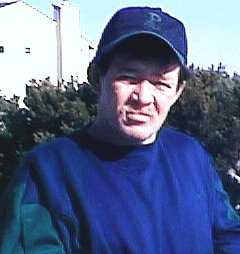

Arrival
Arrival to: Hotel Company, 1st Platoon, 2nd Battalion, 1st Marines, 1st Marine Division.
Located at the Cua Viet River area just six miles south of the DMZ. A Company of men, no longer boys, which most in age were, but never any more due to the reality of war and the emotional scars that cut deep into your soul
Lifting off in a C-130 transport plane leaving Da Nang and on our way up to Phu Bai, we sat huddled against the inside of a hollowed out air craft which rattled so loudly you couldn't hear yourself think. As we climbed higher into the sky headed for Phu Bai, the thought of being shot down by a rocket or anti aircraft guns seemed all so real. Everyone was silent, scared or worried; it was hard to tell as the noise made it impossible to speak to the person next to you. So I sat listening to the vibrating sounds of the aircraft as it headed towards the war I had only known about from TV and newspaper articles. I still couldn't get the thought of heading up towards the DMZ (Demilitarized Zone) and wondered if we’d be landing in a “Hot LZ” (Landing Zone). All I had was an old square pack and an M-14 rifle with no ammo to shoot anything if the opportunity presented itself. My mind began to imagine what Phu Bai would be like. It was the next stop on my road to where I was to join up with my new outfit. God knows we all had plenty of mental pictures of combat areas, from watching the 6 o'clock news, when we were civilians at home safe in our living rooms and Vietnam was somewhere, not quite sure where, in Asia some place.
The thoughts of those times when you'd run in to catch the news at 6 O'clock, mainly because my father was a career Marine, and he was stationed in Da Nang back in 1965, came flooding back into my mind. Back then during those times, the TV by way of the media, was always loaded with a few battle scenes piped directly into everyone's living room all across America. No previous war our country had fought in before gave this "real action" television imaging. My generation had such an opportunity, right as it was actually occurring, live every night on TV. We'd get to see wounded Marines and other service personal being loaded into medevac choppers, as families all across America could only pray and hope that those individuals who appeared critically wounded were not their loved ones or the neighbor next door.
I had grown up in the Marine Corps. I had been born at Chelsea Naval Hospital, in Boston, Massachusetts, back on April 4, 1948. My first memories are when I was only two, living out in California. My father was stationed at El Toro, Marine Corps Air Station, and we lived on Balboa Island in California. My brother, four years older then I, was teaching me to float at the beach, and as I was floating, he let me go. My first experience of panic shrouded me like a smothering blanket, in fear of floating forever out to sea. I started screaming as my father casually walked over and picked me up. I probably could have just stood up, but at two years old, I felt only fear. Funny how your able to remember bits and pieces of early childhood. Something like a broken puzzle, until all of a sudden, a full picture develops around the age of four or five years old, and then memories from that point on seem to fit together, like in building a bridge to where you are now.
At the age of five we lived at Parris Island, Marine Corps Recruit Training Depot, in South Carolina. Living aboard a base offered all kinds of exciting adventures to a little kid. Movies on Saturdays were free, the pool was free, both indoor and outdoor pools. The Island was yours to explore to your hearts content, and there wasn't anywhere you couldn't get to on your bike. Another advantage to having a father in the Marine Corps. You had state of the art military gear, helmets, packs, tents, canteens, even an old rifle that didn't work, but you didn't care because it worked just fine when you were playing combat and said BANG! All the kids in the neighborhood had the same gear available to them, so when you played war, you played war! Realism was no problem, as we had swamps and woods, and grassy fields to fight any kind of battle you could imagine. The only draw back was when you yelled bang at your enemy, he always yelled you missed me. Heck we even threw dirt clogs as hand grenades for realism, except sometimes they'd be a rock in one and the side of someone's head would open up, as they ran screaming home like they were dying. At least he couldn't say you missed me then. Funny what you think about as you fly high above the NVA (North Vietnamese Army) and VC (Viet Cong) in Vietnam. This time you were not playing war, but going into it, where there were no time outs, safe bases to be free on, and you couldn't yell at the enemy you missed me, or time out.
My thoughts of early childhood, back at Parris Island, playing Marine came to a sudden halt, when they were abruptly interrupted by a banging noise of the landing gear going down on the C-130 transport. We were told to brace ourselves for our landing. I watched the crew chiefs on the plane as they took up their positions. They didn't appear to be concerned about where we were landing, as they didn't have flack jackets and helmets on, and no one was poised to fire a machine gun out an open window in our defense. I guess the area was pretty secure, or these guys would let us know, right?
The landing was rough and bumpy as all get out, I expected to have landed in an old corn field as the way we bumped and jolted around, it didn't appear to be a nice smooth runway that we landed on. This was different from the runway I had landed on earlier in Da Nang. The noise of the aircraft got louder as the pilot revved the engines and applied the brakes to coast to taxing speed. The heat seemed to pour into the aircraft even before we had come to a stop. This heat was stifling hot and suffocating along with the clouds of dust that the aircraft created as it came to a stop. When we stopped, the huge gate in the back kicked into its hydraulic gears and screeched out its loud sound of pressure, as it slowly lowered the back end of the aircraft, in order to allow us all the opportunity to deplane from the aircraft.
All right, the crew chief yelled over the sound of the engines still vibrating the C-130 as it stood motionless on the runway. Grab your gear and file out in two single lines on the double, he screamed with his voice over the thundering sound of the airplane’s engines. The dust still hovered around the plane so it was difficult to see what you were venturing out into, other then a thick brown, orange cloud of dust. As we deplaned the dust clung to you like a grasping animal clinging onto you for dear life. Even shielding your face and eyes wasn't much help. The dust stuck to you everywhere, because you were sweating bullets from the high temperatures of the heat and thick and balmy humidity. It also made breathing difficult, something that you didn't want to do anyway, because you'd choke on the thick particles of dust that would rush into your mouth and lungs. The dust rushing into your mouth caused you to gasp for air while choking and gagging and coughing lumps of grit. Grit that had seeped deep into your lungs from breathing the thick dust the aircraft stirred up. We hustled off at a faster pace to escape the dirt and dust still being churned up by the rotating propellers of the aircraft. Finally once out of the thick clouds of dust and dirt, you were able to cough up more sludge from your lungs as you gagged and spit it out onto the ground.
We headed toward a building surrounded by sandbags that were four or five layers thick in depth, and as tall as the roof of the single story building. Damn was I thirsty, the taste of dust still in my mouth didn't help things much. Once inside I looked hopefully for a water fountain, like in real airports in the USA. No such luck, so I grabbed a canteen from my cartridge belt to rinse my mouth out and throat so I could begin to breath normally again. Aha! That was good, the water was warm, but clean, and refreshing as it washed half of the dirt in Vietnam down into my stomach. Still felt well though, as now I felt I could become oriented to where I was now, as I wasn't suffocating any longer from the deplaning adventure and all the dust.
Having been briefed by this guy in the terminal, which was only a single story reddish brown building, that had originally been painted green. We were dismissed and told to proceed outside where we would board some trucks, which would take us to our final destination. We boarded the big trucks and they drove us off towards a group of shabby looking huts with tin roofs, surrounded by sandbags, and you guessed it, the color of reddish orange mud or dirt that was the basic makeup of the entire area. What ever happened to all this green lush jungle area you imagined when you were on your flight over to Vietnam. So far all I'd seen in Da Nang, where we started out was runways, single story sandbagged covered buildings, a mass of mixed military men and women dressed in every uniform of the day possible as some were arriving, others leaving and the rest marking time or doing their jobs. Phu Bai looked more war torn, as it probably had been, and definitely redder dirt and sand, then the green hills surrounding Da Nang when I arrived there.
The truck stopped in front of all these huts and we climbed down from the vehicles and I stood there with all my earthly belongings and had no idea where I was or to who I was to report to, or even what outfit I was going to be assigned. Communication, I guess was just taken for granted, as no one seemed to know what we were suppose to do or where we were suppose to be. The Marines, who had made the trip up from Da Nang with us who had already been here or assigned to outfits, to which they knew their locations, didn't pay much attention to us at all. Heck, when the truck stopped and everyone got out, as I looked around to ask one of them where we were suppose to go, they were all gone, disappeared to their areas of refuge or to their outfits. Talk about organization, I thought to myself. I could be where I'm supposed to be and not know it. Or lost in the middle of this damn place. No body knew where we were supposed to be. All six of us that is, that had been assigned in Da Nang to this hellish area or duty station. They also seemed to be new, so none of us really knew the other as there wasn’t time to get to know each other being shuffled into the aircraft and then herded around like cattle at the air port at Phu Bai. We were all seemingly as confused to where we were supposed to be I was anyway.
In front of us was this hooch with a sign on it, "2nd Battalion 1st Marines, “ The Professionals”. Is this it? I thought, do we go in here? As I started to walk towards the front door, it sprang open and this older guy in a greenish brown T-shirt and utility trousers said, you the new replacements up from Da Nang for Hotel Company? Yes Sir! We responded. Drop your personal gear, and take your M-14’s over to that hooch over there and turn them in for M-16’s, and pick up any additional gear you need, then report back here by 16:00 hours, is that clear? Yes Sir! We responded again, as he disappeared back into the hooch. Well, I thought, maybe this place isn't as unorganized as I thought it was. Obviously this guy had learned to cope with this miserable heat. He'd just occasionally poke his head out of his air conditioned office, or quarters, every once in a while, bark out some orders, and disappear back into the coolness of his quarters again. That to me is called copping with the elements.
I dropped what gear I had, that I knew I wouldn't have to have replaced, and put it under the hooch so to insure it would be there when I got back. I was a bit leery about leaving it, but I could just keep my eye on it from where we were supposed to go. I figured it would be fine. The gear I had wasn't anything anyone would find worth stealing anyway. The humidity and the heat is so sticky and thick, that it chokes the breath right out of you, and leaves you feeling totally exhausted in the process, I was thinking when I felt this presence behind me in line. I could feel this large presence of an individual behind me, so as I inched forward to avoid whatever it was from crowding right up and over on top of me. A hard poked me and hit me square in my back. The heat was enough to make you feel crazy as it was, without this joker playing games or doing macho head-trips on me. So I politely inched forward a little more to give him the added room he seemingly needed for his large body. Poke! Again this joker pokes me in the back, and his presence seemed larger then ever looming over me from behind then before. I thought to myself, look, you've had martial arts since you were six years old living on Parris Island, you’ve kept up with it ever since you began, way back then. Now why feel uncomfortable about standing up for myself? I'd never seemed to have any problems dealing with anyone, physically or otherwise all my life, so the idea of standing here in this ungodly heat, having this huge bull elephant poke you around like a small insignificant animal didn't make any sense to me at all.
Poke! Poke! This was ludicrous! If this guy pokes me one more time, I'm going to drop suddenly down, fast as I possibly can, real low, while at the same time swinging around with all the force I could muster to hit him with an upper cut right in the family jewels. If that doesn't drop him where he stands, well I was always considered a fast runner, and I know someone his size couldn't catch me in this heat, so I'd go for it. Poke! Poke! I started to drop down but caught myself, it was as if something inside said hold it, you’re making a mistake. For some strange reason, I found myself turning around all natural and relaxed like. As if nothing was happening, and as I literally looked up into this guys face, which was a good foot taller then where I stood, my mouth dropped open a second, then a huge smile broke out across my face.
I'll be, it was Peter Hoban, Peter here! It was impossible; Peter and I had been friends since we attended high school together, a time that seemed a 1,000 years ago. I was in shock, Are you really Peter Hoban? I thought you'd never turn around Hink, he said to me with a big broad smile on his face, as he gazed at me in a manor of unbelief. Hink, is a nickname my father gave me growing up, and everyone back in Milton, Massachusetts, my hometown and Peters, who knew me, or knew who I was, called me Hink. I hadn't heard that name called out in months. Even though it seemed a lot longer to me now, as a lot had happened to me and both of us since I had heard the sound of Hink being referred to me so casually. Everyone since boot camp only called each other by their last names, somewhat impersonal and to me always lacking in proper manors. Maybe it was better that way. We had been told in training, those of us headed for Vietnam, that you didn't want to develop close friendships as if they were killed or seriously medevaced it would make a hard situation even more difficult to deal with. Vietnam itself was difficult to deal with, and no one needed that extra baggage to lug around with over here.
There were reasons for every seemingly insignificant thing we did during training. It would all be later applied once we were finally in actual combat conditions. That’s when reflexes determined life or death, and there isn’t time to get in a group and decide weather to obey it or formulate a better approach. It wasn’t weather you were making sense out of what you thought was some insignificant order or not that really mattered. They were not just as a harassment tool to make our lives that much more difficult while in training, as we originally thought they were. It is amazing what you are able to learn once you have already learned it, and capable of seeing it from a more realistic viewpoint. This was when a degree of maturity had settled in, and some how miraculously explained it all to you. Some how it always came afterwords, never while it was being applied. Like growing up, one day out of seemingly no where, zap! You’ve become enlightened with the knowledge of how smart your parents really were, and that all those times you figured they just interfered with your fun, was not to prevent you from having fun, but keeping you from heading down the wrong paths of your life. What you were unable to see, was a life of disappointment and heartache, that awaited you, had you been given the opportunity to make the decision that was fun as opposed to what would be of real value to you. The many times I would sit mad at my parents for seemingly punishing me for the sole purpose of making my life miserable, when in fact they were keeping me from experiencing the misery of a life time, had I been allowed to do these things my way. I thought I had more knowledge of what was happening, then my parents did. This period of enlightenment unfortunately doesn't have an age defining period in which it arrives. To some it isn't until their in their late teens, others early twenties and some never at all. Never at all group are the most unfortunate, as they are unable to pass the wisdom from which they were taught by their parents on to their children so they too can reach that period of enlightenment in their lives. Amazing how in only a few short months how much the Marine Corps in training you for combat and the defense of your country, can bring about a period of self awareness you never realize you had.
What are you doing here, I asked Peter? His response was what was I doing over here? I told him I had dropped out of college so I wouldn't miss the war. Peter replied in his old familiar tone, well baby, there's not much chance now of you missing out on it. You’re smack dab in the middle of it, and your timing is perfect. What do you mean I asked? I knew now the siege of Khe Sanh was over, and to me that was the biggest thing that had happened since the battle at the Chosen Reservoir in Korea during my father’s time. My father was also in Korea during their conflict, it too was an unpopular war that made the papers occasionally. It was nothing like Vietnam though. The way it was piped into every home in America and around the world on the 6 O'clock evening news. That was a first for the media, and the public it saturated it with as well.
Fox Company just got waxed, (a term used which meant basically destroyed completely), in a convoy going down route 1 on a regular weekly patrol. Peter said as his voice dropped off suddenly allowing you to know by his tone that something very serious and bad had taken place. It wasn't like the bad we were used to on the block back home. This bad was far more serious, as lives were lost, and an experience that isn't common, even to them, the troops here, were used to having happen, it was basically a shock to them all.
You got here in time, Peter said. Plenty of time in case you thought you were going to miss out on any of the fighting. Yeah, you're here in plenty of time, his voice dropping off again in tone, as he seemed to turn and look at something far away in the distance. Turning back with a different tone and even a different expression on his face and in his voice he said, You’d probably see action before the week is out Hink, then changing the subject, he said, here to get your new gear? Yeah, I said, curious why he would ask when he knew why I was in this line to begin with. That gear your getting by the way, it is from the company that I just told you about, Fox Company. I can see, as he stopped speaking for a second while gazing at the gear this guy was carrying as he passed by us in line. His arms were full and he was making a beeline to somewhere he could sit down and examine what he just picked up a little more carefully. Peter began speaking again, that is the same gear Fox Company men had. They were killed or wounded, from that incident I just mentioned to you. It looks as if they didn't spend much time cleaning it up for you guys, as his eyes turned to follow the guy who had passed us with his gear. Peter was making sure what he just saw was really what he'd seen. The gear in this guy’s arms was still covered in dried blood, and had holes in it, where it looked as if shrapnel had penetrated it. See the blood on that guys flack jacket, tugging at my arm as Peter responded in a voice sounding like he was really seeing what he saw but not being able to believe it? Yeah, I responded in a slow motion sound, as I wasn't able to take my eyes off of the blood on the flack jacket and the holes in it, small holes but hole just the same. If your lucky, yours won't be in such as bad a shape, Peter said to me as he poked me again and he had added some humor to his tone as he spoke this time.
Who's next! Came this voice out of no where, jolting me back into reality. Who's next, we don't have all day, the voice said again. I am, I said as I stepped forward and I handed this guy my M-14 rifle. What are you doing in this line I asked Peter? Just making small talk, as there wasn't much to say, yet at the same time there was so much to say. I saw you Peter said, so I figured I’d sneak up on you and surprise you. Well surprise me is right, what happened to college, you were accepted to Boston University with a full football scholarship? Ah! Peter remarked I guess I didn't want to miss out on the war, so I joined up back in August 1967. Well how long have you been here, I asked, hoping he wouldn't say he was going home soon, now that I finally found a really familiar face, after wondering around not knowing a soul? I got over here in January 1968, he said just in time for the "Tet Offensive".
Are you going to stand there all day or take your gear this voice said out of no where? OH! I responded as I grabbed a handful of ammo bandoleers, an M-16 rifle, and a flack jacket and a poncho that was covered with areas of dried blood. Hink, Peter said, ever fire one of those rifles before? No, it's the first time I ever held one or really seen one up close before. Grab your gear and come with me, Peter said as I struggled with everything and tried to keep up with him. Hink, do you know what company your in yet? Yeah I said, as I dropped some gear and almost tripped over it. Let me give you a hand, Peter said in a way like we were still back in high school. I'll help you get situated and then take you to an area where you can zero in that rifle and get used to it. What company you in? Hotel, I responded, suppose to be with 1st Platoon, who and where ever they are. I'll take you to where their area is, there not there, where I’m taking you; they're up at Cua Viet. That's where you'll be going with the first available transportation out to them, probably tomorrow. I'll be going with you. I'm with S-2; I'm a sniper attached to Hotel Company for now. Lets get your gear sorted out and have you fire a few rounds before you get shot at and have no idea what end to use, he said with a chuckle in his voice. I was thinking, good OLE’ Peter, he always had a way of looking out for those he cared about, and that made me feel more comfortable, just knowing we’d be together for awhile anyway.
By: Bobby Hingston

Peter and I zeroed in my rifle, then went and had some chow. Peter’s hooch was with second platoon, so when I got back to my area with first platoon, there was this older looking guy talking with some of the new guys whom had come up with me. As I got closer, he stopped and said, ”you with them?” Yeah I said, well you’ll be standing lines tonight, so stow your gear somewhere and grab your rifle and a couple of bandoleers of ammo and come with the rest of us. It had gotten dark by now so I had no idea where we were headed, I just followed along. We’d walked what seemed to be quite a distance when we came upon these bunkers stacked high with sandbags. He pointed to me and two other guys and said you three have this bunker, stay alert and don’t let anyone catch you sleeping when your suppose to be on watch, or you’ll be court marshaled before you even get to your platoons. Work out a system of how long you want the watches to be, and someone will be around in the morning to grab you guys for chow and then transportation out to your outfits.
We agreed to draw lots with some sticks to see what watch we’d have, I got the second watch, but wasn’t tired as when you looked out from the bunker, you could see all these illumination flares being fired out in front of our position, lighting up the whole area. None of us knew weather this meant there was enemy activity in the area or not, but the three of us sat up for quite some time before I laid down to catch some sleep.
There were two cots inside the bunker, no blankets or anything and as it got later in the evening, it got colder, so sleeping was difficult, as it was hard to believe after it being so hot during the day, how cold it could be at night. I couldn’t help thinking what the area was going to be like where we were going to join our outfits. I wondered if they were out in the middle of nowhere or if they had some kind of area like we were at now. Regardless, it must be pretty hairy where they were, as they were suppose to be out in what the Marine Corps referred to as “Indian Country”, meaning a hostile area loaded with NVA and VC.
It seemed as if I had just dosed off when this guy was shaking me telling me it was my watch. What time is it I asked? "2300 hours, your watch goes until 0100 hours then you wake him up", as he pointed to the other guy in the bunker asleep as if he were back home somewhere, just sawing logs and snoring like a sick cow. Anything I need to know, I asked him? "Yeah, don’t shoot your weapon without clearing it first on the land line, which is that telephone-looking object on that box there by your feet. Pick it up, crank the handle in a clockwise directions a few times, then when you hear someone on the other end answer, that’s when you ask for permission to fire your weapon, or throw a grenade. Be sure and identify yourself, and what bunker we are in so they will have some idea where the trouble is coming from". The land line was a phone that ran to the Sargent of the guard. He would answer it, and then he’d contact someone else, and by the time they said yes or no, you could be having a late dinner with a few North Vietnamese soldiers. Who were just dropping by for a friendly visit and instructions on how to use chopsticks with your C-rations.
Is it quiet out there, I asked sheepishly? "Yeah", so far he said, "or I’d have gotten you up a lot sooner. Just stay awake, as they check lines up here and if your sleeping you’ll be heading for the brig. If you actually see something or hear something throw a grenade and wake us up, the hell with the court-martial. I don’t feel like dying just after I get here", he said as he lay down on the cot to catch some sleep. I grabbed my weapon and a couple grenades as I left the inside of the bunker to sit on top of it to be able to see and hear better. Flares would occasionally go off, and then you’d scan the area really good, as the flare slowly drifted by a small parachute to the ground. You’d be sitting there, and hear a whistle, and a pop. That was the signal of the sound of a flare being sent out by a mortar tube, as someone most likely called for illumination. Either that or they just put a few up every so often at irregular intervals, to catch any NVA or VC from trying to sneak up on you unnoticed. The whole thing kind a reminded you of the fourth of July, without the explosions and the fancy colors. These flares were bright, so when you heard the whistle, you’d lay flat and close your eyes until you heard the pop. This was to keep the sudden burst of light from temporarily blinding you to what ever might be moving out there. Usually the only things moving were rats, and objects your own imagination came up with, as your first night standing lines had you having visions of an all out NVA assault, right through your bunker. We laid on top of the bunkers, as it was easier to survey the area, and you didn’t have to listen to two snoring individuals, that might put you into such a deep trance, there would be three snoring individuals. Every so often though, you’d go down into the bunker to check things out and the moving around helped keep you awake.
I checked the watch, 2320 hours. I could hardly keep my eyes open, but was too scared to close them, as I had no idea how hostile an area we were in. Everything in front of me made noises or moved, but after watching it for a minute or so, you’d see it was a bush or rats the size of a rather plump house cat, back home, that was regularly feed. The rats were more eerie at times then the shadows you thought you saw moving. I sat silently with a grenade in one hand and my M-16 in the other, lying still on top of the bunker as another flare would go off and you’d be scanning the area again. You wished you’d been able to see what was out there during the day light hours, then you’d have a better idea what really were bushes and what weren’t. Oh Well! It didn’t do any good to wish now, what was, was, and nothing could change that regardless of how much wishing you did.
It had been a long time, and I glanced at the watch again, 2350 hours, that’s all I thought! is this thing working right! It seems I’ve been staring out at these shadows and rats moving around for at least a couple of hours anyway. Time sure went slow. Especially so when every sound had you ready to jump out of your skin. I wasn’t in any hurry to throw my grenade either, as all I’d probably kill is a few rats, then I’d be off to the brig. I figured I’d eat a can of C-rations I had brought with me, that will waste some time and keep me busy I thought. I felt for my John Wayne can opener that was attached to my dog tags I wore around my neck. These little can openers are nifty little gadgets that come in every carton of C-rations. When you open the C-rations, there are individual packs, labeled with the name of the meal on them. Contents in a package have cigarettes, chocolate, or gum, toilet paper and the meal. There are also packets of sugar, salt, pepper, and once in a while in some of them you will have a packet of coco, but always a packet of coffee, with cream.
The crackers are hard as slate, they were lethal as if you ran out of ammo, you could scale these at the NVA or VC, if you hit him, it probably would kill him. They expected us to eat these dry chunks of steel they called crackers. Most of the meals were OK. Nothing to write home about, yet everyone did anyway, as trying to explain to the people back home what you survived on called food took a particular talent, as words in our language weren't invented to describe what really was in these boxes of food. They were "space food" to me, not anything from beyond, but food that went down into your stomach and just took up space, hence, “space food”.
I found my John Wayne can opener attached to my dog tags and jumped off the bunker to go inside away from billions of mosquitoes to eat what it is I had grabbed as food. The can opener is very small, with a little side sharp area you pull out, and then with a strong wrist action, you puncture the can, and in an up and down circular movement, force it around the top of the can until the top comes off. Pretty ingenious the way it works, plus it will open bottles and anything else you can stick it in or hook it on. I was opening some pears, World War II vintage; they had to be OK right? Well they wouldn’t issue us food that was bad right? Well it smelled pretty good to me, even if pears weren’t my most favorite, they were cool from the evening chill in the air, and wet and yeah, even tasty too.
As I ate my pears, I leaned against the inside of the bunker, with a chorus of snoring bellowing behind me, letting me know I wasn’t alone. I was getting to the bottom of the can and as I slowly lifted it up to drain all the juice from it---WHAM, BANG! An explosion went off which sounded as if a freight train just crashed into your bunker. Dust was all over the place, and my ears were ringing like crazy, I couldn’t hear a thing. My heart stood absolutely still, frozen, as my body jerked straight up about three feet, and I was awake as awake could be. WHAM, BANG! I jumped again, and the guys inside were scrambling to get on top of the bunker with me as the second explosion went off. Our rifles at the ready, scared stiff, and staring straight out into the pitch black night, my ears still ringing as if I had a bell place over my head and rung loudly.
“Is that incoming or out going”, one of them said to me? How the hell do I know, I’ve never heard one come in or go out before, I answered him as I looked around to see where the can I was holding had landed when I threw it a mile into the air after the first explosion. WHAM. BANG! Again, another gigantic explosion, right behind us. One of the guys scrambled down into the bunker and grabbed the land line and started yelling into it, “is that incoming or out going?” He yelled frantically into the receiver of the phone. He was still yelling into it when out of no where this Marine appeared.
First night boots, he asked with a laugh in his soft-spoken voice? Yes Sir we replied. He then casually said, as if nothing was wrong, “those are the eight inch guns up behind you”, someone’s calling in a fire mission. It happens a few times every night about this time and again around 0300 hours, as that’s when the NVA or Charlie like to hit us, when we are suppose to be at our most exhausted state then. I guess when they put you here they didn’t think to tell you about them. They do it to all the new guys, it’s a standard joke around here to break you in, kind a thing. WHAM, BANG! We jumped again, as the Sargent stood as if nothing happened, but even knowing they were going to fire, I still jumped a couple of feet in the air. They’ll fire a couple of missions a night if it’s hairy out there, the Marine said, don’t pay any attention to it, you’ll get use to it. Use to it, I thought my heart had literally stopped. I was still gasping for air. I’d had the life scared out of me, my pear can was in Hanoi some where when I flung it, and he says will get use to it, yeah, when we’re ready to go home?
I was still shaking all over and felt like I had a pear stuck in my throat. “I’m checking lines” the Marine said, “but I guess I don’t have to worry about you guys falling asleep. If you do hear something, don’t just yell into that phone, you have to crank it on the side first, then tell them what position you are so they’ll know where the trouble is coming from. Just yelling into it tells Charlie or the NVA exactly where you are so he can lob a Chi Com on top of you. Regardless of how scared you are, don’t be yelling into the phone. Use procedure, got that?” Yes Sir, we all said, as he walked off and we could here him laughing a bit under his breath as we just stared at each other WHAM. BANG!, another round was shot out.
Morning finally came around, and we were all still in one piece. I’d been dreaming I’d been home and was late for school and had an exam. I thought that was bad but waking up here was worse. Today I’d be going out to Hotel Company, 1st platoon, wherever they were. Hopefully not in front of any eight-inch guns like this bunker was. This was definitely a night I was going to remember for a long time to come.
I gathered what gear I had and rolled it up in a big ball as I headed towards where all the hooch’s were. I had no idea, which was my area, the night had screwed up my reference points, so I began walking half asleep dragging my stuff when I heard this voice, Hink! Hink! It was Peter.
See you stood lines by the eight-inch guns. Yeah, I responded, still half asleep. I’ll walk with you to your hooch where you can leave all that stuff and then we’ll get some chow at the mess hall. You’ll be going out on Choppers to Dong Ha. Once there, you'll catch a boat up to "Camp Big John" Hotel Company's rear area. From there they load you on "Otters" to bring you out to where the Company is actually located. It only takes a couple of hours from here to there, as most of the time you'll spend waiting for transportation. You'll get use to it Hink, Peter said as he nugged me on the arm, things just run a lot slower here in the heat. I’ll be going out later as the Top has some information for me. I’ll be out when they bring evening chow out to you. Mean while lets get something to eat I’m starved, Peter said as we headed to my hooch where I could lessen my load.
Stay tuned for "Arrival III" as there are five parts to this "Arrival section and then each chapter will just have its own name. The events are true to the best of my knowledge, which in most cases is like yesterday. Vietnam stays with you in your mind and soul, so vivid that thoughts generate actual smells, sounds, and the feelings of being there all over again. Some people refer to this as "P.T.S.D." Post Traumatic Stress Disorder, I just call it "Hell".
Bobby Hingston (May 1998)

The chow hall was petty crowded, the food smelled good, but that was never a sure indication that it would taste good. How'd you like standing lines last night Hink? Peter asked. It was an experience I casually answered. What do you mean? Asked Peter, as if he had been totally unaware as to which bunker I had been standing lines in. So I went along with him and said, you know those big eight-inch guns they got here? Yeah Peter responded as if he knew, but yet wanted to hear more about what I was going to say. Then he said, you got that bunker and then he finally laughed. Yeah I responded and nobody told us about the guns being there. They never do, Peter said, its a kind of baptism for all the new guys arriving here in Phu Bai, like welcome to the war sort a thing. Well it really welcomed us here all right. I thought we took a direct round right on our position. I didn't know if shells were coming in or going out. It scared the hell out of the other two guys with me and me, we all aged ten years at least, just from last night. Peter was still laughing, and the more he laughed it got me laughing too. Well, Hink, Peter said, welcome to Phu Bai and the real war now baby.
As we moved along in the chow line, we grabbed our plastic trays and filled some plastic cups with some really cold milk. I quickly gulped down half a glass as I was really thirsty, then refilled my glass again. It was still early morning, and the nights chill that had me freezing most of the night, while swatting mosquitoes the size of B-52 bombers, hadn't left me with much sleep, so I was still really tired. I was basically just going through the motions automatically, as I gulped down some more milk. Take it easy with the milk, Peter said, you’d wind up with cramps at the rate your consuming it. Its this heat, I responded, which had quickly replaced the evenings chill with a thick sticky choking almost suffocating air that you could almost cut with a knife it was so dense. With this heat, I can't stop being thirsty. You'll adjust in a couple of days, Peter said in a reassuring manor, as he began filling his tray with hot, over easy fried eggs, and bacon. Grab some food Hink. One thing, Peter said in a serious tone, you got to take advantage of hot food when you have the opportunity, as once out in the bush its C-rations and whatever water you can find.
Peter as I mentioned is a big guy, about 6’3” tall and about 220 pounds. He had been our star tackle, on our football team in high school. He had always been in good shape as he lifted weights since he was about 15 years old, so although he appeared big and somewhat hefty looking, he was solid as a rock. Peter was something else in high school. In class he could get the whole room roaring with laughter, and would never seem to get into trouble for it. He was very popular in school, an incredible athlete, and the nicest guy in the world, but God literally help you if you ever were fool enough to start something with him. That jovial personality and quick wit could tear you in half six ways to Sunday if you were fool enough to try and take him on in a fight. Although he had the ability to throw just about everyone in the school around like a rag doll, Peter wasn't that type of guy. I don't think anyone in the entire school didn't really like him. He was just the sort of a guy who was always right there for you if you needed him. You couldn't find a better friend if you'd given God a blue-print of what your ideal friend was suppose to be like. Peter was Peter, and you loved and respected him for just being who he was.
I hadn't grabbed much food, the milk I had been gulping down made me almost feeling full. Yeah got to eat good now Hink, Peter said as he dug into the food piled high on his tray. A few months of C-rations and you'll know just what I'm talking about, mark my words, as he swallowed down a few quick mouth full of eggs and some fried potatoes. The noise in the chow hall, banging of chairs and loud talking, and everyone appearing to be so relaxed eating their food like they'd never seen cooked food before, got me thinking what it really must be like out in the “Bush” as they referred to it. I couldn't help thinking what these guys must have been going through, being in actual combat, and wondering if I were to come back in this exact same place a month from now how many that are here now wouldn't be because they'd been killed or seriously wounded. Heck, I didn't have any reassurances even in a month from now if Id still be alive, or laid up in some hospital permanently scared or disfigured for the rest of my life. These thoughts and the thoughts of what could be, started to make deep impressions in my mind, and I began to realize how much in life Id taken for granted. The more I looked around, as I watched Peter eat and listen to the sound of a familiar and reassuring voice from what seemed like ages ago, the reality of the gift of just being alive began to grab hold of me. This was a feeling Id never ever experienced before. It was a really strange feeling, things seemed more real then they were, and every precious moment you wanted to hold on to and keep the inevitable future from stealing these moments away from you. Eat up! Peter said as he put his glass of milk up to his mouth to take a drink. You'll be pulling out in an hour or so, so you'll need to get back to your hooch and get your gear ready. Your heading for the real war now baby, he said as he finished off the glass of milk, and made a sound of relief as the last of the milk settled down into his stomach. You all Set! Peter asked?
As we shuffled out of the chow hall with lots of other guys going their own ways to God only knows where, I wanted to ask Peter what it was like being in your first battle, but in a way I was hesitant to ask. Peter was talking about some time when we were both back in high school, as my mind drifted off in the thought that in just a few hours time, I'd be out in the middle of the war zone, and wondered what that would really be like. Hey Peter, I interrupted him in mid conversation, as I really hadn't heard much of what he was saying. How do we get out to our outfit anyway? Choppers first he replied. Choppers! Is our area that far that we go in Choppers? That's how you leave here Hink, in choppers, then at Dong Ha, you'll hop on a riverboat that will take you up this river to our rear area in the bush. It's called "Camp Big John". There you'll find some Amtrak's, once aboard the amtracs, it's about an hour or so to the area we call the "Tree Line". That's home baby, or temporarily home. From there you'll be running patrols and night time ambushes, and every so often choppers come in to take us out into the DMZ on some operation. It's nothing like back in the World being out here kid. You’re in a whole different way of life for now on, where the only thing that will matter is staying alive.
Hoban! Hey Hoban! What Top, Peter yelled back. I got some things to go over with you that just came up. You'll be going out to the company later today, got that. Yes Sir Top, you had told me I'd be going out later this afternoon. I guess that's part of being assigned to S-2. By the way Hink, Peter said seriously. I noticed all morning you've been drifting off in your mind. If your worried about what will happen when all hell breaks loose, don't be. You'll do just find, besides why worry about something now when it hasn't even happened yet. You'll learn the only thing that counts over here is survival baby, you do what you can, help who you can, but in the end, survival is all that matters. See you this evening Hink, and just remember, “every days a holiday, and every meals a banquet”.
Authors: Bob Hingston and Carl King
Hotel Company, 1st Platoon 2/1 1968

Damn it's hot, I thought to myself, as gather my gear that was lying next to a cot in this hooch, where I thought I was going to have spend the night last night. The hooch was incredibly hot, as if it were a stale oven, holding the heat in which would easily persuade anyone from hanging out in it during the day. The place was a mess, it looked as if nobody ever spent any time in it, other then to run in and drop there gear somewhere, while they obviously must have slept somewhere else. Yeah, this was designed to leave your gear in and that's all. The hut was dark and had inadequate light in which to see properly, and combined with the thick stale air and dust, it made it almost inhabitable. Junk was lying all over the floor, and the floor was the color of red clay, and had a permanent layer or layers of that orange dust that would take a fire hose to blast it clean. The windows, if they could be called windows, were large rectangular shapes cut in the ply wood sides. Over the holes, a screen ripped and full of holes you could put your fist through easily, offered no protection to the mosquitoes or any other night dwelling insect creatures. I use the word creatures because the things that bit at you during the night where small scale models of a B-52 bomber that stung you, and left welts that always got infected. The screen door had its screen partly ripped off, and it screeched loudly and slammed with a bang whenever anyone entered or left. If this was the good life, the bush appeared more and more attractive to me, even if I hadn’t been out in it yet. I couldn’t gather my gear fast enough thinking I would pass out from holding my breath rather then having to breath the air.
I grabbed everything I could, took a quick glance around and made a beeline for the door, which was partly ajar, and banging occasionally against the entryway. As I stretched my arm out in front of me, as if I were a half back on a football team defending off a would be tackler, to push the door open, it swung open abruptly. I went sprawling down the two or three steps that led from the hooch to the outside, landing on my face in the dirt. "Hey Hot Shot" this voice said, "In a hurry to get someplace". As I lay sprawled on the dirt. My gear I'd been carrying in my arms was now all around me scattered about. I looked up to see who was speaking to me. There stood the same Sergeant that had spoken to us the night before on lines, with a broad smile across his face. He obviously was holding back his instinctive desire to laugh. "They won't leave with out you "Boot", you still have plenty of time to get up to the "Top's " hooch for your traveling papers." "You OK?" Yeah, I responded to myself, as if I'd had the wind knocked out of me. I couldn't help thinking, this guy must think I'm the most uncoordinated Marine he's ever laid eyes on. Instinctively I answered "No sir, yes Sir! I'm OK" You don't have to call me "Sir" he responded, and then he laughed out loud, as I wanted to just wither up and disappear. "Collect your gear, and head up to the "Top's" hooch, you'll see the others there already standing by." OK", I muttered, as I caught myself from saying sir again, and began to slowly pick myself up out off the dirt.
I gathered my gear and dusted off what I could, when I heard this voice yell out from the hooch, "This your C-bag Marine?" Oh Yeah, I said, I had forgotten to grab it in my hurry to get oxygen and fresh air from outside the hooch. "You'll need it where your going, as all this gear is stowed at "Camp Big John", he said in a more friendly tone, while bring it out to me." Thank you", I said, really not looking him in the eye, as I was already too embarrassed. I was thinking, so now on top of being uncoordinated, I was also an individual with no brains, who forgot the bulk of his gear. That's how I felt he felt, as he made sure I had everything. I tried to sling the C-bag over my shoulder, but with the pack and everything, the weight of it just slid down from my shoulders in a bulky manor that through me again off balance and heading for a fall. "Hold on their Boot", the Sergeant said, "let me give you a hand", as he lifted the C-bag up to my shoulder where I clutched it tightly, not to loose my grip and drop it again. "Thank you", again I said to him, as I struggled under all the weight towards the area he pointed to earlier where the "Top's " hooch was to be found. I never ran into that Sergeant again my entire tour, but if your reading this, Sergeant, I made it home, and regained the majority of my coordination back. Well, at least as long as I never have to perform anything that requires coordination in your presence.
I finally managed to make it up to the "Top's" hooch just in time, as he was giving these other guy's, three of them, their instructions and papers for their journey to where ever Hotel Company was suppose to be exactly. "What's your name Marine", the "Top" said in a typical drill Sergeant's voice, as if we were still back in "Boot Camp". "Hingston, Sir", I stated in a loud voice, with as much confidence as I could get into it. These are your orders, DON'T loose them, and give them to the 1st Platoon Commander when you reach the "Tree Line".
Now you Marines see that area down below there, the "Top" said, as if explaining it to 6-year-old children with mental handicaps. "Yes Sir!" we all responded, go there. This is where the Chopper will pick you up and take you to Dong Ha. When you arrive at Dong Ha, you'll proceed to check in there. You'll then walk in the direction of the river, the long water area between the stripes of vast land and jungle. "Yes Sir!” we answered, like retarded kids that he obviously thought us to be, as he was explaining everything in great detail as if we were actually retarded or just plain the village idiots. There you'll find a pier, and at that pier is a riverboat, that riverboat will take you for a ride on the river up to "Camp Big John", You Marines following me so far? "Yes Sir!” again we all responded, all four of us. You'll see some supplies all stacked up near the pier there. That's where you'll find this Navy Chief. He'll tell you what to do, and how and when to do it. Just follow his orders to the letter. He’ll direct you where and when your suppose to go from there. "Yes Sir!” we responded in unison. He's the loading Chief, so if he tells you something, you do it! Don't ask stupid questions? "Yes Sir!” we again all responded, I was beginning to feel like an idiot savant, with the only ability I was capable of performing, was to say in a choirs, "Yes Sir!" The less you say the better shape you'll stay in, GOT THAT MARINE! "YES SIR!” we responded. Then get down there, that Chopper won't wait all day for you, there's a war over here in case no body told you, and he disappeared back inside his air-conditioned hooch again. I wondered if Peter was inside, enjoying the coolness of the air conditioner, obviously a much better place to be then out here in the suffocating and drenching heat which soaked you clean through with your own perspiration as if you'd been soaked or drenched with a pail of water.
We managed to make it down to the landing zone for the chopper in one piece. We arrived just in time, as soon as I set my C bag down, I heard the sound of the choppers blades coming closer in the distance. I tried to look up and locate it, but as I glanced up, I looked squarely into the sun and it temporarily blinded me so I couldn't see anything for a few seconds. When the chopper landed we boarded and began our flight to Dong Ha, which probably didn't last 10 minutes, but during the ten minutes we froze to death as the chopper had no windows in it, and at the altitude we were flying, it was freezing cold. No wonder the Marines on the helicopter wore heavy flight suits, it must be miserable for them when they're on the ground, but perfect for up where we were flying. The chopper made enough noise that if anyone took a shot at us, I can't imagine how they'd know, as this noise seemed to drown out any other sounds that might be possibly heard. The Gunner on the machine gun gazed intently out the door of the chopper, as I thought, this must be a great way to fight a war, never having to lug all your personal gear with you every where you went, and you rode, not walked. Plus it was nice and cool for them, and most likely they had air conditioned hooch's to return to, as the air wing seemed to really take care of their own. Of course I didn't take into consideration that choppers over here were shot down like in a shooting gallery all the time. They took you into hot LZ's and extracted you from them, taking the chance of being shot down and becoming a grunt like you until another rescue chopper arrived for them. That's if they weren't killed or badly wounded when shot down. I guess every area of this war had its ups and downs, really no one had it made if they were in any way connected with the grunts. At least we were already on the ground, we didn't drop a thousand feet through the air to get to the ground like they might if shot down.
Arriving at Dong Ha, we exited the chopper, which took off immediately after we were off. They didn't spend much time on the ground waiting for some mortar to zero in on them, and blow the hell out of them before they got air born again, where they could open up with their machine guns and any other devices that the chopper might have. We made our way to the pier and checked in with the Navy Chief. It was about forty-five minutes before we were on our way up river to "Camp Big John", God only knew as far as I was concerned what "Camp Big John" would be like, none of us had ever been there before.
It didn't really take very long before we were arriving at "Camp Big John". It appeared to be a clearing carved out of the jungle along the side of the river. There was no pier, or dock to pull the boat up to. The boat, just reversed its big engines, and backed up so we were bow first towards the land. It then chugged it's way methodically until it ran aground on the bit of a beach that was along the side of the river. It was like an Old World War II landing craft, a little larger then they make beach landings in the movies. Once against the shore, the bow was released, and the entire front lowered slowly to the ground like a Hugh ramp for us and all the gear intended for the Camp could walk or drive off of. It was loaded with pallet's of cartons of God knows what, other pallet's looked like they had ammo on them. There was quite the assortment of supplies for the Camp. The Camp was lined with a couple of rows of tents, big tents, not hooch's like back at Phu Bai. Each tent approximately only a few feet from the next one, all in a cleared out area surrounded with jungle and an open area of land that stretched for a few hundred meters to a tree line in the distance. There was also rice paddies in the area, they looked like perfectly square green patches surrounded by dike after dike as they faded off towards the tree line. The grass near the river was a bit high, not looking as if anyone was assigned to mow it with a mower at regular intervals. "Watch out for the snakes" this guy, said as he walked passed us headed for the boat. I wondered if he was serious or not?
On the way up the river as we chugged along the lazy flowing river, that was a couple hundred meters wide most of the time, but in a couple of spots, even wider, much wider as it appeared to join another river in it's flow to the ocean I assumed. The land was thick on both sides with a mixture of jungle and open fields of rice paddies that slowly faded out of sight into a tree line or thick jungle area. You could see farmers working the rice paddies with their water buffalo, plowing in the watery filled dikes as others, mostly women planted rice stalks in the water and mud of the paddies. The local people dressed in like thin black pajama's, looked like silk, and wore big rimmed hats whitish in color that was wide at the ends and rose to a point in the center. It made you wonder if they weren't VC spying on the river so they could tip them off to ambush us, as there wasn't anywhere for the boat to go, and at its slow pace, we made excellent targets for anyone.
The boat was large gray and rusting in spots. It had a bridge that was enclosed and a couple of 50 cal. machine guns on either side of what was the bridge, a cabin looking thing between a walk way to either side of the vessel.. It also had a small 60-mm. mortar mounted in the aft end of the vessel, and there were other 60 cal. machine guns strategically placed around the boat, I imagine they could put out a large degree of fire power when needed to. We were all armed with our M16's and the sailors aboard all carried an assortment of weapons. They all were without shirts and darkly tanned, always being exposed to the hot beating sun, which seemed to blister the skin from the way it reflected off the water. It was so hot, you wished you could dive over the side and take a swim. I don't think they'd wait for you, as they chugged steadily up river towards our destination. I knew they made at least two trips a day up here, how else would Peter be able to meet me later tonight. It was early afternoon by now, as we waited for over an hour or so at Dong Ha before shoving off. I was hungry, so I was hoping they had chow available at "Camp Big John".
All in all, there were about ten or so tents, we found one with what looked to be the headquarters tent, as the radio was operating inside, and people seemed to be busy enough inside of it. One of the Marines there spoke to us, saying "You the replacements for Hotel Company?" "We are", one of the other guys said. Find the Gunny and he'll show you where to stow your C-bags. Then go to the chow tent and see if anything is left to eat, if not we'll get you some C-rations.
He had someone take us to the Gunny who had us fill out these forms so we'd be able to later claim our C-bags, if we weren't killed or medevaced home due to wounds. He took us to the chow tent, but nothing was available, so we had C-rations for a late lunch. I was beginning to understand Peter's statement about eating the "Hot Chow", as C-rations although not too bad, were definitely second choice to a hot meal. We finished eating and then met with the Gunny again.
You Marines will be going out with the evening hot chow on that Amtrac at approximately 16:30 hours. Until then, if you have writing gear maybe it's a good idea to write home and let everyone know your alive and well while you can still get it into the mail bag which is headed down river with the boat when it shoves off.
We all scrambled to get a quick letter off. In mine, I didn't say much about anything, just I was in a secure area in the rear, and there was no need to worry about anything serious happening to me. The last thing I wanted was for my mother to be watching the six o'clock evening news every night in fear I'd be one who was in a flag draped coffin. I particularly didn't want her to see me in a fierce battle. All that would do is upset her and have her wondering if I was OK or not.
The media didn't care how much stress, they stressed our parents and loved ones with back home, as long as they got their lousy ratings. The media made the North Vietnamese appear to have a kind heart compared to us. Sensationalism sells more so then the truth, as nobody wants to see servicemen in Vietnam doing any humanitarian jobs for the South Vietnamese people, which don’t get ratings. If a village is accidentally bombed or because we took fire from a village and returned fire, then the media is there hoping to get a live shot of some innocent women or children that were killed. The probability of the VC or NVA killing them, even before we opened up on them, for opening up on us, mattered little to the media. That side wouldn't be shown, even if they knew it to be true, the truth wasn't what they wanted. To appease protesting cowardly draft burning anti-government hippies is all they wanted in order to insight them into more protest that just might get ugly and become violent, better ratings still, that's what the media wanted. The media wanted to see atrocities so they could make the protesters back home, instigate another protest. Hopefully the latest one more violent and disturbing then the last one. The more violence at home and American Military men dyeing in your living rooms on TV meant more ratings, which meant more money, Hippocratic news media people are truly the instigators responsible for the unstable conditions both in VietNam and in the USA.
Protesting wasn't to get us out of Vietnam for our sakes, don't be fooled about that, if so why did they spit on us and swear at us and call us baby killers, when we just wanted to come home to a life we thought we left behind us. We wanted the war behind us more then anyone. We lived it, everyday for 13 months and 20 days for a Marine. Once home we wanted to continue our lives, to pursue what we had begun before we felt we had an obligation to serve our country and therefore enlisted in the military o for fill that obligation. A dramatic cultural swing in the United States, which was instigated by the media about the time Martin Luther King was killed, influenced the North’s strategy of how the rest of the Vietnam War would be fought. All of this occurred while I was serving in Vietnam, even my friends, I thought were friends, despised me for simply living, and not having been killed over in VietNam with the rest of the baby killers. I guess they felt our men dyeing would have served some perverted sense of justice.
We were no longer the kid who delivered the afternoon paper, or worked at the local drug store. Nor were we the kids that went off to college to educate ourselves. Not anymore, now we were an animal that enjoyed killing for the sake of killing. Regardless if it was man, woman, child, or beast, as long as we killed it. We were responsible for every injustice, every wrong deed, we too were animals to be mocked, abused mentally, and denied the same equal opportunities that we fought to preserve. We were suppose to show remorse for our actions and to publicly apologize because we came home alive. The freedoms we have maintained and kept alive in this country contributed to the same elements used to destroy any and all hopes of a normal life. The foundation of that destruction was the FREE PRESS, the MEDIA. They were the ones who cared more about ratings and less for the truth. It didn’t matter to them if it killed us, and destroyed the lives of the very people that turned them on in some sort of hypnotic trance in hopes they'd get a chance to see their son, husband, father, boyfriend, or brother, one more time before they died.
Here is a little known published fact relating to the escalation of violence in our Country, in relation to TV violence. Violence has increased in programming over the last ten years by about 19%. In TV news broadcasting violence has increased by more then 400%. Next time you all gather around the TV during dinner to catch the days events on nightly TV news, see how many mouthfuls of food you can swallow before your staring at a dead body in the middle of your living room. Right in the confines of your home, the sanctity of the family violated in the interest of increasing their own profits through higher ratings. May God have mercy on their souls, as they will answer one day to someone higher then themselves?
All opinions are of that of the author, and do no reflect, mirror, or speak for the Hotel Marines 1968-web site. I can be located at rotties@aasp.net
Stay tuned for Arrival 5, a journey aboard Amtrac's to the infamous "Tree Line" where Hotel Company, 2nd Bn. 1st Marines, 1st Marine Division, was located in their struggle to preserve the South Vietnamese peoples freedom of choice in late June 1968.
Author: Bobby Hingston (June 1998)

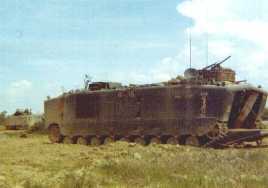
This is an Amtrac, a machine used to transport grunts on top of them in relatively safety to our areas where we were to find the NVA and VC. Not too safe for the crews of the Amtrac's as many a box mine lay in wait to destroy them and their crews.
Photo Peter Hoban 1968
After eating some C-rations we were directed to the area where the Amtrac's were. They were impressively all lined up and ready to take us out to the "Tree Line" where Hotel Company was. The sounds of their powerful engines sounded like the big earth movers back home. They would rev their engines and the diesel engines sound with that whistle in it was clearly heard for long distances. I thought to myself, we're not going to go unnoticed or sneak by many NVA or VC in these steel monsters. One look at their size and the sounds they made said clearly "here we are, ambush us if you'd like." The thing that got me, is that these steel monsters that weighed 5 or 6 tons easily, actually floated in water, you'd think they'd sink like a stone, as they were all steel and fuel.
Get yourselves up on top, someone said over the noise of the engines which was deafening in itself. One look and I'm thinking how in God's name am I going to get up on top of that thing. There weren't any steps to put your feet into, I wonder if they lower the front and like an elevator rise you up on to the top of these monsters. "Just throw your gear up there, and someone will give you a hand", this Amtrac guy said. I didn't envy these guys, they were sitting ducks for every NVA and VC for miles, and box mines could wipe out everyone with one blast as the fuel was on the bottom where the explosion would take place. Most serious injuries that didn't relate in deaths were burns, due to the fuel igniting and catching everything on fire. I wondered how the driver ever had a chance of escaping, as he was down inside with just his head sticking out of the hatch opening enabled him to see as he drove.
This guy pulled me up on to the top where sand bags lined the top and they had a 30 cal. machine gun behind a little bunker of sand bags. Everyone else made there way on top as there engines revved louder and the smell of diesel fuel filled the hot stale air. It seemed we were at least 10 feet above the ground, and we had a good view of the country side, and we also made good targets as well. "Don't hang your feet over the side", this guy said to me. "We hit a mine, and you'll be minus your legs". That was good enough explanation for me, as I pulled my feet up under me as we started to pull out. The first Amtrac had nobody riding on top of it, I guess so if he hit a mine, they wouldn't loose too many men. Talk about walking point while using your feet for probing sticks for mines, these guys definitely had to have nerves of steel to venture out into the unknown and just waiting to hit a mine and die.
The second Amtrac followed almost exactly in the first ones tracks that it made as it turned by halting one side tracks and with jerky movement. There were about four Amtrac's in all heading out to the "Tree Line", and we made quite an impressive little line. I noticed not all the Amtrac's had 30 cal machine guns on top of them, some just had crew members with M16 like we had. I kept thinking that we really didn't have a lot of fire power like the boat we came up on. What if we were to get hit in an ambush. First of all I'd have to bail off about 10 feet to the ground, probable breaking an ankle or leg. What is they hit us in a cross fire, then what? The Amtrac's didn't exactly fly, as far as moving with any great speed. You'd think they'd put a tank or two with us for protection, as a couple of 30 cal. machine guns weren't that impressive to scare a unit of NVA off, especially if they had rockets or RPG's, a hand held fired rocket launcher. They were Russian made or somewhere from the Soviet Block Countries, and able to penetrate a tank, let alone one of the Amtrac's. Hopefully we weren't worth attacking and exposing themselves for, as they only exposed themselves when they out numbered you 10 to 1. I think the artillery and air support kind a scared them from massing in large numbers as we had a lot of Recon units everywhere waiting for them to mass together so they could call artillery and air support on top of them. Recon though usually worked up in the DMZ area, although we were only 6 or so miles from the DMZ along the coast line, South East of Con Thien.
I decided not to worry about what wasn't happening as Peter told me about. The sun beat down hard on us sitting on top of the Amtrac's as the air was thick and stale. Riding on the Amtrac's created a bit of a breeze, but not enough to ward off the incredible heat that literally wanted to roast you alive. I looked out around me at the country side. It was incredible. Their were mountains in the distance, covered with heavy jungle, and clouds hung low in certain areas, as if it were raining in that part. The rice paddies we were traveling through seemed to stretch for miles, and the light green stalks of rice made it appear that the whole area was one big well taken care of lawn back home. There were farmers working in the paddies, some in all black pajama outfits others with black bottoms with white tops, and of course their hats that looked like white rimmed cones and the hats themselves were a whiteish color. There were villages scattered all around and tree lines that vanished into the jungle or off towards the mountains in the distance. Kids helped in the paddies ridding a top of water buffalo's, guiding them with a thin stick by hitting them one side or another. Also old women were planting rice along with old men. It dawned on me that no kids older then about 12 years old were to be seen, and no young women or young men, just really young kids and older men and women.
We were slowing down as I noticed we were about to cross a river. How far these would sink is beyond me. The first entered the water and seemed to switch engines as it made a different sound then it normally made. We jerked and swung right keeping in the tracks of the one ahead of us as we began to enter the water. The river had no swift current and the water was a brownish color as it lazily passed on it's way probably to join a bigger river and then to meet the ocean. I was utterly amazed how these steel monsters actually floated and were controlled enough to cross the rivers. You'd think they'd need a propeller like a boat, but if there was one, it wasn't visible from the outside. I reached into the water only a few inches below us and it felt warm, not refreshing at all. I guess this heat affected everything, and nothing escaped it's burning rays, not even a lazy flowing river. As we approached the other side and seemed to come out of the water, it seemed to shift gears back into to the diesel sound again as we followed the tracks of the one in front of us up the bank of the river. The incline threw everyone back as we reached to grab onto something from being thrown off. The Amtrac guys didn't seem to budge an inch as they were use to to these things and they didn't pay much attention to us either as they figured I guess we'd make out OK.
We'd been riding probably about a half an hour when someone said there's the "Tree Line" where your guys are suppose to be headed for. It seemed like a awfully long trip, first the choppers, then the boat ride up the river and now the Amtrac's, but I guess now we were finally here. I surveyed the area as we approached. To the left of the Tree Line was a hugh village, and other tree lines surrounding the village. It appeared the "Tree Line" where Hotel Company was, was on a raised almost Island compared to the land around it. It was about 6 to 8 inches higher then the rest of the surrounding land which was mostly sand and abandoned rice paddies. On the land where Hotel Company was, it was long and thin, stretching a few hundred meters in length running perpendicular to the village. The Island was covered with all kinds of make shift tents. The tents were made from poncho's and puncho liners, tied to anything that was available. There were also small fox holes dug every where, but just a few feet deep, and they all appeared to be cluttered unto this Island, as we got closer, the Island appeared to be one ver large grave yard.
The Vietnamese people buried their dead in mounds, not graves as we here in America are aware of. Some are surrounded with cement circular, almost mote shaped outlines of the graves. The one opportunity these offer, is when artillery fire is fired, they form natural barriers from scharpnel from the exploding shells, but the major factor is that the NVA and VC are least likely to shell their own graves, even if they are not theirs per say in actuality. The Vietnamese people are a superstitious people who pay homage to their dead year round in the Buddhist religion. They do this by burning incense and placing fresh food, like fruit and rice cakes in a small shrine found even in modern homes today of peoples of the Buddhist religion. Also once a year a celebration to the dead is carried out known a Bone Dance, where they hold religious ceremonies and dances for the dead. Prayers are bought by the decease relatives during the year right after the death of a loved one fading away as the years pass on. So setting up in an actual grave yard didn't buy us much favor with the villages, it did prevent artillery attacks, and never once while we were there were we attacked by NVA or VC forces, we were attacked away from that area on patrols and Operations.
Arriving at our destination safely, transported by our Amtrac's, my biggest problem now was how to get off this thing without breaking my legs. I quickly surveyed the area to get an idea of the general layout and where I should go to find what would be 1st Platoon. It was basically impossible to tell where the CP was set up, as everything looked the same to me. I figured my best bet was to get down without breaking my legs and search for someone who appeared to know what was going on. Somehow getting down seemed to be a bigger problem then getting up here, but I knew I'd figure it out. I wish Peter had ridden out with me, he'd know what to do.
Stayed tuned as this series will continue under new titles as opposed to Arrival. These all follow in sequence of my experience's in Vietnam with Hotel Company, 1st Platoon, 2nd Bn. 1st Marines, 1st Marine Division during 1968. I hope you'll enjoy them as the are both factual and accurate to the best of the authors recollection.
Author: Bobby Hingston (June 1998)
Amtrac's played an important role in supplying our troops and acting as troop carriers in areas it didn't seem possible for vehicles to operate. Weather in streams, mud, or rivers the Amtrac's got the Marine Corps grunt to where ever he was suppose to be, and a lot of times came under heavy fire from the enemy. Grunts have a tremendous respect for the men who operated these steel monsters, and the countless times they sacrificed their safety for ours. Below are some pictures of Amtrac's, both land and sea, as well as what happens when they hit mines or are fired upon by the NVA or VC with RPG's (Rocket Propelled Grenades) that could penetrate most armored vehicles. The men of Hotel Marines 1968, who rode these vehicles, and shared in the losses of our brothers to mines and booby-traps would like to say to all Amtrac personnel, we salute your courage and determination to duty, and morn your lost brothers as our own. We also would like to say welcome home Marine's, a job well done. Semper Fi. brothers, as you "Served with Pride".
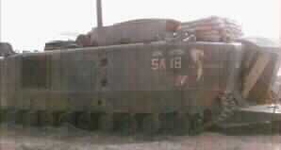
Amtrac with front down. Photo Thomas Williams
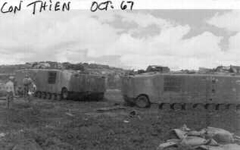
Amtrac's at Con Thien
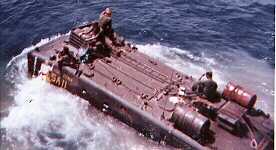
Amtrac's leaving their ship for the land in Vietnam
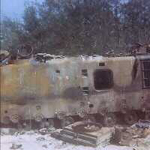
Mined Amtrac, not much left

Solomon came back from the CP. Group as I was finishing my C-ration, or dinner to all the folks who never made it to Vietnam. He called for team leaders up, so Fred and I just went on our way cleaning the area up. Everything had to be taken to a hole where I guess it was eventually covered in. The one thing we were taught in basic , boot camp, and all the other rushed training we received, was you always bury your C-rations and anything else so Charlie wouldn't know you had been there. In this case though it was an exception as he knew where we were, so we were keeping the place as clean as possible as the flies that almost drove you crazy during the day, didn't need to have any more reason to be there due to rotten left over food.
Bowman returned and with his pleasant mannerisms instructed us concerning that nights ambush. He said we'd be traveling light, so carry the bare essentials. The bare essentials were canteens, ammo, and your bush hat. He said there was no need for the flack jacket as up here we didn't encounter many booby-traps due to heavy troop movement by the NVA.
Lynch was still borrowing water from me, but at this point we had made a friendship between each other that would be as strong in Vietnam as it would be 30 years from then, of course we didn't know that then. Fred and I were almost telepathic as we were able to communicate each up coming move to each other with out having to whisper it to each other at night, or in a suspected area of VC or NVA. This came in handy as Fred and I stuck together like glue over there, even when sent to demo, short for demolition's, school in Da Nang for 2 weeks.
Bowman assigned us our positions in the squad. At first Fred walked point with Benny close behind, and I walked tail end charlie, last man in the squad. Our first ambush patrol was to be company size and our squad was lead squad. That meant I wasn't tail end charlie, I'd walk closest to the CP. group, (Command Post) which meant I'd be nearest to our Lt. As you walked, anything that was passed back from someone in front of you was to be passed back to whom ever was behind you if you weren't the last man. That's in case of booby-traps, halting to set up a fire mission on call or just general knowledge.
Snake the guy in front of me said, which was Jay as he pointed to this large snake which had just caught something large and was trying to digest it. Everyone ahead of me casually steeped over it as if it was nothing, so I did as well. When in Rome do as the Romans do, I thought to myself. It was just as the sun was going down, the mosquitoes were out by the billions, and buzzed and covered you like a wet blanket. You didn't use the mosquito repellent they gave you. Using it would have told Charlie, who could smell anything we used from the States as if it were literally calling out to him. He'd be able to smell it too, and come climbing up right on top of you before heaving a Chi Com grenade, smack dab on top of your position. Being new you did anything these guys told you as they were the survivors and they knew how to stay alive.
We were walking down like an old rail road path or trestle that one day probably carried their goods to the city, possibly Hue City, as that use to be there Capitol City before the North and South divided the Country in half. We made good targets, but looking at the landscape you couldn't imagine how beautiful it was. Large beautiful mountains in the distance, with a river flowing lazily towards the ocean. Rice paddies every where, all sectioned off in what looked to be equal squares, but no villages working in them as curfew was established and anyone seen out at this hour was fair game, for either side I guess. The raise platform of a rode or train track had rice paddies to it's left and jungle to it's right. The jungle was too close for me especially if we were to get ambushed, all we could do is dive to the side of this treacle mound of dirt which seemed to stretch for miles, and call in an artillery barrage on them.
Suddenly Bang! Bang! Bang! Bang!, we dove for the side of the dirt treacle as rounds sprayed the top where we just had been. Everything went crazy firing like you never in your life experienced, everyone was pumping rounds into a area of jungle, more noise then if you lit an entire set of 1,000 pack of fire crackers off all at the same time except rounds spit into the ground only a fraction of an inch from your body. I fired a shot and my magazine fell out. I was reaching for my magazine when this kid next to me yelled fire you Son of a -----, lay down some covering fire. I just grabbed another magazine shoved it into my M 16 and fired another round and my magazine dropped out again. I started searching for it and this guy went ballistic about firing my weapon. I turned and screamed at him, with what, a single shot M 16? I then noticed it was Lt. Meale and he was scared and pissed. Rounds kept skipping off the top of the road where we'd been, I was watching as some other guy, I think Solomon was yelling at Jim to call in a fire mission.
We were the lead element of the platoon, and smack dab in the middle of all this horrendous noise, but no machine gun was firing at us. This all probably took about 3 to 4 minutes but seemed like a life time. The Lt. was yelling if the lead squad could detect movement, and the answer came back NO! Fred was working out big time, crawling to the top firing a few shots and sliding down to change his magazine to his weapon. I now had four magazines to my weapon laying around as darkness seemed to appear out of no where and make it impossible to see anything. The Lt. was still chewing me out for not actively shooting my M 16, but rocks at this point would have been more effective then the a couple of one round I was able to shoot from my weapon. He even yelled if we get out of this Hingston, I'll write you up. Sir I tried to explain, my magazines keeps drooping out of my weapon on every shot. Have you got a fire mission yet the Lt. yells as more rounds spit up the dirt above us. Then we heard seize fire, everybody seize fire, hold it up! There our men! Fred yelled back. How do you know, the Lt. yelled. They called for a "Mother Up" I must have hit a couple Fred yells back. Pop a green cluster Lt. Meale yells. Solomon yells at Jim for a green cluster, give me a couple he said. Whoosh this sound breaks up the sound of bullets still being fired by both sides. Pop! The flare illuminates as they tell us to get down, still the firing keeps up, but less intense then when it began. Put up another the Lt. yells. Yes Sir! Comes the answer from Solomon our squad leader.
Then Whoosh from the other side, another green cluster. Firing began to lessen less and less, until you could hear both sides screaming yelling to seize fire. Who are you? Solomon yells out? Second platoon, who are you? First platoon! Anyone hurt Solomon yells? Yea two guys on the machine gun, we need a medevac as quickly as possible. Damn I thought, my first ambush and it's with our own men, what a way to get baptized with being in a fire fight.
We took no casualties, except my M 16 that was suppose to pump out 18 rounds as fast as you pulled the trigger, and now was a single shot piece of crap. The Lt. was up talking to their Lt. and both were on the radio to the Captain, I knew there was big trouble for some body. Fred got the two machine gunners on the first burst, which was luck for us as they could have literally cut us to pieces. They had a medevac chopper coming in, so we were to provide security for it so they wouldn't get ambushed by the real enemy. In the meantime I guess the Lt. received a change of orders as we were suppose to have had an ambush position where second platoon was, but they left ahead of us instead or something, it was a big screw up that no body wanted Regiment to find out about. We were suppose to sweep through that site before second platoon got there making it safe for them to move in and set up an ambush. Instead they left before us and thought we were a few hundred meters north or west of them. They weren't expecting us to come moseying along and we didn't expect them to be where they were. Fred later that night told me he heard the bolt of the firing mechanism shut, that's when he opened up right on top of them, seriously wounding the two of them, but rendering the gun useless during the fire fight, which probably saved a lot of guys in first platoon.
Evidently since both Platoons were exposed we were given orders to set in, in another area. I remember SSgt. Carl King ordering no cigarette smoking, and then a fear went through me, as how was I going to keep up without a cigarette. There is an elaborate process one goes through in order to smoke it, a cigarette, without Charlie or the NVA spotting you. I use to put the poncho liner completely over my entire body. Then lift my shirt up and get my head in down through the neck part. Then find a deep part in the hole we just dug and light it very quickly being sure to totally cup it with my hands. I'd stick my head down my shirt every so often for a drag. My kids today still wonder why I hold my cigarettes so strange, and why I don't burn myself. I just tell them practice, lots and lots of practice.
Another friend of mine, Ben discovered a unique spot in the bushes. Some days it doesn't pay to be part of the CP. Group that Ben was. They do get more sleep then your average grunt in the bush, as they are usually are in the center of where we set in. They have the Corpsman, the Lt. and Platoon Sergeant, and 60 mm mortars if they are with us. They also have Ben, our Radio man for the platoon. All squads have one radio, and Alfa Squad found away around that quirk in the system. I guess some days it is better to be pissed off, then on, as far as Ben was concerned. Ben was new in country, but like me had been sent to a Air Wing detachment before arriving about the same time as I did to Hotel Company.
Fred and I were still up as it was pitch black by now and you couldn't see any stars. This is a night your especially jumpy, as if they can't see us very well, they'll send out probing units to find our positions. I asked Fred how he felt about nailing two of Second Platoons men. It didn't seem to bother him although he wished they had been NVA. One point we settled on, was why on an ambush they hadn't had their machine gun ready with a 50 round starter clip ready for firing. Thank God they hadn't though as Fred and I wouldn't be discussing it now. He was concerned they weren't hurt too badly, as they too were fellow Marines.
Morning came without any incidents, we were worried about the triggering of the ambush would alert every NVA and VC for miles, but I guess 2/4 when they had this area taught them not to mess with Marines. Plus all but a few of us were seasoned Marines who had already seen there share of fire fights. These guys were use to going up against the NVA under manned and highly out numbered, and still walking away with a victory under their belts. Suddenly out of no where to PN or RVN soldiers were in the middle of our unit. They had set out the night before to find us and apparently walked back and fourth half the night in our killing zone. Killing zone is where you allow the majority of the enemy to be before springing the ambush. SSgt. King was rip roaring mad and in 25 words or less let us know and with his pep talk assured in our minds it would never happen again, anyone to walk up and down and through our "Killing Zone". Never did as far as I can ever think of, the entire time he was our Platoon Sergeant. When SSgt. King spoke he had everyone's complete attention, and God help the one or ones he didn't have their complete attention.
Continue to follow along with Hotel Company 1st Platoon as the excite isn't far away, we did have many conflicts and engagements with the NVA and VC. Stay tuned to hear how they turned out.
Author: Bobby Hingston

All the training that seemed normal to us yet still a bit excessive began to fall into place when we learned about what we were going to become. Our training had trained us to be a “Killer Team”, a group of five grunts and a sniper and his assistant, to go undetected by the enemy on our own out in their mists. We had the authority to call in fire missions and air strikes as well as to kill upon the opportunity any VC or NVA troops that were operating in small bands such as we were, without having to call in first to Battalion for clearance. We were finally going to take the VC war to him on his own terms in his own backyard, he being totally unaware of what was killing him and why.
First Platoon had been chosen for the “Killer Team” groups, which were four of us to begin with. Needles to say we who were picked to be a part of the groups were excited about having the opportunity to finally fight fire with fire. I began in the team as a point man to start off with but ended up the radio man before our team was finally ordered to come in after two nights and a third day in the bush, but a lot had taken place during that short period of time which you’ll discover as you read on.
Stealth, was the entire object of the teams, which were working with together apart from the platoons, yet for and with them as their hidden eyes, also working out in the same approximate areas, we were also working in. At night we moved to different hiding places where we would be hidden for the entire day observing the movements of any NVA or VC in the areas. Basically how it began was that Delta Team, our team name was sent out in the early evening with 3rd platoon South and to the West of Cam Sa II a village, South West of the Battalion Area. When we’d traveled a good distance, 3rd platoon would halt for a rest where we’d peal off from them into the jungle and remain hidden there well after they continued on their patrol. Here we’d sit in silence and wait until we knew we were in the clear to move to a new spot where we’d set in for the entire next day staying out of sight of villages, people, kids and any other patrols out in our area as well.
It was a dark and quiet night with the sounds of mosquitoes buzzing in your ears as if it was their dinnertime and you were the main course. I could smell the incense burning from the huts from the village that they burnt for memorial to their dead 24 hours a day, but at night it even was stronger smelling then the cooking fires they used to cook their evening meals. Jay used hand singles and would come up to whisper where I was to lead off to and I would set the pace with my probing stick looking for booby traps and any trip wires that I might hit in the dark. It is bad enough during the day to move about the country side with all the booby traps let alone pitch black night time when we were suppose to be moving totally in silence. I was sweating like someone poured water all over me I was drenched in my own perspiration. I was also nervous too, yet a bit excited because we were finally going to be doing what we had trained for, for so long and that accelerated me and my feelings towards actually being out there doing what had only been talked about for months.
It was nearing 11:30 hours as Lt. Emonds; third platoons platoon commander was in charge of the deployment of a first time on the job training force called "Killer Teams". This is a force of seven men, actually boys who were forced to become men long before their time, two were snipers assigned to a infantry unit of five men who acted as point men, team leader, radio man, and what we called “rear end charley”. Rear end charley implies that the last man walking in a column makes sure Charlie, better known as Victor Charlie, Charles, or V.C. for Viet Cong, doesn't have the opportunity to let us pass him by and suddenly attack us from our rear where we would least expect it. This means that the tail end man spends more time walking backwards while trying to keep in the footsteps of those in front of him so he won't trip a mine or booby trap. It can be a nerve racking job especially at night with no moon to illuminate the surroundings, and still keep his eyes on the man in front of him so he suddenly doesn't find that he's all alone with no where to go. If that happens the team will double back for him and you can bet they'll never be a second time. Personally, I can't remember it ever happening as Marines have a tendency to look after their own weather alive, wounded or dead, all who go out come in or are choppered in wounded or dead, but no one gets lost or left behind, contrary to Hollywood's versions of how the Viet Nam war was fought.
So you don't get the wrong impression, these teams were picked out of a seasoned, combat veteran platoon who had been in Khe Sanh, for the most part and were use to running up against seasoned hard core North Vietnamese soldiers, or NVA. Others had been with the platoon since Qua Viet, an area outside Dong Ha; it's rear area in Phu Bai, names that should sound a little familiar if you have any history knowledge of the Viet Nam "Conflict" 1965-1975. In which we won every major battle or confrontation with the VC, NVA, and some especially tall individuals that wore Chinese insignias on their uniforms, yet some how lost the War.
Battles or fire fights as we called them, were nothing new to these individuals assigned to the Killer Teams, what was new was for once we were going to be the aggressors, meet him, VC and NVA, on his own grounds using his own tactics against him with a far greater impact than he was ever to accomplish against us.
In a way, we were a bit excited to get things kicked off and for once are the hunter in the enemy's back yard. I was walking point for our team. The two snipers, actually a scout sniper and his assistant, who you'll learn always, stick together regardless of circumstances. These two were new to us, Jay, a tall thin and lanky guy, little on words in the bush, taught us all to respond to hand signals, which we knew in our sleep if he was signaling us for anything. Jay was our team leader and had a reputation in Battalion of not letting anyone screw with his team or squad.
Jay also was the chief supplier for our entire weapon needs, utilities, latest in gear and anything else someone thought they needed. We use to take a side trip for a day to visit his friends in the Army who were Rangers and Green Berets. Jay knew them as Jay had Recon training, had jumped with a few in the past and even had gone on missions with the Korean Rock Marines, an over night detail that got him decorated by some Korean Colonel for his bravery and a Purple Heart for getting wounded. The wound he was able to keep, but as far as the Purple Heart and medal for valor, our Battalion had a bad habit of not recording wounds that didn't require being sent back to the States or land you on a Hospital ship or in Japan until you recovered enough to return to your outfit. As far as recording goes, all of us who were able to get home one way or another, mostly by medical evacuation, had very few operations, awards, and any significant operations listed in our records. If we compared all our records to each other for the same period of time, all would have appeared to be in different outfits, as none would be recorded accurately. One guy got hit with five hand grenades, was presented the Purple Heart in the hospital by a general, medically evacuated home to a Naval Hospital due to the seriousness of his wounds, and even today his Purple Heart is not recorded in his permanent service record or DD 214 form as it is known.
Somewhat of a personal tangent I know, but it will give you some pretty good insight as we go along as to the times and conditions in which we all fought, and hopefully explain in some degree, a profound bound that the Marine Corps and Viet Nam together, established in us, that exist today 30 years later... Semper Fidelis is more than just a casual phrase spoken amongst Marines; it's our way of life that has been indelibly etched in our souls for each other forever. Born at Parris Island and San Diego Recruit Training Depots and will resurrect with us together for our final review in the here after. It never dies or fades away; it springs to life each time the word Marine is mentioned.
Jay also had a reputation as a "Bush Master" someone who knew how to get his men out of tight situations under fire while inflicting maximum damage on the enemy. One particular way he managed this was to always know his position, and make sure all of the men with him did as well. You could say he was some what of a fanatic about it, as he would at anytime day or night on patrol stop us as if we'd made contact and indiscriminately ask someone to tell him where we were, radio frequencies for artillery or medical evacuations, and what call signs were necessary to be used to accomplish this. God help you if you were wrong, he'd let you know about it in a way you'd remember the next time, even in your sleep, where you were. It had a habit of sustaining our lives and inflicting heavy casualties on Charley, a key to getting us all home to the rear and the World as we called the "States".
Jay was older than the rest of us, had received a letter from his Uncle Sam, as he was getting ready to attend law school in Connecticut. He came from a family that had traveled all over the world, as his father was a career Army Officer. Jay spoke Spanish and French fluently, as he lived in the Canal Zone in Central America for quit a few years. It was an area that probably got him his roots in becoming "Bush Smart" as he use to play war games in the jungles of that area, and as a kid particularly liked sneaking up on special forces troops in training and not become detected. Army was in his blood and war was in his heart at a very young age. I too came from a military background, the Marine Corps. I grew up moving from one military reservation to another until I finally quit college in 1967 to make the Marine Corps an official part of my life, not that it hadn't been, but I raised my hand voluntarily as Jay did earlier as war was in my blood as well.
My military career began twice on Parris Island, once as a child not yet old enough for school, but could put up a shelter half pup tent, and sir was the last and first thing out of my mouth. I'd wake up with more energy than six kids, make my own breakfast and be out hunting the enemy before my brother or sister had left for school. I was going to be a Marine than and now I always will be. I learned to shoot a 22 cal. rifle at the age of six on Parris Island in an indoor firing range out by the rifle range. When I wasn't going to the range to shoot my 22, I was crawling through the swamps and woods with a bow and arrow, shooting at targets that were the enemy. I won a turkey when I was seven or eight for the best marksman with a bow and arrow, and also with a 22 cal. rifle. As a teen-age kid I spent many years in the South in North and South Carolina and Florida hunting in the swamps with my friends, a weapon was a part of me, but until Viet Nam, never had shot one at a human being before. I was always better firing at something moving than something stationary although I could hit either. I loved the smell of the rifle right after you fired it and you get a powder and cleaning oil smell that is as distinctive as your moms cooking of your favorite meal as you come in from playing and don't even have to ask what's for dinner. You learned the smells of the woods, swamps, water, the out doors as well as how to move or sneak up on someone and they'd never no you were there. I love to hide in areas where I could watch everyone look for me but never realize how many times they stood right next to me or a few feet away. Springing out at them catching them by surprise as you ran to home base as they were temporarily stunned to have you come out on them where they had just looked for you. That was more fun than not getting caught, surprising them. It got to the point when I'd hide everyone would want to hide with me, something that really wouldn't surprise anyone when there were six people in the same spot.
I guess you could say I prepared myself for becoming a Marine my whole life. Jay was the same way, and Fred in our team, although his family wasn't military, he had been since he was old enough to hold a stick and say bang. Fred and I were very close, he mostly walked point, and I'd walk backup. Backup watches for ambushes and signs in the distance of enemy presence. Point plots our patrol, knows every foot of where we'd been and how far we'd come. He'd carry a M-16 usually on fully automatic, the only one in the squad designated to have their rifle on fully automatic as usually they hit the enemy first, and gaining fire superiority can make or break an ambush and mean life or death to you, and the squad. He also carries a probing stick, a thin well sought after branch about chest high and thin and sturdy at the tip to feel the slightest impression of a trip wire or cover of a foot trap that could take out the first few men in a column. It was also the points job not to take the easy routes as Charley knew soft Americans like nice dry paths so that's where you'll find the booby traps not knee high in rice paddy water or the middle of a hedge row or terrain a wild animal couldn't traverse. It may have been more frustrating way of movement, but Fred never lost a single man on any patrol he walked point to booby trap. He found a lot, so did I, but time wasn't an issue as much as survival was. We might run slower than most patrols, but we brought everybody back in that went out with us. Survival was the key element foremost in everyone's mind.
Viet Nam wasn't like World War II or Korea, both my father and others could tell you were no picnic, but at least for the most part they had secure rear areas, in Viet Nam no area was secure regardless where it was located as half the time you were associating with the enemy, and not knowing it, or couldn't do anything about it, during the day, and at night firing at muzzle flashes in the distance or holding your own from being over run. The NVA, and Charley (VC) never made a full assault on you if they didn't think they had you vastly outnumbered and knew your area or CP., Command Post, better than you did. He’d send sappers, usually young kids not even teen ages yet with a 20lbs. of C-4, plastic explosive strapped to his back, with the detonator tied to his arm so he could explode it with himself in the middle of the CP. or ordinance bunker. It was a favorite way to kick off the assault, as the kids during the day would be hanging out with you, bumming cigarettes, giving you a back massages, or just bull shitting with you. Yet all the while they had your forward area down to the smallest foot step of what they would attack at night and give up their lives for. To them this is an honor to die for your people and it's their way of life. Their moral values aren't as our own. Here in the U.S.A. it's ME first than the family, friends and sometimes country. There me is unimportant to the whole. They are all intricate pieces to a large puzzle that will in their lifetime or their grand children's lifetime will finally fit together. Dyeing to become a permanent part of that puzzle upon its completion, even if it takes a thousand years, is a great honor and significance to their families and relatives. They work and function for the whole not the individual, individuals will always be born and always die, but the way of life and it's autonomy must always survive and move forward to ensure the existence of future generations. Viet Nam is no stranger to war ever since they claimed their autonomy from China thousands of years ago. There is almost no country they haven't repelled over the centuries, and even today as you read this they are dyeing on the borders of Cambodia and Northern most Viet Nam in order to remain a nation unto itself.
Stay tuned to more Killer Team stories, there should be three at least. A lot happened out there and it is difficult to remember the difficult parts where some of our Marines were killed by the enemy to save the lives of other Marines, others died killing the enemy the best way they knew how, but died honorably just the same.
Written by: Bobby Hingston

I'd been with the Platoon for about a week or so, I hadn't begun to receive my mail from home or any mail for that reason. I was assigned to Hotel Company 1st Platoon Alfa Squad, there were seven of us and it may not seem like it at first, but we were a tight knitted group. Before Hotel 1 Alfa, I'd been with MAG 13 down in Chu Lai for a month or so. When they realized their mistake in my orders they shipped me up to Hotel Company 2/1. I guess most of my mail was still going to them, but it was depressing watching other guys read their mail and share packages among their squads. That was a given up here, you get a package and it belongs to everyone in the squad. If you happen to be out somewhere or on a special assignment, they'll save some cookies and cake for you when you get back. I missed my Mom's letters, she wrote faithfully every day. My father use to say, your wife might leave you, or girlfriend, or friends in general, but your Mom will always be right there for you to her dyeing day, and I was beginning to see it was true.
You'd hear of stories in boot camp not to go home and marry your high school sweet heart, well some did, and when they received the divorce papers they were devastated. God of all places to hit a guy below the belt, they couldn't have chosen a worse spot to do it. Once in a while a guy would receive a Dear John letter, but what could you say to him, really nothing, except pray he got over it before he got killed or got someone else killed. I never had a steady girl friend before going into the Corps. What relationships I was in I wound down to a grinding halt, as the words of my Dad became more clear to me each day, "You will be leaving for the Marine Corps soon." I still had some girls I was close to, but they were friends, even though we went out on dates and all, to me they were still friends. I didn't need a Dear John letter from a long time girl friend or new bride.
I was sort a laying there, trying to figure what my Mom was doing back home. Jay and Solomon were wrestling around all over the area, it was common for them to do that. No one ever really won, but as big as Solomon was and Jay was big too, just not as muscular, it would end in a draw almost every time and they'd shake hands. Bowman my team leader must have been sleeping as if he'd seen me lying around doing nothing, he'd find something for me to do. This weather was unbearably hot, and the flies buzzing around you all hours of the day almost drove you insane. New guys always got the worst jobs until someone newer came in to relieve them. Problem we had was we had seven men, and that was all we'd get until we lost a couple, and the couple wasn't going to be me or Fred.
Jay was always showing us map reading, making us memorize radio frequencies for medivac's and fire missions. Jay would fill us in with his map and compass when we'd stop for a break. He was a good team leader.
Jay was about 6'3" tall and on the thin side, a bit lanky to me. Solomon was an easy 6'4" tall muscular, and looked mean enough to take on the entire platoon. Bowman was 6' 2" tall medium build and a bit wirery. Jim was 6' 2" tall from West Virginia and talked like tomorrow would never get here. He humped the radio and I was surprised anyone really understood what he was trying to say half the time. Jim was sick the day I met him and he finally got medivacked home I think, as we never saw him again. Benny Belt, at least 6'1" tall and a Southern boy if you ever heard one. Liked to use the same word Damn all the time to start off every sentence and finish too. Benny was a super guy in the bush and never seemed to get mad or let anything bother him either. Fred was 5'10" or 11" tall and I was a rip roaring 5'6" tall and after a good touch of dysentery, I weighed 119 lb. Fred seemed smaller then what he was as he got dysentery the same time I did and lost a lot of weight too. Being the smallest in the squad, we were sent to Mine Warfare and Booby-Trap School in Da Nang for two weeks. There we learned about booby-traps I never once encountered my whole tour. We also learned about explosives, and different charges to make to blow different type structures. The one thing we took advantage of was sleeping as we knew it would be a long time once we got back to Hotel Company before we'd ever get a nights rest.
That's the squad in the flesh. We all, believe it or not, watched out for each other like a hound dog on a fresh scent, personal feelings had nothing to do with war. Our leaders would come crawling out through a hail of bullets to help you get to cover as fast as they'd have you dig a latrine. Bowman would be like a little kid when one of us got a package, and he was quick to share his with us. My father was an Officer in the Marine Corps, my mother's parents very rich, but we still did household jobs around the house growing up even when we had maids. My father always said one day you'll be on your own so you have to learn to do your own wash, or iron your own cloths. Hell I never saw my sister pushing a lawn mower or shoveling snow either come to think of it. I was an official dish washer until I joined the Corps, and in the Corps I never had mess duty, I was always on the other side getting the chow not giving it out.
Follow along with me as I continue to write about my experiences with Hotel Company, 1st Platoon, 2nd Bn 1st Marines, 1st Marine Division Alfa Squad. Life wasn't all laying around, complaining about the heat or the rain. We hit some times when we thought none of us would come out alive and many didn't, but unless you stay tuned you'll never really know about it, thanks for following along.
Author: Bobby Hingston

"Saddle-Up!" The call went out from the squad leaders, as some of us were taking a short break since coming back in from having been on an ambush all night. Ambushes were not quite like basic training. A small squad would maneuver out into the jungle just after dark and find the place we were designated to set in. At that point, barring hitting any booby-traps, or being ambushed ourselves, we'd set in as quietly as possible. First part would be a 100% alert. That meant everyone was up in their position and awake and alert, no talking or moving about. This we'd do until around midnight, then one man from each team had about a two hour watch limit, while the rest slept near by within hands distance, just in case someone spotted something, they could easily wake someone up. You'd stand about one or two watches a night, so that you never got more then four hours of sleep a night, and they'd be the longest hours of your life, while on watch. Boredom was one problem to over come, the other exhaustion, as you had usually had one big day time patrol that day, either with the Company or squad size. These ambushes rarely developed into anything, other then a night of fighting off mosquitoes, and trying to occupy yourself with all kinds of memories of what it used to be before reality set in. Usually smoking a cigarette kept you awake, as the elaborate system of disguising it that you went through kept you busy. By the time morning came around, you would be glad to be heading back for the "Tree Line" our base camp of operations or CP. Hopefully you'd be able to catch an hours sleep or so, or not have to run a patrol.
It was at Camp Giger, at Camp Lejeune where I learned to hate the sound of the words "Saddle Up". The other was the sign of a closed fist held high and move up and down, which meant to stop walking and start jogging at a fast pace. The jogging wasn't so bad, but in sand, with boots on and a heavy pack on your back, we'll picture yourself in deep sand on a beach, how difficult it is to walk, then put on some combat boots and a 50 lb. pack, and try running in it, that should give you some idea.
When you heard the cry of "Saddle Up" all across our area it meant anything from a platoon to a Company patrol and they would be long ones, usually lasting most of the day. The Skipper was famous for going on these hikes with the Company that when you were done, you'd swear we'd been to the edge of the city limits of Hanoi. He was older then we were, but in terrific shape, or appeared to be, if he wasn't you couldn't tell by the marches we went on with him.
This particular sound of "Saddle Up" carried all over our area, like a continuos echo, so it sounded like a Company size patrol, or march or just the longest hike you'd ever been on in your life. A lot of the ground cover around us was like that of Camp Geiger, back at Lejeune, sandy and very difficult to walk in, especially for little guys as we carried everything with us but the island we were on, it seemed like we did anyway. We had our cartridge belts, with four canteens of water in it, a gas mask cover without gas mask as you put your chow in that, and your pack, which had everything you owned in it. You'd also have your M 16 and I carried 4 bandoleers of ammo. One bandoleer held about six clips or magazines for your rifle with 18 M-16 rounds in each one. Then you carried a LAW, usually a couple of them as they were light compared to the other stuff. The LAW was a small anti tank weapon that I fired twice in Vietnam, neither one ever worked. You'd also carry 50 M60-7.62 rounds , a starter belt for the machine guns, Clay-More mines, possibly a starlight scope that weighed more then the M-16 rifle itself. By the time you were done, you had to be carrying 80 lb. of gear, that ripped and tour at your shoulders and under arms, as well as strained continuously on you upper back. God you couldn't imagine walking with all this let alone having to move out quickly if you were told to. To top it off, do this in the hot sun when the temperature is 120 degrees in the shade, and the humidity is 99%. You didn't just walk on a patrol, you staggered for your life, and prayed you didn't get heat exhaustion, something if you didn't take your salt tablets you could be court marshaled for, and I couldn't take salt tablets as they made me throw up violently.
The Corpsman would come around every morning and give you salt tablets, and halazone tablets for your water, which most people didn't use as it made the water in your canteens taste worst then it already was. He'd also pass out Malaria pills, but we'd stick them in our mouth and pretend to swallow them, when he moved far enough away, we'd spit them out. Malaria meant a hospital and clean sheets, in an air conditioned ward in Da Nang. Catch it three times and it was a ticket home.
We began to get all our gear on and stand by, that was the usual procedure. Solomon was busy running around like a chicken with his head cut off making sure we all had everything. The only thing we didn't have was the actual dirt or sand we were occupying, I was waiting for them to tell us to load our own little section so we'd feel at home on the road. Alfa Squad was to walk point squad for the patrol. That meant I'd be closest to Lt. Meale again, after the the night 2nd platoon ambushed us I wasn't feeling too hot about that idea. One thing I could say though, the Skipper must have gotten on all the brass as they were as loaded down as we were, the Skipper was too. We all knew that that the Skipper was former enlisted and it was his second tour over here, so for once we felt we had a lot of confidence in our leader, not that we didn't before, it just seemed that the Skipper being former enlisted knew what we were all about and the crap we suffered, so no one questioned him in our presence. A Capt. was a god amongst his Lt.. or it appeared that way, they'd hop all over the place at the mention of their name by him. We didn't move that fast for him, but we moved without question.Well we took point, the only people who knew where we were going was the Squad leaders, and CP. Group, and of course Jay for some reason, he always knew. He would fill me in on our first rest stop, and also grill me on radio frequencies, medevac procedures, and he was always a good teacher, he never ever raised his voice, too educated for that. He'd just say in a normal tone, "your out of my squad", and you were. He grilled Fred and myself on every aspect of radio, point, and squad leader performances, until we were dreaming about them with the nightmarish sound of "Your out of my squad" you'd wake up with a cold sweat from a deep sleep with those erie words being spoken to you in your sleep. Jay, you wanted to be with, his skills as a bush men grew in us as he passed into our ability to learn on a daily basis. Every day our respect for him grew as well. You wanted to please him, and never wanted to hear, "Noooo, now think about it"! he knew more than I was capable of forgetting about the bush and everybody's responsibility in a squad or platoon. SSgt Carl King taught Jay a lot of bush smarts, as there wasn't anyone smarter in the bush then our platoon sergeant, SSgt King. If he came to say he needed volunteers to go on a mission that they'd never come back from to Hanoi, Jay, Fred and I would be the first to raise our hands, as we knew with him, we'd be coming back intact. A bond was establishing, a strong bond that would be separated for 29 years and then be reunited to be as strong as the day it was separated from us physically but never mentally.
We were walking along a river, the Countryside was beautiful, the river seemed to have a lazy flow in it as it wound it's way to the ocean, it's where they all end up eventually, rivers and oceans. The water looked so good and cool, I wanted to dive in. We'd been on patrol about an hour or so. To our left was trees and jungle, high grass lined the edges of the river, green as it could be. The air unfortunately hung thick and stale, as the mugginess could literally be cut with a knife. My shoulders were killing me as we moved along in a slow methodical pace. One thing about Vietnam, you never went running along as you see John Wane do in the movie about the Green Beret. You'd be dead in a heart beat, most likely from a booby-trap, or run smack dab into an ambush. The NVA were good, second to us I'd say as they had been fighting in Vietnam literally for thousands of years before we came over to take them on. He could literally pop out of nowhere and disappear as quickly as he appeared. Just in time to put one square in the side of the head of your Capt. or Lt., he knew our order of march as well as we did, he used the kids as his source of intelligence, when we'd think they were just being friendly, those kids were smart and put America's youth to shame, as they cared more about the survival of their Country then their ego's being damaged by peer influence. They'd die in a heart beat for their Country, and feel proud they could, and had. We wondered why they never ambushed us when the kids were around, well it was because they were waiting for the kids to come back with the information they needed to ambush us down the way or have someone else ambush us as we would begin our patrol again. When you fight for a 1,000 life times you learn some sophisticated techniques your enemy is totally unaware of and will even embrace in the name of diplomacy and to establishing a good image. No wonder they thought of us as dumb Americans. Our country was divided over our job in Vietnam, and rebelling every chance they could, as playing revolutionary was a fun game for them. This was America, you have the freedom to do whatever you want as long as you get a permit. Yet they rebelled against the very ones who died for that right so they could play there silly games regardless if it meant killing the soundest, toughest, and most loyal segment of their Country, then reject him when he came home by spitting on us, swearing at us, and ridiculing us as baby killers and monsters. The idiots! Didn't they know they were destroying the back bone and central fiber which made the USA the greatest Country on the face of the Earth? My heart still bleeds for that era in my life, we ourselves killed the greatest society probably ever developed in the history of mankind.
Walking along with the shade of the nearby tree line along our left and the river on our right made it seem as if it was a beautiful country indeed, all you needed was for your mother to call you to come in for lunch.
Crack! Crack! Crack! In a heart beat everyone's down and scanning through the tree line to see who is sniping at us. You could hear people yell out to their squads, Anybody hit? Answer up, Anybody hit? Everything OK here in Alfa Squad Jay and Solomon yell up. Crack! Crack! bullets just skimmed the earth near their heads. This guys sights must be off as you don't get any closer without scoring a kill. I want that man, SSgt King yells out, Now! He's not pinning down a whole platoon while we get flanked our artillery finds us. Jay lifted up with his blooper, Crack! Crack! as Jay ducks down as the rounds all but burn his skin they pass by his head so closely. I see where he's firing from, Jay yells out. Well then Vincens, kill him Now! Jay raised up as a round hit in front of him and a piece caught jay in the eye, "Damm!" he said as he fell back, I can't see a thing out of my eye and it burns like crazy. "Mother Up" someone yelled, Not Now! Jay yelled out, I don't want to loose this guy. Jay pops up really quick, bloop! Smack!, he quickly reloads another and lifts up and fires, Bloop! Smack! That's two right directly where I saw him Jay yells out. SSgt King yells anyone else hit? No Sir comes the reply, then Corpsman get your butt down to Vincens location and take care of that wound, Now! The doc hesitantly rises up waiting to here a Crack! from the distance but everything was very quiet. Move Out! SSgt King yells at him, ASAP! As he moves up to us, not a sound is heard from the sniper. Everyone is lying around as SSgt. King stands up. Not a shot fired. Get this Platoon moving right now 1st Squad, nobody called for a rest break. He is either dead or wishing he was SSgt. King says loudly, nice going Vincens, show them how Marines do it, we don't just come close to get you excited. I want to cross this river and be on the other side SSgt. King says, and even our Lt. responds yes sir. SSgt. King was usually right and nobody confronted that issue when the chips were down or we were in the thick of it. We started heading out as the corpsman finished putting a battle dressing on Jay's eye. How does that feel said the Doc to Jay, it burns but I'll manage. We were slowly moving along the edge of the water when the sound of "Hold it up" came up. SSgt King was furious and you could cut the tension with a knife in the air. What is holding you up Solomon, SSgt King said. The Lt. is trying to figure a way across the river.
SSgt King slides down the river bank into the water and begins to wade across holding his shot gun above his head. He made it across without any problem, and disappears out of sight for a few minutes, then returns. Cross right there Lt., send a gun team over first to set up cover fire with 1st. Squad. He yells at the platoon, get your butts down, just hanging out ready for a sniper to get one of you in the side of the head. Set up a rear guard and security from your side with a gun team so you'll have security on both sides of the river. Move it! Move it! It was unusual for SSgt. King to say something twice, normally he was a quiet man, but you'd hang on every word he spoke as he was where the word Bush Warrior was coined from. He made his bones up North at Khe Sanh, Yankee Station, Con Thien, and all through the DMZ. His reputation definitely proceeded him when it came to Bush Smarts, he could smell NVA or VC long before anyone else would have a clue they were in the area.
After everyone got across, we went from point squad to tail end charlie of the platoon. It was nearing noon and we stopped for a break. We never heard from the sniper again, obviously Jay got him, but sending a fire team out to hunt for a confirmed kill was ridiculous as it could have been a trap, and we had other matters of I guess more importance. Where we stopped we had found two dead bodies, they had to be a day or so old, it was a strange place to eat your chow, but nobody had any problems. Before continuing on, we booby-traped the bodies with grenades, something they themselves regularly did, and you never know what will turn up.
Most of the rest of the day was long and hot. Incredible how hot it gets over here, you wonder how the locals deal with it as they work in the rice paddies from sun up to sun down. It never seems to bother them, they don't even appear to sweat. We passed a lot of locals working in gardens and rice paddies, checked out a few villages but didn't find anything out of the ordinary. We made it back to the "Tree Line" around four o'clock, still miserably hot and now mosquitoes were beginning to come out along with the ever menacing flies that landed or swarmed every cut and sore that was exposed constantly without ever letting up. Hopefully we'd be in tonight as we were out the last two nights on an ambush and it was our turn to stay in, which didn't mean anything when it came down to it.
We got the word we'd be staying in, so some of us cleaned our rifles, while others wrote letters home. I still hadn't received any mail from home yet, I guess it was just a matter of time before I would. The Otters brought hot chow out to us from Camp Big John, boy it was good. You had to eat with one hand while swatting flies with the other. We got soda, but it wasn't very cool, each person got two so I saved one for when I would be standing my turn on watch. At night the temperature drops down to the 60's but that is cold when it was 120 degrees all day in the shade. It cools the soda off enough to actually seem as if it were cold, so I had one thing to look forward to on watch tonight, drinking a cold Coke.
This will continue on with more events that took place while Hotel 2/1 was at Cua Viet. The opinions in this story or solely the opinions of the author and do not reflect, or in-dorse, or mirror the feelings or thoughts of the members of Hotel-Marines 1968. Hope you'll keep tagging along, as not every day was a day of battle in Vietnam, but when they occurred, you weren't excited for another one. Nothing is more real then actual combat, your adrenaline pumps beyond imagination, and suddenly all that matters is living and not dyeing on a foreign soil.
Author: Bobby Hingston (June 1998)

These are the men of Hotel Company 1st. Platoon, 1st. squad, which events that you read below are factual and not fiction. Top left is Jim Pennington, our radio operator, Arthur Bowman, my team leader, Nate Solomon, our squad leader, and Fred Lynch, our point man. Bottom row left to right, is Jay Vincens, our M-79 man, and assistant squad leader to Nate Solomon, Benny Belt, backup man for point, and bottom right Bob Hingston, tail end charley and me, the co-author to this story with our former Platoon Sgt., Carl King, a Marines, Marine who retired from the Corps as a Major. He also was a former Drill Instructor so it's easy to see how he could command your full attention when he spoke. This will help you put faces to names which you encounter as you follow this bunch of grunts through the Vietnam War in 1968, along with the rest of Hotel Company 1st Platoon.
The coldness of the early morning, after a night of hard drenching rain, left me shivering and my teeth chattering; an unbearable feeling that is part of being a Marine Grunt who lives outside with nothing to protect him but his poncho liner. When you live in a place that has tempters that reach a 120 degrees during the day and drops to the low 60’s during the night, a place that monsoon rains soak you and everything you own through and through for days on end, it is unbearable; but somehow, you get use to it.
It was early AM, chickens were moving about and cackling; the sunrise was ebbing upon a darkness that was plagued with mosquitoes and all sorts of unidentifiable insects that ate away at any exposed part of the human body. Being bait for the night bugs is a nighttime ritual for the bush Marine: one that we are all familiar with but unable to get use to or do anything about. Bug spray keeps the bugs away but alerts Charley that you are near. So, no bug-spray. The mosquitoes were still active as the sun's rays hadn't yet appeared on the horizon. Each new sunrise drives away the mosquito but ushers in a new generation of bugs and flies whose job is to make your day miserable. Flies love to lay their eggs on any opened or exposed cuts, scrapes or sores that cover nearly everyone's arms and faces.
This morning, already a few hours old for me was just another day and night in the Bush; as the sun began to creep over the horizon, it was time for me to wake the other members of my team. The men who had entrusted their lives to my alertness so that they could rest their exhausted bodies and prepare themselves for yet another day of patrols or unexpected operations somewhere far from our Primary Area of Operations (AO).
It had been another typical ambush patrol. We worked our way out to the ambush site after dark hoping that we didn't get ambushed in the process. Once we got to the site, we carefully probed the area for booby traps and got each member of the team positioned so that they were well concealed and had clear fields of fire into the killing zone. Then we sat and waited. We sat and we waited for some unlucky soul to wander into our killing zone. When you are on an ambush waiting for the trap to get sprung or for the sun to come up, you see things. You see all sorts of things. Some of the things you see are real; some are not. As you sit, you become almost paralyzed in fear of every sound and shadow you see, or imagine that you see, just knowing it's Charley or even worse an NVA soldier crawling toward your perimeter trying to get close enough to lob a grenade into your position. You want to shoot at every sound and at every movement. You don't want to be the one that let Charley get to your position. But you don't want to be laughed at for shooting a bush either. So you sit and you wait and you watch and you pray. You pray that you don't screw up. You pray that you see them before they see you. And you pray that you just make it through one more miserable night in Vietnam.
As the first light started to break, I could smell the typical odor of incense and cooking fires from a near by village. The Vietnamese farmer is a hard worker. They get up before dawn, work like dogs in the unbearable heat all day never showing signs of fatigue. They give you a big smile or a greeting that will put you at ease so you don't interrupt their day by searching their belongings; or break their hypnotic pace of routine work planting their rice paddies or tending to their gardens to check their ID's. But no matter how nice they seem, you always wonder if they know about an ambush that is about to be sprung on you.
It had been raining so hard that previous night that when we set in, we couldn't see 10 feet in front of us. As the light came up, I found myself staring at hooch that was only a few yards in front of me. It was somewhat of a surprise, because I'd been staring at the thing for my whole watch, not being able to figure out what it was. We had set up just inside a tree line in front of the hooch; luckily, not in direct sight of the hooch, because, just as I was about to start getting the rest of the team up, out of the front door of the hooch, as if he owned the country, walks an NVA soldier, stretching his arms skyward and yawning as if he'd had the best nights sleep of his life. With no weapon in hand, he strolled to a point only a few meters from me to relieve himself in the jungle, all the while coughing, and yawning and acting like he was just outside Uncle Ho's hooch up in North Vietnam. I was caught by surprise but I immediately shook the individual next to me (Bowman). Fred had seen him and already had his sights on him and was following his every move. I was afraid Fred was going to drop him before we knew how many of his friends were with him.
I made the gesture of being quiet to Bowman as he opened his eyes. He was surprised that I woke him but quick to pick up on the danger when I pointed to the NVA who had now finished his morning constitutional and was zipping up his pants, grunting and stretching the whole time. Much to our good fortune, he was completely unaware of our presence as he headed back to the hooch.
Bowman woke Solomon (our squad leader) and we all took aim at the hooch, waiting for Solomon's order to open fire. Time stood still, sounds magnified, hearts beat loudly, our breathing sounded like windstorms. It seemed like an hour passed as I tried to muffle my own breathing and quite my own heart beat. I sure as hell did not want to be the one to expose our seven-man squad.
After an eternity, another soldier appeared carrying an AK47 slung over his shoulder, and than another, and another all greeting the new morning as if they were in the safety of their own homes, most likely up North somewhere. I was zeroed in on a smaller one, giving no thought to whether he was a human, a family man or to any moral issues, I was just poised and ready to drop him when Solomon made the first move. Finally there were seven or eight of them huddled in front of the hooch, gibbering away in Vietnamese, when a burst of fire rang out. I instinctively opened up with rapid fire into my man, the group and into the hooch itself. What seemed like a long time was over in seconds. All the NVA soldiers lay motionless in a heap before us. Jay fired a couple of M79 rounds into the hooch to make sure there would be no surprises coming from there when we moved forward to check out our handy work.
Solomon signaled to Bowman and Bowman gave Fred and myself the signal to follow him in a sweeping movement around the hooch at a fast pace. I was still somewhat stunned from the effects of the brief fire fight as we moved quickly and quietly to the rear of the hooch. It had no rear exit but lay in sight of three or four other hooch's. We could hear the chickens, pigs and cattle, cackle, oink or moo in unison with the cries of villagers in the near by hooch's. Damn I thought, if all these hooch's have seven or eight NVA in them, we will be in a world of hurt. The other four members of the team were checking out the hooch for more NVA. Hell, if there were any NVA within a hundred miles they knew where we were now and if they were anything like us, they'd be swarming all over the area in short order and would be pretty pissed off to boot.
“Clear in the hooch,” someone yelled out, and Bowman answered spontaneously, “clear in the back, no sign of movement in surrounding area.” Solomon yelled, “get your butts over here and get your stuff together and ready to move out. Jim's calling in this thing so we have to be ready to move or regroup depending on what the Skipper decides.” I was hoping for moving out, but nothing ever goes the way I figure it will or want it to. Jim, as casual as if we were back at base camp, says to Solomon, “Someone to talk to you.”
“Affirmative! Affirmative! We got them all as far as we can tell. Affirmative, Hotel 1 Alfa out. We're to establish a covering area; there's a platoon on its way as I speak so lets be sure that they don't mistake us for the NVA, and be ready for any other gooks that feel like avenging their cousins. Bowman, set your team in behind that area of jungle where you can keep an eye on the bodies. Jay, you set up over there where your guys can cover Bowman's team and catch any snoopers in a cross fire. Jim, listen for any sign of the incoming platoon and be sure to give me the radio when you contact them. I don't want any friendlies getting killed because somebody gets excited. No body fires unless I do or I give the word, got that!!”
Having been in an ambush that really was an ambush left my adrenaline pumping like a "Banshee"; not one casualty for us and we took out everyone of them as smooth as if we had rehearsed it. Somehow, I felt like I finally achieved manhood. Hell, this was better than the first time I got laid in high school. This was my first encounter with the enemy at close range, probably 15 feet or so, and it felt great, the best high I ever experienced and I wanted to do it again. I think killing is a lot like sex, once you have done it, you want to do it again. There is a feeling of power that is unmatched. I don't know if the feeling is as a result of the killing or of surviving the fire fight. We play war all of our lives wondering what it would be like in a real fire fight. We wonder how we would do. Will we stand tall? Will we break and run? Will we throw up on ourselves and cry for moma?? We can never know what we will do until we are in a real, honest to God, fire fight. The high that comes after performing well in a fire fight is unbelievable!! It lasts and lasts and the adrenaline just keeps pumping out like the first time every time. Killing is POWER personified to the maximum. You got their soul and you did it. You just didn't see it on TV or the movies or news. You didn't just play like you did it. You Did It! You were there, as Walter Cronkite use to say.
I think that the experience of making direct contact with the enemy, and of blowing his butt away, was magnified because of the all of the times I had watched my friends become maimed or killed yet never see the enemy or only see occasional muzzle flashes; pay back, as they say, is a bitch and it feels so good to be on the pay back side! Charley was an elusive little bugger who would strike and run. Unlike the NVA whose tactics were to hit you head on when they out numbered you; and even though victory might be evident for their side, rarely did they win in a battle with Marines. We always gave more than we got; we were trained professionals who didn't run but held our ground until we were able to gain ground. It was the last thing they expected but they learned rather quickly never to count us out. The lesson cost them a lot of casualties.
The NVA were not pushovers by any means, they ambushed Bravo 1/9 leaving Khe Sanh and when the Marines recovered the dead bodies they found that the bodies were mutilated, that their testicles had been cut off and stuffed in their mouths. So, I think that you might understand how easy it would be to get the feeling of elation over killing a few of these individuals. And if you don't, live with it!
Many a night we'd sit in ambush after ambush with no sleep, bitten by hundreds of mosquitoes and suffering from sore joints and limbs from squatting in a small two man hole for hours. A hole that, for the most part, was usually filled to the brim with water if it had been raining. When the opportunity to inflict damage on the enemy was at hand, than it was a time to celebrate for all the miserable nights and days you chased the NVA and VC, only for them to disappear into thin air. Tunnel complexes were everywhere and it was their main avenue of escape if they weren't close enough to slip over the boarder into Laos or the DMZ where they could literally thumb their noses at us as we were prohibited from following them in to their sanctuaries. God forbid that we not play by the rules set up by people thousands of miles from the war. We were like the British in the Revolutionary War having to march in straight lines out in the open waiting to be ambushed or shelled before we could respond. We fought with our hands tied by American politics dictated to us by individuals who didn't have a clue what we were fighting or the magnitude of the fight we were in.
Draft dodging cowards, burning their draft cards on television in defiance of a country that had given them so much, were the ones dictating what type of moral character our country was to display. We didn't want to die any more than they did, but we had a sense of responsibility to serve our country because we were asked to. We believed that if your country calls, you answer the call. Hell, I was already in Vietnam when protesting hit the scene. Prior to that, no one had any opinion about Vietnam or even knew where it was. TV solved that problem and caused the North to launch the Tet Offensive, which, contrary to popular opinion, was a major defeat for the North.
The Tet Offensive was launched by more than 75,000 communist troops, 40,000 concentrating on Khe Sanh while another 7,500 hit what was once the Capitol of Vietnam, Hue City. Others struck cities, hamlets, and villages throughout the South only to suffer casualties far above what they excepted. Because of the TV coverage of the demonstrations against the war, they knew that if they could inflect massive causalities on the American troops that the American Congress would move to end the War. This and the realization that Americans were more concerned with our losses, regardless of how small, changed the North's strategy to that of a war of attrition. And ours to one of body counts as a measure to convince our people the war was going in our favor. All that the North had to do was hold out long enough. It was only a matter of time before we would approach them for peace. They knew that the ever mounting pressure on our government by those, a generation of fools and foolish who thought getting high and playing at a revolution was more important than some foreigners ability to choose his own destiny. Neither they nor the Congress thought that it was important for America to keep its word. Thank God the Americans didn't adopt that policy in 1776.
To be continued, follow what happens to the men of Hotel Company, 1st platoon, Alfa squad as you ain't seen nothing yet!!!

It was a particularly hot morning, yet the camp area was really hustling about. Something was brewing in our mist and it was big. I had for some reason been able to catch an extra few minutes of sleep, as I hadn't had last watch that night. I was still wiping the sleep from my eyes as I looked up and checked the area for Solomon. He wasn't in any part of our area, must be up at the CP with all the other squad leaders.
Fred, I said still in a sheepish state, you know what's going on? Yeah, I think so, he responded. Something about an Operation in the DMZ with choppers coming to pick us up and to get everything we brought with us. All I know is we are to pack all of our stuff, as I don't think we're coming back here again. You mean everything, like everything I brought up here with me. I don't know about that for sure, Fred said, but I know he said to pack everything we had. Everything I responded still half asleep and having a hard time understanding everything? Everything, he said, and ASAP. Oh Yeah, Fred said, we're wearing flack jackets and helmets too.
Up until now, we had just worn bush hats and no flack jackets as we only had encountered some light resistance and two mines in a months time. One foot-trap made of bunji sticks, the only one I ever saw my entire tour. The other two were box mines and had been around for quite some time when I looked at one of them. The other, someone in Second Platoon had stepped on, and had received what were supposed to have been minor injuries. Up near the DMZ, which we were, there were usually large troop movements by the NVA, so the villages didn't set many mines out, as they risked hitting the NVA troops as well. This I knew about from Peter, as he had been up here since he came over in January 1968. He hadn't been at Cua Viet his hole time, up here, it means up on the DMZ area, as it runs the length of the Country, and the NVA could slip over through the DMZ anywhere. To prevent this from happening, there were a lot of Marine outpost, or small bases I'll mention as we get further along.
I came here in late June 1968 to Cua Viet, and up to this point, things had been rather laid back, as we only encountered a few snipers and some minor encounters with small sized units. There was an exception when our squad ambushed seven or eight NVA coming out of this hooch. In reality or as far as I knew, Alfa Squad had the only confirmed kills our entire time here in Cua Viet, which doesn't mean other platoons didn't.
How long are we going for I asked Fred? Beats me he said days are all I know, and it's suppose to be to a hot LZ that will be going into. This is the last thing you want to here. The one time I catch a little extra sleep, I miss everything that's going on. It appeared typical for me, my whole life I seemed to be learning about what was going to happen after everyone else knew first. Maybe it was really like that, or I always just thought it seemed to be, but coming in on the tail end of things makes you feel uneasy about what you're suppose to be doing.
As I gathered all my stuff together I kept trying to imagine how the DMZ would look like. I also tried to in-vision landing in what is supposed to be a hot LZ. LZ for those unfamiliar with the term is a Landing Zone, usually for helicopters, but actually they are an area where any air craft can put down in that is hastily cleared, no flat run ways with smooth surfaces. A Hot LZ is one where the choppers are taking fire directly at them, where the enemy is trying to shoot them out of the sky before they land. That usually meant a lot of causalities. Since my arrival here we'd only lost about three people and two of them Fred got the night second platoon ambushed us, the other was the mine I mentioned.
Being in a semi-secure area was a benefit to a degree. It allowed us all to meet other members of other squads in our platoons. To become friendly and know them by their names, instead of just by their faces. Even guys from other platoons, something grunts don't make much effort to do. Grunts usually keep pretty much to their own squads, and then only to a handful of people. It is only a matter of time before casualties start to happen, and loosing a friend is a hard process to adjust to, it's a bit easier if you don't know them at all. Grunts are known to suffer high casualty counts as we do the actual contact fighting on the ground, and in tunnels. Anyone attached to grunt outfits fights the war first hand as we seek out the enemy where ever he is hiding, or wait for him to attack us when he thinks he has a chance to win or cause a large number of casualties. Loosing your squad members or platoon members is expected, but still not easy.
With everyone that dies, a piece of you dies with them, you start to become void of emotions. It's called survival, mentally and physically, the most important quality to hold onto with everything the Lord allows you to hold on with. Seeing boys become men ahead of their time through the witnessing of their friends being with them one second, dead the next. In vicious battles casualties are lost on both sides and Marines stand their ground regardless of how many we loose, as we don't ever retreat. It is why we salute without showing any of our palms of our hands. It is a sign to others that we never retreated from a battle ever. Other countries you see more of the palms of their hands when they salute, they have also been forced to retreat in battles. They have armies hundreds of years old, we're sort of knew in comparison, but in two hundred years as a military fighting unit or organization, the Marines have never retreated in battle, not even once. We stand, we fight, we die, but we don't retreat, nor do we leave wounded or dead on the battlefield.
With a reputation like that in your history, no one wants to be the first to break the record, even if it means fighting to the last man and being wiped out, we stand and hold the positions we are given under any and all circumstances. That's one reason 7,500 Marines held off 40,000 NVA and communist forces at Khe Sanh from January to June 1968, we never allowed the base to be taken as we wouldn't abandon it for any reason in the face of any enemy. That is why the Marines are tough and have a worldwide reputation as being a force you do not want to reckon with. The Germans in World War I fought the Marines in the Black Forest of France. When the battle had ended and the elite German army had withdrawn. German Officers were quoted as saying they had fought a group of "Tufel's Hundes" meaning "Devils Dogs" or "Devil Dogs" as we were nick named by them, as they never fought a more vicious stubborn group of warriors in their life times.
Solomon came huffing back to our squad from the CP. and had a funny look on his face. Of course Fred said to him, what's up? Not the greatest timing to ask Solomon any questions when he has that face on sort of speak. You just pack up everything you own then police the area, Solomon said in a snappy tone of voice. Hingston you give him a hand, team leaders up, I have some maps for you guys. Solomon was very serious and still radiating a sense of don't mess with me now attitude. Jim, you need to get these radio frequencies down, and God help you if you screw them up, you got that Jim? Yeah Solomon, no problem. I'm telling all of you right now, Solomon said, it's been a walk in the park compared to where we're headed. I'd never seen him so serious, he almost looks liked someone told him he lost his best friend. His tone alone told you this wasn't going to be a picnic.
I got everything together as quickly as I could and then started helping Fred. We must be going into something really big, I said to Fred. Yeah he said, sounds exciting Hugh? Yeah in it's own way I answered him, yet I was thinking about what if we get shot down before we even get to fight? We're in reality over here, not the movies. Anything is possible and most likely to happen, as no scripts are written for our outfit or any other for that matter. No one handed you a piece of paper saying you had a guarantee of not getting killed, or that you would go home with all your limbs. You were just handed a rifle and assigned a platoon and followed along until all Hell broke loose on you, just as Peter had said, survival was all that counted, and that survival depended on everyone working as a team.
Alfa Squad had spent enough time together to jell together as a cohesive unit, now I guess we were going to find out how well we jelled. You guys finished policing the area Solomon said in an irritated tone of voice. Yeah Fred answered. You mean I'm not going to find any evidence that we were even here, Solomon said. Yeah Fred answered again as he looked at me as to say you miss anything. I nodded back I didn't think I had type of nod, you know, kind of a slow movement of the head from one side to the other with the motion of your shoulders going up and down, like I don't know on this one. Bowman, Solomon said, you check it out as if you were an NVA looking for signs of any of us being here. Sure thing Solomon Bowman responded as he turned and said to us, you guys come with me now!
Bowman was the last guy we wanted to inspect the area, as if there was the slightest thing or trace of evidence he'd find it. What we were learning was a valuable lesson, although we were unaware of it at the time. A time will come Bowman said when we'll be in an area and the gooks won't know we've been there except if they find traces of us, like foot prints, or holes used for the pegs to put up a poncho as protection from the sun. There! What's that? A hole I answered. Yeah he answered, you just got us all killed as now they know where we are, fill it in, and any more you can find, and God help you if I find another one or I'll have you digging latrines until you drop. I'm not dyeing because you're lazy and don't do your job right. Lynch get down and help him, the same goes for you as well.
To me for the last month or so every gook in Vietnam knew we were here, so what was the big deal? So we missed a couple of small holes and foot prints, that were still being freshly made by everyone walking through our area headed for some destination while getting ready themselves. What about everyone walking through our area I said? Keep them out, make them walk around Bowman responded. Easy for him to say, he either knew them or who was going to argue with a guy 6' 3” tall or so. I’m sort of new and small at 5' 6", they could care less what I said, and I didn't feel like fighting half the platoon just to keep them from walking through our area.
Get them lined up, Choppers are on their way came a call throughout the camp. Bowman said, saved by the choppers this time, but next time you won't get a chance to fill in the holes or sweep the area clean with a branch. Believe it or not, that was an important lesson that would come into play in the near future. I know it sounds petty, but in war, everything is real, and death is permanent.
Line them up by squads and platoons a few meters a part in straight line the order was given. Fill it up so there are fourteen men in each line, which meant putting others together with different men, as squad sizes were an average of seven men. We were all together in 1st and 2nd squad and SSgt. King were part of our line. Then once all line up we waited the hurry up and wait thing that the Marine Corps is so well known for. God sitting in the direct sun with everything you owned strapped on your back literally, I thought we were going to pass out from the heat as we were in the direct sun waiting for the choppers to arrive. Some of my canteens were empty, I remembered I didn’t have time to fill them all. Well hopefully we'll be in areas where we will be near water. I hear it's all mountainous in the DMZ and a lot of bomb creators from the arch lights of B 52 bombers dropping 1,000 pd. bombs by the thousands on enemy suspected troop movements.
It didn't take very long then we heard the sound of chopper blades in the distance, it started to get your adrenaline pumping with excitement. I was last in line, so it meant I'd be the first one off when the chopper landed. I just thought of that as I was running in line as the choppers began to land. You could see them all now, there were about fourteen of them and they looked impressive. The noise from their rotors stirred the adrenaline in your system as we boarded the choppers as they landed on their marks. Once on board the noise was deafening by the sound from the blades of the chopper. As we rose high into the sky, headed somewhere in the DMZ is all we knew, it began to get cold. The higher we went the colder it got until we were freezing and our teeth were chattering. Nobody tried to look out any windows, which looked like portholes of a ship but without a window in them. The temperature went from 120 degrees boiling heat, to freezing the higher we went and the gunners on the machine guns never took their eyes off the area we were passing over. Everyone had an eerie silence to them as nobody tried to communicate with anyone, we just sat and stared with blank faces at each other. What hellhole would we be landing in, we appeared to be the first chopper, so we'd take what ever waited for us first, so everyone sat in silence.
It wasn't but a few minutes and the gunners stiffened up on their gun, we must be in the DMZ. We started to lower in altitude and that's when rounds started hitting our chopper. I took a quick glance around, everyone seemed to be holding their breath. I said, oh God just let us get on the ground without getting shot out of the air and crashing, especially in the middle of an NVA Battalion. The machine gunners started firing the machine guns as their empty casings landed all over the deck of the chopper. To say you weren't scared now was to be crazy, as all of us knew this was some heavy-duty stuff we were getting into.
As we hovered lower to ground enemy fire started to bang off the chopper making loud whacking or smacking noises. You could here the bullets hitting even over the sound of the two large rotors on the helicopter. For an instant fear griped me for the first time but I fought against it so as to control it and not have it control me. It's one thing to have a degree of fear. I think it gives you that edge to survive, but to let it control you, that was what every Marine feared more then fear itself. We began to lift out of that area as if there was an alternate site to land. As we pulled up higher and went to a secondary LZ, hopefully not so hot as this one was, rounds still hit sections of the chopper. Mostly areas where no one was, as they normally penetrated the shell of the chopper like a hot knife through butter. No one said a word; we just watched the crew chief, as he would lower the back of the chopper for us to disembark from the chopper when we started to make our landing.
Again we tried to go in as bullets whacked off the sides of the chopper, but this time we kept descending and the crew chief started to lower the back of the chopper. The machine gunners worked out furiously as the crew chief set his hand to the lever of the hydraulic lift. That was our signal to stand up and I was one of the first ones off and suppose to go to my left off the ramp, while the man on or across from me would leave at a right angle. The heat rushed in as the choppers back was lowered all the way. I couldn't see the ground, just the bomb creators and a landscape like the moon in the distance as I kept my eyes on the crew chief to watch for a thumbs up, which meant move off as quickly and as fast as possible.
More hot suffocating air sucked into the chopper as my eyes were glued to the crew chief. Then I saw his thumb go up and with out hesitation I started off to the left of the ramp of the chopper. Bullets hit the ramp beneath me, and whizzed close by my body and face. As I stepped off the landing ramp I fell through the air, as we hadn't actually fully landed on the ground. It had been on the ground when he picked us up at Cua Viet. All I noticed was there was nothing but air and a large bomb crater below me about 30 meters across and a good 20 meters deep. It was shaped like a funnel towards the center that had brown water in the very center as I fell towards it.
I literally fell through the air about 15 or 20 feet before my feet met the side of the down sloping bomb crater feeling bullets just miss my face and body as I fell into the crater. I couldn't believe it, I was somewhat I think in shock, falling 20 feet through the air before touching solid ground. With all the weight I was carrying I was concerned about breaking a leg or having someone else land on top of me twice my size and crush me half to death. As I hit the crater the natural slope downward through me headfirst gear and all into a summer salt toward the bottom of the crater as I made a Ugh sound from the long fall an impact. I was OK. I couldn't believe it, but I really was in one piece and nothing was broken and no on landed on top of me. Marines were flying out the chopper like you wouldn't believe, off the left right and some the middle as the chopper began to pull out while men fell from the ramp towards the crater, no one landing on another, and only God can answer that one, I can't. I figured everyone should have piled up on top of each other like a pile of toy soldiers being poured out of a canister of oatmeal you used as a kid for your toy soldiers, mine were always Marines.
We had SSgt. King with us, which I was incredibly grateful for. He immediately started giving orders. Get to the top of the rim of the crater and lay down cover fire for the other choppers still dropping off Marines in near by craters. I got to the top and the dirt hit my face like hot sparks from the rounds that were zeroed in on our crater. I saw the guy next to me lift his M-16 and hold it above the rim of the crater without exposing him and fire off a few rounds, so I did the same thing. I held my rifle above my head in the area the rounds came from and squeezed off about six quick rounds and then looked at the guy next to me for approval. He was a guy from 2nd Squad and he had an aerie look of ghostly fear on his face as his eyes were as wide as oranges, sunken with gray, and there was red muddy dirt all over his face and clothing.
Pick your targets, SSgt. King yelled from a few people down, as he fired his weapon and then immediately got down as a hail of bullets skipped up the dirt from where he just fired. Damn the NVA were good, not like the VC we encountered earlier, in Cua Viet, which fired over your head and took off. These guys stood toe to toe with you and hooked, a term for a fire fights. Bullets skipped along the entire side of the crater as if being neatly stitched to catch someone poking their head up to fire a shot or two.
Solomon was yelling for Alfa Squad to form into a squad and into their fire teams. I guess getting sorted out was a good idea, but when anyone moved, even slightly, rounds skidded along the rim of the crater, and dirt, hot dirt and mud spit down on top of your exposed skin. Jay was popping out M-79 rounds in specific locations that SSgt. King would direct him too. Jay was carrying a bag full of M-79 rounds along with a few bandoleers as well. Everyone was loaded down to the max, and moving on a sliding side of a huge bomb crater was difficult. Everyone was all covered with red mud, from the mud that was inside the bomb crater. Anyone hurt SSgt. King yelled out. No sir, Marines kept answering to the point SSgt. King said is the most calm voice yet distinctly heard over all the firing of weapons and explosions, "just answer if you are". God was he calm and cool and had everything together, hard to recognize him with a helmet on but you knew that voice in your sleep. He didn't give the appearance of being the least bit shook up or even overly concerned.
First thing we have to do is establish radio contact with the rest of our unit SSgt. King yelled out. Alfa squad you do that now. Having a second radio in our squad, SSgt. King told Jay to locate a frequency for a fire mission so we could coordinate two separate artillery missions safely, without blowing our own people up while suppressing some of that enemy fire that was keeping us all pinned inside the crater. We got to get out of here and now SSgt. King said and Jay grabbed the hand set from Belt who had the second radio and told him to turn to a frequency as he said over the radio, Red Arrow One, Hotel One, how do you copy over. There was a pause and Jay answered 5 by 5, which meant he could hear them good and they established contact. I got them Jay said. Get me a couple of spotters on the rim of the crater to see where the fire was coming from.
Hingston, Lynch, Solomon said, get your butts up there and give me some positions. Fred and I were too stupid to be scared at this point, as we scrambled to the top. Once on top we removed our helmets as, they obstructed our sight and we weren't use to wearing them.
Smack! Smack! Smack! Smack! Right in my eyes this hot mud went as I slipped down the crater a bit as the mud burned my eyes for a moment. Lynch yells out, I saw that I see exactly where he is or they are! He was all excited. Jay yelled up what position are they from us. Fred pulled out his compass and shot an azimuth in that direction. It's about 150 meters, maybe two hundred, at an azimuth of 64 degrees. Jay and SSgt. King had their maps out. We need some reference points Jay yelled up to us. Like what Fred yelled back? A mountain or something, a peak of a hill, you know what reference points are Jay said in a disgusted voice. There's nothing up here but craters and, Smack! Smack! Smack! Smack! Fred came tumbling down from the top of the crater as if he'd been shot. Get that position, I want it silenced now SSgt. King said. Everyone made it to the top and opened up like crazy, myself included although I still had mud in my eyes.
Jim said to SSgt. King the Skipper is on the net, sounds like he's in the crater behind us to our South and pinned down too. SSgt. King took the net. Aye, Aye Skipper calling one now and have then standing by Roger. There was a brief pause and SSgt. King again said Aye, Aye Skipper, Roger That, Hotel One Out! We were firing back and fourth at a group of NVA that were as dead on getting us as we were on getting them. SSgt. King was monitoring Jay who was handling two separate fire missions, the Skipper is going to lob some 60-mm mortars on them, and I need some spotters to adjust fire.
Lynch, Hingston, Solomon said, watch for those 60's to hit and adjust from your positions. Got it I yelled out as some rounds skipped along my side of my head into the crater as I fired back at him with the same intensity. What a difference it makes to have a rifle that the magazine doesn't drop out after one shot I thought to myself. Think I got that bugger I yelled as some rounds just missed my head again as I dropped down. I was standing on the side of the crater so my head was the only thing exposed so all I had to do was duck. Fred was in the same position a few meters away and when he fired at me Fred opened up on him. I'd do the same when they returned fire towards Fred. Whoosh Bang! Whoosh Bang! Damn they were close to us, about 100 meters in front of us. I yelled to Jay, up 150 over 50 fire for effect I yelled down to Jay. He yelled back up, Up 150 over 50 fire for effect got it. Smack! Smack! Smack! Crack! Pop! as one went right by my right ear and three hit the dirt to my left and one I have no idea where it went as the NVA fired again at us. Whoosh Bang! Whoosh Bang! Whoosh Bang! Whoosh Bang! Whoosh Bang! Right on top of them SSgt. King I yelled as a round cracked right by my left ear again. Work them to the left of my last I yelled. Damn get some Fred yelled out as some rounds drove him ducking behind the creator rim. These NVA were something, they go toe to toe with you even if they have artillery on top of them. They don't quite for anything I thought. I fired a few rounds into a thicket where they were firing from, I pumped about eight rounds, as the 60's adjusted their fire to walk left from their last strike. Whoosh Bang! Whoosh Bang! Whoosh Bang! Whoosh Bang! Open up in that area SSgt. King yelled at everyone in the crater, that we're not having anyone keep us held up in here all day. Everyone fired with incredible intensity, one magazine after another until SSgt. King yelled, Don't fire all your ammo at them, I'd suppose there's plenty more where they came from.
SSgt. King was back on the net with the Skipper, Roger Skipper I think that got their butts hustling, or we just plain blew the crap out of them Skipper, Over. Roger will do Skipper, Out. I want a Squad to move up to the next area of cover. 1st Squad move your men out, as you're the lead squad here. Got it Solomon said. Lynch you and Hingston move out to the nearest cover, Belt you and Jay follow just a few seconds after they move. Jim and Bowman follow with me when I give the word, nobody stops unless there dead or been hit and can't move.
All I could see was a red mound about 25 meters, just enough to get a couple people behind so I headed for that, a rifle in one hand and holding my helmet on my head with the other. With all the gear I had I felt I was moving in slow motion and that mound seemed forever away. I couldn't breath when I got there and Fred was there too, we were like psychic as we did almost the same things without ever having to verbalize it to each other. He was out of breath but managed to say to me in spurts, this is great, we're in the real war after all. I couldn't even answer, as I had no breath left to speak. No one fired at us as we maneuvered to that position about 175 meters from the heavy brush where the NVA had been firing at us from. Jay and Belt were a few meters to our left behind a small brume of mud and Jay was talking to someone on the radio. Solomon, Jim and Bowman went by us to a smaller crater about 25 meters in front of Fred and me. He immediately waved us forward. I thought oh God please give me the wind to make it to the next area before I drop or pass out from exhaustion. Fred tapped me on the helmet and we both got up and sort of a zigzagged by Solomon and Bowman and Jim to another raised area of mud and dirt as Jay and Belt maneuvered to our left behind the same type of cover. Not once did anyone fire at us. I looked back at Solomon and I could see behind him another group coming out of the crater heading for the positions we had had. More of them came out to our right so we were all pretty spread out but all out in the open compared to the crater we had been in.
Solomon yelled to Fred and me, get as close to that clump of bushes as you can without going into them. I looked at Fred he looked at me, as there was nothing for cover in front of the bushes, just open red mud. Up we both went moving at a snails pace, the heat had brought on exhaustion as I never experienced before to where I was beginning to feel light headed. All I wanted to do was reach our destination and rest, just to catch my breath back again so I could feel human again.
We got right up in front of these thick bushes and trees you'd need a saw or machine to penetrate. Either the place looked like craters on the moon, or it had these patches of foliage that were so dense and thick, they was no way to penetrate it. Still no one had fired at us and there were no signs of movement, as it was difficult to see into it. You could smell the order of the 60-mm mortar rounds that had exploded, so we knew we hit our target. Also the smell of a silvery metallic blood death smell that penetrated your nostrils, so we know they had caused them casualties as the smell of death hung heavy in the humid stale air, mixed with the smell of the exploded rounds. See anything Solomon yelled? We turned, and said in a quiet tone, nothing, just dense jungle, almost too dense to penetrate. Lynch yelled back, I'm going to throw a couple of grenades in and see if the air burst get any reaction. Fire in the hole, as he threw one grenade very high, and then proceeded to throw another just somewhat of the right of that one. I dived to the ground as he did and Boom! Then a slight pause and Boom! Still an eerie silence and no return fire. We could here a whopper of a fire fight going on in the distance from us and to our South, almost down in a valley. The AK 47 making they're Pop! Pop! Sounds and the M16 cracking back just as furiously. Both weapons had distinct sounds that you never ever forget when you hear one fired.
All of us that had been in the creator were now out and spread out all over the area. SSgt. King yelled up, who through those grenades? Solomon yelled back, Hingston and Lynch. Any response he said again? No, Solomon said, seems they beat feet out of the area when the 60-mm mortars started to land. Check it out for a body count was the word. Fred answered back, How? This stuff is so thick there's no way into it without cutting your way in. Get some machetes and give them to Hingston and Lynch to breach a hole into that area to check what type of area they were operating from and if there are any dead bodies.
Fred and I took turns for what seemed a half an hour. We hacked and chopped our way into the thicket as others members of our squad kept their guns at the ready for us. It took all the strength we had to penetrate an opening into a clearing where there were plenty of blood trails but no bodies. Fred checked for a tunnel system, but none was found. When we came out of the thicket, we reported to Solomon, who told the who told the Skipper, who's our CO of Hotel Company. The Company was united while we were searching through the clearing and looking for tunnels or anything that would give us evidence of how many there might have been. God was it hot and we had drunk most of the water from our canteens. The Company had landed in 14 separate craters and had been pinned down from this area so there must have been a decent size force to do that, the fact they split was strange and left us feeling uneasy.
Part I of II parts of this story about our adventure in the DMZ. More is coming so stick around and follow us through the DMZ and to Con Thien, as Hotel Company is moving now. To be continued:
Author: Bobby Hingston

In the time we spent getting everybody into the LZ, suppressing the enemy, and forming everyone up, we were beginning to suffer heat casualties. I originally came to Vietnam in May of 1968, it was now August of 1968, that's three months to acclimate myself to this countries incredible heat, yet I had never experienced a more humid, or suffocating heat as the one we were all suffering from now.
The order went out for everyone to take salt tablets, so far we had suffered no casualties by enemy fire, and to lose your whole company to the incredible heat wasn't going to happen. Everyone was well spread out, yet we were all exposed to the constant rays of the sun and the overbearing heat. We'd all been use to wearing bush hats, and no flack jackets, yet although this was extra weight, the problem of the heat exhaustion shouldn't be as bad as it was beginning to appear to be. We had scout dogs with us on this mission, and the poor dogs were suffering worse then the Marines, and the dog handlers looked very concerned. We too were concerned for them, as they had the gift of telling us where the NVA were located long before we'd actually know they were even in our area. These dogs were without a doubt worth their weight in gold, and to lose these dogs now due to the heat would just make this Operation that more difficult for us.
The Captain was on the radio and from the sound of the way he was responding, some mistake had taken place. We knew we were in the DMZ, as what else could possibly look like this. The landscape was eerie enough as it resembled the surface of the moon. All that was around was one hugh bomb crater after another, and what areas were spared their destruction, were the thickest foliage or jungle we had ever run up against.
Fred and I were at the point with a dog handlers and his dogs. Having the handlers with us and his German Shepherd scout dogs gave both Fred and I a feeling of relief, as all we really had to do is watch the dogs for any sign of the enemy being near by. German Shepherd dogs were the preference of the scout dog handlers as they were tough enough to bring down a gook in a heart beat, had excellent tracking qualities, and the way the German inventor of the breed, breed these dogs, Von Stefinites* in the 1850's, they could handle both extremely hot climates as well as cold climates and adjust rapidly to either one.
When it came time to move out, the rumor had it that we had been dropped into North Vietnam by mistake, and we were to head directly to another landing zone to be picked up by choppers and reinserted in our original drop site in order to tie into Fox Company, Echo Company and Golf Company. This was a Battalion size operation, in which we were separated from the rest of the Battalion due to the heavy resistance that we met at our primary LZ.
By no means was this a mistake made by anyone in Hotel Company, it just happened, as it was rumored the entire Battalion had been directed to secondary LZ's, and now we were all trying to link back up as a single unit again, which was suppose to be the original plan. All three other companies were also separated from each other, but Hotel Company was the furthest away from the rest of the Battalion. Fox, Echo, and Golf Companies had been at least dropped in the same approximate areas to each other, but Hotel Company was on the other side of a ridge and hill or mountain complex, cut off from the rest of the battalion and left to fend for themselves.
In the far distance we could still hear ferocious battles being waged, and our orders of march were to join them as quickly as possible. Little time was given to us to accomplish this task, as Fox Company and Echo Company had met with superior size NVA units that were trying to eliminate them, but the NVA were having a rough time of it. Air support by Phantom Jets were running bombing and strafing sorties on suspected enemy resistance areas, slowing up the NVA's attempts to over power the Marine units locked in harden battle with them.
This Operation Napoleon Saline was bigger then we even anticipated, as we had caught large forces of NVA regulars completely by surprise, and 2/1 was locked into a struggle for survival. Knowing we were coming to their aid, as the Calvary in the movies, didn't seem as exciting as I thought it was going to be.
Our biggest obstacles now were, the heat and the terrain. They were both a difficult combination in themselves, as they began to cause men to begin to drop out due to extreme heat exhaustion. As hot as it was, taking casualties almost one after another, we would only stop briefly so they could gather enough strength to move on. Fred and I were totally exhausted, but having to stop long enough for the casualties of the heat to get salt tablets into their systems and drink some fluids, kept us going and not passing out too. We had to literally cut through one section of dense jungle after another, a process that held our entire company up and exposed it to a possible ambush. There were no alternate avenues of travel available. Foot by foot, was the incredible slow pace in which we were able to move, as we cut furiously away at the most dense underbrush and jungle imaginable.
Progress was to a crawl, and to top it off, we were constantly harassed by snipers in the distance, that we were incapable of even seeing through the dense and thick jungle. They appeared to be above us, as we scarped and crawled over limbs and branches that tour the flesh off of our exposed skin, and tripped you to the ground about every few steps. All Fred and I kept hearing being passed up from behind us was, "what's the hold up, up there"? We had to be at the LZ at a particular time, or the choppers wouldn't land, and would be force to leave us out here, if we didn't reach our objective in the amount of specified time they allowed us to reach it by. The pressure was on us to move as quickly as humanly possible for the sake of the Company's welfare, as missing the choppers at the designated LZ wouldn't make anyone all too happy.
I had drank all my water now, and we probably hadn't moved but a few hundred meters. I was cut and scratched up from head to toe, sweating so profusely I thought I was surely going to dehydrate. The gear we were carrying further slowed our progress down, and the snipers shooting at us just made the job that much more frustrating. Fred said to me, if we don't hit easier going soon, I'm going to pass out. Damn he said madly, this stuff is impossible to get through. Step back I said to him, take a break while I hack at some of it, it has to come to an end somewhere I reassured him.
As I chopped away at this branch, it suddenly fell and I was staring right into the opening of a cement bunker. My heart stopped, as I froze at the sight of a dark hole peering at me at face level. I waited a split second to see a flash of light that would end my life, but nothing, just the stillness of the air, and the sound of battles raging in the distance.
What's the hold up, Fred said. I couldn't even speak, as I was trying to believe I hadn't been shot yet. What do you see Fred demanded, as I was almost frozen starring into the open bunker. Fred made his way up to me and his mouth dropped open to his waist. Anything moving in there he said? Not that I've seen so far, I answered him back in a bewildered tone of voice.
Hey! What's the hold up you guy's, we have an LZ to get to today! Bunkers, Fred yelled back, a whole complex of them. What are you saying, Solomon yelled up at us. We hit a hugh bunker complex, made of cement bunkers. Cement what? Than Solomon was right along side of us, and he was staring in unbelief as well. Pass the word back, "Concrete bunker complex up here". Solomon yelled back to Jay, "have Jim call the Six and tell him we have a concrete bunker complex up here, a big one". Got it Jay responded as he immediately passed the word to Jim, and he contacted the Captain to inform him of our situation.
Solomon yelled to the scout dog handlers, "get those dogs up here ASAP, and check out these bunkers". While Fred and I had been inching our way through this maze of jungle, the dog handlers could do little but stay behind us, as they needed a trail to follow to be able to have any success with the dogs. The handlers seemed hesitant to just go barging in with the dogs, but the dogs gave no indication of enemy soldiers being in the area, so in they went with Fred and I following as their support and back up.
These bunkers were dark and damp, they offered some relief from the hot sun we had been exposed to all this time. This was a pretty good size complex, but it had been over grown by thick jungle. There were clear areas still, where we could maneuver, but it appeared to be an old French bunker complex, probably last used during the French and Indo-China War in the 50's. There was no way of surrounding it, as it was completely overgrown by the jungle.
The Company had now been at a stand still for quite some time between our hacking through this thick jungle, and now scouting out the bunker complex. The Captain wasn't at all happy about having the entire Company exposed to an ambush situation, especially with hard trained NVA soldiers, or NVA regulars as we called them, all around the area.
The NVA regulars, were the North's version of their elite troops. These troops were personally trained up North. Then by truck, rail, and on foot made there way down into the DMZ to take on the Marines. That's what this whole operation was about I think. Intelligence had spotted a large force of NVA regulars moving into the DMZ trying to invade the South. This was a bold move for them since the 'Tet Offensive", as they tried it then, and were severely beaten by the Marines at every location they tried to enter the South, along the DMZ, in their major assault which failed to over power the South and end the war.
Checking out the bunker complex was completed, and our Company, all strung out through a rough cut trail in the jungle, and others exposed in areas filled with craters out in the open from Arch Light bombings, by our B-52's, was causing frustration levels to rise in everyone. We were in an ideal ambush setting, with half the Company in dense jungle and half open and exposed. We had no alternative but to continue to push ahead towards the LZ where we were to meet up with the incoming choppers.
As we tended to move downward through the jungle area, there were times where our movement was less impeded by the thick jungle, and we were beginning to make up lost time. Still we were suffering from heat exhaustion, and victims of it were having to bear up against it, rather then being medevacked out, in order to maintain their survival, but they held on and kept up with everyone else in spite of their weakened situation. The intense heat was as great an enemy threat to us all, equal to the NVA, yet all we could do was forge ahead hoping to get to the LZ before the choppers began arriving.
It was mid day or a little afterwards when we reached this area that had a large clearing in the mist of surrounding dense jungle. This was the LZ, and we halted, and immediately set up defensive positions, as we waited to hear about the choppers that were coming to extract us. I remember thinking that this unusually quiet area reminded me how uncannily resembled a situation in the old movie film, "Back to Bat tan", with Errol Flynn and his troops being chased by a superior Japanese contingent, as they would reach such an area as this one, only to be ambushed, and suffer heavy losses, and be forced to pass up the opportunity of a rescue. It was eerie to gaze out into this open grasses meadow that seemed out of place in the hills and jungle we had been negotiating our way through to get here. Tensions ran high amongst the entire Company, as we were cut off from any other Companies support.
Jay was busy pre-plotting suspected artillery barrages in areas of most likely concealment for ambushes by the NVA. By pre-plotting artillery support, all you had to do, if you received fire from an area, is call out a code directly to the artillery battery on standby, and in seconds, not twenty minutes, a full barrage of rounds would begin to blast the unsuspecting enemy, who were accustom to having a twenty minute killing opportunity before withdrawing from incoming artillery rounds. This was standard procedure with Alfa Squad, as we had been trained personally by Jay while at Cua Viet to do this instinctively weather on patrol or while setting in. We bagged quite a few surprised enemy, who attempted to ambush us, as they either had the capability of beaming themselves out of the direct line of falling artillery rounds, as in Star Trek, or were blown into their next life by accurate and precise artillery barrages. It had gotten that NVA or VC were hesitant to spring an ambush on us, as with their first volleys of fire, would come artillery thundering down upon them, blowing them into oblivion, before they could hastily retreat to safety.
"Saddle up" came the order passed around to each Platoon, as we first thought that we had been advised of a large NVA force about to rain down upon us, only to discover we had been ordered to proceed to another LZ located a considerable distance from where we were now. "My God", Fred said, "what is going on here with this zig-zagging maneuvering through this ungodly hellish countryside. It isn't going to be long before we run smack dab into the largest NVA force we ever encountered, and get waxed". Thanks Fred, I said to him, why don't you just jinx us into the slaughter house, talking like that. "Jinx nothing", Fred responded in a harsher tone, he was exhausted and as frustrated as I and everyone in the Company was also. We'd been receiving sniper fire all morning and into this afternoon, and it was no great secret where we were to the NVA. It really was only a matter of time before they would be able to completely surround us, and Hotel Company would become another Bravo 1/9 from Khe Sanh. I know everyone was thinking of this, as we kept having to move at a very slow and spread out or bunched together fashion depending on the areas we encountered. It would seem that any one of these times, moving in one direction and then the other, that we would have to be moving smack dab into the middle of an NVA ambush. It was just a matter of when, as we formed up and slowly began moving out again to head for our next LZ destination.
God I started praying, as Fred and I once again took point with the scout dogs and their handlers, don't let me die over here in a foreign land, at least let me die at home on the freeway, if you have to, but not here, not today, please God. We were all suffering from exhaustion and the intensity of the thought in which everyone was thinking, that of being inevitably ambushed, was making us all jumpy, as I expected to catch a round through the side of my head at any minute. I almost wanted to walk holding my hands up to my temples to prevent the sudden impact of an AK 47 round from striking my head. I could feel it happening in my mind, but I still went forward with the thought that with every step I took, I only came a step closer to being shot.
Tired, hungry, and near dyeing of thirst, made moving out even harder, as we began to enter the thick jungle again, and this time we were moving upwards instead of in a steady decline, as we had been in reaching the area we were now in. We were also now moving directly towards the fierce fire fights that we had been hearing all day in the distance. In the exhausted state we were in, how in God's name were we going to find any strength to fight when the situation was finally came upon us?
Chopping and crawling along, steadily moving upwards and closer to the sound of a raging all out massive battle, we struggled, as the sun fought against us just as intensely, causing us to stop periodically to avoid heat exhaustion, and for the Company to keep together for its own defensive strength. We could hear Phantom Jets above us now, as they passed overhead, in order to strafe and bomb the NVA positions apparently closer then we thought they had been.
As we apparently entered the crest of the hill, that we had been climbing for most of that afternoon, the noise of the battles raging now below us were greatly intensified. Also, as we neared the top of the hill, the landscape once again resembled that of the surface of the moon, crater after crater was scattered about on a surface of reddish clay mud. We were evidently were spotted by a NVA force already engaged in battle with other Marine units, as they shifted their fire in our direction, so as to make sure we didn't miss anything.
Exhausted as we were, when those rounds kick up around you, your adrenaline kicks in and strength we didn't know we possessed, flooded your body and revived it's ability to move, as it was early not capable of doing. We headed in the direction of the nearest crater, as rifle rounds exploded about us, as they narrowly missed our heads and bodies. The entire Company spread out and fanned the area diving into crater after crater taking cover and returning fire at the enemy.
Up until now, baring the sniper fire we received, things had been relatively quiet compared to what we walked into at the top of this hill. Once again we had joined the main part of the battle, up in the sky, Phantom Jets dove and strafed suspected enemy positions below in the valley. It almost appeared as if you could distinguish between the married Phantom pilots and the single ones, as some jets swooped much lower to the enemy positions before dropping their pay loads of bombs and napalm, then other Phantom pilots who appeared more cautious and didn't swoop as low to the enemy positions as the former pilots I mentioned. As the jets came diving in firing their 20 mm cannons, with exploding heads on their rounds, the NVA stood their ground shooting back at them with their AK 47 rifles, right up until the jets released their bombs on top of them. I remember thinking, that is some gutsy soldier down there, that even while the jets guns fired rapid bursts right on them, they held their positions and returned fire at the encroaching jets, with rifles. These NVA troops were no push over, as they fought with such intensity and fearlessness towards both the Marine units on the ground, as well as the Marine pilots in the skies above us.
Evening was drawing closer, as we all wondered if we would be fighting through the night up here in the DMZ? The word came passing around, we're moving out, choppers are on the way to meet us at a secure LZ. Relief could be seen on all the faces you saw as if life had sprung back into us all again. The trekking through the worst ground conditions I had yet to witness, the ungodly heat that caused our guide dogs to be medevacked, after they collapsed while drinking from the water in a bomb crater, from which we also were drinking from.
For a short period of time we all just starred at each other as we thought the water in the bomb crater had been poisoned. Thank God the medevac chopper pilots radioed back, informing us the dogs had collapsed due to severe heat exhaustion. Everyone was instantly relieved and drank their fill of water from the crater. The water in the crater was brown as the color which you'd see when you mixed the undisturbed water in a mud puddle with a stick and it clouded up with mud and became as brown as the mud itself. Believe it or not, that water although brown and warm as it was, was decent compared to rice paddy water, which is fertilized with human waste by the villages, as they didn't have the modern conveniences we were use to in the United States, called toilets.
This was too good to be true as the battle still in the valley below us raged on between Fox, Echo, and somehow, Golf Company managed to maneuver into an area where they were choppered out to Con Thien as we were going to be. How they knew the LZ was secure was beyond me.
"Hey look there", Fred said, as he pointed to two F-4 Phantom jets diving at the NVA in the valley. As they went in, one seemed to go lower to drop his bombs then the other. As he climbed out of his dive, he gave his after burners the go and the flames shot out what seemed to be twice the length of his jet. Bomb! The jet exploded in mid air, into a fiery ball of wreckage, and just as we all looked with our mouths in horror as the fireball disappeared, you could distinctly see two parachutes drifting down into the valley. Immediately a call came out over the radio to rescue the pilots at any cost. This meant us, and anyone remotely near them, or in a position to see where they landed. Out of no where a helicopter appeared firing it's guns like crazy as it descended down in the area where the pilots finally landed. This was close to the NVA, and what a racket was made both by the helicopter, and the NVA trying to shoot the chopper down.
Negative on my last came the call over the radio, hold positions on rescuing the pilots as the helicopter had rescued them. Both were alive but one was reported of having broken his leg in the jump. The crew of the helicopter saved many a Marines life that day, as we would have had to literally cross the path of the NVA, by only a few hundred meters in order to locate the pilots. What would have happened was, we'd been smack dab in the middle of all hell breaking loose, and another Company would have had to rescue the pilots. We were ordered to move out on the double to the LZ as we headed down the mountain on the other side of the ensuing hostilities.
Will Hotel Company make their hook up with the choppers? Would there be an ambush waiting Hotel Company as they quickly headed towards the LZ? Hang in there till next week when you can see how this ends up, and see just how much of Hotel Company actually goes on to Con Thien.
Author: Bobby Hingston
* Supplemental from above.
** Supplemental from above.
* The inventor of the breed "Shafer Hund" (Shepherd Dog) as they were originally named in Germany around 1850 was the breeder Von Stephenites. He had in a very short time distinguished the "Shafer Hund" to be amongst the most durable and intelligent breeds known to the German breeding programs, the German shepherd. Von Stephenites was so serious on keeping the breed as true to type as he had designed it, that he invented a system of training and breeding that all "Shafer Hunds" (Shepherd dogs) had to pass in order to further the lineage, called the "Schutzhund" trials. Schutzhund in German translates into "protection dogs". Schutzhund** is a sport designed to test the dogs true character and qualities in three major areas.
Schutzhund trials in Germany are the exclusive method used today for breeding working dogs in Germany. There is so much emphasis placed on this type of training and testing, that only the most hardiest of the breed are capable of passing and then and only then are they allowed to be breed. This practice is now found in many other European Countries as well, and it is the gage, sort a speak, used to determine what dogs can be breed and which ones can't.
During the October Festival in Germany every year, a big holiday for their country, Schutzhund Trials are held to determine the best working dogs in their particular breeds. Winners of these shows are, and have sold for as much as $60,000.00. That's after a two year stay in Germany to further the lineage through their breeding lines, before the dog is entitled to leave the Country.
** Schutzhund is divided into three major areas to test the thoroughness of the breed. Tracking, Obedience, and Protection. Each is a separate and individual part of the training for the dogs in which failing to pass any single part of the test, meant the disqualification of the dog from breeding and having litters registered in Germany. There are three degrees of Schutzhund, one , two, and three. Each is similar to the other, but becomes progressively more difficult with each succeeding step, making a Schutzhund III to be the most prestigious title the dog can achieve, and also making the dog much more in demand for breeding, and much more expensive. It coast about ten thousand dollars to complete all three phrases of Schutzhund Training here in America. In Germany they formed Schutzhund Klubs, or clubs as we call them, and it is strictly a sport, in which all well known breeders of working dogs participate and have trials to see which particular dog or breeder is the most successful at it. It is a serious sport not taken lightly in Germany, and once a year, during the October festival in Germany, the Schutzhund Trials are held where the best dogs of their breed are entered to see which dog will win the prestigious title of "Bundaseiger" (Consice or Top Show) for that year. This dogs value to the breeding programs in Germany is almost impossible to set a price tag on, but today due to Foreign dog buyers, and the average wages in Germany lower then that of the United States, makes selling the winners irresistible. There are exceptions to every rule when money is involved as they , the winning dogs, are purchased for extremely large sums of money. The dog is kept in Germany for a specific time to breed to others of great potential, before being allowed to leave the Country of Germany. This way, Germany insures the best of it's breeds are not further developed in foreign countries and exceed the quality of breeding that the Germans are famous for.
Information you won't find in the United States Marine Corps handbook. It's always a treat for us, Marines, to expand or broaden our horizons.

CRACK!!! CRACK!!! CRACK!!! CRACK!!! Ambush!!! Yells Solomon, tree line right! He didn’t have to say it twice! We were down and returning fire like madmen. The first rifle crack had us all eating sand and pumping the tree line with semi-automatic fire. Rounds were coming so close to our heads that the sand they kicked up when they hit, stung and burned our skin. “Keep down”, Solomon yelled as he turned to Jim. “Call in a fire mission NOW!!! Try to flank them on the left” he yelled, as rounds came even closer. Shit! The flanking maneuver was not an option, they had us pinned down and zeroed in so that we could hardly budge. This was our second firefight in under an hour; where was second platoon when we needed them?
Fred yelled “they have us pinned down with a spotter; we can’t even get our heads out of the sand. Keep firing, artillery will be coming”. “Hotel. Hotel. Hotel One Alpha. Fire Mission, Fire Mission over”. “Hotel One Alpha what is your position over”. “What’s our position Jim yells out?” Solomon leaps up and dives closer to Jim to take over the radio. “Hotel, Hotel, this is One Alpha, our pos is 2246,3765, I say again 2246,3765 over”. “Wait One, One Alpha, we’re putting the Six on the net”. “Hotel One Alpha where is Charley from your position over”. “Roger, Victor Charlie is 300 meters due East of our pos; we estimate a dozen or so with small arms and RPGs over”. “A Roger 300 meter due East of 2246,3765 is that affirm over?” “Affirm, affirm, break, break, fire one WP for adjust”. Roger that is 300 meters due East of your pause at 2246,3765, one WP, you will adjust; over”. “Roger AFFIRM!!!
“Hotel One Alpha, this is Hotel, can you flank them? Over”. “Negative Hotel, we are pinned down that’s why we need a fire mission over”. “Roger, fire mission on hold, trying to reach B Battery to take the mission, what is your position One Alpha?” “I say again Six, 2246,3765; Victor Charlie due north my pos 300 meters over”. “One Alpha, this is Hotel 6, can you pull back from your position?” “Six actual, I say again, we are pinned down unable to move, taking heavy small arms fire and RPG’s over”. “Roger wait one.”
“Hey” Fred yells “I see their spotter, I see their spotter”. “ Kill the SOB”. Solomon yells back, “Get him off our backs”. Fred says to me, “it’s that kid 200 meters over there on the water buffalo. Do you want to take the kid or the Buffalo?” I’ll take the Buffalo, you get the kid, if he isn’t the spotter we’re going to be facing jail time. “It is the spotter Fred exclaimed, so on three shoot...” Just as we were about to fire, an oil truck comes down the road and Charlie opens up on it. You never saw a driver move so fast as rounds bounced off his truck and the fuel trailer, it must have been full the way he Slammed on the brakes and shot out of the cab and never looking back.
One, Two, POP! POP! Both water buffalo and kid went down before the ringing in my ears began. No sooner had they gone down and all the firing stopped. Evidently he was their spotter and he had us homed in big time. “I told you” Lynch blurted out in excitement, “Pop, Pop, man what a team, we can shoot, they’ll think twice before pulling a dumb move like that again”.
“Hotel One Alpha, Hotel One Alpha, we got your fire mission over”. “Roger Hotel, this is One Alpha, negative on that mission over, I say again, negative on that mission, do you copy”. “Roger, negative fire mission.. One Alpha what’s going on out there over,” “Ambush broken up and we’re picking up to come in over.” Roger, come in and report to me when you arrive over”. “That’s Affirm, Hotel One Alpha out.”
As we dusted the sand off our uniforms and formed up; making sure that we never took our eyes off the tree line. We could still see the truck driver off in the distance buried in the ground like a mole. He’d left his truck so fast he’d forgotten to take his weapon. A lot of help he would have been to us! He was one lucky son of a gun. When they opened up on him they didn’t ignite the fuel inside the trailer and fry him to a crisp.
Honk! Honk! A jeep coming up the Tu Cu road was honking his horn at us as if he was one of our buddies, or had seen the ambush and figured we kicked ass. Hink! Hink! This voice yells from the jeep. Damn if it wasn’t my father of all people, sitting up straight in the passenger seat, with his 45 cal. pistol in a shoulder holster over his chest.
Solomon, that’s my father, he’s suppose to be in Japan, I have no idea what he’s doing here...and at all times, just after having two major fire fights, that we were lucky to survive. Can we meet him on the road? “No problem” Solomon said, “I’d like to meet him myself. Is he an Officer Hingston?” You bet, do you think any enlisted personal could get out of Japan to joy ride to Vietnam to see their son. “I guess you are right about that” Solomon stated as we headed for the jeep now only a few 100 yards from us and closing. How in the hell he recognized me out here in the middle of nowhere was beyond me, but parents can recognize their own children anywhere even if they’re in some jungle area 13.000 miles away from home. It must be some kind of homing device God gives all parents when he hands out parental responsibility.
“Stay in line till we reach the road”, Solomon ordered, “we don’t need to set off any booby traps now after what we have all just gone through”. “Is that really your Dad Fred questioned?” Sure is I said, I’m as surprised to see him as you are. “How the hell did he get permission to go down this road?” Fred asked, everyone but my father knew that the Tu Cau road was one of the heaviest booby-trapped roads surrounding Da Nang. “You lucky SOB, who ever gets visitors in Vietnam” Fred said. I do I said. “Do you think he can get us a day in Da Nang while he’s here?” Fred asked? I’ll ask him, but it’s up to the CO. “The Skipper will” Fred said, “How often does a dad get to visit his son in Vietnam? Maybe he’ll get the whole squad a day off in Da Nang”. We will see, I said. My heart was pounding with excitement just hearing his voice and now he was less than 50 meters from me. Talk about a shock. I figured I’d wait and tell him how dangerous the road he was on was once we had spent some time together. Damn was I surprised, who would have figured this happening out here in the middle of nowhere?
Carl King and Bobby hingston have worked together on some articles that should be of interest to servicemen and women as well as others visiting this site. We hope to get photos up soon for both of them.

The ideal squad is 13 men and a Corpsman. The Corpsman is a Navy enlisted man who has medical training and is skilled enough to get you and what ever pieces that were left of you back to a hospital.
Although he's a Navy man, he has the respect of the Marines and is thought of as one of them and is known to everyone as Doc. He's the one that responds to the call Corpsman up! He is the one who'll run to you when you've taken one in the chest, the wind is knocked out of you and you're trying your damn best to move so the people behind you know you're still alive, yet not so much as to have Charlie pump more rounds into you.
He is there when there is complete chaos: automatic rifle fire, hand grenades exploding, M-79 rounds being lobbed into the brush a few meters in front of you and more noise than anyone ever hoped to make on the fourth of July. When it seems like you have been laying there for ever, he is the one that has exposed himself to enemy fire to run up to you to scream in your ear, WHERE ARE YOU HIT!!! If you're lucky, you can point to the place because you sure as hell can't talk. You're gasping for air because it's leaking out your lung like a tire with a hole in it. You're trying to stay out of shock and feel like your whole body is on fire. You're wrenching with pain. And bullets bounce all around your head and body because they are now trying to kill you and the Doc.
For some strange reason, God knows where the courage comes from, the Corpsman seems immune to or oblivious of all that is going on around you. His only focus is you. In the movies a guy gets hit once and that's about it, in Vietnam, there wasn't any limit to the number of times in one fire fight you could be hit. Hell, you could get hit a dozen or more times if someone possessed little else to do but try to nail your young butt. It should be easy for you to see how panic and fear can work on a guy that has been wounded and is basically helpless and the people keep shooting at him (it's not fair). Fear that every round that just misses you means the next one won't. And lying helpless and unable to move or breath can cause a panic that does it's damnedest to conquer your soul and leave you pissing all over yourself in fear.
The corpsman yells for a medevac to be called. One is called by a good radioman while someone else is calling in a fire mission that may take twenty minutes before the first round comes in. A lot can happen in twenty minutes, your whole outfit could be wiped out. If the ambush is big enough and you're caught in a cross fire it could take a lot less than twenty minutes.
The action is hot, bullets burn your skin. They get close enough to feel without actually hitting you and that's close. The dirt and sand are red hot as bullets kick it in your face. You think, God that was close!! Please God just get me out of this one. I promise to be good from now on!! Suddenly, someone is dragging you by your collar or some piece of clothing, you're not sure what is going on but you do know that the pain is bringing you close to unconsciousness, your whole body is shaking uncontrollably, your chest has a hissing sound coming from where you think your lung is, it's spouting air and filling up with this warm substance that makes it harder to breath, you're sure that blood is now filling your lung up to the point of collapsing. Fear and panic is gone and replaced with shear terror and shock. Yet this Navy guy keeps miraculously dragging your body towards safety, while half the enemy force are trying to nail him.
Mother Up! You hear through your fog, you know another one of your friends has just taken a hit and could possibly be worse than you are. Coming screams the Doc. He tells someone to keep pressure on the rag covering your chest and not to take his hand off of it. He turns and heads in the direction of the last caller, while the enemy continues to do their best to nail him before he can reach his next casualty.
Maybe this is why we considered the corpsman to be one of us, although they never went through boot camp at Paris Island or San Diego, they were Marines at heart, and damn good ones. Only a fool or a hero would leave a place of safety to throw his body in harms way for someone he may not even know. I never met a Corpsman that I thought was a fool. To me a hero does things that his logical mind is telling him not to do. His logical mind says to stay put, get further down, but above all don't get up and go where someone else just got shot! The hero ignores what his mind is telling him and goes forward in the face of the enemy fire. His only thought is to get to the guy that has called for help. He will get to him!! He may get shot himself but he will not let that guy die by himself. Sometimes they aren't alive when he gets there, but he's there and exposed to the same fire that killed the man he came to rescue. He goes from wounded to wounded doing what he can to save their lives, doing what he can to give them a little more time. Time to get them back to an aid station where they may be saved. Let me be point man any day over being a corpsman in a Marine infantry outfit. At least I can take cover and return fire.
The Corpsman is special. The Navy offers a lot of other programs that are a hell of a lot less dangerous. Corpsmen knew going in that they will be placed in harms way. They knew that they would be assigned to the heaviest fighting areas in Vietnam, yet they volunteer anyway. They cared about human suffering and wanted to do all in their power to aid, and were willing to give their lives to their calling.
Check out the Wall, you'll find a lot of corpsman on that wall. They gave their all. Many of us, who were fortunate enough to return home, did so because of their unselfish acts of heroism. In many cases they did so without any medals or rewards except the personal feeling of having done their job and done it well. Because of them, thousands of Marines today can greet each other and say welcome home.
When you go to see the Wall, a tribute dedicated to the Vietnam Serviceman who paid the ultimate price for their country, you will see a statute dedicated to the grunts. You will see an area dedicated to the nurses who served their country. What you won't see is a tribute to the Corpsman. A tribute to the men who risked their lives by exposing themselves to tremendous enemy fire, by running, by crawling, and by inching their way into the thickest of the thick of fighting, to answer a call for help. They sacrificed their safety to save others lives. I wonder why there are no special honors awarded to these individuals. These men who prevented so many of us here today from having our names on the Wall.
There is a place where a statue could and should be placed. A statue of a single individual, loaded down with his medical gear. A statue representing those that were always ready and willing to give their lives in the hopes that they might save a life. Corpsman are a special and distinct breed of men who stand out proud and strong. Their everyday acts of bravery and heroism deserve to be recognized by their brothers in arms. They gallantly served, and were unselfishly willing to give their all. Because of them, many of us were given the opportunity to make a difference in the world.
There may never be a statute in honor the Corpsman who served our country so well. And who were so important to the Marines in the field. Statute or not, I would like to personally salute you and to say to you: Semper Fi. Marine, as the title is well earned, and the honor long overdue. Thank you for your willingness of service, and self sacrifice, so that many like myself today are able to say, welcome home Doc, a job well done.
By: Bob Hingston and Carl King

OK, everybody off, and go find out who your suppose to report into. We had just come to a halt after riding on top of an Amtrac, a large iron flat looking troop carrier from post World War II that ran on tank treads and gave off a lousy smell of diesel fuel that almost made you gag. The Amtrac is 64,000 pounds in weight, and actually ran off of gasoline not diesel fuel, so how I smelled diesel fuel is beyond me. We rode on top, although they were designed to ride in, as the area under us was hollow, large enough for a 13-man squad. The only one who sat inside was the driver and everyone else rode on top where it was covered with sandbags to protect you from mine explosions. We also rode on top, even tough we made good targets, so if we did get ambushed or hit a mine, we could easily jump off and find cover, it was about 10 feet to the ground or seemed like it anyway. It wasn’t like ridding in a Cadillac, as every mound we went over or rice paddy dike we crossed, the jolt of it coming back down was enough to throw you off. Plus we crossed a couple of rivers, and as heavy as these things were, they seemed to float just fine.
We had arrived at this island shaped area in the middle of no where that was covered with small tent like objects and all kinds of Marines stretched out along its long and somewhat thin land area, that seemed to be a couple of feet above the surrounding ground area. In one direction was a huge village and circling around from there about 300 meters out was a tree line jungle. The place looked as if it flooded, it would be the only place above the water. The ground around it was really dry and baked to dust, almost like sand on a beech so it didn’t appear to have been flooded recently.
I grabbed my pack, and helmet along with my M-16 as I looked over the side which seemed further to the ground then 10 feet at this point. All my gear I was wearing, flack jacket, about 35 lb. helmet, and a pack that must have weighed 50 lb. easy or seemed like it did. My poncho, a rubber rain protector, that draped over you like a tent with a hole in it to stick your head out, with a hood attached. The poncho was better used as a small tent to be stretched between a small bush and hopefully something a little more sturdy on the other side, to act as shade from the hot sun.
I had know idea who I was to report to as no one wore insignias, so I looked for what I considered the most intelligent Officer resembling material I could see and reported to him. Sir, I’m new and suppose to report in, sir? This was Jay who after staring at me for what seemed hours and shaking his head from side to side said in a somewhat of a disgusting tone, "what in hell are you doing over here”. I guess they are getting desperate for Marines back in the World, Jay said answering his own question. “I guess so sir”, I answered with somewhat of a disappointing tone of voice, as I felt I hadn’t made a very good first impression, and I hadn’t been here all of five minutes. Do I report to you, Sir? I said hesitantly? “What’s this Sir business?” “Who told you to report to me anyway?” No One, Sir, I just thought--- “That’s your first mistake, thinking, and your second is reporting to me”. What makes you think I’m the one to report to? I know- this a joke someone is playing on you right? “No Sir”, I said with a bit more possessiveness in my voice, “I just figured you were an Officer”. Don’t figure anything, be sure, or don’t do anything. Shaking his head again, Jay said, “drop your gear here for the time being, be sure to grab your weapon and follow me.” This time he spoke with a smile on his face which left me feeling a bit more comfortable.
To me, he looked as if he appeared a lot older than I, as all the Marines I saw up here that day looked older looking to me. There was just a quality to them you couldn’t exactly put your finger on. Just that they all appeared to be much older in looks and stature then I felt I appeared to them. I felt I was a kid again, as if I was 10 years old and just arriving at a new military post. The feeling you get when you first go wondering out into the neighbor hood to possible find a friend. Everything is so foreign at first, but this time I couldn't go home to the security of my parents if things weren’t going the way I wanted them to.
Jay carried himself with confidence, saying little as we walked through the huddled meg-shift hooch’s, which were made of poncho liners and ponchos. Everyone was busy either setting up something, or putting on gear to go out on patrol. Some were trying to catch what little sleep was available to them at the time, which I would realize later, would be an uncommon sight.
Sleep is the first thing you’re deprived of when you arrive at Parris Island, Marine Corps Recruit Depot, the Corps initial training base, known to us as “Boot Camp”. Once there, you never recover the feeling of rest, which comes from a good night’s sleep, until you are discharged from the Marine Corps. In boot camp, you get up every morning at O five too early, and the good old days of what was known as “sleeping in”, come to an abrupt halt in your life. You actually begin to feel you’ll never experience what rest again is really like, as exhaustion becomes your steady companion.
“Where you from?” Jay asked, as a way of starting a conversation, or just making small talk, as we continued to maneuver through one group of Marines after another. Boston, I said, my voice sounding as if I was out of breath, as the heat was really getting to me. I would later realize the heat had a way of causing you to become easily exhausted and fatigue would become another new companion, a combination that no one ever really adjusted to over in Vietnam, no matter how long there tour was for. “From the sound of your voice”, Jay spoke again, “it sounds like you walked all the way from Phu Bai”. We continued weaving our way through the scattered poncho’s set up as areas of shade by the individual Marines, as the sun seem to cut its way through what little shade was available in that area, and the intensity of its rays made even trying to rest an uncomfortable situation.
There seemed to be quite a few Marines trying to relax and take it easy. Some were cooking food that was in cans called C-rations, over small fires, while others cleaned their weapons. There were others writing letters, while a few just sat under there little poncho hooch’s trying to sleep or talking with a friend. Overall the situation looked pretty relaxing and no one seemed to be concerned with being attacked. This struck me to be rather odd, as I thought we were in a hostile area, and that they’d be bunkers everywhere with men standing behind sandbags in trenches, or poised looking out through the bunker windows waiting to get a shot at anything that moved. This situation wasn’t at all what I expected to see, hell everyone seemed as if they were in a rest area in the rear, not out in the middle of no where, surrounded by NVA or VC. Hell I even heard a couple of radios playing softly as some of the guys joked with each other. All in all, it appeared to be a area where they was no fighting and an opportunity to just take it easy and occupy yourself any way you could. I guess it was this way, as they had just come down from Khe Sanh, and I figured they didn’t get any rest up there.
I was somewhat at awed with the group, as these men were actually at Khe Sanh. They’d really been in battles and had suffered shelling’s and assaults from the NVA since “Tet” started on January 28,1968. I guess they deserved a good rest, but I was somewhat disappointed as well. I felt I missed all the action. In boot camp, we had been hearing stories of the “siege of Khe Sanh”, told to us by our drill instructors, as they had made it seem that any day, Khe Sanh would be over run by the NVA. Communist forces had been building up steadily from January until we finally pulled out in early July of 1968. The North hit Khe Sanh daily around the clock with artillery and probing attacks, but each time the Marines held, never giving up one spoonful of land that was there’s, as the communist forces continued to take serious losses. Each day, the NVA and other communist forces edged closer by digging elaborate tunnel complexes in a maze of directions trying to get as close as they could in order to surround the men at Khe Sanh. Hell they even had us praying every night for these guys, and now I was actually amongst them. The Marines who had fought so bravely up at Khe Sanh and had held off more then 40,000 communist troops were right here in front of me, it was hard to comprehend as they all looked so relaxed and if the main part of the Vietnam War was now over.
We stopped suddenly in front of a small group of Marines. They were joking, and drinking coffee from cans. They all were seemingly more relaxed then the group we had just maneuvered our way through. I guess these men would be the Officers and high-ranking enlisted men that were in charge of all the Marines that were here.
Jay was talking to this young guy, couldn’t have looked more then 19 years old, I guess he was one of the enlisted men that you saw in order to get permission to check in. No body even seemed to notice we were there, or if they did, no body was paying any attention to us. I wondered who the commander of the outfit was, or even if he was here or maybe he was in a whole different area where we’d be taken by a patrol or something.
What’s your name Marine, this young kid said to me. Hingston, I answered, I’m a new guy suppose to be reporting in to Hotel Company, 1st Platoon. Don’t you say Sir when you address an officer Marine? Yes Sir! I said in a puzzled tone of voice, as I was thinking, this guy couldn’t be an Officer, he was much to young looking, and he didn’t even look old enough to have finished college let alone be an officer. I glanced at Jay, he wasn’t standing at attention or anything, and maybe these guys were playing some kind of trick on the new guy I thought. Hell I didn’t know what to expect, as no one back at Phu Bai had really told me anything, except that I was going to be going to 1st Platoon, Hotel Company. They hadn’t even told me where they were located, just to climb on these Amtrak’s with all my gear and go where they took me. For all I know, maybe I still wasn’t to the place where Hotel Company was, maybe this was a rear area where the Amtrak’s had stopped to drop some people off and pick others up to go out to the area where Hotel Company really was.
My name is Lt. Meale, I’m 1st Platoon’s commander. I immediately stood at attention, I didn’t know if I was suppose to salute or not, as they had mentioned in the rear and in training that you never salute in the field, but it felt pretty strange talking to an Officer and not first saluting him. Relax he said, stand at ease. Protocol out here is somewhat informal, but not to the point that you don’t go through the chain of command. Yes sir I said. You can address me as Lt. or sir, but don’t go snapping to attention out here in the bush, and never yell out Lt. or Sir, as were not in the habit of informing the enemy who the leaders are understand. Yes Sir. Where’s your gear Marine? Sir,-- Jay interrupted, I had him drop it in Alfa squads area for now until we found out where he’ll be going Lt. Good, the Lt. responded, as he’ll be in Alfa squad. Take him over to meet Solomon and then introduce him to the rest of the squad and platoon. Also tell Solomon I want to see him regarding to nights ambush. Yes sir, Jay replied, and told me to come along with him. I was still standing there when the Lt. just turned and walked away. This was going to take some getting use to, as in training and all through boot camp you saluted an officer and didn’t move until they dismissed you, then you’d snap to attention, salute, and say by your leave sir, before you walked away.
As we headed back to where Alfa Squad was, everything in my head seemed confused and mixed up. Some reason I was unable to relax or feel comfortable. I always hated being the new person, as it usually meant having to prove yourself over a period of time before people would treat you like they already treated everyone else. Also, fitting in with these guys who’d been in battles, seen war from experience, you couldn’t help wonder how they’d feel towards me as I had never been in a battle, and I’d be wondering if they’d think I’d panic, run, or just freeze. Hell even I couldn’t answer those questions honestly to myself, as I’d never experienced what a battle was actually like. I would like to tell myself, I’d be just like the rest of them, and maybe even be impressive by doing something brave or heroic and then everyone would accept me and no longer have doubts to how I’d act. Until I was in a battle and with them, none of us would know for sure. It wasn’t an easy feeling to have to carry around with you, not knowing how you’re first going to react.
Jay told me about the squad as we headed to join them. Jay seemed very nice and extremely helpful. Already he was telling me if I wasn’t sure of what to do to just ask him and he’d fill me in. Something about Jay made you feel good about yourself and towards him. He was a lot taller than I was, he was six feet and more tall and looked like he really knew his stuff, or as they say, was experienced. I envied him, as he had been in Khe Sanh, he’d been in major battles, and knew how he would react as well as what to expect. Hell they all did, and I’d just have to learn all I could about staying alive as I could before we got into another clash with the enemy. Jay assured me that he’d teach me what I’d need to know to fit in and he also said when the time came, a battle, I’d do just fine. I wish I knew that or was as confident about it as he was. Maybe he was just saying these things so I’d feel more relaxed.
Solomon, Jay yelled to a group of guys standing and sitting around one of these ponchos looking like hooch’s. There were about four of them, all looked like seasoned Marines, and all appeared as tall or taller than Jay in height. They also appeared seasoned in their appearance as well, further making me feel more inadequate and uncomfortable. This big black muscular guy, he had to have the meanest expression I’d ever seen on anyone’s face before, he answered Jay saying, “This new guy going to be in our Squad? Yeah, Jay responded I just introduced him to Meale, and he assigned him to us.
What’s your name boy? Solomon said in a rough voice with his eyes staring right through me. Hingston I replied, “Hingston” he said, just get in country? Ah, no, I’ve been down at Chu Lai since May. Been in any firefights? No, I was on bunker watch at MAG 13. Air wing Solomon said with the sound of having been in a pricey type outfit that has special favors granted to it, it just made me feel more insecure standing in front of everyone, as if I were on display or something. Well you obviously haven’t learned anything that will help you up here now, have you Hingston, Solomon said in a voice as if mimicking the way our drill instructors made fun of someone. He stood quiet for a couple of seconds and then suddenly began saying, I got a few basic rules, if you don’t screw them up, will get along just fine. One, do everything that I tell you when I tell you to and I don’t want to hear any questions about it regardless what you think about it, got that? Yeah. Next, you run in a fire fight, either I’ll shoot you personally or someone else will, no body runs in this squad, never a second time anyway, got that? Ugh Hugh I said somewhat meekly. And last, for now, God help you if I ever catch you falling asleep on watch, believe me you’ll only do it once with me, got that? Oh I won’t--- You won’t what, you don’t know nothing yet, so just don’t, no sense saying something you don’t no anything about. You’ll find out that here sleep is a rare thing for all of us and nobody knows if they won’t fall asleep on watch, so if your ever so tired you can’t stay awake, wake someone up to help you stay awake. I’d rather have you piss somebody off then fall asleep and get us all killed, understand? Yeah, I understand. Good then, I’ll introduce you to the squad and assign you a team leader. For now, you’re the new guy, and new guys get all the lousy jobs, just as we have had them, same as when we were new, so don’t take it personal. So until another new guy shows up, be prepared to do all the lousy jobs. “Hey”, this guy speaks up, does this mean I’m off the shit list? Hell no, Solomon says. Lynch your butt is still too new to start skating like the rest of us. Damn, Lynch says, I thought--- Don’t think, Lynch, how many times do I have to tell you that! Everyone laughed, and for me it broke the tension I had been feeling. Also knowing I wasn’t the only new guy was a comforting thought as well.
Everyone, gather around, Solomon said as about four guys got up and came over to where we were standing. This is Alfa Squad, the best damn squad in 1st platoon, and I want to keep it that way right? You bet this tall black guy said, as Solomon said to him, Belt, you don’t do much to make us the best squad, so what are you answering for like your responsible for us being good. Damn Solomon, Belt answered, you know I’ve saved your butt plenty of times. Hell if you have, you might think so, but it’s me that keep’s your butt alive around here, Solomon said to him and everyone broke into a laugh.
We’re a tight group here in this squad, that’s what keeps us all alive, so other then Lynch, if someone says or tells you anything, you best listen as they’ve made their bones and are still breathing, so you best listen to them. You’ve met Jay, he’s my assistant and carries the M-79. Anything he tells you, you accept as being gospel as he’s been around and knows his stuff. This guy here, he points to this tall black guy with a grin on his face, his name is Bowman, he’ll be your team leader, anything you need you go through him first before you ask anyone else. Belt, he was another black guy Solomon pointed to, he walks back up for Lynch, who is learning to be point man. Lynch is in your team, so your team will be you, and Lynch under Bowman. This scraggily looking guy here whom talks slower than a dead man, is Jim. Jim’s our radio man, he’s under Jay, and he’s from West Virginia, that’s why it takes him half a day to finish a sentence, he’s a “Hill Billy” who didn’t get his first pair of shoes until he joined the Corps, right Jim! Now you know, save it Jim we don’t got all day, and he hasn’t met everyone yet. Lynch who you’ve kind a met, has been with us a couple of days. He’s still learning the ropes, so don’t be getting any advice from him. He doesn’t even know yet what’s going on. Of course if you were just to talk to him with out knowing he’d only been here a few days, you’d think he was born over here and knew more about the NVA and VC then they did, right Lynch? If you say so Solomon Lynch responded in an embarrassing manor.
So that’s the squad, all seven of us not like you learned in boot camp where you were told they’d be 13 of us. There’s a corpsman too Jay will take you to meet Doc. He’ll be the one that gives you your salt pills everyday, and malaria pill. He’ll fix you up if you get shot, and any other problems you happen to get, just call him Doc, that’s what everyone here calls him. He’s good, and knows his stuff, but other then medical stuff, you take all your orders from Bowman, Jay, and me. After you get back from seeing Doc, Bowman will fill you in on what you need to know for now.
Oh Yeah, Jay says, Lt. Meale wants to see you about to nights ambush, he’s up at the CP, (Command Post). Squad Leaders Up! A voice rang out across the bunch of Marines I guess were all Hotel Company.
A company has three platoons, and in each platoon, three squads, and the usually, three fire teams of three to four individuals, but this out fit looked smaller than that. It also has a weapon section attached to it, Navy corpsman, mortars, and 60-mm. crew. Weapons makes up machine guns, and rocket crews, or what was referred to in WW II as a bazooka looking thing that shot a missile looking projectile, used against tanks, bunkers or anything else a bullet was unable to penetrate.
It seems like a lot of people for a company, but looking around, this outfit looked pretty thinned out, it must be waiting for more reinforcements like myself while it operates in this safe area I thought to myself. It had to be safe, or why would everyone be so bunched up in one area when there was a big village just a few hundred yards away, and tree lines surrounding us a little further than the village in the distance.
Now don’t go thinking all these guys are huddled on this small island looking piece of land, as it was not very wide, but was plenty long, with room left over for a lot more people to occupy safely without being all bunched up. Hell right where we were was a small cemetery, they didn’t have head stones like an American cemetery would, there were mounds of dirt pilled pretty high, about chest high to me who’s only 5’ 6” tall. The mounds would offer good cover if anyone fired at us or mortared our position, plus there were small holes every where, I guess this is what they used for cover if someone attacked us. All kind of things run shooting through your brain when you first experience really being or going to be in combat.
Are those canteens your carrying full, Lynch asks me. Yeah, I filled them in the rear before we left to come out here, I was carrying four canteens as they said you never could carry enough water out here, and from the heat and the suns rays blistering your skin literally, thirsty is one thing that was always around. How about a swallow, Lynch asks, I wasn’t able to fill my canteens last night or this morning when we went out on an ambush, but there’s a group later on going into the vile to fill everyone’s canteens pretty soon.
This question Lynch asks me caught me off guard, as while in training and even when I was down at Chu Lai, everyone said you don’t go giving your water away to anyone, as if they ran out that was there problem for not conserving it, not yours. This was going through my mind when I heard, well are you going to give me a swallow of your water or not? With out realizing it, I pulled out one of my canteens and handed it to him, he immediately started guzzling at it as if he’d hadn’t had a drink in weeks. Go easy with that, I thought you said you wanted a swallow, not the whole damn thing. Ah, Lynch said as he lowered the canteen from his mouth, damn good water, must have gotten from the mules in the rear as it taste regular, not like the stuff we have to drink out here. He hands me the canteen and never even says thanks, then turns and walks away. I stood there with my mouth open, when I heard, go easy on that water, you don’t get much of it out here, Jay said in an advising tone. Come with me and I’ll introduce you to the Doc, had your Malaria pill today? Jay asked me, as we started walking towards the CP where we had just come from.
We kind a veered around the group gather ahead of us, the squad leaders I figured they were as Solomon was amongst them, where there was a hooch and a guy in his bare feet and his socks hung on a line coming from the hooch to a small bush. Hey Doc, Jay said in a loud voice, another new guy for his shots. “SHOTS”. I thought, nobody said anything about getting more shots out here. I hate shots worse then being stabbed with a knife, and corpsman were known for jabbing you clear through your arm with the needle as we were Marines and suppose to be big and tough. The Doc Laughed and said, why do you always like scaring the hell out of these new guys Jay, you know I don’t have any clean needles to use on them, he laughed again, and said relax, I’m not giving you a shot. WHEW I thought, as nothing scared me more then needles and shots, as I said I’d rather be stabbed with a knife then have someone poke me with a little needle. I guess it was a phobia I had. I’m Doc Sam, I’m 1st platoons corpsman, what’s your name. Hingston I replied, as I was still trying to swallow after being scared over having to get a shot.
The Doc had me take a salt tablet and a Malaria pill, and told me anything medically I needed, just tell my team leader, and he’d make sure he, the Doc, got the word. Jay lead me back to our area, and when we got there everyone had started to eat chow. That’s food for anyone who hadn’t been familiar with military terms, which there are a million or as it seems for every normal word in a civilian’s vocabulary. I knew them all from having grown up in the military. My father was a career Marine, and chow was a word I’d known since I was old enough to talk, along with a thousand other words found only in a military vocabulary, like trousers for pants, and cover for a hat. If you call your trousers pants, they’ll immediately say to you, “women wear pants, Marines wear trousers”. By the way, there are no beds in the military vocabulary, you sleep on a rack, well if your in a rear area anyway, because out here you sleep where ever you stop, and where ever or what ever your in, weather its dry or wet.
Go over by Lynch, Jay said and break out some chow from your pack. If you don’t eat now, God knows the next time you’ll have the opportunity. Here, let me help you Jay said didn’t anyone tell you, you don’t pack the whole box of C-rations? No, why? I asked. Are you going to literally eat everything in these boxes, Jay asked? Probable not I answered him, “then why are you carrying it he asked me again?” It’s the way they came and no body said there was any special way to carry them. Out here, Jay says, wherever we go, we carry everything we have with us. We may never come back here again, understand. Yeah, So go through all these boxes of chow, and throw out or bury what you’re not literally going to eat. One can for breakfast, and one for evening, don’t worry about lunch, and carry some fruit, as it will quench your thirst when you run out of water. Also, you can never have enough toilet paper or cigarettes out here. If you smoke, hang on to the cigarettes that come in every package. It doesn’t matter weather they’re your favorite brand or not, when your out of smokes, you’ll smoke anything. Put the toilet paper and cigarettes in some plastic if you got it, so when it rains or we cross a river it doesn’t get wet and ruined. “I don’t have anything plastic with me” I said. Jay shook his head and then exclaimed, “Why the hell doesn’t anyone in the rear ever let you new guys in on what to carry and what not too carry! I think they just get a kick out of having them piss us off with explaining how everything out here works! Damn those Sons of -------. I’d like to grab those poges by the throat, but then I’d probably never see any mail out here again.”
My experience meeting my platoon for the first time was similar to this all though not exactly. I felt inadaquite but quickly setteled in as you will see as you now venture with Hotel Company 1st Platoon into fire fights and "War". This will be continued next week, with Hotel Comapny 1st Platoon, meets 2nd Platoon.
Authors: Bobby Hingston and Carl King

As the choppers approached the landing zone, the NVA started to find the range of the LZ with their mortars. The rounds were falling almost inside the LZ and that meant that the NVA troops were probably within rifle shot as well. Things were starting to warm up and it looked like we would not have an easy time of it getting out on our choppers. As I was running to the chopper, I thought, this would be great, getting hit now after spending a day in Hell. Lt. Meale was a true commander of his men; he and Jim Hayden, his Platoon radioman went out into the open LZ first, to direct the choppers in for us. If the snipers were going to shoot, he wanted to know it before the choppers came in. It was a risky thing to do but that's why they paid the Lt.’s the big bucks. He was so busy making sure that everyone else got on a chopper that he and Ben almost didn’t get on the last bird out. Chopper pilots weren’t interested in waiting for the NVA to zero in on the LZ and were in a big hurry to get out of there. Getting airborne was a big relief, I can’t tell you how great it was to be sitting on the chopper freezing our buns off due to the cold from the wind coming through the glass-less windows and the open doors.
The Ch-46 is a long chopper with two distinct blades, one in front, and a bit smaller one in the rear. With the glass removed from the windows, it was impossible to talk due to the noise from the wind and the engines. I think they took the glass out of the windows so there would be greater visibility, and the troops would have ability to shoot from more than one location on the chopper. The CH 46 chopper loads from the rear, as it has a hydraulic back end that it lowers so that the men can run onto the aircraft faster. These were the same choppers we had used to begin this “Operation Napoleon Saline”. It was my first Operation with Hotel Company, but it was not to be the last for us.
The ride to Con Thien took only a few minutes, and as we were coming in for a landing, I could see the entire fire base. It was nothing but a brownish red mound of clay, littered with bunkers made of sandbags. There were trenches everywhere connecting the bunkers. These were for Marines to take cover in when the artillery rounds came in. Con Thien had made a reputation for itself many times, but more so during Tet Offensive in 1968, where its out post down below it, “Yankee Station” was over run, and quite a few Marines were killed defending it to the end.
I don’t know how long we were at Con Thien, but I do know that I was hungry. I wanted food and cold water, and I wanted it now. I was starving; the evening meal had already been served, so all we could get to eat was the old standby C-Rations. Just what we needed, another meal of C-Rations. Hotel Company went 90 days without a hot meal at Khe Sanh, and we weren’t getting hot meals at Cua Viet, so we had hoped that we might get some “real food” at Con Thien. Such was not to be the case.
C-Rations came in a case containing individual boxes of different meals. Each box had a small can of fruit or cake, as well as toilet paper, that was the next best thing to sand paper, and also these small packs of about five cigarettes. You were considered lucky if you got peaches, or if you had them you could trade for almost anything else. If you didn’t get pound cake, you got crackers and cheese; they were literally hard enough to use as weapons. Once we were issued our box of C-Rations and had done our trading, we separated out what we did not want, and got rid of the rest. To carry an entire box, took up too much room in your pack, and we never carried any thing we could not use. When in the bush, you carry a lot of weight, so selecting certain items from each box of food cut down on waste and weight as well.
Everyone sat down to eat, after the squad leaders had the newest guys in each squad go get the C-Rations first. The order of choice went from the newest men up, making Fred and me, particuarlly fortunate. Of course we were first too, when it came to the lousy stuff that always needed to be done. We hadn’t received any new guys, as our squad was intact, and the ones that lost guys due to medevacks and rotations got the first new guys that showed up. Fred and I then would keep doing the worst jobs until we got a new guy, almost made you want to wish someone would have to leave so we could get a new guy and he’d take over the lousy jobs, but we'd miss out on getting first pick of the chow. A lousy job, was any job that needed to be done, and no one else wanted to do it.
After we ate and disposed of any trash, we would usually talk about the day’s events. It is also a good time to relax and smoke a cigarette, without fear of being snipped at. Being inside the compound area of Con Thien felt pretty safe. It was a lot safer then being out in the bush, when being shot was always a possibility. Being in a compound surrounded by bunkers and barbed wire, that had mines in front of it, felt safe. This was a rare moment for all of us, as we huddled together in our particular squads and platoons. It was also a time that everyone would brag about what they had done or accomplished during the day, which was so unique, or difficult. Still being fairly new guys, Fred and I, we would listen to the more salty, or older guys, in the squad, relate their personal experience of the days events first. Each squad had its own little hierarchy of order, beginning with the person who had the most time in country and ending with the newest man. For us new guys, it was a good time to pick up hints on how to stay alive. Being there the longest meant you were doing something right. Learning about how to survive in Vietnam came from a combination of things; the most important being able to listen, and the willingness to learn from others personal experiences.
War is hell, but there are times when the pressure was temporarily off, and making light of someone’s misfortune that day, could be a time to laugh and mentally escape the realities of war itself. The pressure of the war, and the possibility of dyeing, was with us most the time. We rarely operated where we were in a secure area, and we spent most of our tour in harms way. Even sitting here now, listening to one of the squad member’s talk or joke suddenly could be instantly broken up with an artillery round landing in the middle of the group. That’s the type of pressure that was a reality in Vietnam. We lived moment to moment – literally. We cherished anytime that we were able to relax, even for only a few minutes. Our war in Vietnam started the day we arrived and ended when we got on (or were put on) a plane headed for home. For a few, the war never ended.
Some of my fondest memories, and saddest, are of the squad sitting together and talking about back home, or expressing a particular close call, or describing an ambush we had been in or kidding each other about some screw up. Bounds were established during these times, they were times when you learned something about a person that connected you to them personally. These moments were precious indeed. They were also the moments that caused the most pain. It’s a lot harder to put someone you know in a body bag! I guess you could say these relaxing moments were a double-edged sword; they made the squad members closer to each other, but made it that more difficult when someone was killed or seriously wounded.
Life and death in Vietnam was synonymous. They brought you closer together yet and pushed you further away from each other. The fear of losing someone, who is closer to you than any human being in your life has ever been, could be realized in a matter of a second or two. Closeness was essential to staying alive, and functioning, as a cohesive unit, but it came with a price tag. The irony of it all, was that which you were incapable of doing, you did. How, is a mystery even today for me to explain? One day I was a boy, and the next a man. The war, for me, was a profound experience. I seem to be frozen in time. Chronologically, I grow older ever day, yet mentally I am still 20 years old. When I talk to one of my fellow comrades in arms, I see a youthful boy in an old mans body, that somehow just doesn’t match, but yet they are one and the same. My mind has been shocked into remaining the youth I was, as the rest of my body keeps up with time, and wrestles continuously in the nightmares of my life. Nightmares that I try to catch up to or try to runaway from.
When they said war was hell, they weren’t kidding, as no matter how Hollywood tries to glamorize it, it just ain’t so. There does develop a love hate relationship with it though or at least in my case anyway. It brings the things of this earth to it’s simplest, yet it’s most complicated and mind boggling forms that exist in anyone’s life. In its simplistic form, it erases all worries of your average struggling working stiff's life, down into one neatly compact box of survival at any cost attitude. I mean if I were to receive a notice from a collection agency in my mail while in Vietnam, I'd laugh and say, what can they do to me “Cut my hair and send me to Vietnam”? Now, being here in the USA, if I were to receive the same notice, I'd start flipping out and trying to resolve the matter as quickly as I possible could. This all in order to maintain an excellent credit rating, which if tarnished could possibly keep me from purchasing a useless, unnecessary, recreational piece of equipment. An item, which, by the way, could or would not guarantee my ability to survive. In Vietnam, life was reduced to its most simplistic and most essential element known to all of mankind - survival. You insured this by any means possible, and necessary, in order, to hopefully return home. Once at home you could readjust your life style from one of simplicity to complexity. Here in the USA, a successful life is usually one full of as many complications as possible, while still functioning at a rate, which generates more complications. Now there, see how simple it all is?
The one thing Vietnam did for me, was let me appreciate the most common and simplistic things that life has to offer. I, to this day, realize that having the ability to take a hot shower is truly a privilege, especially whenever, and as often as one might want to. To drive a car is a luxury, and to adjust the temperature around you is not available to everyone, therefore I appreciate it even today, 30 years after Vietnam. The Vietnam Veterans, I know are individuals who have learned to appreciate what the average person takes for granted. They also know that freedom does not come cheap.
As we sat listening to each other's stories, and relating to the days events, the subject of the incredible heat seemed to dominate the conversations. A call for squad leaders up was heard, and it interrupted the group. What can they possibly want now with us, someone mentioned? We're here just for the night Ben Drake our radioman said, and I haven't heard anything on the “net”, a name for the radio. As far as I know, Ben said, we're heading out tomorrow for “Camp Big John”. Ben Drake was our squad radioman and usually spent most of his time in the CP, as he would fill in as Platoon radio man when Hayden was unavailable due to being sent to school in Da Nang for some reason or other. (Command Post), so if anyone had heard anything it would have been Ben. Jay said, Ben, see if there's anything on the net happening. Ben fiddled with a couple of different frequencies and then said what we all last wanted to hear, I think we got bunker watch. Bunker Watch! Fred said in a loud and disgusted tone. After all we've been through today they want us to stand bunker watch for them. Who'd be standing their damn lines if we hadn't come in tonight, Fred questioned?
Everyone was totally exhausted. We had spent the day humping up hills and across valleys, chasing from one fictitious LZ to another, and then had almost been stuck under-manned in the DMZ for the night as well. It seems as if we're never given a break, Benny Belt said as he hung his head low in disgust and shook it from side to side. Even Jim was complaining and he usually never said very much at all, because everyone made fun of his West Virginia accent. I just lay back, and thought to myself, we never ever catch a break, we were the first to land in the DMZ and were the last ones out. There ought to be a way they can get us out of this one?
Solomon returned and he was shaking his head and looked all upset as well. He didn’t have to say anything; we all knew what he was going to say. I don’t even want to hear it, Solomon said, we have that bunker down there and the slit trenches on either side. The one thing we got going for us is that we only have one two-hour watch apiece, so we did get a bit of a break. Anyway he said, think of Echo and Fox Companies, their still out in the DMZ and possibly we might have to go out after them tomorrow. I have first watch Solomon said, from there Jay decides which he wants, down to Fred and Hingston. That was unusual, as Squad Leaders don’t have to stand watch at night; they are responsible for making sure everyone is standing watch and no one falls asleep. He was standing watch so that we would all get a break. The worst watches are the second and third, as you just get to sleep and you got to get up and do your watch, it is the most difficult time, trying to keep awake. The best watches are the first, and last. These, your able to get an entire nights sleep without being waken up. Interrupted sleep is the worst, as having to try to stay awake is more difficult, and then trying to fall asleep again just doesn't cut it. It is as if you didn’t get any rest at all.
All night long the flares were working out big time and there were a bunch of fire missions in the area where Fox and Echo Companies was located. Things could be worse; we could be out there like they were. Since Ben was with us, we had three radios, so that we set one radio to listen on our frequency, another to hear how Fox and Echo were doing, and the other we dialed in “Hanoi Hanna”. She was North Vietnam's answer to Tokyo Rose in World War II. Ben was good at finding all kinds of interesting things on the net for us to listen to while we stood watch, that was so we didn’t fall asleep and wind up being the star in our own court marital.
It was amazing, while listening to Hanoi Hanna she mentioned our Companies names, and Operation Napoleon Saline, they had some damn good intelligence, as they knew more then our average guy knew in our Platoon. She talked a lot of how we were losing the war, and that our own Country was against us, and called us “Baby Killers”. We believed her to be full of lies, so we would basically laugh at the accusations she came up with, that which college students were doing back in the World. The sad thing, was what we thought were lies were actually what they were doing? Talk about a first, here we were putting our lives on the line, and watching the nations best, give there lives, so that the South Vietnamese people could have the freedom to determine what life they wanted, and our own people were accusing us of war crimes. If Vietnam war had been an actual war; they could face prison, even a firing squad, for their actions against our Country, and us. God knows what it was now, as it really wasn't a “Police Action” as it was in Korea. It definitely wasn't an all out war, although just as many of us were dyeing and being maimed as if it were. For what, so our own people could accuse us as “Baby Killers”? How can you win a war that your own people are against winning? It was definitely a sad state of affairs back home. Most of us did not know about the unrest at home, until we got home. We did not see the morning paper or gather in the campus lunchroom to debate the rightness or the wrongs of the war. We just did what we thought was right- we answered our countries call.
Morning rolled around early, as it always does, I was as tired as I was when I went to sleep. Fred got up and started singing “It's a Beautiful Morning” by the Young Rascals, so I'd joined in. Everyone said we sounded like two hounds howling at the moon. Fred always had an incredible positive attitude, plus he loved it over here, we both did to a degree. I had always wanted to be in a war and now I finally was, and Fred was the same. Jay would get a kick out of us, as we were always eager to get to where the action was happening.
It goes to show you what youth will do anyway. We knew we were in for a possible rescue of Fox and Echo Companies, and we were up for it, as crazy as it may sound. We just wanted to be where the action was, no matter where it was. We'd have gone all the way to Hanoi if they'd let us. No one could say our hearts were not in our work, we never even minded the pay, as there was no place to spend it, except a card game now and then.
As we were getting our gear together, we got word that Fox and Echo Companies made it in earlier that morning, so we didn’t have to go rescue them. The call for Squad Leaders up came again, and we all waited to find out what we would be in for today. As far as we knew, we were suppose to get choppers back to Camp big John, and then gather our gear that was stored there. From there, we'd begin our move to Da Nang, somewhere called the “Rocket Belt Area”. To Fred and I, it sounded like it would be exciting, as if there were that many rockets, then it meant that there would be that many more NVA and VC to tangle with, and we were definitely up for that.
CONTINUED:
Stay tuned to see what's coming next, with Hotel Company. Things are going to start getting more involved with the NVA and VC. There would be also something we were not use to up where we had been, that would pay it's toll on many, before a lot of us would learn the hard way how to deal with it.
Authors: Bobby Hingston and Carl King

We stayed at the POW Compound for approximately 21 days. The 3rd Platoon was assigned to the area around the Battalion and the 2nd Platoon guarded the bridge on the Tu Cua Road. We had the honor of running a patrol during an all out Typhoon that literally made the rain come down parallel to the ground. Banana trees were falling down like drunks on a late Saturday night bender.
I remember getting ready to go out on this ambush. It was raining harder than anything I had ever experienced. This was a Typhoon! No one told us there was a storm coming. Not that it mattered. The ambush was going to go regardless of the weather. It did not matter if there were twisters and Marble Mountain was being blown away, we would be going out on the ambush.
I had a poncho that I tried to cover myself with but a poncho consist of a plastic or rubber like material that has a hole in the top for the head. It has a hood and it falls down over the body like a blanket. Putting the Poncho on over canteens, web gear and four bandoleers of ammo was a trick. On a good day, the poncho was awkward to wear. With strong winds blowing, it was a nightmare! Really a waste of time! The wind blew it up over the head. The rain blew in on the body. Everything got wet.
I said to Fred, we had to be crazier then the gooks to be going out on a night like this one. “Yeah”, he responded, “they are resting in their warm tunnels while we go out in weather trying to find them. We would have more luck finding them if we went door to door”. I agreed whole-heartedly that going door to door would produce better results.
We lined up to leave the comfort of the building we were staying in at the POW Compound and Solomon inspected us to make sure we all knew what we were doing and that we had all the gear that we would need for an ambush. We had a gun team attached to us and a Corpsman went with us in case anyone got hurt. Fred took the point and I had tail end Charlie.
Out we went, into the fiercest rainstorm I’d ever been in. A gust of wind that must have been 90 miles per hour nearly blew me over. I could not see two feet in font me. The rain was so thick it was like walking through a solid sheet of water. I had a hard time keeping up with the man in front of me because the rain was so blinding and the wind was blowing so hard. I could feel it blistering my face as it pelted me with unending sheets of wind driven water. It was like being in a sleet storm but a 100 times worse. This was not going to be fun! I think it was at this point that I remembered my Mother asking me if I really wanted to be a Marine.
When we went through the gate that took us into the jungle around the bottom of Marble Mountain, we looked like a train of people. No one was more then a foot behind the guy in front of him. Any further and you would loose sight of him and get lost. When the guy behind you is depending on you to stay in contact with the guy in front of you, it is real important that you do so. That is, if you care about your teeth. Anyway, banana trees falling like bowling pin in a bowling alley. We couldn’t possibly tell how far we’d gone or where we would be setting up but Solomon kept trudging along just the same.
We were slipping and sliding right along. We were either slipping or falling down or being blown over wind. Ponchos were flapping, Marines were cursing; Not ones idea of a group of highly trained professionals moving quietly through the jungle.
After what seemed like hours, Solomon finally yelled at the top of his voice for us to stop and to set in into two man holes. We would be 100 % alert until 01:30 (AM) then switch to one up and one down for the rest of the night. Heck, it was only about 21:00 (PM) as it was. The next four hours were miserable beyond belief. What small holes we could dig filled with water as fast as we dug them; so, we sat in water up to our waist while we were on watch and curled up against anyone near us to keep warm where we were off watch. I kept trying to recall my recruiter mentioning nights like this. Try as I may, I could not.
The typhoon passed about 02:00 hours but it kept raining the rest of the night. But, it was a light rain compared to what we had just experienced; so, it wasn’t a big deal. Wet is wet we; couldn’t get any wetter and drying out was out of the question. At about 04:30 we gathered our things and made our way back into the POW Compound. I never did find out the official magnitude of the typhoon but I can say for sure that any wind that blows a grown man over is a big wind.
Nothing much went on the rest of the time we were at the Compound. Rest and relaxation was something we needed and something we got at the POW Compound. However, our vacation was about to be over. We would soon be faced with daily contact with the enemy. Not something we had had for a while. Some of the new guys had never had it. Things would definitely be different. We’d become a tight knit group the last few months, a thing that is good; but is also hard when you start loosing men.
We left the POW Compound and moved to a place called the Cantonment. The Cantonment was just a few miles south of Marble Mountain but it was in the middle of “Indian” Country. It was an above ground hole. The engineers had taken bulldozers and pushed the dirt out into a circle creating a large 360-degree manmade, aboveground hole. The berm created by the engineers protected those living in the Cantonment from the always-present snipers. It did not, however, protect them from the damn thing filling up with water during a typhoon.
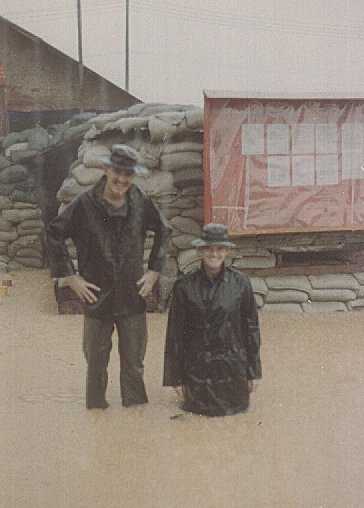
Carl King and the Skipper during the monsoon. This is back at the contonoment in Battalion Area.
Written By: Carl E. King and Bobby Hingston

Having slowly and loudly come to a halt on the runway at Da Nang, the plane’s giant tailgate began to lower. The noise of the feathering engines and the tailgate lowering was extremely loud. Attempting to talk was useless. We had to depend on hand signals. Once the tailgate was down, the signal came to deplane. As we came off the airplane, we were instantly hit by unbearable heat and blowing sand and dirt that peppered our faces. Within minutes, our clothes were soaked with sweat. It seemed like it took forever to clear the aircraft. Everything we owned was on our back. That and the weapons and ammunition made for a heck of a load. We looked and felt like pack mules. As we cleared the tailgate, we got our first site of the Da Nang airfield. And what a site it was. All types of aircraft (both military to civilian). Continental Air Lines from the good ole US of A, cargo planes and jets sitting behind fortified parking stalls. There were men in the all types of uniforms, everything from the uniform of the day, to working uniforms to us in full battle gear. We didn’t know where we were going; but then, there was nothing new about that. All we had to do was follow the guy in front of us. What we did know was that we wanted to get away from the propellers and the blowing wind and stinging sand. We could see service men that were obviously going home and could hear them shouting over the roaring engines “see you suckers back in the World”. The airport was incredibly busy. There were vehicles of all types, military and civilian, motor scooters and bicycles, walkers and runners, civilian and military. It was over whelming for us. We had been away from this kind of activity for some time and were use to things being quiet, unless we were in a shoot out. I yelled to Fred, where are we headed? He yelled back “I’m just following everyone else like you are”.
We reached a stopping point and got the command to drop our gear and to smoke them if we had them. This meant another long hot wait in an area that offered no shade. The tarmac or cement was burning hot; we could feel the heat right through the soles of our boots. I sat on my flack jacket to get off the burning ground, and leaned against my 85-pound pack. Everything I owned was in that pack. I know I could have tossed a good deal of the stuff but was sure that as soon as I tossed something, I would need it. Fred took a long drag off his cigarette and said to me” I hope this wait isn’t another three hour job without anything to get us cooled off or bathroom area to use” Why he mentioned the bathroom was beyond me but now that he had, now I had to use one. Hey Solomon, I yelled, where can I use the head around this place? Which was a way of asking, could I go find a place to use a head. He didn’t have any more information then I did about our surroundings, and we both knew it. Solomon yelled back, “wait till I find out some information on how long they plan to keep us here before anyone wanders off and gets lost.
After a little bit, Solomon yelled, “ take a couple of guys and go find a head for the troops to use and make sure that no one gets lost. When you find a spot come back and let us know so I can send people in shifts to the head” What his meant to me was that Fred and I could go off together and hunt down a cold water fountain, or a coke machine or something. We found the latrines; over next to a mound of sand they consisted of a pipe sticking out of the sand that you were to aim your, well you know what was supposed to be aimed at the pipe. We checked the area further for a watering point but could not find any. The water in our canteens was as warm as the outside temperature was at least 110 degrees in the shade. Things were not looking good! . “Hey” yells Fred “there is a bar where you can get beer and stuff”. It had a sign that said says for Air Force Officers Only, I pointed to the sign above the door and asked Fred how can we manage this one. “Give me a canteen and watch” he said. Off Fred went into the bar just like he owned it. He was gone for what seemed like ten minutes and I had decided that he had been arrested. About the time I was ready to go save him, he came back and said that “Hey Bobby, I got to sit down on a real commode, just like back home, and read a magazine in air-conditioned bathroom with mirrors and everything. They have women in mini skirts working in there; pretty Vietnamese girls”. I wanted to stay in there all day but I thought we might be pulling out. He handed me an ice-cold canteen of water that the bartender had filled for him. Ice water! I could not believe it! I had not had cold water since I left the states. The war these guys were fighting was sure different that the one I was fighting.
Lets get back to the group or Solomon will kill us. “Don’t worry Fred answered; once I fill him in on the bar and the ice water and bathrooms, he’ll cool right down; you’ll see. He did too as he and Bowman shot out in direction of the bar right after Fred let them feel his ice-cold canteen. Jay was nowhere to be found, I knew Jay and knew that he would re-con the area better then anyone else. He came back just as we were asking ourselves where he could have gotten. He was clean, his hair combed and he had liquor his breath. Belt was with him and Belt was carrying two beers, both ice cold. Where did you get them we both said in unisons? “Jay found a place where he scrounged them; there is a jeep sitting there for the taking too. If we knew where to go with it we could have some fun” I told Jay that you always make out like a banshee compared to the rest of us. Jay laughed and asked if we wanted him to get us some beer. Just then the order to saddle up rang out and Solomon and Bowman had not come back yet.
Big Six-byes were pulling in and it was clear that they would be our next mode of transportation. Fred started to run off to get Solomon when he saw them running with beers in their hands too. He shouted to us that, the Air Force loves Marine Grunts, “we just asked to use the head and he gave us free beers, he was willing to give us all we wanted, as he just wanted to ask asked us about Khe Sanh and hear some war stories. “Heck, for a beer, I’ll talk all night”, Bowman said, and they both laughed loudly. Life was good!
The Six-byes lined up in long rows, trying to get organized in spite of all the other traffic of jeeps, trucks, and a flood of motor bikes with RVN riders with pretty girls riding side saddle on the backs of them as they dangerously moved in and out amongst the worst traffic jams I’d ever witnessed. Our squad all pilled into the same six-bye (our squad and another one in 1st. Platoon). We didn’t have any Platoon Sergeants or Lt’s on our truck to tell us where we were headed so we did what we always did, guess. All the six-byes were covered with this red dry dirt that clung to the wheels and the sides and was imbedded in the interior of the cab. There were tops on the backs of the trucks because if we got ambushed, we would be leaving these trucks in a hurry and did not want anything there to slow us down.
As we slowly moved through the traffic on the unbelievably crowed streets, we could see people everywhere. Both, in vehicles and on foot, many of them walking with a bamboo type shoulder chattel that went across their shoulder that had heavy 5 gallon water gas cans on one end and stacks of debris or a live chicken in a cage on the other end, it was unbelievable to see a woman in her 70’s carrying such a load. Some had two bars on each shoulder. It looked to us like they could move faster with their loads than we did with ours when we were in the bush. These were amazing people with an incredible work ethic that I had never seen in the USA. On the side of the road was a densely crowed village built out of cardboard C-Ration boxes, parts of runway pallets, and tin roofs. There were open door ways all touching each other except for a maze of tunneled walkways that went deeper into the make shift village. The area had a thousand smells everything from the incense used to burn at their home alters for their dead relatives. To the smell of food being cooked in open pots boiling God knows what they were cooking, we could see green leaves or like shrubs being cut up and thrown into the boiling water for a soup or something. Hordes of kids ran along side the six-byes asking for food and candy and cigarettes. If you tossed them a cigarette, they yelled back at you, “You number One Joe”. “You number one good Marine”. If you tossed them any C-Ration cans they’d say you were number 10 thou, for thousand, being the worst you could be. These kids could swear up a storm in English, so in the three years we’d been here, these people picked up every nasty swear word known and unknown to American kids back home. It was a strange site to see a kid of 7 or 8 running alongside the truck carrying a baby of 2 or 3 on his hip yelling, swearing and begging all at the same time. That was definitely not a sight we had ever seen America. As we began picking up speed, we left the hordes of screaming kids behind.
With only the noise of the wind and the sounds of the trucks motors and the gears shifting, we could actually talk to each other, well, maybe not talk but a low shout. Anyway, Fred said to me, “You ever see such a place in all your life, how could human beings possibly live in those crowed conditions day in and day out with beggars and whores side by side, both trying to scrounge a living for themselves?” Never I answered, not even on TV, none of these pictures got on the six o’ clock news, just remote fighting around Khe Sanh and villages that we saw up north, nothing remotely resembling this trash pit of a living situation. My dogs had better living conditions. I’d be crazy in a week’s time with that daily maze of traffic and hustling going on. I wondered what it would take to have Americans living like that. I knew in my heart that we were very, very lucky to not have experienced the type of war these poor people were in at home.
After a fairly short trip, we rolled into what appeared to be a prison compound of some kind. There were towers, but no one in them, and barbed wire, with gates, which were open, and huts were built off the ground and lined in small rows. We could see some prehistoric looking mountains not far from us. There were about three or four of them. Very pointed at the tops but small in scale in regards to mountains in the mid western United States. I could see almost around one of them but they were about 800 feet high, but less then a quarter of a mile, an area that they all fit into. They looked like tall rock needles placed in the middle of a large flat area. There was a dump behind the Eastern area of one mountain, and a village was in the middle of the four mountains or over grown pointed rocky hills., depending on what you wanted to call them, It was an eerie site. These big rock formations pointing to the sky in the middle of chaos.
As we moved through this gate area we could see some Army MP’s and some RVN, (Republic of Viet Nam) MP’s. Apparently standing guard of some sort.
We were passing through what we later learned was the Marble Mountain Area, we could see blown up Amtrac’s, on our left in front a CAP Units position. There was also a Hugh tower with a small ring of sand bags around this tower. Looking at the area, I thought, I would never want to be caught in a firefight in this place. The landscape was barren and flat there was sand and tree lines and rivers and marshes leading to tree lines in the far distance. It would be impossible to move around without being seen. No matter how good you were, the enemy would see you coming long before you arrived. We were out in what was normally called, Indian Country, or the Bad Lands, now.
The road was packed hard mud, the red mud that was on all the trucks so they’d been here before. They told us this rode was heavily booby trapped, so I took off my flack jacket and sat on it for protection. The speed of the six-byes began to fly now, about 50 or 60 miles an hour as we passed more blown up vehicles and armor personnel carriers then I’d ever seen in my life. I guess now we finally were back in the war again.
After fifteen minutes or so, someone yelled and was pointing to our South East. They’re sat a large complex, surrounded by sand dunes, with towers and bunker emplacements ever few yards, I guess we were finally home again after all. God it didn’t seem like anything I’d pictured as being home again.
Stick around as we get kicked off on getting back into the war again. This would be a war that none of us were anywhere near prepared to fight. Follow on with next weeks story, Back In The War Again.
Bobby Hingston and Carl E. King

Solomon came in and yelled, “Listen up!! We’re point squad on this one, we’re moving out of the back gate, and swinging south west toward Cam Sa One”. Cam Sa One was, a village of Vietnamese friendless, that were not at all friendly to Americans. It was usually their intelligence that warned Charlie of the direction of our movement and our route so he could scurry ahead and set up an ambush or plant booby traps for us to walk into. There were not many places we could be going once outside the compound; the only question was what route would we take to get there. Charley knew our AO’s better than we did and our most likely direction of movement. It only took us a month or so before we figured that one out. Unfortunately, we took casualties in the process.
“Fred you’re point man, Jim will be on the radio, Belt you follow Lynch and keep your eyes open for an ambush, Lynch you look for booby traps, I’ll be behind Jim. “Jay you follow me with the blooper, Bowman and Hink you’ll be tail end. Third squad with the CP will be behind Hink and second squad bringing up the rear. We’ll have two gun teams with us, the Lt. wants them at the front and rear of third squad, so no bitching about it, that’s the Lt.’s prerogative and that’s that. No before you ask we won’t have 60 mm mortars with us on this one as were only one platoon. Now make sure you got all your equipment and form up outside the hooch”.
It was mid-afternoon when we pulled out, it’s kind a like waiting in line for the movies after they open the doors, the point man leads off through our wire parameter and out in front of the berm. It’s relatively safe until most of the platoon is strung out zig zagging its way through the wire. In the early stages of leaving the compound there are not enough men in the killing zone for Charley to bother with. But once most of us are outside the compound but still strung out and picking our way through the wire, we become a great target! So the further we get outside the compound, the more we are waiting to hear gunfire from the tree line. The further out we get the quieter everyone gets, the more apprehensive we get and the more we sweat. You can hear a pin drop and see the anxiety on the faces of everyone as they make it through the wire out to the openness in front of the Berm. Here you could hit booby-traps, or catch a round in the temple. They say you never hear the one that gets you and it’s got to be true. The velocity of the bullet and speed travel much faster than sound so the bullet as it strikes you before the sound catches up, and if it’s a killing shot… well, you get the idea.
“Lynch stay further away from the village” Solomon yells up to him. Fred moves away from the village as he is told. Quite isn’t the most essential thing at this point. Charley knows where we are and half the platoon is still making it through the wire or still back in Battalion waiting to still go out. So far, so good I’m thinking as this is the point where all hell breaks loose, but still the silence of the country side and just the muffled sounds of the equipment your carrying can be heard. Having equipment that rattles is a definite NO, NO. A major rule is to make sure that you don’t make noise when you walk. Not an easy task given all the stuff we carry but one worth working on. Nothing like a night patrol with some one sounding like he has a cowbell on to get everyone’s attention!
As we cleared the backside of the Village, the last of the platoon was just coming out of the compound. One thing we did well was stay spread out. Bunching up was an invitation to be shot at or to have a command controlled booby trap set off. If we bunched up, we made a target worth going after. If we were spread out, they had to think about the risk of giving themselves away for a shot at one man. And then there was always SSgt. King there to remind us to spread out. Let’s just say that he was a fanatic about it. The soil was extremely sandy and the landscape consisted of flat land spotted with rice paddies and some underbrush in the open areas. Did I mention how much you NEVER wanted to get hit in a rice patty? Talk about infection!! Anyway, the villages usually had a tree line around them and most of the time the trees were pretty thick. It was a lot different up North where the steep hills, narrow paths and heavy brush (some would say jungle) forced you to keep closer to each other so as not to loose sight of the man in front of you; which could cause the Company to get separated, making a great target for the NVA. Also, it was easier for the NVA to spring a more effective ambush as they could set up in the high ground across a river or ravine that you might be patrolling along. Using the ravines as patrol routes was a trip. While it was quieter than cutting through the brush (jungle), it was a known route (easy for the NVA to figure where you would be) and then there were the leeches. One CAN NOT get use to leeches. And let’s not forget the rain. During the monsoon season, the ravines could become a rushing river, in only a minute or two. Let’s just say that when it rained, it really rained! We digress. Back to the patrol.
“Halt the column” came the word up from behind. At that point everyone gets down on one knee facing out in opposite directions, and acts alert. Since we never knew where enemy fire might come from, we always had to cover ourselves for a full 360 degrees. We’d been halted because we were getting too spread out. The halt was used to allow men to get their proper position so once the word came up to halt, everyone would move to the distance he was suppose to be from the man in front of him and then really halt. If the unit was too spread out it could not respond to an ambush effectively and if it was bunched up it was a great target for a mortar attack. I hated mortar attacks, all you can do is get your body as close to the ground as possible and pray one didn’t blow the hell out of you. You couldn’t shoot back the mortar crews; they were out of sight and out of range for our rifles. Have you ever tried to shoot what you can’t see? A waste of ammo. You’d lay there, face pinned deeper and deeper in the sand while you listened to these terrifying explosions all around you. Sometimes men would scream from getting hit, yet you were helpless to help them or to stop the mortars. If someone near you got hit it was not just the corpsman’s job to get to him, but yours too, especially if it was the corpsman who got hit. Some times you had to ride out the attack before you could get to the wounded because there were just too many rounds coming in. Sometimes you could move to them and start providing help before the firing stopped. One thing for sure, it was hardest to just lie there when you knew one of your own had been hit. To jump up and run to their aid increased your chances of getting hit greatly; but you did it anyway.
“Move it out Alpha, off and on” we get up and start moving again. Always at a slow pace, almost a snails crawl. We could only move as fast as the point man that had to watch for booby traps while his back up man was on the alert for ambushes. The problem here was that the point man is looking for booby-traps and his back up is looking for ambushes. This means that the backup can’t watch where the point man has walked which means that there is a very good chance that he will trip a booby-trap taking out himself and the point man. The bobby-traps in this area were usually either a well-hidden trip wire that ran to an explosive device or small cleverly concealed and covered holes about 2 feet by 2 1/2 feet and two to three feet deep. Across the hole were two wires, almost “V” shaped attached to a pull friction fuse on a buried explosive (usually a 105 mm. round 0r larger). Hit one of those suckers and you’d never find the point man, and only pieces of the back up man while the third man may take shrapnel or get blown down by the concussion. These patrols were no Sunday afternoon walk in the park.
We’d traveled about 1500 meters, a click and a half when we got to word passed up to hold up again. At this point everyone just plopped down in a sitting position resting on our packs; we were exhausted, sweaty, thirsty, and hot as hell. “Stay alert” Solomon would growl, “Jim give me the net, the radio, so I can see what’s causing the hold up this time”. Solomon contacted one actual, (the call sign for the Platoon Commander). “One actual, what’s the hold up here, we're pretty exposed out in the open up here”. There was some noise from the radio, and then Solomon turned and said in a disgusted tone, “we’re taking five, as the rear is too spread out again, don’t go getting to comfortable. Lynch, let me see if you got us where I think we’re suppose to be on the map”. Lynch grunted while lifting himself to his feet and walking toward Solomon. “Crouch down Solomon snarled, don’t give Charlie an easy target”.
While Lynch went over the map with Solomon, the rest of us tried hard to keep from dozing off. We carried heavy packs, probably 60 pounds and that didn’t count: four bandoleers of magazines; each holding eight magazines, plus laaws, claymore mines, C-4, starter round, machine gun rounds, four canteens of water, and a poncho liner if you were fortunate to have one. A poncho liner was soft like silk material, extremely light, dried super fast when wet and kept you warm as hell as night even when it was wet. To me the best invention in sleeping gear they ever developed, as it made no noise no matter how you handled it.
We didn’t talk while sitting there, Solomon prohibited it; we might wrestle around in the sand shifting all the weight of the pack and extra ammo to reach your canteen for a warm drink of water. A call came over the radio, and then Solomon yelled out “move it out”. God getting up was a killer, all my muscles ached, and joints cracked like an old man, as I maneuvered myself to my feet without falling over from all the weight I carried on a typical patrol.
The area we were moving in was very sandy. It was like walking in deep sand at the beach back home. Except that I hardly ever wore a 60-pound pack on the beach at home. Come to think of it, I don’t recall ever going to the beach with a rifle and four bandoleers of ammo. Every step was an effort the old calves really burned. Nothing was ever easy about patrols, either we were climbing slick muddied mountains, one step up slide back two, crossing rivers, some so deep I would be up to my noise in water. I’d wonder if I was going to go over my head and drown in the current. If we weren’t in rivers, we might be in rice patties. Now that was real fun! Warm water and gooey mud that tried to pull my boots off with every step I took and the God Awful smell of the goo that stuck to everything it touched. Rice patties really presented a problem for us. They were flat and wide open. Anytime we were in them, we were great targets for snipers. If we tried to walk on the dikes and not through the water filled “ponds” that the rice grew in, we had to worry about booby-traps. So, we tended to wade through the darn things praying that we did not come under fire and have to flop down in the filthy, slimy water. And God forbid that we get hit while in a patty. One other patrol delight was going through hedgerows. These were rows of hedges that separated villages and different properties. The problem was that Charley loved to bobby-trap them and it was very very hard to find the bobby-traps. What we tended to do was go through the same place the guy in front of us went through. My definition of stark fear was not seeing where the guy in front of me went through and having to just bust through a new place on my own. And, let’s not forget the bugs. They were a bitch, biting any exposed areas, buzzing at your face and getting in the cuts that you always had on your face and your arms. Sometimes there would be hundreds of flies, I hate files, even today, I’m obsessed; when I see one, I kill it.
Patrols seemed endless. I was always thinking when were we going to get wherever the Hell we were going. I hated that, as far as we knew, we could be humping all day and night before we’d arrive at our new CP area.
When I wasn’t swatting at the bugs, sliding in the mud, crossing rivers, trudging through rice patties, busting through hedge rows and watching for bobby-traps, I would day dream about being back home, hanging out on the block, or with my girl friend.
It was nearing dusk and the order came over the radio to find a place to set in. Finally, thank God, we could drop our packs and eat something. “Team leaders have your men probe the areas: SSgt. King said. “We will set in here for the night. “There are bound to be some mines or booby-traps, I don’t want any missed”. We all dropped where we were while the point men dropped their packs and started to probe the area. We wrestled out of our packs. What a relief! The weight lifted from raw shoulders, and aching backs, it was almost rejuvenating. We were cover in sweat. So much so it appeared we’d been swimming in our clothes. A cool breeze ushering in the evening came up, and as it blew on our wet utilities it actually made us feel cold. It was a good cold. It was refreshing. Nothing-good last long in country. Smack, damn, mosquitoes checked in for the evening shift and in a few minutes we’d be covered with them. It was time to role down our sleeves and button our top buttons and to try to keep expose skin to an absolute minimum. Mosquitoes were a real problem. They just swarmed over us and would get at any exposed skin. They sang in our ears and sucked our blood. Their stings burned like hell and there was nothing we could do about it. When on ambush, we couldn’t wear any repellant because Charley could smell it and would know where you were. We couldn’t swat the damn things because the movement could give our positions away.
“Hingston”, Bowman my team leader said, “watch my gear while I go over to those trees for a moment”. “Bowman”, Fred yells to him, “I haven’t probed that area yet you’d better wait till I’m done”. “I know what the hell I’m doing. Now you do your”…. BOOM!!! BOOBY TRAPS! BOOBY-TRAPS! Was the yell, as Fred and Belt were thrown to the ground by the force of the explosion. I looked up in the air and could see this role of toilet paper twenty to thirty feet high coming back down. “BOWMAN” Solomon screamed and started running towards Bowman. He tripped and fell on a booby-trap that didn’t go off. Jumping up, he headed for Bowman once again and once again he tripped over another bobby-trap that also failed to explode. Belt was the first one to Bowman. You’ll be all right, you’re going home. SSgt. King yelled out “nobody move, freeze and face out to cover any sniper attacks. Get this area probed! Call for a medevac now. Tell them it’s priority, we have one down from a booby trap”.
“Solomon! Solomon!” The Platoon sergeant yelled as Solomon stared motionless at Bowman’s body being wrapped in a poncho. “SOLOMON!” Still no responses. “Jay, get the men formed up and get someone to put Bowman on the chopper when it lands. That sniper waiting for the chopper to come in before he’ll open up at it, and I want that bastards head before I hear the echo of his first round.” “Aye, Aye,” was Jay’s reply. A few of us got what was left of Bowman’s body ready for the incoming chopper. What a truly a horrible way to go! Bowman’s death shook us all up for some time, but it also made us that more determined than ever to blast the shit out of every NVA and VC we could find.
As the chopper was being guided in, sure as hell, the sniper opened up on it, and everyone blasted away at him. I was one of the ones carrying Bowman’s body to the chopper and that sniper was getting too close to us for comfort. One of the Marines dropped like a rock a few feet from the chopper. I thought for sure the sniper got him, but running in knee-deep rice paddy water is no easy feat, he had only tripped. He quickly recovered and we got Bowman’s body on the chopper and watched it take off like a rocket to the moon still being hit with small arms fire.
Bowman, my team leader since I joined Hotel Co. 1st Platoon, taught me a lot of survival techniques that probably kept me alive. He wasn’t everyone’s best friend. He rode us hard and we didn’t always appreciate it. But he was a damn good grunt! One you could count on when you needed him. He was a good man who died a horrible death.
That night Fred and I were in the same hole, not far from where Bowman got it. Out in front of us was a village, a couple of hundred meters from us.
Fred eventually fell asleep, yet it was a good hour or so before the dogs left. The whole area smelled like death, all of us that had been near Bowman had some of his blood on us, and it left that metallic silvery rotted smell deep in your nostrils. You’d want to puke, but that wouldn’t change anything, only time or the next stream or river we’d cross would help eliminate the odor. I covered myself with my poncho liner, reached for a cigarette and pulled out my lighter. Smoking was forbidden at night, as any sign of the cigarette could be seen a long way off. We had a system though, you’d put your hand inside and under your shirt, shift your hand up to the open collar part, than turn your back, and get low in your hole while you covered yourself with the poncho liners. Once you figured you were well covered and couldn’t be seen, you’d light the cigarette as fast as you could, snap the lighter shut, Zippo Lighter of course, and than covered like a mummy in your poncho liner with only your eyes exposed, take a drag of the cigarette and slowly let the smoke out as you exhaled. The last thing you’d want to do is send out a huge puff of smoke, Charley could smell that too and home in on you. You were especially careful to cup your hand around the cigarette as well, and just let the hot ashes fall as they may. When it was almost gone, you’d duck down into the hole again and put it out in the sand or mud.
Watches went very slowly and smoking a cigarette helped you pass the time and keep some of the mosquitoes from eating you alive. Usually a watch wasn’t longer than two hours, because of exhaustion from humping all over Gods creation with 80 lb., of gear had its way of taking its toll on you, not to mention the heat. Two man positions were rough as you would finally get to sleep and you’d be shaken awake for your watch again. Being tired and exhausted was an everyday experience. The only time you’d really seem to come to life was when they ambushed or out right attacked you. The adrenaline would pump like a Banshee through you in an instant, and all tiredness and fatigue would instantly be gone. Somehow watching Bowman go through what he did was going to make for an especially long night. I still couldn’t get the sight or sounds he made out of my mind. Booby-traps of this nature were something I don’t think any of us ever experienced before. It gave you an awareness of just how dangerous just walking around could be without the additional threat of being ambushed.
Fred had the last watch, so he woke me as the sun was greeting us with a brand new day. We’d usually grab a can of C-Rations and eat really quickly, as we’d all be waiting to hear the sound of Saddle up at any time once the sun was up. Where we were going, we had no idea, how long out was also a puzzle. A lot of times you wouldn’t know when it was over till you’d see the Battalion Area again.
Jay came by our position and informed us that we were going to be saddling up in the next half hour or so. This was new to us, as nobody, except Jay, when we were on patrols up North with him ever kept us informed. We had forgotten that Jay had taken over for Solomon. Solomon was in bad shape still and was being taken in to the rear. Bowman’s death was more than he could handle as they were close and had been together for quite a while.
“Fred, where’s your map and compass”, Jay asked. “Come over here Bobby, I want you both to know what today’s activities are and where we’ll be going and what patrol route we have. Bobby I want you to scrounge up a map and compass some how, I want everyone in this team to have them. I expect each of you to know where we are and where we are supposed to be at all times. Here are a list if frequencies for the radio, memorize them and destroy this list. When I ask you at any time for these frequencies I want you to be able to rattle them off. I want you to know them as well as you know your name or service number. Got that?” Yeah sure we said, I guess now things are going to really change around here now for us. “ Bobby I want you walking back-up behind Fred today, you know the routine, just like we did it up North OK”. Yeah no problem I said. I was sick of walking tail end Charley; back up was a lot more exciting, especially when we were the lead squad. Both Fred and I had been trained by Jay up North, he was fair, partial to know one, and no one messed with his men, no one...
Some how a new cohesiveness just formed in a matter of minutes. It was like pressure had been instantly removed. Solomon was a damn good squad leader, but not one for providing many details. We pretty much just followed the guy in front and waited for instructions. Jay would keep us informed as he could but he didn’t know much either. With Bowman gone, learning by being yelled at was over. In fairness to Bowman, he had probably learned to lead from a yeller and thought that was the way it was done. Jay was quiet, never raised his voice, would go over things as many times as it took for you to know it, and you’d know it when he was done. Jay trained a lot of guys that weren’t with us anymore, not that they screwed up, he just was assigned to train a lot of people, especially new ones, and we were also expected to train them as well in every area of knowledge we knew. Fred and I would train people in demolition as we had been the only two in our company who had been to school for it. We also trained people to walk point, use a radio, and operate a compass and map. Everything we knew. Once trained they’d go into other outfits in the platoon, and we’d get new guys to train again. We did a lot of training, but the platoon was really coming together as an incredible awesome unit.
Our Company Commander (Capt. Jones and our Platoon Sergeant (SSgt. King) were BIG on training. They both knew how fast leaders could be taken out in a firefight and how often PFCs would be leading Squads. It was a high priority for them to have everyone trained to be ready to take over the job two levels up. Capt. Jones was a true field commander. It wasn’t uncommon to be out in the middle of nowhere and run into him out there on a patrol with another unit. He wasn’t one to stay in the rear when he could be out in the bush, and that we all tremendously respected him for. When the shit hit the fan, he, the Skipper wasn’t far away or was on top of things on the radio with you. I don’t know what rattled him, because what ever it was, we never saw it. There were times artillery falling would be falling all around us and if you looked up, you’d see him up giving orders or calling in an air strike. Our platoon at this point was really together and something was special about it, exactly what I can’t say, but you could actually feel it.
Continued in a weeks time or so by Bobby Hingston and Carl E. King.

Man was it hot, dust blowing sand all over my sweaty body. I had to cover my mouth to keep the brown dust, dirt and sand out of it. I was soaked through, from head to foot, with perspiration. the muddy sand now all over every inch of skin which was exposed made you feel wretched to say the least. We were headed for Da Nang and were waiting on aircraft to pick us up.
It seemed as if we'd never reach Da Nang. We began our trip with a helicopter ride from Con Thien (right at the DMZ) to our Company patrol base in a tree line at Cau Viet. We had called this area home for 2 months. From the tree line, we took Amtrac's to Camp Big John where our gear was stored and then boarded this rather large looking landing craft, but 50 times bigger (I think it was a LCT or Landing Craft Tank). We slowly crawled down the river, exposed to anyone that felt lucky and wanted to shoot a Marine. Nothing much to do but watch the land go by or sleep, I found a soft area with some protection from snipers and caught up on some much needed sleep.
We arrived at Dong Ha just as the sun was setting and set up to spend the evening on a large pier. Much to our surprise and good luck, there was another large tied up by our boat. The good luck part is that on that boat were cases and cases of beer, soda's and God only knows what other kind of goodies that we had not had access to for months. As you might guess, we zeroed in on the beer and soda. We carried away all that we could so that everyone would get something. Just as we sat down to enjoy our first beer (or soda) a Navy Lt. came over to Peter Hoban (Hobe) and accused us of stealing government property. He suggested that we return the stolen property. But, much to his credit, (and intelligence) upon looking out at our Marines, he noticed that we were dirty & tired. Most of us had on torn and ripped clothing. We had obviously been through some tough times and we were all carrying loaded weapons. Once he fully comprehended what sort of group he was dealing with, he began to lower voice and change his tone of speech. Hobe told him that he wasn't the person in charge, why didn't the Navy Lt. just ask the men to put it back. He again looked us over, about 50 Marines, tired, hungry, and thirsty and generally mad at the world. He gave Hobe’s suggestion about ten seconds of serious thought and then motioned to his people to return to the ship and forget what happened. Smart man that Navy Lt.
We settled down for the night. Sitting our gear, flack jackets, cartridge belts, helmets, and anything soft. Everyone had this incredible ear-to-ear grin on their face. For the first time in a long, long time there would be no standing lines all night at two-hour shifts, no real fear of an attack and nothing to do but drink our borrowed government property. I had two cold cokes; I never developed a taste for beer, especially beer hot beer.
We go up at O-Dark thirty, and got ready for our first cooked breakfast in months. We were to have cold milk, eggs and ham. Cooked anyway you wanted them. It had been so long since I had had anything cool to drink that after two glasses of milk, I was too full to eat my breakfast.
Dong Ha. Was (for the Marines) a rear area? It had chow halls, nice hooch's, beer halls and neat stuff that we never got to see. All the troops wore bloused trousers, shined boots, haircuts and starched pressed utilities. To say we stood out would be a real understatement. There we were: filthy & smelly, with blood stained trousers and jackets. Our uniforms were literally rotting off us. Many of us had not had a change of uniform in two months; but we could have cared less as long as we got a hot breakfast.
Once we finished breakfast, we headed back to the pier to get our gear, so we could move down to the runway. We waited what seemed like hours in the hot sun with no shade and no place to get relief from the unrelenting heat. Finally, we saw, these C-130 cargo planes coming in that would take us south to Da Nang. The C-130's are the loudest airplanes you will ever hear. None of this nice quiet plane with a movie and air line stewardess to take care of your every need. These were guttered out hollow fuselages, not even a seat to sit down on. There was no sense trying to say anything to anyone because even the person right next to you wouldn't hear anything you had to say above the noise of the rattling cargo plane.
I curled up in my gear and tried to keep warm, (I think I was either hot or cold with no in between the whole time I was in Vietnam) there was no glass in the windows and the back cargo door was part way down so we had lots of wind. It was an awful ride. As we were coming in to Da Nang, the pilot came over the intercom to give us some instructions and then asked the co-pilot if he had ever tried to land one of these things. The co-pilot said no and the pilot said, “want to try”. Needless to say, we all perked up. Turned out that the pilot had a very sick since of humor.
Stick with us as one a week will hopefully be brought to you by myself and co-author, Carl E. King without whose help these would be on disk in my files.
Bobby Hingston and Carl E. King.

The 21 days at the POW Compound went fast. We got a lot of rest and got to know the Da Nang area a little. We spent the days sleeping, reading and playing back alley (I think it was my goal to loose all my money; I hope so; because that’s how it turned out). We did run a couple of daytime patrols around Marble Mountain during the daytime without any incidents, and had listening post out every night. However, there was no real activity so, it was like a vacation for us. I spent a lot of time in front of the Lt. Meale because I kept “loosing” my cover (hat) and he was always catching me being outside with out it on my head. As every good Marine knows, it is a sin to be outside with out a cover on. I was not a hat or cover person, never wore one as a kid. My grandmother had told me that my grandfather was going bald from wearing a hat and I sure as heck did not want to go bald because of some silly rule. Anyway, the Lt. was not near as much concerned with my going bald as he was with enforcing the rules. So, I would try not to wear a cover and he would catch me.
Word came down that he vacation was over and that we were moving out to the compound that 27th Marines had been occupying. Our new job would be to relive them and stat patrol operations outside the compound, which was south of the Marble Mountain airbase a few miles. We had not heard much about the area but figured that after Khe Sanh and the Cau Viet, it could not be too bad. Wrong! We were very wrong! Anyway, we had to get our gear together and gather up to wait for the six-bys. One good thing about the move that we were looking forward to was sleeping on cots in tents out of the weather. We knew that when we were not out on patrol, we would be in the compound. A real treat!
A lot of our stay at the POW compound was spent in training us. Fred and I learned a lot from Jay and others in the platoon about our jobs in the squad. We had to know every job; everything from being the “Squad Leader to being the Tail End Charlie”. One thing they had learned at Khe Sanh was that there can be a lot of instant openings for leadership positions in a fire fight and it was a real good idea to train everyone in everyone else’s job. As a result, we were drilled a lot harder on squad and team tactics during our stay at the POW Compound. Even more so than when we were up North (something to do with never let a Marine sit idle, and a bitching Marine is a happy Marine). We each had to know all the frequencies for our supporting artillery batteries, for the air wing units that supported us, and the different medevac frequencies. I knew how to call in artillery support and a medevac chopper to within ten feet of my position. I knew the responsibilities of being a team leader and squad leader and when I would assume any of those positions. I knew who was superior to me and who wasn’t. Having made PFC out of Boot Camp and Lance Corporal before getting to Vietnam I was pretty much senior to everyone else in my squad but, I was still junior when it came to bush time. The company was short on people with any rank, there were few corporals and sergeants; but, mostly lance corporals and PFCs. We were lucky to have a Staff Sergeant for platoon Sergeant (Staff Sergeant Carl King) and a Lieutenant for our Platoon Commander (Lieutenant Sam Meale). We also had a company Gunnery Sergeant Gunnery Sergeant Merrit) and a Captain. Captain Phil Jones was our company commander.
Have you ever noticed that when you are in no rush for your rides to show up, they have a way of coming early? As you may well guess, we were in no hurry to leave the POW compound. So, the six-bys poured into the gates of the compound, EARLY, and lined up for us to board. The drivers seemed to be the impatient ones this time rather then us who would normally been sitting in hot sun and baking for hours waiting for our rides showed up. Fred stated first, “just like these guys to come early when I could have caught a couple more of minutes of shuteye’. Someone else joined in with agreement and before long everyone was complaining because they came so early.
We’d policed or cleaned the area up cleaner then we found it so that it would be ready for 2nd Platoon to take over and enjoy for a 21 day stretch. , They were in for a real treat. 21 days of easy living. We heard some lousy news about how 3rd Platoon had lost a lot of guys from Booby traps and it was 3rd Platoons area of operations that we were going to be taking over. The 2nd Platoon had been assigned to guard a bridge and Charley had managed to blow it up shortly after they took over. The Captain was not happy! It was hard to look good with bridge falling down around your head. Division would not be happy. They were very concerned about the little things (bridges staying in tact) and could end a good career over it. The facts that we were under strength, under fed, under clothed and short on every conceivable item in the supply chain did not seem to us to be very high on their area of concern scale. But, a bridge! Now, that is important!
Don’t get me wrong, there were some units in Vietnam that had all the best supplies. The Air Wing looked real good in their clean, starched, camouflaged utilities. The rear area guys we saw seemed to have it all; hot meals, maids, clubs to go to, movies to see and USO shows to go to. The Reconnaissance units were well equipped too. The rest of us poor slobs got what ever we could scrounge from the army, the Navy other Marine units or even the ARVN (the Army of the Republic of Vietnam Troops) who we supplied with better gear then we had. The ARVN had super packs that were comfortable to wear over long periods and actually would hold gear that you needed to carry; not like our trusty Marine Corps packs (the same packs used by the Marines in WW2) that held nothing and were uncomfortable to wear, for even a few minutes. Longing for one of the cool packs, I swapped some of my ration cards to buy cigarettes, for a brand new ARVN pack. Jay Vincens scrounged most of the good stuff we had when he went on his “re-supply missions” into Da Nang. Other than that, we traded for, bargained for or outright stole most of the equipment that was worth carrying. I’m began to feel as if I was finally outfitted correctly, I even got a new flak jacket to swap for the one I was issued with holes and blood stains.
Our ride back to battalion was uneventful, but another ride of hell at 60 to 70 miles an hour down a two-lained dirt road with a possibility of booby traps at every turn of the wheel. I figured hitting the bobby trap at normal speed would be bad enough maybe someone might be thrown clear and live, but at this speed hitting a booby trap, the speed alone would kill us all, but I guess that was a bit too much for the driver to figure out. I got to tell you, it is a helpless feeling flying down the road waiting on an explosion to end the trip. The only thing to do is pray and have faith in God; it is definitely out of your hands. We arrived in one piece along with the other six bys and found the area to be the same as it was when left it. The stuff in the hooch was just as we left them; nothing was missing. Our C-Bags were stored in a single tent; little did we know that in a few months they would be all under water when the monsoon season hit us.
We were just settling into the huts and reclaiming our cots, and small areas of territory, when we got word to form up in formation in front of our hooch’s. We were a bit better now with formations because of the “practice” we had at the POW Compound; at lease now everyone knew where they were suppose to stand and in what order. The Captain told us that we’d be going out on a patrol in an hour and that we were to saddle up with our patrol gear and meet over at the Amtrac’s area. They would be taking us out to drop us off for a few days of patrolling. Boy were we surprised, we thought we’d get the night off and at worse have to stand lines, but going out on patrol our first night here was a bit quick for us.
The area that surrounded the Battalion consisted of splotches of sand with small dunes and rough brush. It was difficult to move through unless you moved on the trails and if you moved on the trails, you ran the risk of bobby traps and of being an easy sniper target. There were “friendly” villages in our new area of operations (AO) that the Captain wanted to see just whom they were “friendly” to. Were the bad guys were using them to store supplies or as operation centers? Where were they staging their troops before they made attacks on the battalion area? He had a few little things he wanted to know and he wanted to know them now. Not tomorrow, but now.
A couple of guys were asking some of the men who had joined our platoon from 3rd Battalion 27th Marines. (They had been working this area and did know something about it) where we might be headed. The answer they got was not good. “Probably to one village or the other. They are all VC sympathizers in this area, so it makes no difference who call on first”. The new 3/27 guys bounded quickly with us at the POW Compound and were now just part our platoon and the squad they were assigned to.
It was now close to mid afternoon and we were being assigned to the Amtrak we’d be riding for the first part of our journey. The noise was loud and the smell of fuel was thick in the air as it invaded your nostrils. Getting up on top of these big boys was going to be a big challenge especially for me being so short. These, as you can see, are not just hop up to and you are on, someone has to pull you up, or the back gate has to be lowered so that you could use it as a step. There was plenty of firepower. The Amtrac had .50 Cal. Machine gun and we had M-16’s rifles and M-60 machine guns. When riding on one of these, you don’t let your feet drape over the sides in case you do hit a box mine, it would shear your legs right off. But then, if you hit a box mine, the whole thing will burn (the gas tanks will blow) so it does not really matter where you put your feet.
This was a Company size patrol so we would be using four Amtrac’s. 3rd Squad caught the first Amtrac, we had the second and there were two more behind us as we pulled out of the Battalion area heading for the front gate. I was glad that we were not on the first Amtrac. The first one was most likely to hit a booby trap. But then, being on number two wasn’t a real god deal because Charley might wait to hit the second Amtrac so as to cause confusion and divide the Company. Additionally, riding on top of an Amtrac in the open, in sniper country, is not my idea of a fun filled afternoon.
We road along on the roads for a time then we got to where the MSR (Main Supply Route) cut off from the Tu Cau Road, which lead more directly to Battalion. Here we went catty corner splitting the two roads like an isosceles triangle, heading into dried up rice paddies and towards a jungle area where some tops of hooch’s could be just made out. When we hit the jungle area the Amtrac’s stopped and we were ordered dismount. This meant jumping down ten feet to the ground with our packs and gear on. This again is not easy someone whose 5’ 6” tall, carrying 60 pounds of gear and my M-16. But, some how, I managed to get off without hurting myself. This is how the area looked to us after hopping from the Amtrac.

Jumping off the Amtrac’s in the open with the brush up ahead, made me more than just a little nervous. Who, what and how many were watching us and what would they do?
As we were disembarking from the Amtrac’s, kids began showing up and crowding around asking for cigarettes and chow. “What you name” they would say to you, and I’d say Bob and they’d say “Obb, you name is Obb?” Yeah I say, my name is Bob, “you nice man you souvenir me one cigarette, be number one Marine”. Sure I said to this nine year old or less kid I’ll give you a cigarette and I lighted it for him too. “You number one GI”, and other kids then would crowd around asking for cigarettes but my new friend kept them at-bay because I took care of him and he knew I couldn’t possibly give all of them a cigarette and have any left for myself. I guess to it was a way of testing you as to the amount of gear you were carrying and how long you’d be in there area, by getting or not getting cigarettes or chow and anything else as some would be selling cold sodas for a buck and I’d buy one being so thirsty for something besides water all the time. We weren’t in an area where we needed to save our money because it would be forever before we’d get a chance to get into Da Nang again.
The Amtrak’s began pulling away, 2nd Squad took point for the Company, and we headed for the center of the village, it began to get dark. As suddenly as the kids had appeared, they disappeared. Alpha was behind Bravo and then behind us was the CP group and then 3rd Squad had tail end. We walked slowly into the Village and when most of us were in the center of the Village a cry came out from someplace just out of sight ( know it was from one of the kids we had just been friendly with) instinct took over and I hit the dirt. Lucky for me because I could hear rounds zipping by where my head used to be. Our new friends, the kids, had waited until we were in the middle of the killing zone to give the VC the signal to open fire. We opened fire right back at them. We were trapped in the open on our bellies with rounds zipping all around us. “Get the guns firing on the hut over there and you M-79 men get some fir on those huts”. Yelled SSgt. King; he knew exactly what to do to get us out of the killing zone. No one spoke but concentrated on returning fire into the areas from which we were receiving fire. We were giving as good as we got! Then, as suddenly and as quickly as it began, it stopped and there was an eerie quiet throughout the entire area. “Get up and move out", SSgt. King said and keep your eyes open. They may be setting us up for another little surprise. Anyone hit or hurt”, no came back up the line to SSgt. King as we moved out of the village to the safety of some dried up rice paddies about a hundred years from the vile. We requested that a few rounds of artillery be fired on the village to thank them for their greeting but permission was denied. It was a” friendly village. Friendly! If these are our friends, how is the enemy going to greet us? Lucky for us that they could not shoot worth a damn, they didn’t hit anyone. Thank God! Had they been Marines, we would have been history.
We kept our eyes on the vile and surrounding tree lines and jungles, yet all was quiet. We began to set in here and as we did I went to 3rd squad where I was talking to their squad leader “Stretch”, or John Ellingburg, Stretch was a better name to call this tall thin Texas boy or Oklahoma born son. As I talked with him he began to stand up and when he did, he caught a sniper round (which would have hit me in the face) right in the left shoulder and he fell forward onto me. I yelled “Mother Up”, Stretch is hit and the Corpsman came running without hesitation. We covered for the Corpsman while he treated Stretch and kept a close eye on our “friendly Village” where the shot had come from. God I was thinking, I hope Stretch is alright, if he hadn’t stood up exactly when he had, I’d be dead with a bullet in my face, this sniper could shoot, it was getting dark and the shot was from more then 150yards away.
When the bullet hit Stretch, it sounded like a loud thud, or if a rock struck him really hard. Stretch was hurt pretty badly as we medevacked him out. He never returned to us. He’d been in Country for sometime but that was our first casualty in this new area and it felt lousy. I just hoped that he would be OK. SSgt. King was upset; he did not like losing one of our squad leaders to a sniper because I wanted to talk to someone to take up time before we ran our nighttime ambushes and such. This all happened around the 6th of September 1968.
The next couple of days went without too many incidents; but set the tone for our stay in the new AO. We would loose someone everyday from either a booby trap or a sniper. We would be fired on from Villages we had just been through but we could not return fire into the Village because they were “friendly”. The booby traps were usually foot trap booby traps. These booby traps were in a hole about a foot in diameter and crisscrossed with pull friction fuses attached to a pull friction fuse inside 3 pounds of C-4 or plastic explosive attached to a dude 105-mm. Round or 155 mm round. When you stepped on this you’d fall to your crotch with the explosive going off right next to your torso, blowing you in half and killing you and anyone near you. They were dug in the sandy areas and covered with a small plastic piece that they get from the dumps of Da Nang from the wrappings of equipment that were brought in. Usually kids about 12 or 14 years old dug the booby traps and would even mark our way or movement and run ahead to set booby traps to get us.
The children of Vietnam were not like the children in the States. They were mature at an early age. By the time they were of seven or eight, they were responsible for their younger brothers and sisters and they would often times be tasked with tending to a 14 month baby for the entire day. These kids were growing up in a war zone. Their family and their family’s family had seen nothing but war for 100 years. No wonder these kids and their parents didn’t have the same value systems that we had. How could we expect them to adopt our way of living? Here were people that would live an entire life and never travel more than 3 miles from their village. They got up at first light and worked their fields until dark. All they wanted was to be left alone. It did not matter to them who was in charge. Who ever it was would ask them to pay taxes for services they never receive and would draft their young to go fight in a war that they did not understand. Democracy meant nothing to them. What mattered to them was staying alive. Who ever were in their Village with a gun was in charge and it might change several times a day. Marines during the day and VC during the night. They had to play both sides and that is what they did.
Stay tuned for more exciting firefights coming your way in the next several stories. These stories are written by Bobby Hingston, and Carl King.

It was a typical patrol, we were moving through the countryside as usual; carefully watching for bobby traps and alert to the danger of snipers. Solomon, our squad leader, was managing the patrols movement through “Indian’ country. We had reached a point near the Tu Cu road about six or seven hundred meters from “Booby-trap Alley” when we heard the all to familiar sounds of a firefight erupt due south of us. We knew that the Second platoon was patrolling in that area and we soon heard them on the radio requesting fire support or assistance. They were taking heavy fire (it sounded like all hell was breaking loose) and were pinned down by a large enemy force. We were only a few hundred meters away.
“Brake, Brake, this is Hotel 1 Alpha, Hotel 1 Alpha, responding to second platoons request for assistance and we are on our way”. Roger came the reply; where are you? We were already moving in their direction at a fast clip as Solomon relayed our position to them. The going was tough. We had to move through knee high rice paddy water, watch for bobby traps and be alert to a possible ambush. Given all that, we were still dam near running. When another Marine unit is in trouble, you tend to push the envelope! Solomon let them know the direction we were coming from. He wanted to make sure they would not fire on us when they saw movement coming from our direction.
Drenched in sweat, our hearts pounding, we felt like the cavalry coming to the rescue. We were a small squad of five or six men. Squads this small were the norm. While a Marine Rifle Squad should have 13 men, we had not seen anything larger than a 6-man squad since Khe Sanh, We had absolutely no idea the size of the force we were running towards, we just knew that Marines were in trouble and we would do our best to help. Solomon gave us the hand signal to halt. It appeared that we were only a few meters behind the enemy positions. Solomon notified second platoon where we were and that we would soon start an envelopment movement on the unsuspecting enemy.
We struggled as we literally pushed our bodies through dense, tall grass in our efforts to get in position to open fire on the enemy. The Second Platoon stopped firing so as not to hit us, but Charley kept firing at them at a very heavy pace. I was right behind our point man, (we called him Pointer; he was a black dude from the Midwest) when he yelled-out. I thought he had been hit. I looked up to se what was happening and saw what had caused him to yell-out. There were VC every where. They were in the trees and on the ground. I had never seen so many VC at one time. I spotted a small group about 10 feet from my position and opened fire on them. Everyone in the squad was firing like crazy. We had literally walked in to the middle of at least a company-sized unit. Our M-79 man, Jay Vincens, fired his blooper at a VC, hitting him square between the shoulders causing the top half of his body to disappear. Everyone was in the game. VC were being shot out of trees and the ones on the ground were being shot down as they tried to run away. We had caught them by surprise and they did not know what to do. I am sure that they thought we were a much larger force. Had they know that there were only six of us, they would have reacted quiet differently.
The Second platoon had to sit this one out. We were literally intermingled completely with the enemy forces. They were dropping like flies we had caught them with their pants down, big time. Charley was everywhere! They were running past us, around us, in-between us. Confusion ruled.
Rounds spit up all around us, as we hammered them furiously- giving no quarter. Fred opened up knocking two or three out of their sniper positions in the trees. Solomon mowed down a couple that ran right into him. Benny, Belt, a super bush fighter from up north, was having a field day, and had a grin from ear to ear as he kept shouting “Shit’” Shit” as VC dropped around him. He didn’t need to waste ammo firing at the ones that he dropped, he was one heck of a marksman and seldom ever had to fire twice at the same target.
There goes a couple, someone yelled in the excitement. Jay swung his Blooper around and put a solid round between the shoulders of one of the runners. The top of his body disappeared and his buddy fell next to him hit by the shrapnel from Jays round. A two fur! I was blasting at fast moving targets running by me on both sides, it was hard to decide which group to shoot at so I favored them both with a few rounds hitting hit a few in each group as they disappeared in to the heavy under brush.
Suddenly, the firing stopped. The first moments after the firing stops are incredible. Your mouth is suddenly dry. You look from place to place; trying to find the enemy. You hear your own heart beating. You look to see if you were hit. The silence was deafening. The quiet is nerve racking.
Solomon put us in a 360-degree perimeter to keep us from being hit by any VC that might try to double back on us. He then radioed the Second platoon with the news. “This is Hotel 1 Alfa, 1 Alfa is all clear in here over?” Second Platoon came back with a happy sigh of relief and they thanked us for our help. Solomon radioed the Company with the results of the action and the approximate size of the enemy force we had engaged. The next thing to do was find out how many confirmed kills we had, the number of weapons we had recovered and look for intelligence information (maps, papers ect.)
Solomon, he directed us to start searching the bodies. Damn, they were everywhere. There were even some NVA nurses with AK-47 rifles by their sides. Some of the snipers in the trees were hanging upside down 15 to 20 feet in the air, caught in the heavy branches; their weapons had fallen to the ground. We searched the area carefully looking for intelligence information and for wounded VC. Prisoners were rare and we hoped to bring one home. We were all proud of what we had accomplished. We had taken on a much larger force, rescued second platoon and had taken no casualties. A miracle.
“Saddle up!” Solomon snapped, seeming irritated after talking to the rear, “we’re pulling out to tie in with second platoon”. Everyone was puzzled; what about the confirmed kills, and papers some of these guys must be carrying? “Orders are to Saddle up!!! Now grab what gear you got and let’s go. Lynch, Pointer is a little shaken up, you take point for now. Fine a probing stick before you move out. Everyone else fall in, and keep your eyes pealed for a counter attack. Let’s go, move out towards second platoon. They are expecting us. Keep your eyes open. We don’t need to get ambushed. We are leaving a lot of dead VC “they will fight no more forever”. A quote from Chief Joseph of the Nez Perse tribe that took the entire US Army on in the dead of winter. He was a warrior, from whom the word warrior was coined from, back in the late 1800’s.
Heading toward the Second platoon, we broke out into open rice paddies. I was walking tail end Charlie and I heard this commanding voice yell, “Hingston, keep your eyes on the rear like you’re suppose to, or you’ll get us all killed. I guess I was daydreaming about the encounter we had just had and my mind was still on the firefight and not on what I was suppose to be doing. I immediately started looking behind me over each shoulder as we crossed a rice paddy dike headed for some sand dunes where Second platoon was.
Needless to say, they were grateful for our assistance; yet surprised there were so few of us. You sounded like a platoon over there the Lt. remarked. Well sir, Solomon said, “ We did have our hands full. It’s nice to get a few good blows in now and then. By the way sir, there are quite a few confirms down there with weapons. We shouldn’t leave them around for the VC to pick up. We hit some nurses too, it must have been a large force to have nurses with them.
“You are to continue your patrol and then go in to be debriefed. We will clear the area. We didn’t like this at all. We did the killing. We should get to clean out the area. It was not the first time this had happened to us. We had ambushed a squad of NVA on the outskirts of a village a month or so back. We did the killing, and another platoon mopped up the area and got all the goods.
Solomon gave the order to saddle up and move out. We headed toward the Tu Cu Road again, to complete our assigned patrol. “Pointer you take point again. Lynch you walk ahead of Hingston. Both of you keep your eyes open. We’re not out of danger till we’re back at battalion”. We moved out slowly; Careful to keep our distance from the man in front. Our adrenaline was still pumping, it doesn’t matter how many fire fights you have been in, that adrenaline takes time to wind down so everything is still moving in some kind of slow motion vacuum in your mind and through your whole body.
Written by Bobby Hingston and Carl E. King
Mike saw a lot of action during his tour. He was involved in some of the worst fighting during TET of 1968. The chapters below will show you what kind of man he was and Marine he still is.
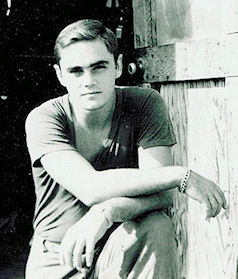

I am Michael Donovan, Marine Corps serial number 2256353, MOS 0311- Infantry. I was 19 and a Lance Corporal, E-3, when I arrived in Da Nang. My tour in Vietnam was from Nov. 17, 1967 to Dec. 9, 1968.
We got off the plane in Da Nang and were assigned to haul garbage and were assigned line security duty for two days. The heat and aromas were thick, and the humidity was terrible. Little did we realize this was just a primer for the next year to come.
The whole country is at most 50 miles wide in the I corps area up north, only 50 miles wide between the North China Sea and Laos. I was assigned to Hotel company, Second Battalion, First marines of the First Marine Division and was stationed in Quang Tri Province near the city of Quang Tri. We were only there about four weeks after I arrived.
They put me on the line in a bunker and it was pouring down. It was the monsoon season. It was so dark and heavy with rain I sat out in front of the bunker. I did a major sin and feel asleep. Had not had much sleep and in fact the whole tour we would only get three to four hours of sleep per day. A Sergeant who was going home soon was checking the lines and he slammed me on top of my helmet with his rifle, I thought I as dead. He was rightfully pissed and I tried desperately to not fall asleep again. I did pass out from fatigue a couple of other times in the next 13 months.

The first patrol out in this area a sniper bullet came very close by me. You can tell the close ones because they make a sharp cracking sound like breaking a limb when they are very close. I was so new I was the only one standing for a second or so. Little things like that can get you killed. Another thing that sticks out in that area was a special operation our battalion (three companies) pulled for a week. They sent our platoon on top of a hill that did not have one blade of grass on it. We dug in on top of that stupid hill for six days and it poured buckets of rain the whole time. We almost froze to death. We only had a poncho, tee shirt, and pants. No jackets. We sat in our fox holes which were half-full of water four hours on and four hours off covered with a poncho. We set out had grenades in c-rat cans with trip wires out in front of the perimeter. When it came to pull out we could not remember exactly where we had put a couple and almost set them off when we went to retrieve them. One of the guys took a step and we could hear the grenade dragging in the can. We got them without getting hurt.
When we got back to our base we had just settled in our bunkers and were trying to warm up when we heard someone holler "saddle up", our battalion commander decided to send us back out to set up an ambush. I was so mad I wanted to shoot him instead of the gooks at that point. In December of '67 we were sent to Con Thien which was one of the Hill combat bases along the DMZ. My company (three platoons, I was in first platoon) was sent just outside the lines at Yankee station. We actually worked every day adding concertina wire and improving the trenches.
Our combat bases resembled WWI trenches and bunkers. We slept in bunkers with three to four men per bunker. We ran patrols, ambushes, and listening posts for three months from this area. The NVA hit us with artillery fire just about every day. Probably twenty to thirty rounds per day. Most of it on the main base of Con Thien. We had good seats to watch the fireworks. One night I was in our fighting hole when I heard this shrieking sound from the sky that was getting louder and louder till you could not think. Then about a half mile away the earth erupted in giant blasts that lasted for 30-40 seconds it seemed. The ground was actually heaving up and down and I was bouncing on the bottom of the bunker. I ran back to the sleeping bunker and asked what that was and if it was ours or the gooks. My fire-team leader Larry Plumber "Dallas" (even though he was from Oklahoma) told me it was a B-52 strike called an "Arc-lite". It scared the hell out of me, but I was sure glad it was ours. These strikes understandably petrified the NVA. Each shell would make a hole 20' deep and 60' across and there were hundreds in each strike.
The enemy hit us a couple of times at night with assaults, but never really attempted an overrun. You would shoot and see a few fall, but everyone was firing so you never knew if you killed someone or not. The listening posts were the scariest duty to pull. You and one man would go out about a half mile in front of the lines with a radio. One would go out in each direction from the perimeter. These teams were to give early warning of an attack. Not a good feeling to be expendable. One night an artillery shell killed two men in a bunker about 75 yards away and I was so exhausted I never even woke up.
We ran a couple of helicopter assaults from this base. We ran one when it was 130 and always humid. We had some dogs out with us and two of them died from the heat. We had to med-evac two others. We always carried over 100 Ibs. of gear and some guys passed out from heat exhaustion. We would strip them down and soak them in water in bomb craters and fan them to cool them down. It was the hottest I have ever been. There was some sporadic shots and mortar fire, but the only heavy stuff came when my squad had to run through mortar fire to get on a chopper to head back.
About this time I was put in charge of my fire team (three men) and ran a combat operation east of Con Thien on Feb. 16, 1968. My company was set up as a blocking force for two companies that were sweeping an area to push the NVA towards us. We were set up on a hill over looking an abandoned rice field. (Note- All of I corps had been cleared of all civilians. Where we operated there was no one except us and the enemy.) I had been kind of napping when a few NVA soldiers were spotted along the far edge of the rice field. About fourteen of us were sent around to check them out. As we moved along the northern edge of the field by a gully the front men spotted some NVA and started firing at them. I decided to take my team down into the gully and move up to flank the NVA up front. As I went down in it was a bit darker and I was looking to the left where the firing started. I heard a loud click and looked down and to the right. There were three NVA with their shirts off letting them dry off. The click I heard was the closest one taking the safety off hisAK-47. He started firing at me from about 15' away. All could see was smoke and flame. He probably fired a burst of 4-5 rounds. The next thing I knew I was down with my head up where I had come down in the gully. My helmet was in my face under me and my rifle and right arm were under my body. I was in no pain, but I tensed to see where I was hit and my left leg was numb. He had hit me once in the left thigh right down by the bone barely missing the femoral artery. I think what saved my life was that the gook tried to spray the guy that was coming down the gully behind me. I could hear them moving around behind me and I was afraid to move, because he would shoot me again. Finally, I decided to make a dash up for the edge of the gully. I just prayed my leg would work and I just tensed up and launched myself just knowing I was gonna get shot. I came flying over the edge and landed in a slight hole right on top of my team member. He was scared to death thinking I was one of the NVA. I laugh now picturing his face. Even though I had grenades I got two from him and threw them into the gully. I got two with the grenades another guy ran up and shot the third who was trying to run away. We had run into about 100 NVA soldiers, but were able to get back with only three wounded. We killed about ten of them. This all happened one week after my twentieth birthday and two weeks after the start of the Tet Offensive.
They med-medevaced us to Dong Ha. S/Sgt. Carl King (later Major King) was one of the casualties. He was hit in the foot. Contrary to most media video not all of us were delivered and picked up by "Huey's" UH-I helicopters. Our med-evac was an old H-39 (I think) from the Korean ERA. A high two story job that looked like a giant bumblebee. It took us to Dong Ha where we were stripped down and all our gear was thrown in a pile of weapons and M-82 gear (field). The pile was 30' in diameter and 10' high, filled with Ammo, clothes, field gear, and weapons.
It was Feb of '68 and it was really busy so I waited in line for my turn to be operated on. I remember being in a tent or building with lots of other wounded men. The next thing I remembered was being wheeled on wooden walkways in the cold or cool air through a maze of portable trailers that were actually operating rooms, When they closed the doors it was like another world, Bright, clean. air conditioned and immaculate, Outside was nothing but rain and cold. They started the operation by giving me a spinal tap thing, like an epidural, I think, I remember feeling like I was passing out and they realized something was wrong and they raised my head quickly.
At this point I could see what they were doing and realized how gross the inside of my leg looked. The Doctor's decided it was better to leave the bullet in there in the middle of a bunch of nerves rather than do more damage trying to get it out. I still have the little devil in there, but hope someday to have them take it out, gold plate it, and have some of my ancestors wear it forever. I was sent to Da Nang for a few days. then air lifted to Tachikawa AFB Hospital in Japan for about a month. I wanted to go in to town in Japan, but could not walk so I never saw Japan.
We were in a ward that was half wounded NAM guys and the other half was new born dependent babies. We volunteered to help the nurses feed the babies at night. Very strange that a bunch of young, shot-up marines were holding all these new born babies. They still scare the heck out of me when they are that small. I never was in a lot of pain except the three days after the operation when I screamed most of the night and really pissed the nurses and the other guys in the ward off. But I was kind of out of it on the meds, so excusable, maybe. Went to Okinawa after the hospital through our staging area and then was reassigned to my original outfit.

I arrived back on April 1, 1968 and was made a squad leader and promoted to CPL (E-4). This was just in time for the operation called "Pegasus" which was meant to relieve the seige of KHE-SANH. Another phase of my tour was beginning. I was so out of shape after a month and a half in the hospital and rear that I could not even hack through the thick jungle terrain for more than twenty minutes at a time with a machete. The going was extremely thick. We made about a quarter mile per day for 2 days. Then it broke to semi-open but very hilly terrain along the side of Rt. 9. We did not meet much resistance, but almost died of thirst and slept on the sides of very steep hills trying to get to KHE SANH. I did get very sick from Amoebic Dysentery and thought (or wished) I would die. The first time it hit me was in a foxhole on watch and I had to crawl out in front to relieve myself. I passed out in the jungle. When I woke up I was trying to get back in to my perimeter hoping my own guys would not shoot me. I whispered every few feet and finally got someone's attention and made it back through the lines.
For two days another guy and I struggled to keep up with the company. It was not a good time in NAM for us. We finally made it near KHE SANH. They took us to Hill 471 which was west of KHE SANH. When we were dropped on the east side of 471 we were hit by artillery as we climbed up the eastside. We relieved an army bunch who were the sloppiest and worse looking bunch of troops I had ever seen. They were carrying chairs on their backs and were shaggy looking and just looked like they were beat before the first shot was fired. We had to dig up and re-bury some gooks they had killed, but had not buried deep enough or far enough away. I know there were some good Army units, but none that I was around.
We were on that Hill for a few weeks and saw some bad things happen from there, one night I was ordered to take my squad (I was a squad leader by then) and go set up an ambush in the old KHE SAHN village which was almost two miles away. The night was pitch black. You could literally not see your hand in front of your face. We started out at about 8 pm and made it about one-quarter mile outside the perimeter. I think we were a seven man squad at the time. We were walking with our hands in the pants of the man in front of you. I was second watching the fluorescent compass dial trying to keep us on course. All of a sudden my point man just slipped out of my grasp and fell in to a deep shell crater. I decided enough was enough and after thirty minutes of getting him back up with us, I set the squad in a very tight circle and we sat out the night that way untit just before dawn. I disboeyed orders that night, but it was way too dangerous to continue. The real danger after that was from friendly fire. Each night they would fire H & I fire. This was harrasment and interdiction or illumination fire at random points on the map. So if you were not in the right spot you might get hit by your own artillery. We were lucky and I still think I did the right thing.

Near the end of April we were dropped in on the north end of the KHE SANH combat base. They even put some of our men down in our own minefield. Luckily no one was hurt. We set up on the east side of the base near the landing strip. (See attached print-out). The first thing that we noticed was the rats and trash. The boys before us had been living under very heavy artillery fire from Co Roc Mountain in Laos (an NVA stronghold), and from North Vietnam. I think it was only fifteen miles or so from both. At night you could see thousands of rats running around in herds. They would crawl and run over you at night. Quite a few men were bitten and had to take rabies shots. One of our navy corpsmen was scared to death of rats and one morning we awoke in the bunker and he had impaled one to the sand bags next to his rack.
We took artillery fire every day. They were big arty and would have killed us instantly with a direct hit on the bunker. We would hear the sound of the guns and have about three to five seconds to get to cover. Arty is very intimidating and so random. You have no way to know if it is your time or not. We made two combat assaults at this time in a campaign called Scotland II. The first assault was near 881S. I think. When the choppers brought us in there were multiple mortar rounds hitting the landing zone. We had lost Marines there, both dead and wounded, but most of us made it off the LZ to the brush line.
The gooks normally knew where we might land because the bombers, arty and jets would clear the jungle. We were trying to skirt this fire to the south delivered by the gooks. We spotted an NVA heavy machine gun firing at our guys and called artillery fire which knocked it out. We reached a spot where we had to run around a slight hill to our right and then run through mortar fire for about 100 yards. We would take off two at a time. Jim Hayden, our radioman, and I took off together. When we rounded the hill we ran into a new corpsmen who had been hit and had multiple shrapnel wounds up and down his back. We dropped down beside him to try and make sure he did not have massive blood loss, but he would just scream to "get him the hell out of here". I was prone and Hayden was kneeling calling in to make sure med-evacs were on the way. A shell went off right behind me and threw me onto the corpsman. I didn't have a scratch, just had the breath knocked out of me. Hayden took a piece of shrapnel on the right side of his neck. It went around to the back of his neck, but he was still functioning.
We carried the corpsmen back to the LZ and despite getting blown over a couple of times we got him out OK. Looking back, it was almost comical. We made it out to the west side of the LZ and watched others coming in through the mortar fire. We saw a mortar round land right on top of a black Marine named Strong, if I remember correctly. He was dead instantly. Dallas and S/Sgt. King and Mc Whorter were wounded. We finally moved out about two hours later. As we moved along I saw a marine boot laying on the ground with the leg bone just below the knee sticking out. I realized that was from a previous assault the year before. That was the way Nam was. Take it, then give it back. It was all about body count.
We would have rather gone straight to Hanoi. The rest of the battle was not too eventful till we got ready to leave. The gooks had us zeroed in with arty so we ( or some dumb-dumb) decided we would walk back to KHE SANH. I dont know how far it was through the mountains, but we started at dark one evening and got to KHE SANH at 10 A.M. the next morning. There were hundreds of men single file through very tall mountains. My guess it was at least 20 miles counting up and down. We were exhausted and dying of thirst. We came to a stream and we just fell in and started drinking. The only problem was our guys had tear gassed the stream so we were on fire. From our skin to our throats it burned the heck out of us.
My boots were a half size too big so every step downhill would send pain like fire through my feet because you would step and slide down. When we got back to KHE SANH we had to run the last couple of hundred yards through arty fire. When we took off our boots the stench in the bunker would have killed normal people. The socks fell apart and only the bottom parts stuck to what was left of my feet. Then I realized I had not even had my boots off for days.
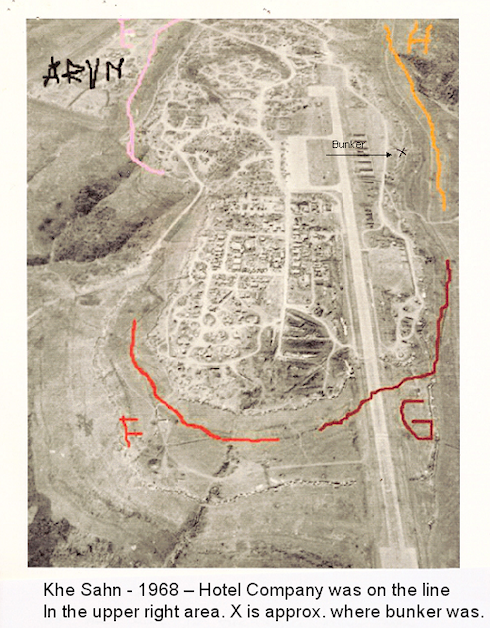

The living conditions were almost as bad as the combat. The second assault was May 8 or May 9 and going in to Hill 881 N. also a hill that had been assaulted before. I had received a diary from home the day or two before this assault. (Copies of my entries are attached). As we were going down in to the LZ I could look out the open portholes of the chopper and I could see what looked like mushrooms appearing below us amidst the choppers and men already on the ground. I realized they were mortar shells hitting the LZ and thought that all those rounds were going right past our choppers on the way down. We neared the ground, stood up and faced the rear, and just jumped out the back about eight feet off the ground. As I was going down a shell landed right below me. It blew me back up a bit, knocked off my helmet, a magazine on my Ammo belt, and my rifle out of my hands. When I regained my senses I recovered my gear and saw about eight or more dead and wounded Marines around me. One radioman was still barely breathing, but had many holes throughout his body. I cut him loose from his radio and tried to stop some of the bleeding, but I heard him gasp and I think he died then. I left him with the others. Meanwhile, there was lead and stuff flying everywhere. You could not hear someone even screaming in your face.
I had lost my unit and made it toward the outer edge of the LZ and was sitting up against a tree with another Marine, we were watching a bunch of Marines across a small valley moving up a hill. Mortars were hitting all around them and us. It was like watching a slow motion movie as the men moved up and shells were exploding all around them. Some men fell, most made it up. I told the marine next to me that we should move. If a shell hit the tree above us we would be sprayed with shrapnel. We had not gone fifty yards when a shell hit that same tree. Just a matter of seconds always made the difference.
I ended up with a group that was trying to get a dead marine back to the LZ to get him med-evaced. He was a really big kid who had raised up to watch the mortar fire when a big piece of shrapnel hit him in the face and killed him instantly. He had only been in country three days and had no experience. It took us forty five minutes to get him up a slippery ravine back to the LZ. I finally reconnected with my company about thirty minutes later. I could not tell how many dead and wounded piled up that day. It was the worst casualties I had seen to date.
We did capture one NVA soldier a day later while moving through a tall grassy area. He was lost and just laying in a shell hole depression when a black Marine to my left came upon him. I was surprised my guy did not shoot him but he did have his boots off and his rifle laying by his side. Only prisoner I ever saw. The infantry on both sides hardly ever took prisoners.


We were back in a couple of days at KHE SANH. On May 17, 1968 two platoons from Hotel Co. and one from Echo were sent out on a combat patrol west of Hill 471. We were the point squad and somewhere around noon I saw men ahead of us and for a moment I thought they were ours then realized no one was in front of us. They ran off and we moved to our right flank while the others came up and fanned out to the left. We had gone approx. one quarter mile when fire started coming in from our left. We had run in to a bunker complex of the NVA. We started closing in to our left and saw a large group of NVA. running up a hill about 500 yards ahead. We started firing and dropped quite a few of them who were probably bearers carrying material.
An automatic weapon started firing from a bunker to our left which made us hit the deck. Allen who was a machine gunner and a buddy I called "Sugarfoot" was just to the front and left of us and hollered he could see the bunker, but we could not. S/Sgt. Carl King radioed back that we were pinned down. He received orders from our Captain to try and knock out the bunker. I was ordered to take four men and make the attempt. I tried to get a couple of new replacements, but they were frozen solid with fear. I picked Bowman, Begley, Allen, and Mc Mullin to go with me. They had been there a few months longer than the new guys. It took time to make yourself go toward fire like that. When I gave the word to go I saw Allen sprint ahead with his machine gun (M~60) and start firing in to the ground about 30 yards ahead. I guess he was right on top of the bunker. I saw him jerk three times as he was shot point blank and killed. We went to ground and as I looked to my left, Charles Mc Mullin was about fifteen feet away and up on one knee. I hollered for him to get down, but he was hit and killed. I saw a bit of blood on his right shoulder, but when he spun down and to the right his face was solid black. I guess the bullet went through his heart and out the shoulder. Our Corpsman, Doc Delvechio, tried to save him but it was no use.
Bowman and I tried to cross a trench ahead of us, but the air was filled with bullets coming from an aperture or bunker at the end of the trench. I fired a couple of magazines in to the doorway and the firing stopped. We pulled back after losing the two men. They told us to pull back while air strikes were called. I was the last man pulling back when the Marine jets came in to drop 500 lb. bombs. I was so close, as I was running, that when I looked over my shoulder I could see the pilots face and watched the bomb being released. I dove toward a large shell crater just as the bomb exploded. It threw me about twenty feet across the crater, but I was only stunned for a while. After that the second platoon went back in and killed about forty-five NVA and recovered our two dead and two others killed on the other side of the bunker complex. We also had five wounded. They could not bring in helicopters because of enemy arty and mortar fire so we carried the Kia's about two miles back to Hill 471.
The gooks had stripped our dead of everything except for their pants. It was so hot their bodies were drying out extremely fast and the skin felt like dryed checker board pieces in your hands as you carried them. I don't even know which man I was carrying and we were so tired we were not very careful dragging and carrying them. I suppose we should have been more careful, but it was getting near dark and we were exhausted and scared. It was the lowest point of my tour to date and I think that at that time I came to the conclusion that I was probably not going to live through my tour. Some combat Marines go through that transition I believe. The first few months you are so scared you are not a good Marine. The next transition you accept death and you do your job even though there are times you are scared to death. Then in the last few weeks you are worthless again because you think you might make it so you are not the bravest thing in the world. Now I don't speak for all Marines, just telling you how war affected me. Although as I will tell you later I volunteered at the end for something that almost got me killed with only a little time left. It was near this time that I got a seven day R & R (rest and recuperation to Australia). It was a great break and I even had an offer to stay on a ranch and not go back. But I knew I could not desert my guys or never go back home so I went back.
Shortly after my return to KHE SANH we were running security for a road sweep one morning with two tanks. The gooks knocked out the tanks with RPG's. We made it to our destination but before turning around and going back I got extremely giddy then ill. I had caught malaria.
These road sweeps were very crazy. On one, two of us were sent out in front of the minesweepers to provide them protection. Now picture this, they are looking for booby traps and mines, but we were fifty yards in front of them keeping them safe. I was so tired and ticked off I walked around a large water puddle in the road. We were always taught to walk through the water because the gooks knew we didn't want to walk through water and would put the mines on the side of the puddles. Well the minesweep guys found a large anti-tank mine in the water with a small anti-personnel mine on top of it. If I had walked through the the water I would still not be back on the ground. Just vaporized. It was all timing and luck of the Irish. That was the saying on my helmet cover .... " God's grace and Irish Luck", I guess it worked.
About this time we pulled another road from KHE SANH to Highway 9. I think it was about a 3 mile, one way trip, and each unit would furnish a platoon as security on alternating days. This is when I started feeling really strange. I would lean against a tree and just fall asleep, on the way back I just stumbled along with my rifle just slung across my shoulders. We got back to the combat base and I would laugh and then throw up. I staggered back to our bunker and just passed out. The next thing I knew our corpsman was telling me to go to battalion aid where they tagged me with a malaria tag. I had to try and run with other sick and wounded men to jump on the back of a moving plane with a tail ramp. The gooks were firing arty but I made it on the plane. I got to Dong Ha ( I think) or maybe Da Nang and was piled in a hut with lots of others. I was barely aware of what was going on, someone came along and gave me a shot of something. All of a sudden I could feel myself dying. I was just shutting down. Someone noticed and they rushed and gave me another shot which brought me back. Either I was allergic to something or the orderly just screwed up. My fever spiked at 106 degrees and I remember two black orderlies who put me on a bed with plastic sheets, they packed me in ice and blew fans on me for a few hours. I remember trying to get out but they held me down, and that saved my life I think.
I was sent to the hospital ship "Repose" for a few days where I saw a few men die from malaria and wounds. Those nurses and doctors had a real handful there. I was then sent to Cam Ranh Bay, a beautiful base along the coast. I was sent back with my unit about two weeks later. I had Falciparum Malaria which is a very dangerous kind, but does not recur. I think it was about the fourth or fifth life I had used up to that time.

About the time I got back we were sent to the Cua Viet area which was closer to the Gulf of Tonkin and was the first time I was exposed to operating around civilians except for the first few weeks at "Quang Tri". In this area we were fighting more Viet Cong "VC" than regular NVA soldiers. We had a tough time of it because we were inexperienced at looking for booby traps and took a lot of casualties for the first few weeks. We ran quite a few night time ambushes. My squad never ran into the VC on these ambushes. (By this time I was a corporal and in charge of three fire teams which is a squad.) Other units did make contact and killed quite a few VC. One night ambush I was moving to set up with a point man in front of me and my radioman "preacher" right behind me. His name was Heinze and was going to a seminary to become a pastor when his brother was killed in Saigon when they bombed a bar there where some navy boys were partying. Anyway that is why we called him preacher and why he was in Nam trying to get even for his brother. This guy was fairly new to the outfit and had stepped on two booby traps previously when he and I were only feet apart neither had gone off. They were small and probably would of taken his foot or leg off, but luckily they were duds. On the night of this patrol he stepped on one right behind me that my point man and I had just paassed over. I heard a grunt and a thump and turned to see preacher up to his crotch with his right leg in a hole. I knew it was a booby trap and spread out my men in a perimeter. I started digging with a spoon and trying to feel what and where the bomb was located. He had sheared off the wires coming out the end of a 155 millimeter shell that was a dud round. His foot had sheared them off right at the tip of the bomb. One-half inch to the right and it would have killed all seven of us. We would have been atomized. It took me two hours to figure all of this out. It was pitch black and I was pouring sweat, and scared to death. We blew the bomb the next day and another squad killed the gooks who had set it a few nights later on an ambush.
Jerry Lilly was the squad leader of that squad and he actually chased the last one down with an AK-47 from another dead gook when he ran out of ammo in his M-16. Old preacher was either the luckiest or unluckiest marine I ever knew. I finally had to send him to the rear because he started walking in his sleep at night. That is not very safe when your set up in an ambush miles from help. He was really mad at me, but I probably saved his life and mine.
One funny (or as funny as combat gets) story was how first platoon and second platoon had a fire-fight. The second platoon had moved out first to set up an ambush across a small bridge, First platoon, us, moved out after dark and somehow we did not get the word second was set up ahead of us. They heard noise and started firing at us. Tracers and rounds were snapping all around us. During the firing one of the guys could hear the others hollering in English, so finally we realized we were shooting at each other. Luckily only (3) guys from second platoon were wounded and none of us were hit. It was always a joke from then on that first platoon could always kick second platoons butt.
Friendly fire was a normal occurrence in Nam and I think every war. We were hit by tank fire, cruiser fire, and chopper fire a few times. None of us was killed luckily, but quite a few wounded. The funniest story was the time we set up in a cemetary that was out in the middle of an open sandy area one night. We established a perimeter and were setting up defensive fire for the night. We called in one mortar round to spot the co-ordinates for the night and the round hit directly on top of the crypt that we were standing next to. It was 400 yards of clear terrain all the way around us and that shell fell right smack in the middle of us. No one was hurt and we had a heck of a laugh afterward. In this same Cua Viet area we had set up one night in an abandoned village named Bo Bang. We took mortar fire and had two guys wounded from booby traps. Fella named Bejarano from California lost a foot, but made it back. After dark we started hearing voices out in front of our perimeter. It was a.bout 10 p.m. and I volunteered to crawl out to check on the voices. I left and took about an hour to crawl out about 100 yards to the edge of a building. I was scared to death as I stuck my head around a corner of a building as the voices got louder. Much to my relief I realized it was a loud speaker many miles away talking propaganda to the gooks. Then I was scared my own men would shoot me as I crawled back to my lines because I had been out almost two hours and thought they might have switched guard. All funny stuff now, but definitely not then. The only other thing that happened in that area was one of our squads ambushed and killed four women in a night ambush who were hauling ammo and weapons for the V.C. It was the only time I ever heard about women or children involved in the combat. You hear alot of stories, but it was really rare.

After Cua Viet we were sent to the south end of the Da Nang area for a while. We were there for about two weeks and were used on work parties. One day we were sent to burn brush on the side of what we called "Marble Mountain". The gooks would try to infiltrate the area through this brush. We were burning it with pear burners. I had one and one of my guys was carrying the tank filled with Kerosene behind me. I was burning one spot when a dud mortar round exploded right in front of me about three feet away. Three people were hit with shrapnel. One guy was hit in the stomach, one had a broken arm, and another was hit in the leg. Luckily, no one was killed. After we got them taken care of one of my guys told me I had some blood on my nose. I reached up and felt it and I pulled a long thin piece of metal out of the end of my nose. But other than that, not a scratch. The old Irish luck was still holding.
At this area we actually ate in a Navy Mess Hall once. It was funny to see all these Navy guys move as far away from us as possible. We were so filthy we stunk I'm sure. But when you get that dirty and you all stink you don't notice. After we ate I noticed a naval dentist building just outside the mess hall. I had been suffering for about three months with an abcessed lower jaw tooth. I had to suck in air over it to stop the pain for a minute of two. I even did it when I was asleep. I finally got to see the doctor and he said that it was very bad and had to be pulled quick. He said he could do it but not without my dental records. I told him I was only going to be in from the bush for a few days, and it was my only chance. He was hesitant because that is how they would identify bodies that were hit by heavy fire and blown apart. I said that if I was dead I really was not too worried if they knew my name or not. Finally, he agreed to pull it as long as I never told anyone. I think I stunk so bad he just wanted me out of his building. Boy what a relief to get that tooth out.
Then we were moved south of Da Nang. At that point I was promoted to right guide which is third in charge of the platoon. I think this was in late August and I got a second R & R at that time. We were short of people and a standby to Okinawa came through for R & R. Okinawa was our staging area and not a good R & R location, but I took it anyway. I had heard that if you had standby, you did not have to go there for sure. So when I got to the rear in Da Nang I asked about that and they said standby can go anywhere they want, but have to wait for an empty seat. I asked if I could go to Australia and they said sure as long as I had not been there before. So naturally I said no and there I was headed back to Australia with just a little white lie. I mean, how were they gonna check?

While I was gone a tragic thing happened to one of our "killer teams", These were teams we had suggested to fight the VC. They were four man teams that would go out at night for a three day set-up to watch enemy movement. One team was out and on the morning of the third day as they prepared to move out just before day light the VC hit them with a machine gun they snuck up during the night. One Marine whose name I can't remember was killed instantly. Dewanye T. Williams was mortally wounded, but managed to roll on a grenade to protect the others and was awarded the Medal Of Honor for that action. If was Sept. 18, 1968 and it was Williams 20th birthday. Seibert was hit in the head and was bouncing on the ground, like a chicken with no head. The surviving Marine Malcolm Creelman was the only one not hurt and was able to hold out till a chopper came in to pick them up. I found out about all this when I got back from R & R. These guys were all in my squad (A picture of the squad is attached).
It was about this time that I volunteered to take out another team. I did not have to since I was right guide, but I was mad about the men getting hit. We left the perimeter about 11 p.m. one night. On the way out we scanned ahead with a star light night scope. I saw a group of men ahead of us and I thought it was another team that had gone out just before us. It turned out they were VC. We approached a ville that was about 200 yards ahead across solid white sand terrain. I had us spread out and started across the area with me second behind the point. We were about half way across when they opened up with an automatic weapon. (M.G.). The gooks used green tracers and they flew all around us and you could feel the heat as it cracked by your head. Every fifth round is a tracer so there was lots of lead going by, we turned and ran like rabbits back to the berm we had just been behind. Amazingly none of us had been hit. I still don't know how we all got back without a scratch. I crawled over to my radioman and with a zippo lighter I tried to guess our co-ordinates to call in mortar fire. I had to guess because it was so dark. I had them fire round of white phosphorous (willy peter) as a spotter round. That dang thing hit 30 ft. to our left and rained that crud all around us. Again, luckily, no one was hit or burnt. It is very pretty though.
I told them to add 200 yards and fire for effect. They plastered that area and a few rounds went into the the ville. I radioed back and they told us to move in to check for damage. It took all our nerve to move back across that sand, but the gooks were gone. The only problem was the villagers were not happy campers. We had killed a couple of pigs and I think some of the blood might have been from the VC. A couple of the civilians had also been hit with shrapnel. But it was not serious. They were screaming and threatening us and I thought I was going to have to shoot a couple but they backed off. We made it through and continued the patrol for the next three days, but made only one more bit of contact. We were moving through an open area and I was tail end Charlie (last man). I heard a "bloop" and recognized the sound of an M-79 round coming out of the barrel. Evidently the gooks had captured one, because that dang thing landed right behind us about 20 ft. One piece of shrapnel hit one of my magazines, but other than scaring the hell out of me I was fine. Never saw anyone, just one round.
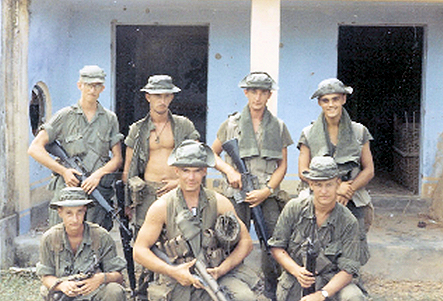

Another one of my men, Arthur Bowman, was killed Sept. 10 while our platoon was on patrol. We were in rolling sandy country and Bowman, who was a moody black kid was out of sorts that day and wandered off to the left of the rest of us. He was on top of a barren sandy knoll when a large booby trap shell went off when he stepped on it. I remember seeing Bowman get thrown almost 20 ft. in the air. A friend of his, Solomon, took off running over to him and while doing that he stepped on another bomb that did not go off. Bowman was still alive when he got to him. All the flesh on the back of his legs and butt were gone. No blood. Just bone and sinew. One foot was gone and he could just barely talk. Solomon said that he just said, he did not want to die. We called in a med-evac, but he died before it got there.
We cleared the area and found a total of eight other booby traps. I put them in a pile and took out a timed fuse which when you pull a lanyard it is supposed to go off in 30 seconds. It did not go off. The fuse burned down but did not set off the blasting cap. I had to go back to it hoping it did not go off late. The next time I decided to lay down a grenade to set off the bombs. The only problem was that I only had 5 seconds to get away. Probably the fastest I ever ran in my life. I made it behind a slight berm before it went off. Luck was still holding.
That same time on another squad patrol we were hit by machine gun fire. Two of us had passed a rise in the ground when they opened up and got our M-60 man, a fellow we called "Huey". He was the one who helped me back in Feb. when I was shot. He was not killed, but took a bullet in the shoulder. It was dark when the chopper came in to medevac him. The gooks opened up again while we were carrying him to the chopper. You could not hear the M.G., but you could see the flashes in the distance and watch tracers and bullets hitting around us and putting holes in the chopper. We got him out OK and no one else was hit by some miracle.

On Oct. 22, 1968 at another base, designated Hill 10 per the map we were using, but eventually called Hand Grenade Hill because of sapper teams that tossed hand grenades. Two perimeter fox holes were the target and they dropped about two grenades each into eache hole. Four men were killed that night. PFC Dennis Cain, PFC Jeffrey Evans, PFC Robert Garrett, and PFC Robert Pahcheka. We returned fire and found blood trails and a couple of damaged weapons the next morning.
The last few weeks of my tour did not involve much contact with the enemy, but almost deadly friendly fire. Once we were hit by racket and MG fire from a chopper. We don't know how they confused us for VC but they did shot for a few minutes. They were bad shots and no one was hurt. Lucky for them we did not fire back. Another incident was when the cruiser "Canberra" in the Gulf of Tonkin or I guess the South China Sea fired an eight inch shell for harassment which landed about 50 yards outside our night time perimeter. Two men were wounded but no one was killed. An eight inch shell is a big boy. Sort of like the 220 mm rockets and heavy arty we were hit with at Con Thien and Khe Sanh. The last incident was tank fire from near Da Nang. These pre planned fires were meant to keep the enemy off balance, but it worked both ways. We were always afraid if we were in the wrong spot we might be history.
It was finally time for me to go home and I had mixed feelings. I was engaged to Linda and ready far the marriage, but I also felt guilty for leaving my men. The bond you form with them is very profound. I always thought we were fighting for a good cause, but the actual reason was for the men next to you. I look back and realize Vietnam could have been avoided. The one thing I learned was never to let the politicians execute a war. Once you start though, you fight to win, right or wrong. We wanted to go straight to Hanoi and end the war once and for all. We just had the wrong folks in charge at the top. I think I did as much as I could to accomplish what I was asked to do. At times I was brave to the point of sacrificing my life. At times I was scared to death and could not move forward. Other combat Marines react differently I'm sure.
The real key to being a good Marine is the fact that they can go back and do the same thing, day after day, that almost got them killed previously. That is the advantage of most modern combat troops. I think they don't get exposed to as many numerous contacts with enemy, like the troops in Nam did.
One last funny story was the day I was separated from my unit about 20 to 30 miles south of Da Nang. We had to turn in all our weapons and then ride on a deuce and-a-half truck to Da Nang. It was the first time in my tour that I was traveling without any weapon to defend myself. That hour journey scared me to death. I just knew we would get ambushed with no way to defend ourselves. I assume my descendants will read this in the future and I hope they get a little insight about me. I was just a plain kid who always knew he would be in combat if the opportunity was there. I don't know why I felt compelled to go, but I volunteered for the Corps and infantry. I chose the Corps because I wanted to serve with volunteers, not draftees. Currently the whole military is voluntary, and it should stay that way. Of course we only made $82.00. per month back then. When they asked if I wanted to re-up (reenlist) they offered me $1000.00 as an E-5 Sergeant, and no promise that I would not go back immediately to Nam. I think I made the best choice by saying thanks Marines, but no thanks.

On Oct. 22, 1968 at another base, designated Hill 10 per the map we were using, but eventually called Hand Grenade Hill because of sapper teams that tossed hand grenades. Two perimeter fox holes were the target and they dropped about two grenades each into eache hole. Four men were killed that night. PFC Dennis Cain, PFC Jeffrey Evans, PFC Robert Garrett, and PFC Robert Pahcheka. We returned fire and found blood trails and a couple of damaged weapons the next morning.
The last few weeks of my tour did not involve much contact with the enemy, but almost deadly friendly fire. Once we were hit by racket and MG fire from a chopper. We don't know how they confused us for VC but they did shot for a few minutes. They were bad shots and no one was hurt. Lucky for them we did not fire back. Another incident was when the cruiser "Canberra" in the Gulf of Tonkin or I guess the South China Sea fired an eight inch shell for harassment which landed about 50 yards outside our night time perimeter. Two men were wounded but no one was killed. An eight inch shell is a big boy. Sort of like the 220 mm rockets and heavy arty we were hit with at Con Thien and Khe Sanh. The last incident was tank fire from near Da Nang. These pre planned fires were meant to keep the enemy off balance, but it worked both ways. We were always afraid if we were in the wrong spot we might be history.
It was finally time for me to go home and I had mixed feelings. I was engaged to Linda and ready far the marriage, but I also felt guilty for leaving my men. The bond you form with them is very profound. I always thought we were fighting for a good cause, but the actual reason was for the men next to you. I look back and realize Vietnam could have been avoided. The one thing I learned was never to let the politicians execute a war. Once you start though, you fight to win, right or wrong. We wanted to go straight to Hanoi and end the war once and for all. We just had the wrong folks in charge at the top. I think I did as much as I could to accomplish what I was asked to do. At times I was brave to the point of sacrificing my life. At times I was scared to death and could not move forward. Other combat Marines react differently I'm sure.
The real key to being a good Marine is the fact that they can go back and do the same thing, day after day, that almost got them killed previously. That is the advantage of most modern combat troops. I think they don't get exposed to as many numerous contacts with enemy, like the troops in Nam did.
One last funny story was the day I was separated from my unit about 20 to 30 miles south of Da Nang. We had to turn in all our weapons and then ride on a deuce and-a-half truck to Da Nang. It was the first time in my tour that I was traveling without any weapon to defend myself. That hour journey scared me to death. I just knew we would get ambushed with no way to defend ourselves. I assume my descendants will read this in the future and I hope they get a little insight about me. I was just a plain kid who always knew he would be in combat if the opportunity was there. I don't know why I felt compelled to go, but I volunteered for the Corps and infantry. I chose the Corps because I wanted to serve with volunteers, not draftees. Currently the whole military is voluntary, and it should stay that way. Of course we only made $82.00. per month back then. When they asked if I wanted to re-up (reenlist) they offered me $1000.00 as an E-5 Sergeant, and no promise that I would not go back immediately to Nam. I think I made the best choice by saying thanks Marines, but no thanks.
Jerry Lilly
Anyone have Jerry's e-mail address or picture? Help me out.

"The Good Lord is watching over us Lilly". I glance at his face and quickly scaned about, but I don't say anything. Instinct, respect for him, and superstition for the deadly forces that surround us keep my mouth shut. Not wanting to put a barrier between us, I look back at him. "I'm telling you Lilly. The Good Lord is watching over us".
I want to say something to Pratt. I want to ask him who ultimately made this war, or any other for that matter. Of the men who've been killed so far, who was watching or not watching over them? Though I'm focused on survival, such questions have been welling inside me lately and threaten to distract. At any moment, desperate action may be all that will keep us alive. Each second passed is irrelevant, because as long as we're here the North Vietnamese Army (NVA) will be wanting to change that. As enemies, we're dedicated to destroying each other. I push down on what's welling so it can't interfere with what I must do, but it seems it's growing.
We've been at Khe Sanh about six weeks. Sandbagged bunkers dot the red dirt everywhere except the airstrip and roads. Trenches line the perimeter of the base and detour into most of the bunkers. It's as if a huge pencil, in playing connect the dots, has gouged the trenches and made an image for someone high above. Maybe the NVA in the surrounding mountains see it that way. If so, you can tell they're not amused by the way they shell us.
Pratt is from Moorefield, West Virginia. The last of twenty children, he is used to being without comforts. His family had the things necessary to survive; they just didn't have much else. Most of the time as a child he went barefoot. He and his brothers often hunted on the surrounding land for the family's meat. Meals were at 6 a.m., 12 noon, and 6 p.m. sharp. Anyone not on time did not eat. Even as a young boy Pratt would wash his clothes in the creek and hang them on the line in summer, or over a dining room chair in winter, to spare his mother some work. His father was 72 when he was born. At 80 he decided he no longer would walk behind a horse and plows and moved his family into town. The Pratts knew and worshiped the Good Lord. They had hard times, but they always looked to the Good Book for their guidance and inspiration. Their lives were anchored by faith. I like and implicitly trust this intelligent man.
Pratt is about fifteen yards from me pouring water into a canteen cup from a two-foot high olive green water can that's shaped like a Zippo lighter. I'm sitting in the shade of a lean-to that's made of three angle irons joined together at right angles with wire. The uprights of the joined irons have been driven straight into the earth to support the crosspiece. It resembles the front of a soccer goal. Tied to the crosspiece is one edge of a poncho. It's stretched on a slant to the ground to make some shade. I'm writing another of those "I can say anything that doesn't say anything that might cause my folks at home to worry” letters.
We are instantaneously rearranged by the impact of a rocket. It outruns its own sound, so there is just an explosion between us. The force throws Pratt onto his back with the ten gallons of water pressing on his chest. I find myself on my shoulder blades looking past my crotch at the sky. If my feet had not hit the cross piece of angle iron, I would have gone around completely. One piece of shrapnel has hit that iron, while two more have gone by me and through the poncho. The bad news is, we didn't hear it coming. The good news is, it hit between us and, as usual, threw most of its shrapnel forward in a cone pattern – missing us.
None of this holds our attention. What's done is done. Our minds and bodies are jelling with the same thought. Whether rocket or artillery, they always shoot at least two. With more on the way we have to get below ground before they hit. Wordless, we race for the trench. It seems that panic explodes like a cannon, branching through my body like lightening when I tune to my rear for an instant. I can't go fast enough. Not getting in that trench with a close one is a death sentence. I know that I've got to dive so I hit just before the forward cut line of the trench to get below ground level fast. Broken bones are acceptable. Being torn apart by the blast and red hot metal from what's coming at us must be avoided. Pratt and I dive simultaneously, bounce over the front edge, and drop hard into the safety of mother earth as a rocket screams overhead and slams into the earth shaking the ground with its deafening blast. Luck is with us! It was a little high.
Pratt crawls quickly up to me. I think he's concerned for my well-being. Both of us are breathing heavy from fear and exertion. Our hearts are racing. He comes close to my face. "You see Lilly. I told you. The Good Lord is watching over us!”
Written by: Jerry Lilly

Looking back to when he was twenty years old, Jerry Lilly tells his readers, “I know that to relax can get me killed. I treat the Vietnamese respectfully.”
Much of what he recalls in his memoir, Eye of a Boot (CreateSpace, 160 pp. $24.95, paper), is told in what Lilly calls “progressive present tense.” In this way, readers can get a better sense, he says, of the “urgency, confusion, and intensity of being there.” In other words, Lilly’s style creates the illusion that his men and he are performing their duties right before the reader’s eyes.
From November 1967 to December 1968, Jerry Lilly served as a Marine infantryman in I Corps, most of the time as a squad leader. At first, he resisted taking the position. Then, he says, “someone of higher rank gave me the responsibility. I had to accept it.”
A deep sense of responsibility for his men’s welfare infused Lilly’s behavior. His worries were purposeful and productive. He tried not to expose his squad to VC or NVA attacks, yet he pressed fights with the enemy. In the field, he constantly believed he was under surveillance from an enemy waiting for the most opportune time to pounce.
His description and analysis of this attitude make the book an outstanding study in leadership. Many chapters provide lessons about the right and wrong ways to work with superiors and subordinates. Lilly describes missions that caused him to question the logic and sanity of his company and platoon commanders, but he nevertheless gave them his utmost support and effort.
The intense manner in which Lilly depicts the flow of combat had me reading well into the night. In particular, Lilly describes a two-day recon mission that ended in daylight when he single-handedly pursued and killed with hate and rage. Compassion emerged at the end, of the fighting, though, when the young Marine realized that he must never forget what happened.
Jay Vincens


Dear Brothers,
I have read in the emails and heard baseless rumors regarding an allegation about my carrying an accurized M14 with scope while Doing The Walk with H1's Killer Team Delta. As long as we are all aiming to clear up the record and contribute to the Skipper and SSgt. King factual information to document our combat history, here are the accurate facts ... all 14 of them.
- ONE. Hotel One's first Squad, let alone Team Delta were emphatically NOT authorized an accurized M14 by Hotel Company or 2nd Battalion 1st Marines' all knowing armorers. However, non-issue cooking implements were not prohibited in the field by anyone. The Skipper and SSgt. King may be called upon to verify this.
- TWO. You all may recall we were the first generation of combat Marines to be issued the new Armalite to replace our beloved M14, soon after followed by the first generation M16. The former had the fork nose and the latter the basket flash suppressor. I vaguely remember being told that the former was originally made by Mattel the latter by Colt and their licensees.
- THREE. In any event, it is well known I carried a blooper starting two days after arriving in-country, along with being the caretaker of a .45 pistol I believe was originally issued to Smedley Butler in Basic School. Meaning, I always felt well armed and happy with the weapons issued.
- FOUR. I always obeyed each and every lawful order in effect at that time.
- FIVE. No doubt, way back then, some of the more ignorant and nit-picky among us mistakenly mused that the first bolt in the Armalite was a low bidder piece of junk and the subsequent M16 had to fix what was originally denied. How absurd!, How blind!, How unperceptive!, especially in view of the documented heartfelt concern our brilliant leaders in Washington felt towards us as reflected in the superb quality of each and every piece of equipment issued combat troops.
- SIX. Meaning, I cannot imagine why back then any self-respecting Marine combat grunt would possibly want to carry something like the obsolete, heavy and politically incorrect M14 instead of the shiny new Bilko tested and approved first generation of M16. Even allowing for the fact we had few problems with the M16 bolt due to the anal compulsive level of maintenance any self-respecting combat grunt gives any weapon, yet Colt's in Hartford admitted later in 1972 this bolt was indeed one of their low points and improved it.
- SEVEN. Never mind the M14 was reliable, easy to maintain, impervious to weather, could knock out anything born of man or beast with one satisfying butt stroke "thunk", or that a combat Marine with a M14 and razor honed bayonet was truly any enemy's worst nightmare. All this resulting in a weapon which even when brought to target by a Marine in the stress of the bush could be counted on to clip a chosen hair off a pimple on a gnat's butt at 800 meters, just below the enhanced utility of the bolt-action Remington 700-40 7.62mm, (at the time called the M40 sniper rifle) in turn below the (then) rare .50 caliber M2 single-shot sniper rifle. Unimaginable.
- EIGHT. Yes, it is true I had a rig on the frame of my ALICE pack which, when covered with a rolled up poncho, may have looked to the hurried, untrained or casual eye somewhat like a poor version of a home-made scabbard for an accurized M14 with scope.
- NINE. My recollection may be soft on this matter, yet I faintly, (very faintly), recall from time-to-time I may have carried non-prohibited cooking implements such as BBQ tongs, sauce basting brush etc. on field patrols and their shape and length obscured within a rolled up poncho may have resembled said M14.
- TEN. I understand there are photographs of me carrying M14 magazine pouches apparently further endorsing this canard, yet anyone should remember these pouches were handy to carry candy, extra socks, and onions, condiments and BBQ sauce. And cocktail napkins, of course.
- ELEVEN. Those still skeptic among you should not feel bad about your aged and misguided recollections, for I can imagine how in very bright sun or fading light of evening, or from a sideways or head on viewpoint, (…and all this by very busy people...), simple barbecue cooking implements may look to the casual or untrained eye to be an accurized M14 with a Redfield Accurange 3x - 9x scope, hand-tuned bolt, floating barrel and silky sear, (all obviously the work of artistes who would have made Rolex proud), housed in a gorgeous cherry wood stock with a rubber butt. Perhaps a piece meant to be issued an officer among our brave allies, as this hypothetical weapon may have also looked as if it had a specially blued bolt and barrel assemblies, leather Bianchi strap and equally blued bipod. Point being that regrettably, Dear Brothers, seeing is at times deceiving, by now memory may be less than 14 karat accurate, and eyeballs play tricks and misguide now and then.
- TWELVE. Further, in the (very) unlikely event such a fine accurized weapon had been misplaced by our brave allies, and in the even more unlikely event it were to somehow wind up in Marine hands, and on top of that within a small squad nobody ever heard of, (as laughable as this premise obviously is even all these years later) all of us should appreciate that such an unlikely series of events would have kept some allied rear echelon pogue from hurting himself had said weapon landed on his pinky toe, or (heaven help us) hurting someone's delicate ears or pigeon shoulders by the eeky-poo noise and recoil issued by such a manly combat weapon.
- THIRTEEN. Lastly, you folks should also find interesting that our Corps of Marines may have thought the M16 could have used some tweaking back then (even perfect as it was shiny new right out of the box), for over the years our Corps took the lead and has expended all sorts of time and effort in finally making it the real combat rifle some of us knew in our heart of hearts the well-meaning folks at Armalite meant it to be (had they known how). The current version with the attached 40mm blooper is what I would have loved to have carried back then in the limited space I had, rather than non-issue cooking implements (I was, alas, a lousy cook yet proud to carry tools for the Artistes De Cuisine we were lucky to have among us).
- FOURTEEN. I trust this report has put a baseless rumor to rest. Should a rumor like this go uncorrected, others will follow. I've even heard outrageous gossip about a few unnamed Lance Corporals driving hither and yon (the English names for various places in and about our TAOR) in their precious few off hours in an allegedly purloined jeep painted with a brush with green paint usually assigned for doors and footlockers, with a sloppy number stencil job and blue still showing on the inside of the hood. Even though everyone knows it took senior rank to rate a jeep and this melange of colors and sloppy paint jobs would never be authorized within our beloved Corps of Marines. When will these canards end?
Respectfully submitted in the venerable tradition of USMC supply entrepreneurship.
Semper Fidelis,
Jay Vincens
Billy Prieto


Bill Evans served in the Air Force in the late 60's.
Now Bill is a patriotic guy who wanted to serve his country - just not in a Marine rifle platoon in Vietnam. Upon returning from my 13 month tour with I/3/27 and H/2/1, I bumped into Bill who was stationed at Offutt Air Force Base in Omaha, NE. Bill was one of the few people who truly thanked me and all Marines for our service in Vietnam, for which I was very touched. Bill was very interested in my experiences in Vietnam, which I was not ready at that time to talk about. To avoid sounding boisterous or flippant, I changed the subject to his experiences in the Air Force and Bill began to tell me about his toughest day in the Air Force. Now let me set the stage for 1967 when Bill enlisted in the Air Force. All the reserve units, the Navy and the Air Force, had waiting lists of up to a year or more so Bill enlisted in the Air Force while in high school, knowing he would not leave for active duty for another year. By the time Bill was in boot camp, the Tet Offensive of 1968 was raging and the Marines were taking some pretty heavy casualties.
As Bill describes this particular day, their training instructors, known as TI's, did something unusual. At 0900, or whenever reveille takes place in Air Force boot camp, the TI split them up into two groups and then said, "I suppose you are wondering why we are doing this. As you know, the Marine Corps took some heavy casualties yesterday. The Defense Department contacted us last night because the Marines need replacements ASAP. They are going to draw replacements from the ranks of Air Force recruits, but there is a problem with how the Marine replacements will be fairly chosen so we are putting you in competition with each other today, the 1's against the 2's and the losers will depart for Marine Corps boot camp tomorrow. Immediately the tears began to flow and that's NO joke! Thus, began Bill's toughest day in the Air Force. This is a true story.
Semper Fi, Billy Prieto


On February 26, 2012 my good friend, Tom Fennell, died and compelled me to tell one of his stories to old and young Marines alike. To the Marines of Hotel 2/1 who were in-country on January 15, 1969, you will remember the Battle of Cam Sa. It was one of the battles where we got a lot of payback and this story kind of proves that what goes around, comes around. In late August or early September of '68, Tom was serving with Lima 3/27 and was on his last patrol with them. 2/1 was already operating in the same AO. His platoon had set up a platoon patrol base near a freshwater pond that was near Cam Sa and a focal point in the '69 battle. Tom's platoon commander organized a water detail, which Tom was in charge of. Tom said there were at least 12 men in the detail. The pond was 400 yards or less from the platoon patrol base. The water detail strung the platoon's canteens from bamboo poles, which showed clear intentions as to what the squad's next move was. Tom proceeded in a direct route toward the water hole. About half way to the water hole, there was some shooting close by and the platoon commander gave orders to Tom to check it out. Of course, nothing could be found and after about an hour, the platoon commander told Tom to finish the water detail. As Tom led the 12 men into the water hole, they were immediately ambushed by a superior force. All the men in the squad were shot. Tom was severely wounded and playing dead. One of the men next to him, also severely wounded, was screaming in pain. Tom begged him to keep quiet because Charlie was now overrunning the position and bayonetting all survivors. Tom's quick thinking ended up saving his life and the life of his fellow Marine. To silence the screams of his buddy, Tom rolled with him into the pond and took both of them under the water, which gave them enough time to live. The Marines from Tom's platoon were on their way and Charlie dee deed.
Cam Sa had been a thorn in the side of the Marines for years. Dwayne Williams earned a Medal of Honor in the vicinity of Cam Sa. Dwayne was an I/3/27 transfer, like myself, to Hotel Company. In 2009, I took another trip to Vietnam to chase ghosts and try to refight some old battles in my mind. I hooked up with two marble saleswomen from Nui Kim Son. They were very likable and their power of persuasion to sell me something was very effective. I had already been out in the countryside on my motorcycle. Of course, I could retrace my old patrols but I couldn't communicate with anyone, which the young women knew and offered to help me in my journeys. Of course, Cam Sa was on the agenda.
I tried to locate the exact spot where I was part of a blocking force in the January Battle of Cam Sa. As I was surveying the area that I thought most closely resembled the battle site, 4 MIG 21's gave me a fly-by and made a turn to their approach at the DaNang Air Base. Now, when the Vietnam War was going on, the DaNang Air Base was the busiest in the world with mostly fighter aircraft flying by us. Today, the DaNang Air Base is basically void of aircraft. I had already been in country for close to a week without seeing one aircraft so it was a very ironic coincidence to have these MIGs fly by me at Cam Sa over forty years later. Could it have been the Gods of War honoring me?…… I don't know.
After my emotional fly by, we went to what would be the remnants of Cam Sa, which is now electrified. The girls and I were very thirsty and I could buy cold drinks for everyone there. Whenever I would stop in an area to talk to the locals, I would attract people like the circus was in town. Usually they were all women and children. On this particular day after sipping on our drinks and relaxing, a man showed up and sat down on the stoop of the store where I was conversing with the locals. He wasn't smiling and I knew from his age he was former Vietcong. I asked the girls to ask him if he was. He responded in the affirmative and said to me, "A lot of Marines died here." I responded to him that I knew that but that I was here to pay honor to one of my former enemies and to be his friend. I asked him his age and when he started fighting the war. He told me he started fighting the war as a 14 year old in July of 1968. I told him I came to this area in August of '68. He told me that as a 14 year old, he had captured a Marine's rifle after killing him. He eventually softened and told me that a lot of Vietcong had died here too, which I said I knew. I asked him if he remembered a battle that had taken place here in January of '69, which he answered in the affirmative. I exclaimed to him that I had been there. With that said, he got up and left. I knew I had touched a nerve.
At the end of my day back at the hotel, I laid in my bed contemplating the Battle of Cam Sa and the day I had just experienced. I remembered killing a young Vietcong that day years ago, who appeared to me to be a teenager himself. I guessed his age to be 17 or 18 and then I wondered if that young Vietcong was the mentor of the man I had just met that day and the rifle that he had captured was one from Tom's ill-fated water detail.
Semper Fidelis
Billy Prieto


Bill Evans who served in the Air Force in the late 60's. Now Bill is a patriotic guy who wanted to serve his country - just not in a Marine rifle platoon in Vietnam. Upon returning from my 13 month tour with I/3/27 and H/2/1, I bumped into Bill who was stationed at Offutt Air Force Base in Omaha, NE. Bill was one of the few people who truly thanked me and all Marines for our service in Vietnam, for which I was very touched. Bill was very interested in my experiences in Vietnam, which I was not ready at that time to talk about. To avoid sounding boisterous or flippant, I changed the subject to his experiences in the Air Force and Bill began to tell me about his toughest day in the Air Force. Now let me set the stage for 1967 when Bill enlisted in the Air Force. All the reserve units, the Navy and the Air Force had waiting lists of up to a year or more so Bill enlisted in the Air Force while in high school, knowing he would not leave for active duty for another year or be drafted. By the time Bill was in boot camp, the Tet Offensive of 1968 was raging and the Marines were taking some pretty heavy casualties. As Bill describes this particular day, their training instructors, known as TI's, did something unusual. At 0900 or whenever reveille take place in Air Force boot camp, the TI split them up into two groups and then said, "I suppose you are wondering why we are doing this. As you know, the Marine Corps took some heavy casualties yesterday. The Defense Department contacted us last night because the Marines need replacements ASAP. They are going to draw replacements from the ranks of Air Force recruits, but there is a problem with how the Marine replacements will be fairly chosen so we are putting you in competition with each other today, the 1's against the 2's and the losers will depart for Marine Corps boot camp tomorrow." Immediately the tears began to flow and that's NO joke! Thus, began Bill Evans' toughest day in the Air Force. This is a true story.
Semper Fidelis,
Billy Prieto


All my life I wanted to be a Marine. I had two older brothers in the Marines, one in the same outfit as me, the `1st Marine Regiment. My brothers were 19 and 12 years older than me. Viewing them from a child’s eyes, they could do no wrong - they were Marines - Superman. I look back at my indoctrination into the Marine Corps which started with the return of my brother from the Korean War. My family was so proud of him and I could clearly see this as a young child. When a war movie came on TV about the Marines, I was rewarded by my mother to stay up past my bedtime to view these Gung Ho movies. In one of these movies, they showed Marines training for battle. In one scene all that showed was a lake or a swamp with no Marines in the picture. After a short time looking at this body of water I thought “Let’s get on with the movie” All of a sudden the reeds began to move and up popped the Marines from underwater. They were using the reeds as breathing devices to conceal their position from the enemy. I never forgot this lesson. After watching this movie, I started to practice holding my breath whenever I would take a bath. When I was about four years old my brother married and he and his wife took me swimming at the local swimming pool where he was the lifeguard. I remember having the best time. I could not yet swim. My sister in law was sunbathing watching me. I would run and jump in the water with a tugboat water toy around my waist. One time when I jumped in and my sister in law wasn’t paying attention, the tugboat slipped off me and I began to drown. I was only in three feet of water but that was still almost a foot over my head. As I tried to reach the surface, the top of my head would show but that’s all. I could get no air. After what seemed like an eternity, my sister in law saw me trying to reach the surface and rescued me. It scared the hell out of her, maybe me too, but after I was done crying I was ready to go back in, but my sister in law was so shaken she took me home. My practice of holding my breath had already paid off. Strength and physical fitness had already been ingrained in me by my father who would tell me stories of how he would go to the gym and rope climb hand over hand with his brother on his back as a young man. As a teenager I became able to climb a rope faster than anybody I knew hand over hand. I didn’t have somebody on my back though, lol. Another lesson I had as a 12 or 13 year old was another near drowning experience. I would swim in the Missouri River, a very powerful and treacherous river. The river was channelized for river barges. They would use wing dams to achieve this. I loved swimming in the river and thought I knew it pretty well. I was a good swimmer by that age. As the water would hit the wing dam, it would increase in velocity. One day I grabbed a long pole and wedged it in the pilings of the rip rap. As I sat on this pole in the very swift current, I had one of my legs pinned behind the knee of my other leg so the current couldn’t wash me off. The pole would go up and down in the current which I thought was fun. One time when the pole went down, it went underwater without coming up. I was stuck underwater with my leg locked around the pole. Of course, I was in big trouble. I did not have the strength to release my legs or sit up through the current. I fought and I fought. It was no use. I was going to die and I knew it. A calm came over me and I waited to die. Maybe God said “Not today.” Anyway, I felt the adrenalin surging into my body and I was able to sit up through the swift current. I was alive and I had learned another lesson about being strong and how it could help you survive. By the way, I still had no fear of water, a greater respect, though. As I look back over my youth, I realize my brothers had been training me to be a Marine. I learned things about survival through their lessons while hunting and fishing with them. I knew how to spring an ambush, I knew how to stalk prey without alerting them. By the time I was in my late teens, I was high school swimming captain and close to my enlistment in the Marines and very strong and physically fit. I’ll fast forward to a day, October 22, 1968, which I had been training for since 1951. On that day I came very close to losing my life. As a rifleman with 3rd Platoon, H/2/1, I was trapped with a handful of Marines against an 8 foot rice paddy dike in about three to four feet of water where the enemy had a clear field of fire and we had no cover or concealment. It was the most intensive, withering fire I had experienced in the Vietnam War. Immediately we began to take casualties. Because I was desperately trying to survive, the only place I could go was underwater. As I would return to the surface for air, I witnessed Corpsman Ruben Garcia exposing himself to this murderous fire and frantically trying to save the lives of our wounded and dying brothers. I knew I had to do something. This was the day I had trained for. Wit is a great part of surviving combat. I instantly knew I could do something but I would have to risk my life to do it. I had been on top of the 8 foot dike behind me that I was trapped against. There was a fighting hole on top of this dike. I knew if I could get back to that hole I would be safe and I could pull this withering fire away from my brothers. To do this I had but one or two seconds to act. I knew the withering fire would follow me. I made my plan underwater. I came out of the water like a missile, grabbed the top of the dike pulling myself up and over into the hole. Of course, the fire followed me. As I lay back in the hole where bullets could not hit me, I relaxed as if I was in a warm hot tub and watched the withering fire chop the vegetation in the jungle surrounding me. It fell like it was coming out of a lawn mower all over me. No one died or was wounded after that. I did it.
William H. Prieto
Charlie Davis

Capt, Sir:
I can tell you the story of an ARVN "drumming out". It happened when my Plt - 2nd Plt, was on the island, with the ARVN Company, south of Da Nang, that flooded during the typhoon. We were at the Dirt Fort.
Lt. Haaland and SSgt Alsop were off on a mission somewhere. I was in charge.
One morning PFC DeLuigi woke up to find his size 13 jungle boots missing. He reported his loss to me. At first we thought it was a joke and let him go bare foot for a while. Then patrolling started and no one had returned his boots. We had a squad leader meeting. No one fessed up.
So I took my case to the ARVN Capt. He called a Company formation. Sure enough in the second rank was an ARVN PFC whose feet extended into the first rank. ARVNs probably wore size 6.
The Capt. had the Company Sgt strip the Arvin to his loin cloth. Then the Capt took a bamboo stick and beat this Arvin unmercifully for about 15 minutes in front of the Co formation and in front of our Plt. After the beating, he told the Arvin to leave, in his loin cloth only, bare footed, no weapon. He sent him off into the wilderness, never to be seen again.
No one in 2nd Plt ever slept with their boots off again.
Semper Fi,
Sgt C Davis
2nd Plt, Hotel 2/1 ' 68
Editor; For more information on USMC Drumming Out,
Google "Drumming Out".
FRENCH FORT AND FLYING ANTS
I don't know if all our Platoons were there, but 2nd Plt was there for one day and night.
We formed a perimeter around it.
If you were there you would remember it from the flying ants. Just at dusk, millions of flying ants started fluttering out of the ground, buzzing around. They would fly around for about an hour and then fall to the ground dead. So many we put our ponchos on. They clogged our rifles and gear. By dark they were dead - millions of them - it was like snow.
The next morning we were heli-lifted out. A CH-46 landed on a slope down hill from us.
We had to slide along the ground to avoid the blades. A Marine got his helmet knocked off by a blade with no damage to his head that we were aware of.
Rosie has sent in his first article about his time in-country. It is good to have fellowship with him again and hopefully he will give us much more insight into his tour.
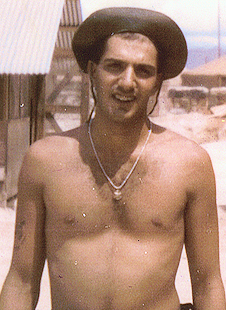

I joined the Marine Corps in September, 1966. After an interesting time in Boot Camp, PI including an extra week in Motivation and an extra week of training because of that I was given an MOS of 0331 Machine Gunner.
After some time in Camp Pendleton with Lima 3/28 I was sent to Vietnam in early November, 1967. Eventually I was assigned to Weapons Platoon, Hotel 2/1.
My first firefight was December 7, 1967. I believe we were operating around Quang Tri. I had been assigned to a squad under Lcpl David Zywicke. A couple of days before, I had gotten into a fist fight with another gunner named James Burns. After the fight Zywicke switched me to the other fire team under Ron Zito.
On the night of the fight we were settled in for the night on a small hill when we were attacked by VC mainly with grenades and satchel charges. Both Zywicke and Burns were killed that night and Paul Allison was injured in the shoulder. Burns died particularly hard with a sunken chest wound. I was told Zywicke had his leg blown off and bled to death. One of them was screaming for his mother for what seemed like hours before being medevaced out. The gunner I was with was James Feliciano (I think that was the spelling). He was a survivor of Operation Medina and was really jumpy. When we one off, one on and I went to sleep he couldn't believe I was able to sleep
I have felt both blessed and guilty since that night. It would have been me if Burns and I hadn't had that fight. It hit me really hard a few nights later on a different patrol when I was just lying in the grass trying to sleep in the pouring rain and freezing my butt when I realized I had a full year of this shit in front of me. I cried for a while that night, the only time I have ever cried as a man until my father died decades later. After that I shoved my feelings down for the duration of my tour. I was never afraid again till the last weeks of my tour. I don't know whether I accepted that I would die during my tour or thought I was charmed but that didn't stop the memories, fear and anger from piling up through the year.
That was my first action.


My memory of many of the following actions are vague and many of the details in this story I've gotten from squad leaders Charlie Davis (2nd Squad) and Jerry Lilly (3rd Squad?) as well as my own memories.
On 17 May 1968 we were on a company size patrol, My machine gun squad was attached to 2nd Plt as usual, the first patrol back into enemy territory west of Khe Sanh, after the siege. We were west of Khe Sanh Ville and Hill 471 headed to Lang Vei. According to Charlie we ran into some NVA and 2nd Plt took off after them as they ran from us. 1st Plt took over Co. point and the company continues sweeping westward where we were to rendezvous with Echo Co. It wasn't long before we heard heavy firing and grenade explosions coming from the direction of where 3rd Plt was. The Co had stumbled into a NVA bunker complex. My gun team was ordered up and placed between 1st and 2nd squads.
(The next paragraph is edited parts of an e-mail I received from Charlie)
"Bullets flew everywhere. I (Charlie) heard one rocket by about an inch from my ear. Grenades exploded all around as we assaulted. We were firing into bunkers filled with NVA and dropping grenades in on them. NVA bunkers were concealed everywhere. Grenades flew over our heads back into 3rd squad behind us. We had to stretch our line to the right as we continued our assault forward. We started spreading apart with Rosey's team in the middle. I was trying to maintain contact with the LT. and tell him we had found the missing marines we had been looking for. On my run in his direction I saw a grenade fly into a bomb crater in front of me and Rosey's machine gun crew flew out. The grenade went off and the machine gun was destroyed"
I'll pick up my part of the story here.
I was in the crater with my gunner Cornelius 'Jake" Jacobs firing our M60 when the gun jammed. Lt Haaland yelled at us why we weren't firing. I happened to glance up and saw a Chi-Com grenade arching toward us. It seemed to me like it was floating in slow motion and it reminded me of the grenades the Germans used in WW II movies I watched as a kid. I yelled and the two of us rushed out. I waited for shrapnel to hit me but none did. I had dodged a hit again. I became separated from Jake and realized that I was unarmed except, I think, for a .45 pistol. I realized that NVA was everywhere. I found a M-16 that was abandoned (maybe mine if it had been blown out undamaged). In the chaos I teamed up with Paul Allison, another gunner from my squad who had become separated. NVA was popping up from the ground and taking shots and throwing grenades. One popped up behind us and let off a burst that went between us. We rolled and both of us shot him. We could see we hit him but the body wasn't there. We found a hole and dropped two grenades in. We worked our way back to 2nd Plt. The fight lasted a couple of hours longer but I don't remember much else about it. Charlie says I helped to carry out one of our guys from Weapons Plt and that we eventually rendezvoused with the other Hotel Plts and Echo Co. and got back to Hill 471.
That night we were could hear the NVA at the bottom of the hill. We threw grenades down the hill all night. My gun fired burst periodically down the slope.

While this site is billed as a website to honor the men who fought with Hotel Company, 2nd Battalion, 1st Marine Regiment, 1st Marine Division, we have also had the good luck and fortune to have shared some experiences with people like Mike Pipkin, a Corpsman for Fox Company, 2/1. He was asked for and supplied some information in his 4 stories that are of immense value in helping clear up questions and filling in blanks.
Thank you brother, May other "Friends of Hotel" follow your lead.
Semper Fidelis, Hotel, 1968

While this site is billed as a website to honor the men who fought with Hotel Company, 2nd Battalion, 1st Marine Regiment, 1st Marine Division, we have also had the good luck and fortune to have shared some experiences with people like Mike Pipkin, a Corpsman for Fox Company, 2/1. He was asked for and supplied some information in his 4 stories that are of immense value in helping clear up questions and filling in blanks.
Thank you brother, May other "Friends of Hotel" follow your lead.
Semper Fidelis, Hotel, 1968


These stories are dedicated to Corpsman Chester Fontenot. Kia on May 17, 1968 crawling to a wounded Marine.
Going to Vietnam in 1968 was a time of mixed emotions. I had not been following the war on television, I didn't watch the 6 O'clock news showing combat every night or the student protests, so I landed with great expectations of the right and might of America. It must be right if America is helping. Growing up on World War II movies and relative's war stories, being a member of a military career family living in the 50's and 60's had shaped my young mind into the fact that we were helping a backward nation, and it was good like World War II. When I received my orders for Vietnam, I was ordered to take a 30 day leave, it was a fun time for me being home after a years absences. Dated my girlfriend at night and worked with my father during the day, just like old times. Fifteen days into my leave I received a telegram from the Government stating "You Have emergency orders to report to duty as soon as possible", if nothing else it made me feel important, the Vietnam war couldn't wait for me to arrive any longer. Dad didn't say a thing when we parted, he just shook my hand, with W.W.II, Korea and two tours off Vietnam on the Aircraft Carrier Oriskany under his belt, he knew words could not change the out come of my destiny, to live or die in a combat zone.
Thirty, twenty and even ten years, I could not have written about Vietnam, I didn't know anything about it as a whole, I only knew what I had seen and felt, Vietnam was a war of many small stories, some not pieced together until thirty years later and others never to be told. We were small units, mostly platoons, of 30 or so men, under strength by half as there was a shortage of Marines. The platoons were usually out in the bush by themselves, yet in contact as to aid each other in times of trouble, which seemed to take days, if it was by foot. We usually did not know what was happening to other units, except by scuttlebutt (rumor), which could get pretty wild and distorted by the time we would hear it. Even today I learn more about the war, from Secret documents being declassified and other military information being released. It was a person-to-person war, with few large unit maneuvering, just you and me and some NVA playing cat and mouse, us with supersonic techniques and them with a bicycle and a bowl of rice. I learned to respect them, they were tough and determined to win at any price, and their ancestors had fought a 1000-year war with China. French and Americans were new bullies on the block who needed to be kicked out. In retrospect, I do believe the South Vietnamese people knew what would happen to them, so they didn't try as hard as they could have. The Press had a negative force on the American public support of the war; this war was taking to long for America. The North Vietnamese people were very motivated people. 30 odd years later I heard a high ranking NVA Officer state "That the North Vietnamese people were fighting for NATIONALISM and the American people were fighting AGAINST COMMUNISM". The South Vietnamese were not motivated enough to keep South Vietnam a Democracy.
April 1968, springtime for the Western Hemisphere, Tet of 68 was over, Khe Sanh had been relieved from the Siege, and Alex, Joe, and I, Hospital Corpsman, were flying into Da Nang after processing in Okinawa, we traveled East from the states with larger group of fellow corpsmen. From Travis Air Force Base, Calif., the civilian aircraft was full of military people young and old, one group of sergeants headed for the rear of the plane breaking out bottles of booze to soften the time in the air. When I heard that they would be refueling in Alaska, I started worrying about the plane sliding off the airstrip on ice when we landed, I could worry about anything! Japan was another refueling point and then on to Okinawa. The Marines we saw rotating back from Nam in Okinawa were different from stateside Marines more intense a different side showing. Their faces were hard and lean compared to our stateside boyish looks. I didn't know the horrors in our future that they had found for themselves. I had faith in war movies, didn't the good guys always win and everyone went home after the movie was over? And any way, not only were we going to war, it was with the United States Marines to boot. The things that worried me was, would I be accepted by combat Marines, could I keep up with them, would I be brave (I knew inside I really wasn't all that brave) would I go home too?
The Da Nang Airport from the air had all these craters around it, it was strange looking out the little window, man this was the war zone. I was not scared stepping off the plane, things seemed to be in control, we lined up and boarded buses with heavy duty screens on the windows (the screens were to stop grenades and rockets from entering the bus) to III MAC to be checked in and routed to different divisions and regiments. Our group of Corpsman was bused to 1st. Medical Battalion, 1st Marine Division, in the rear near "Freedom Hill". We had come over as a group from San Diego Naval Hospital Balboa, when you are trained for war and have orders for war and are ready for war and we were in that frame of mind, lets get it done, we were young and had not seen the evil face of pain and death and yes, fear. Fear has many faces from a little "boo" to a mind boggling terror-fear when exposed to constant and close death. Pain was there from humping so much gear, from heat, sharp elephant grass cutting like a razor, steep mountain jungle trails with mud and hellish hot humid days and freezing cold rain at night. Pain was humping the bush all day and having a 2 men hole which meant having 4 hour sleep and 4 hours of peering into the darkness trying to keep your eyes focused and alert when every bush or high spot appears to be a moving enemy soldier coming to kill you, while your eyes fight you to shut and you fight back to keep them open so you'll be alive. The pain of wounds and the pain of your buddy's death, wondering why he died and you lived. Death's face would be well known too, stripped away, everyday items were gone, ammo, sleep, food, shelter were the focal points along with praying silently to your God to live for another day. We would learn death, pain and fear well.
Joe from Louisiana, was quiet like me, Alex loved to talk about his M-16 and helicopters, how he was going to build a one man helicopter for himself when he returned stateside and he was always field stripping his M-16 while we were waiting transit to our front line units. I didn't like the M-16, growing up with .30 cal. hunting rifles, these were .22 cal. rifles, squirrel guns and plastic too... I was trained with my M-14's and liked them, though they were heavy as hell. In the field I was issued a .45 cal. Pistol, knowing that I could not hit a barn door with it from past experience. I often just carried hand grenades for myself protection, figuring I could use wounded Marines M-16 if my "first aid station" was over run, my job was to stay down, not be shooting or fighting, except prevent bodily damage to others or myself. When I joined the Navy, I never expected to be in a war zone with a bunch of Marines, the Navy was ships, not mud and pain, I was a bookworm, a warm room person. I didn't belong outside, I had to sleep in a bed. I would change, as all of us would, to an animal-like state, eat, sleep, fight, and try to stay alive.
We would work our way from Division, to Battalion, to Company, and then to Platoon. The group left Da Nang for Phu Bai, a forward operating base, by a C-130, a workhorse airplane of the larger airstrips. It groaned and moaned, with scary sounds as hydraulic motors moved the flaps and landing gear, it was a short flight. We landed at this civilian/military airport, actually it was just a big red dirt airfield to me, very third world, very poor. From the forward area, we would be transported by helicopter to a base camp closer to our new Company. Picking up information and gear along the way, there was no logic to anything we saw, all our gear was used and dirty, my flak jacket had bullet holes and was torn, you just got your gear from these piles of gear. Packs, helmets, cartridge belts, canteens, and gas mask, entrenching tool the uniform of the day was flak jackets and helmets and anything else you could find or carry. The heat and the humidity was unbelievable. Every thing was new and strange, everyone carried a weapons, it was not your usual spit and polish USMC. The further North we worked, the more primitive bases became. New names were heard, Dong Ha, Quang Tri, Cua Viet, Cal Lu, Rockpile, Con Thien and Khe Sanh. Everyone stateside knew of Khe Sanh, it was the big ticket siege by the NVA and was in the press daily.
I-Corps was the Northern fighting zone, "the Marine zone" as the Army "doggies" called it. Due to buildup of Northern zone prior to "Tet 68" in Operation Checkers, with individual Infantry Battalions, as"Checkers", Gen. Westmoreland had 73 Maneuver Battalions (Marine and Army) in that zone. It was crowed around the bigger cities/viles, trucks, tanks, jeeps, and mules (a primitive 4` wheeler) choked the dirt roads, dust, diesel fumes and odd smells assaulted your nasal cavity and nose, the airstrips busy with C-130's, Huey's slicks, Cobra gun ships, and attack aircraft. Hugh fuel dumps with rubber bladder storage systems; pallets of supplies, beer and soda lined the roads behind woven wire fences. Vietnamese women and children trotting up the roadside going to or from market, slowed traffic, few young men were ever seen in these groups, 16 year old men were needed for the military, fighting for the North, or fighting for the South. Even though there were close to 250,000 military men in I-Corps, it was very easy to get into trouble with the NVA. Their style of fighting was either human wave attacks, or well planned and executed ambushes and both were usually hit and run unless the fog kept the air power back. Air power, that was the winning force, if you could get the bombs, rockets, napalm, mini-guns, on target your chances of survival increased greatly. The NVA could and would surround a base or group and put the squeeze on them; usually only air power could prevent them for over running it. The cities were filled with refuges, many had been moved by Allied forces to form "Free Fire Zones" in the contested mountains/jungles/farm areas, meaning if it moved, you could open up and fire at it.
From Dong Ha staging area I flew to Khe Sanh by CH-47's, a two-rotor helicopter with large loading ramp /door on the back. It was noisy and windy as all the windows were gone. I just tried not to show fear as we flew over dense jungle, it was cold as we climbed higher into the jungle mountains, fog was in some of the valleys. Every once in awhile you would see large scars on the hillsides from bombs. Nearing the base the jungle was showing sign of heavy damage. Craters, large, small, multiple craters, and the acres of land that was just churned red dirt. I could see patches of elephant grass burning where the triple jungle canopy didn't grow, it was a scene from hell, and Khe Sanh was the center of it. A trip to Hell. Combat, I had seen pictures of Gettysburg, films of W.W.II, they were horrible and exciting, and I was in the middle of that horror and excitement.
Khe Sanh, a mountain village area that had become a USMC legend, I had no idea what was in store for me. 2/1 had been around Da Nang in the past and had moved to the I Corps in Operation Checkers in September 67. 2/1 spent many weeks at Con Thien during Tet 68 and were on Route 9 opening the road to the mountain crossroad combat base on Operation Pegasus in mid-April. The base was for one purpose, to stop the flow of NVA men and supplies from North Vietnam and Laos's natural road and trail system, funneling into the large population areas on the coast. Vietnam is only 20 miles wide in this area but the topography changed rapidly in that short distance. From flat sand dunes at the oceans edge, which were bad to patrol, to rice patties full of water or dry, which are also bad to patrol, then the land starts to roll and then build to steep sided mountains of triple canopy jungle, with rushing stream, high cliffs and open rolling areas of elephant grass like golf greens on the surrounding mountain sides, the gash of bomb craters it's hazards. It's the kind of grass you see hunters in India, riding on elephants hunting Tigers. An elephant can move through it with grace, man just get cut up, overheated and dehydrated. It is the most horrible stuff to walk through, it holds the heat and dust. Tigers love the stuff, they can sneak around, never to be seen till too late. An old French coffee plantation widow in the 50's and 60's is reported to have shot 20+ tigers around the coffee trees over the years protecting the villagers at Khe Sanh. One fellow from 3rd Force Recon was drug away from his sleeping position by a Tiger before a team member shot and killed it one night. Speaking of coffee trees, the weather is perfect for coffee tree growing there, the temperatures, rainfall and the fogs that come in. I have always fantasized of retiring there and growing coffee. The reality of unexploded ordinance, the question of Agent Orange poisoning the soil and fear of bandits swooping from from Laos tame that itch.
Going into a forward combat base from a stateside Naval Hospital has a steep and sometimes deadly learning curve. I had been at a Naval Hospital the past year, about as civilized as you can get. The victimize cities and larger bases on the coast were somewhat safe, you could hear rockets and mortars come in but not close. It was cool. We flew into the combat base, stepping out on the airstrip from the chopper with dust and grit, paper and junk flying all around, people yelling to move it, seeing everyone run for a bunker and following. Shells screaming down and landing at the spot you and the helicopter had just vacated. It was scary, being new and no where to go, we began learning to hear artillery shoot at us so we could take evasive action like jumping into the bunker on time. The NVA had drug 130 mm cannons into the cliff and hillsides of Laos 6 miles away, and had complete control of movement outside the bunkers and we had to learn the sounds of death. It started as a faint pop, you had time to dive into a bunker, trench or just eat dirt in the open, about 2 seconds, then the shells would start screaming as they arched down to earth. Fear, fear runs through your body, it's such a helpless feeling to lie there waiting to die. Marines say you won't hear the one that gets you; just the sound of them was enough to die from. Hey guys, I'm a non-combatant I have a Geneva Convention card here.

Khe Sanh was located on the Laotian border, just a notch South of the DMZ, it was a high mountain area, hard to supply. The one road, running east west into Laos from the Vietnamese coast was mostly dirt and narrow, jungle growing up to and over the road, were it was ground back by truck traffic. Route 9 followed the river valleys into the black depths of the mountains, climbing and clinging to the mountainsides, switchbacks and river crossings slowed the convoys down. Steep cliffs offered protection on the down side and delivered NVA satchel charges and hand grenades from above. It was a dangerous road; the roughrider supply convoys only friend was speed to blast through any trouble spots. I remember well the convoy run where I almost got left behind. It was our turn to be security for the supply convoy’s called roughriders. Al and Tim were next to me on the last truck in line, we were seated by the tailgate. The convoy was going like a bat out of hell, we were bouncing and swaying, and the dust was painting us red. B-52 bombers had bombed and re-bombed the area, our roadside cratered with bomb craters, one of which the back of the 6x happened to be sliding into. All I could think of was jumping clear of the truck and stood up to jump, Al grabbed my flack jacket and pulled me back in as the driver spun tires and clawed out of the crumbling crater rim. Al was yelling at me never to do that again because the drivers have orders not to stop for anything. I shook at the thought of being stranded alone on that jungle road, a road easily cut by the enemy. Khe Sanh was at the end of the line of combat bases strung from the coast to the Laos border, the end of civilization.
Alex, Joe (Chester) and I spent the day gathering medical gear, listening to the Chief Hanes give us last minute instructions about staying alive, the weekly Malaria pills we passed out, it was a court marshal offense if you got Malaria and had no preventive malaria medication in your system, and just before we broke up for our units we were given some tooth pumice to clean our teeth. Strange yes, years later I read that was standard Navy procedure. Earlier, while eating a lunch of c-rations, watching Joe heat up a can of Spaghetti and meatballs, he had just punctured alternating holes in the can’s lid, not cutting the lid and folding it back for a handle, watching his can heat up with the red tomato sauce oozing out of the holes like blood, I was hit with a intuitive insight that Joe was going to die. That had never happened to me before, I shook off the thought and did not say a thing, and I was not going to say, “Joe, you’re going to die.”
We said our goodbyes and split up, following short timer corpsmen to our companies. Being led to my new outfit a NVA sniper fired a shot at us, I heard for the first time a bullet flying by my head, dropping to the ground, the Corpsmen I’m to replace, called 7-up, anxiously asks if I’m okay. 7-up introduced me to all the Marines in the Platoon, showing where I would bunk, what squad I would stick with. The base was mostly underground, dug down deep when the NVA hauled cannon by hand over the mountains. The line Company’s were living on the perimeter’s edge, looking out into the killing fields. A no-mans land, tangle foot barbed wire crisscrossed the ground, with tripwire flares to warn of enemy movement at night. Buried in the ground was 55 gallon barrels full of c-4 plastic explosives, diesel fuel and old dirty ammo, connected to detonating devices in our fighting positions. Mines were buried and claymores were in position in front of us. The bunkers were stockpiled with ammo and hand grenades, the bunkers were both home and fighting areas. The trench had emplacements built with sandbags and timber; you could almost walk around the whole base in that trench unexposed and was it muddy when it rained. The base was heavily damaged, blown up bunkers left gaping holes, both ammo dumps had blown in the past, casting explosive rounds about. Most of the sandbags around the bunkers were torn and tattered fluttering in the breeze, making it look shabby. The Marines were pretty rough looking with ripped, dirty clothes, unshaven, smelly, but friendly.
Bonding with the Marines was easy I found, you’re there to keep them alive and the grunts want to keep you alive so you can keep them alive. That’s one thing I do miss, we had nothing but ourselves, and so we took care of each other. The Marines were very helpful telling me what gear I would need and asking if I wanted a rubber lady, with me replying “ thanks but no, I’m engaged back home”. They laughingly replied it was an “air mattress”, not a girl.
The days there started melting in a blur, killer teams, Platoon and Company size patrols and one Battalion size sweep of the area North of Hill 881N. The word was spread to load up with three days worth of c-rations and all the ammo you could carry; we were going to Hill 881north. Early the next morning we were lined up in squads along the airstrip of metal. The sun was just coming up; helicopters in the distance could be heard. Next, the sand blasting us as the rotors picked up dust and grit and hammered it into our skin. Settling into the web seats, we flew to our LZ. The ride took minutes and flared into a hot landing, running off into a firestorm of NVA artillery and mortar fire, we waved good-bye to the chopper pilot. We ran for our lives, I just picked out a familiar face and keep one step behind Chip, running and running, out of breath and finally diving for cover. I was so scared, I only wanted to pee, kneeling in this crater and peeing and peeing. Collecting the wounded and dead the platoon moved to a safer area. A chopper was called back to pick them up, another barrage of mortars, all the good landing zones were zeroed in by the NVA.
The companies were spread out by now, with their platoons in traveling formation, point, command, rear and flanks. The Battalion started their sweep to the south, to search and destroy enemy bunker complexes and supply dumps. It was just jungle and steep mountain trails, walking was hard with roots and vines tangling my boots at every step. The triple canopy vegetation made for gloomy vision at noon. The bunker complex was well hidden, we stumbled on to it as we swept over the mountainside, we were lucky, the NVA had run. They only liked to fight on their terms, not the marine’s terms. The Marines had their bases in the open for all to see, the NVA bases were unseen. Set up 122mm rockets, ammo and rice was found, blowing up the rockets and ammo, then pissing on the slashed sacks of rice was little payback to us.
These were steep mountain jungles and our walk back to base was against the grain of the jungle, the Battalion didn’t follow the natural valleys and trails, we hacked our own trail, this lasted 3 days and nights. It was a hard hump, a forced march, no sleep, just walk and walk, day and night, 5 minutes catnap on the trail every hour, lean back on the ground, use your helmet as a pillow and hope you don’t get left behind. As we neared the base, a narrow canyon peppered with dry tear gas had us scrambling for our gas masks. The men were beat and I was fading fast, the base was in sight and little did I know it would be a dash for life. Between the toe of the hill and base was a long flat open area and the enemy gunners were waiting for us to cross. Run, run for your life, a bunker, a trench, and any thing out of sight. Later at our lines, Chip and I cooked some c-rations and lay there for two days recovering. The men were not soft; lack of good food was partly to blame. Some had been eating C-rations for months and as I would find out, you don’t gain weight on them. A glass of milk was a thought beyond reality; a hamburger, get out of here, you want to get punched? Ham and eggs, canned; pork slices, beef and potatoes, ham and lima beans, chicken and noodle, spaghetti and meatballs and other meals for a choice of 12.
The act of taking a shower was a life or death event there. First it was 100 feet from the trench in a small depression, out of line of fire from snipers, yet open to motors, rockets and artillery fire. The water point was another 100 feet away. To carry the water and take a shower was next to impossible, why die to be clean. Spit baths out of the helmet, was about the only daily hygiene. The out house was there too, rumors of Marines being killed using it floated about. Just think, to die using a toilet or shower. Civilization had taken a hard right turn the minute we left Dong Ha. We were alone, in the middle of nowhere.
May 17, 1968, I had no time to mourn my friend’s death, when word was passed down to me that Joe (Chester) was dead, machine gunned while going to the aid of a wounded marine. We had only been there 20 days. I had been 99% scared to death more times then I would ever imagine in the past 20 days and now Joe was dead. I was sorry. The pain would have to wait, you can’t dwell on death at times like these, it would draw you down. Be scared, but don’t think about death. Never.
May 1968, a month of dying, it has been called “Bloody May” for good reason. More Marines were killed during that month then during the February TET offense. 723 Marines, 330 Army men and 37 sailors were killed in III MAF that month. The time is now called the ”May Mini Tet”. The NVA 304th Division was operating in our area, testing us for weak points in the lines, ambushing Platoon and Company sized patrols, ambushing the supply convoys on Rt. 9. One 2/1 platoon, hit while on convoy security, had NVA throwing explosive charges off the sheer rock cliffs that lined the road onto the truck beds, the Marines were hit hard. Another platoon on road sweep security prematurely set off a NVA ambush that turned into a battle.
The Battalion S-3 combat records (declassified) state:
“Mine sweep team accompanied by reinforced platoon “F” and two tanks triggered enemy ambush at initial range of approximately 25 meters. Contact subsequently revealed reinforced NVA Company and prepared bunkers. Road sweep element immediately reinforced by remainder of company, Company assaulted enemy position and later repulsed counter attack. Company “G” was dispatched to reinforce Company “F” and killed 3 NVA at rear of Company “F” while linking up. Company “E” 2/3 with two tanks dispatched from bridge 3 to reinforce “G” and “F”. “E” 2/3 swept through enemy position killing 16 NVA, for a total of 65 NVA killed.”. 2/1 lost 18 KIA, 44 WIA, and two tanks destroyed.
My friend, Corpsmen Jon Peters was creased on the forehead running through a blast of automatic fire, during that action his medical bag took the brunt of it, I was amazed counting the bullet holes in it the next day. Just another day in Hell and no way to escape back to civilization, except in a body bag.
Next: June and July 1968

We were the USMC cutting edge, in reality we were tired, scared, hungry, our clothes were torn, dirty and rotting off our backs. The edge was dull, but full of spirit. June of ’68 was here; I had been in the bush for 30 days and still alive, two of my corpsmen friends were dead, two others were wounded. Fox Company was called “ bad luck Fox” or “jinxed Fox”, they had lost 29 men, killed and a uncounted wounded, since 1May 68. Since we were undermanned by 50% in the first place and our losses of over 1/2 of that 50% put us about 75 % under strength for a Company. Such is war. We took it with a stiff upper lip; there was nothing else for us to do. We would get new men in a while to fill our ranks, so life went on. When we got hit or ambushed the men died in large numbers, the NVA would wait and wait, watching for a weak link in our armor, then strike, hard and fast. When the shooting would start I hit the ground, not having to fire back I could keep down. An ambush is a god awful scary, scary time. The confusion, the bullets and B-40 rockets shot at us, the yelling, the cries of the wounded, and the NVA artillery zeroed in on your position. Then the quiet, with snipers shooting to keep us down as they retreated back into the dark jungle to lick their wounds, we worried about ammo resupply, and getting the wounded to surgical units, how many NVA were still out there was a unknown, a time to move cautiously about, to probe the area in front of you. My curiosity about war was over, I wanted to go home.
One day I looked up and saw a pilot eject from his burning fighter plane that was returning from a N. Viet Nam bombing run, I think he was over Ca Lu when he bailed, and I’m thinking I’m glad it’s not me gliding in to that jungle. Another time a fighter landed on the airstrip, needing repairs to get home. When he finally took off he buzzed the base on a low level, high-speed pass as a thank you to us. It was great. I love those pilots, when they are dropping bombs or napalm right in your lap to keep the enemy at bay, you can only have praise for them.
The base took over 438 heavy artillery and rocket rounds in the month of June and 600 rounds in the last month. Mostly harassment, Khe Sanh was in a stalemate with the NVA, we could not move freely around with the guns blasting us from Laos and the NVA couldn’t overrun us. The Marines would have to pull back and try different tactics. So we removed anything of value to the enemy and destroying what couldn’t be moved. Convoys going east carried it all, a lot of convoy screening for possible ambushes and small operations, routine day patrols and night killer teams was the rule. The trenches the NVA dug during the siege were in front of our lines, were half filled in by bombing and every once in a while ammo bunkers were found. I can’t imagine the pounding the enemy took out there. We learned the smell of death well, following our noses to check out who was rotting in the sun. There was small hills over looking the base, which Marine units manned, the enemy wanted these positions for direct shooting into the base and tried many times to over run them. One position was on Hill 471 over looking Route 9 headed into Laos, the 9th Marines had a royal battle there in the past. I liked patrolling around the Ville in that area; there was pineapple plants with small fruit to eat and coffee trees for shade. Pigs the villagers left behind were see running around, climbing to our positions on the hill at the end of a patrol was hard on the legs. Another position was bridge security on Rt.9, three or four clicks from the base. The steep cliffs made the road bend into a hairpin turn at the stream. I thought it was a bad place to be. It rained and rained and we were freezing, one Marine found a wool long sleeved shirt in one of the bunkers and we all envied him. I’m glad we didn’t get hit there.
Time was running out for the base, bunkers were tore apart; the old French command bunker was blown up in a huge explosion with a small mushroom cloud rising above it. We had work parties and patrols day and night. Toward July, I’m not sure of the date, maybe 4th of July, when it was dark the whole base opened up with everything they had. Tanks, 105’s, quad 50’s, dusters, machine guns, m-16 firing all at once. It was quite the sight, red tracers flying everywhere. We had a hell of a lot of firepower there. The word was passed that we would walk out, abandoning the base at night. That was scary, walking down Rt. 9 in the dark with “Puff the magic dragon”, a AC-47 equipped with mini-guns and flares, circled us lighting the way, ready to unleash a storm of 30 caliber bullets at about 6000 rounds per minute, they could plow the ground in front of you with great accuracy, a flying meat grinder. When they worked out it was a steady steam of red tracers coming out of the dark sky, 450 red tracer rounds per second. I don’t know where we stopped to be picked up by 6x’s, maybe by Ca Lu, to transport us to a Quang Tri ammo dump under construction. Patrols in the county side were nice, it was flat land and out of artillery reach. We got some beer, first one in almost 2 1/2 months and cases of Pepsi. We dug holes in the sun baked dirt to bury the pop to cool it, which didn’t work very well, then someone came up with the idea to get a 6x for a ice run in to Quang Tri. The idea was that we needed ice for a medical emergency, which worked great at the ice plant. I don’t know how long we were there, 2 or 3 weeks, I’m guessing. There was no rats, there like up around Khe Sanh, where I slept with a K-Bar knife in my hands to stop “ incoming rats”. They owned the night, like the NVA, running over you looking for soft lips and ears of sleeping Marines to chew on. They were huge and hungry.
Moving out in a convoy of 6x’s the company headed towards Cau Viet river mouth on the coast. At Dong Ha a LST was boarded for a ride down river. Kids lined the river bank begging for food as the boat slowly moved by, with us throwing cans of C-rations ashore for them. The area was a free fire zone so the villages we moved into were deserted. It had been a rich Ville, cement and plaster houses were blown up with ragged walls standing. It looked like the Hilton Hotel to us, these battle damaged ruins. Anything to get out of dusty or muddy fighting holes. As usual, we were at the wrong place and had to move out to tree line fighting positions. The place was called Camp Little John, and the lot of us felt safer. It was on the coast, the opposite from Khe Sanh on the border, but still near the DMZ. As usual the day patrols and night killer/ambush patrols. Amtracs would carry us about on some patrols, as would little motorboats and these things they called “Otters”, amphibious like Amtracs but a lot unstable to me. With both of these we rode on top, mines, gasoline and humans didn’t mix to well, so these Otters would rock one way and roll the other way, just when you thought it was going to roll over it would recover and go the other way. I would rather walk on shore, then ride those things in and out of the river. The enemy contact was light, compared to the border base. The NVA would rather cross in numbers further west in the in the hills and mountains, though they sent out troops to keep us busy in that flat sandy area. The best part was that we could swim and wash in that fresh/saltwater with saltwater soap.
The Platoon moved closer to the sea, setting up in a Platoon Patrol Base, PPB, running our day and night patrols as usual. My first contact with South Vietnamese Army troops was there. They looked like children playing with rifles. I was not too impressed. A little tidal stream by the PPB offered swimming and since I had found some survival fishing tackle at Khe Sanh, where it had come from I haven’t a clue, decided to go fishing, so with c-ration meat as bait and a little pole the fishing began. They were small, but the excitement was great, with the first catch I went running like a crazy man to get my camera, wanting to record my trophy fish. On patrol during the day I came across a NVA first aid kit, lying on the ground, the Marines in front had walked past it and me, probably the only one looking at the ground, saw it. I was scared to touch it fearing a booby trap. One Marine looped a string around it, backed off and pulled, nothing happened. He kept it. One day a huge column of smoke hung in the sky, the ammo dump at the main base had blown up! Rotating back some days later the area was a mess, artillery and mortar rounds littered the ground, which you didn’t want to touch.
The corpsmen were called to Battalion Aid Station for the yearly written test to advance in rank, which was very important out there, the more rank, the less field combat. Sitting there taking a Navy test in the shade of the DMZ was one thing I’ll never forget. The Chief Corpsman walking about clucking like a mother hen with his brood of Corpsman, our faces creased with concentration. Then back to the bush as usual. About 9 months later I advanced in rank to HM-2, an E-5 rating, stateside.
The months had turned to August of 68. I had been there going on 3 months and still alive, but demoralized. So much bloodshed, death and destruction and we were still not winning anything, just maintaining our positions. Still, things were going good with us, rumors of heading back to Da Nang floated about, and that was exciting news to all of us. Little did we know what was ahead of us there. Before we would ship out for that southern city a small operation had to be done, in the DMZ. That was not a happy thought for us. I think it was the last large-scale assault of that no-mans area, due to political reasons. This time the rumor going about was the high percentage of lives to be lost, a 50% chance to return. That scared me greatly.
Next: Assaulting the DMZ.
By Michael Pipkin

Ping, ping, ping, ping above the noise of the motors and the wind rushing through the CH-47 broken out windows we could hear bullets piercing the floor of the chopper as the Battalion headed for the Ben Hai river which divided the DMZ into north south portions, we were flying low and fast, our first reaction was to hit the deck, then realizing our error settled back into our web seats. The pilot was shot through the knee, our only casualty. The chopper turned back to Con Thien, a close by combat base, helicopters were exchanged and back to the rest of the Company waiting for us. The Air Force had arc lighted our portion of the D in the previous hours, dropping a maximum load 54,000 pounds of bombs per plane with 3 planes in a pod, which was 162,000 pounds of high explosive dropping in the same area, the enemy called it whispering death as their first warning was the sound of the bombs dropping through the air, then it was good-bye cruel world. How many pods on that mission was unknown, say three pods for total of 486,000 pounds of bombs, the area was a mess with bomb craters and dirt thrown out of each crater by the high explosives. These craters were great for cover during contact, the bad things about them was the pulverized dirt was like sand, once you started sliding down it was hard to stop and the fact that a hand grenade, mortar, artillery or rocket landing in that hole could wipe out every one there, still it was a fast fighting hole to jump in. They were huge, sometimes 30 to 40 feet wide and 30 or so deep. Joining up with the Company on the second attempt things were quiet around us, being where we were the quiet didn't add up, this was the NVA's killing ground and not a peep from artillery or mortars across the river. Due south of us was Con Thien, which was under artillery fire all the time, it was too quiet. Forming up into a column, with a Company as point, Battalion Command group in the middle and a Company bringing up the rear, the Ben Hai River was our northern flank with 2 companies a click apart as southern flanks, and at the DMZ southern border 26 tanks were waiting for any NVA to be flushed out, the men moved out.
The men were used to the hot weather at Cau Viet 10 clicks southeast, the fact that no flak jackets and helmets were worn in the past month and the huge amount of ammo carried turned us into walking heat causalities, slowing us down as medevac's were called in. Still quiet around us as the column reached our checkpoints, the 2 companies would change from point to rear guard, the other Companies had their own check points as they screened for us, I'm sure they were in the same trouble as us with the heat baking them also, as I have said in the past, if it doesn't happen in front of your face, you might as well be on the moon. About 2 or 3 in the afternoon a pick up point was selected for a chopper ride home.
A security perimeter was setup over looking the new landing zone, since we were to be the last lifted out, I settled in to watch the others leave. Chip and two others decided to go get Ben Hai River water in their canteens. Ka-boom, two huge explosions shook us and where the choppers were extracting men I saw one blown out of the sky in a ball of flames, broken in half with the two parts flying 100's of meters apart. Another chopper in this flight was on the ground, blown over on it's side, they were so lucky that the men had not loaded the one on the ground, an eye witness on the last chopper to load and leave, fought back tears as he watched the massive ball of flames burst from that chopper behind him in the air, not knowing it was empty except for the crew, years later I learned the crew jumped out and righted the one on the ground, started up the engines and flew out, I thought the side was blown out during the happening, but it was just the dust cloud the rotors threw up hitting the ground. Ka-boom, another huge explosion behind me shook us. The show was over, everyone jumping into bomb craters for cover. The explosion behind us vaporized our M-79 blooper man, Theotis Collins; no call for Corpsman up, the poor guy was gone. All that was found intact was the M-79, not a scratch on it. The NVA were shooting choppers out of the sky with artillery and a short round had hit Theotis Collins, everyone called him "rap", Chip and I found out his real name some 30 years later, nicknames and medevac numbers was the standard. Medavac numbers were the initials and 4 numbers of their serial numbers, as an example mine was MAP4747. "Chip" Ragsdale was HCR0600
The word was passed to pull back, to head south, my fear factor was high, and our future was unknown. Moving south in disorganized groups; we headed for the LZ area, rounding a tall stand of bushes, the chopper's nose sat on the ground, looking undamaged, except for the missing back 2/3's. It had broken off aft of the machine gunners positions. The crew chief had gone down with the burning back. The two pilots were missing, and machine gunners were dead or dying. The sun was going down fast and we had to set up night security on a near by hilltop. Carrying the two dead crewmen the going was slow; no chopper would come in to pick up this dead load. I was going out of my mind with anxiety, knowing every NVA in the world knew our exact position and they owned the night. In the dark c-rations were eaten cold with water scarce also. There was no moon and the darkness you could cut with a knife. Dawn found us ready to move, the night had passed without any attacks, except on our nerves, at least mine. I didn't ask anyone how they had felt during the night, talking was at a minimum; we focused on the long walk home. The bodies were hard to carrying in the heat of the day. Around 2 or 3 in the afternoon that day, choppers were called in to take us all out, being in a good safe landing zone, for the DMZ. Dropped off at Con Thien, I kissed the ground, thankful the operation was over. Thirty years later I met the missing crew chief's brother looking for information on the crash, the one who went down in the burning half, his bones laid there for twenty years till a Jeweler from Dong Ha boating up the Ben Hai and looking for metal found the crash site and brought the bones back to his jewelry shop which sat in a vase for years. To be returned to the U.S. when there were American teams looking for MIA's in Nam. I also met the missing Pilot. He and his copilot had run into the jungle to hide after the crash and were located by a recon team inserted during the night. I think we took choppers back to Camp Big John that next evening. And Da Nang sounded like Paradise Lost to the guys. One day we loaded up on LST's and then 6x's for Quang Tri airport, as usual it was hurry up and wait. Sitting in the dirt along side the airstrip, watching 50 or so military field ambulances hurry up to a C-130 for a medevac to Da Nang or Japan. Finally after sitting in the sun all day, playing cards, sleeping or just being bored, the word was passed to saddle up and walk to a C-130 for boarding.
I think a whole company boarded a plane, walking up the ramp we crowded into the plane, on command the group turned towards the rear, watched the ramp close and was told to sit. Since we were standing with no room to move sitting was like stuffing a sleeping bag in small tin can, we could have flown upside down with out falling from the floor. Next stop Da Nang, a place to dream about. 6x6 trucks drove the last miles to our new camp; called Camp 413, the name I learned 30 years also. The camp was located in a sea of sand close to the coast, south of Da Nang, China Beach and Marble Mountain, which was solid marble, or we thought, the NVA/VC had a secret hospital carved in the bowls of the mountain, which was brought to our attention 20 or 30 years later. I didn't like to hump the sand as walking was hard in soft sand, mines and booby traps were hard to detect except by probing with a rile cleaning rod, no metal detectors, I do have a metal detector now and still hate the sand.
The platoon headed for an area called the Riviera, an extension of China Beach, beautiful and very deadly, with a 27th Marine Lt., who was to show the area and teach new fighting tactics, the villagers here hated marines, the NVA and civilians were at war with us.
NOTES AND RAMBLING: I have left so much out of our tour with the 3rd Marine Division, operating with the 3rd Marine Regiment, reading about them I always thought they were in a bad assed area, thinking I'm glad we were not in that area, only to realize one day that, hey we walked in their foot steps and they walked in ours. I didn't go into detail on the wounds of the men, just watch a Chop and Dice horror movie and you'll get the idea, you won't get the smell of blood or the smell of cut up intestines or brains leaking out of heads. There are 133 species of snakes in Viet Nam, 131 are deadly, the "two step" Krait (after being bitten, two steps and then death), Cobra and the Bamboo Viper were most poisonous, killing a little viper one day made a person think about the nights we curled up in the thick vegetation for cover from the rain. Being caught in the open on patrol by a NVA Forward Artillery Observer calling in "fire for effect" with three or four cannons throwing everything they had at us. Soviet AK-47 and SKS bullets, along with the M-16, being designed to tumble after hitting someone, the bullet might hit you in the lower leg and exit out your neck. Up North we were eating Korea era c-rations, so old and stale. The artillery air bursts, shells timed to explode overhead, increasing the killing zone. Knowing the U.S. would spend a million dollars to rescue a downed Pilot, and us being expendable. Knowing that Platoon Leaders, Radio Men and Corpsman were prime targets, I tried to blend in carrying a demolition bag (plastic explosive) for medical supplies and ammo bandoliers full of Battle dressings with tourniquets at the ready for lost arms and legs.
Knowing that to be a NVA prisoner of war was slow death, ready to kill myself if that happened. The men carrying a pound of C-4 (plastic explosive) for heating cans of rations with small amounts, heat tabs were scarce, it burned like white lightening, with new guys being warned not to stomp on it while it was burning, it could blow a foot off, by putting a blasting cap in it, enemy bunkers could be blown up too. I appolize to the men for not being as macho or brave as them, I could follow them knowing they loved a good fight and they were almost fearless. I was proud to be with them, they were the BEST.
By Michael Pipkin
I applied my next Swamp Fox trap a few days later. To relate the event, I include an article published by The Marine Corps Gazette entitled:
Regularity breeds Contempt By Captain Wayne T Haaland USMCR (retired)
The Northern I Corps countryside seemed eerily empty of enemy in July, 1968. As the Platoon Commander, 2nd Platoon, Company H. 2nd Battalion, 1st Marines, I had just participate in a battalion move from Khe Sanh, South Vietnam to the area east of Dong ha and south of the Cua Viet River. It was like traveling from a lunar wasteland to an apparent tropical paradise—like moving from the trenches of Belleau Wood to the Banana Republic wars of the 1930s.
To the east were the warm, friendly waters of The South China Sea and to the west were treelines accented by waving palm trees and lush banana fronds.
Bo Bang Vil was quiet, sunny {except for five rain showers every day) and surrounded by green fields. We became so de-compressed that we even switched from helmets to bush hats sent from Battalion headquarters, when we were no longer subjected to daily rocket and cannon attacks of Khe Sanh launched from Co Roc Mountain in Laos.
For months we had been fighting regular NVA in mountains emptied of civilians.
Now we were supposed to be confronting local Viet Cong (VC) embedded in the civilian population—an enemy that could take advantage of constant monitoring of our activities by civilians. A major problem was that our superiors were again issuing orders that forced us into standard patterns of behavior, with habitual patrol routes that always originated at the Company command post. Repeated tactical and personal behavior patterns had always terrified me in Vietnam, and I had always tried to avoid them. Often, in the past months, I had reversed patrols or even backtracked to confuse the enemy.
I felt that the VC enemy was watching, planning and executing their actions in ways that were avoiding us, so I decided new tactics were in order.
Our company had been meeting every day at 1600 hours to enjoy a hot meal sent from battalion headquarters by Army DUKWS (amphibious vehicles). I reasoned that the VC were probably using that time of day to move from the ARVN sector to the south in safety, so one late afternoon, after a clearing from the new company commander, while moving the platoon through a brushy area, the 3rd squad (seven men) dropped out and set up for a line ambush parallel to the major trail that came out of the ARVN AO. The rest of the platoon continued on until we were near a lonely graveyard where we set up a platoon perimeter and settled down for the night.
I nervously watched as Orion marched across the dark night and listened for action from the ambush squad.
All was quiet.
I worried that the ambushers would fall asleep. I worried that knife-wielding VC would silently destroy the Marines.
Had we fooled the VC? We found out later the reason for the lack of communication was because ambush squad’s radio was malfunctioning.
At dawn the next day, we returned to our company CP near Bo Bang village. I fretted all day but heard no activity. At 1600 I reminded the men to forget about hot chow and to be ready to run the two kilometers to the ambush site. It was an unnecessary order. They were all checking ammo and gear and waiting for their buddies to spring an ambush. The minutes crawled by and soon the DUKWs sputtered into view with our dinners. The rest of the company catcalled us as they lined up for hot steaks. All knew what we were up to and gave us thumbs up and “V”s foe victory as they filed past the kneeling platoon. They could not resist pointing out that the main entre was sizzling steaks. For men who had been living on C rations for the entire year, the jibes were telling but then just after the DUKWs unloaded the food containers, exploding claymore mines and a roar of fire from the 3rd squad ambush was the signal we had been waiting for. I immediately asked the DUKW commanders for help and they agreed to transport us. The platoon scrambled aboard our curious attack vehicles and we roared across the dried up rice fields, crashed through narrow treelines, and reached the ambush site minutes later. We spotted numerous dead VC in the trail but no marines.
Then the shouting 2nd squad leader pointed at a body in the open field. Evidently the surviving VC had freaked and the ambushers had given chase.
The platoon dismounted and followed in a skirmish line. Dead VC were our trail markers for about a click until we caught up to the 3rd squad in a bushy area. After shouted coordination, the platoon joined the fray and finished the battle with overwhelming and deadly force hunting down remaining VC who were scattered through the bushes.
Missing hot chow was tough that sunny late July day in a tropical setting that would have made Chesty Puller and his banana warriors smile but we out swamp-foxed the bad guys and best of all, we took zero casualties.
